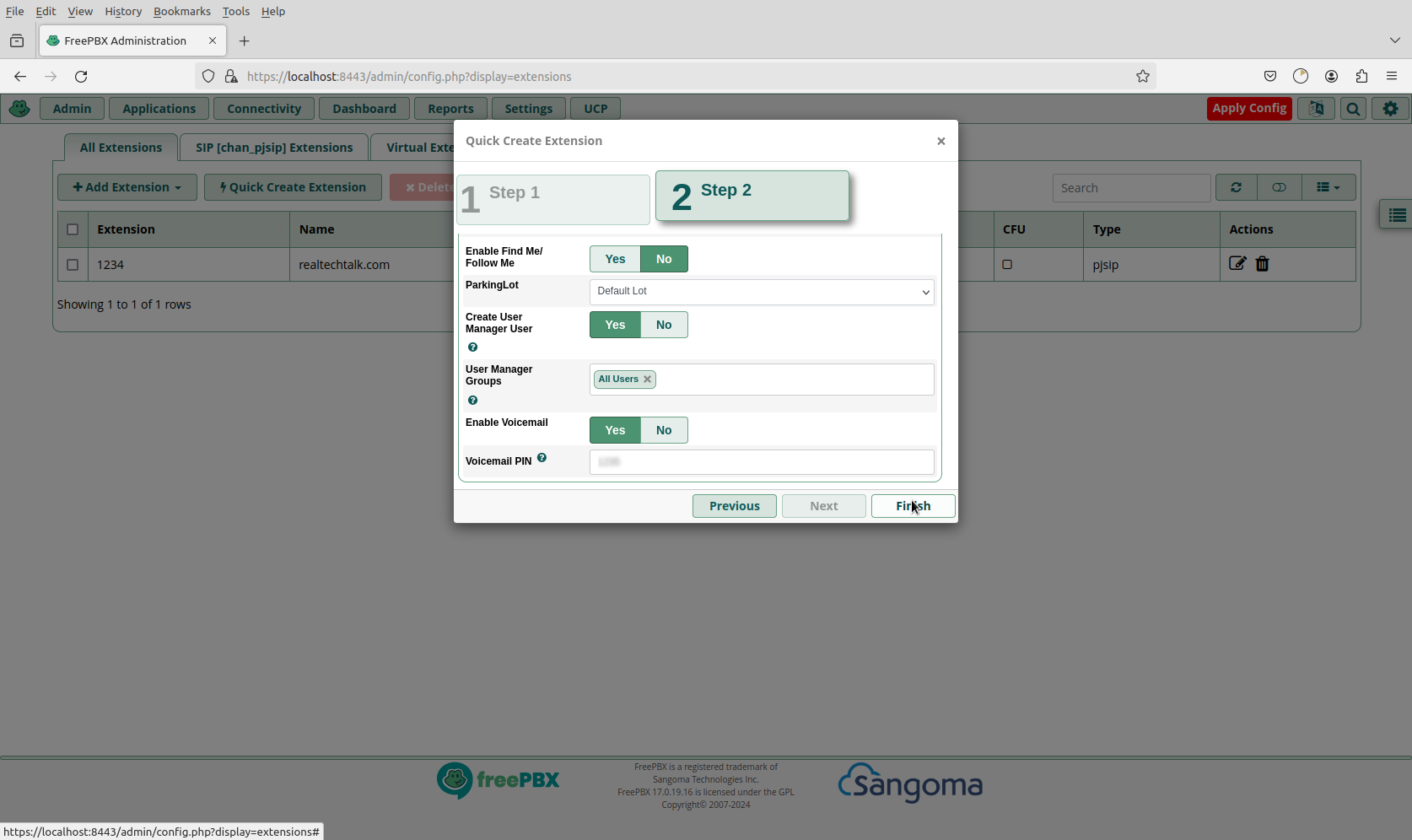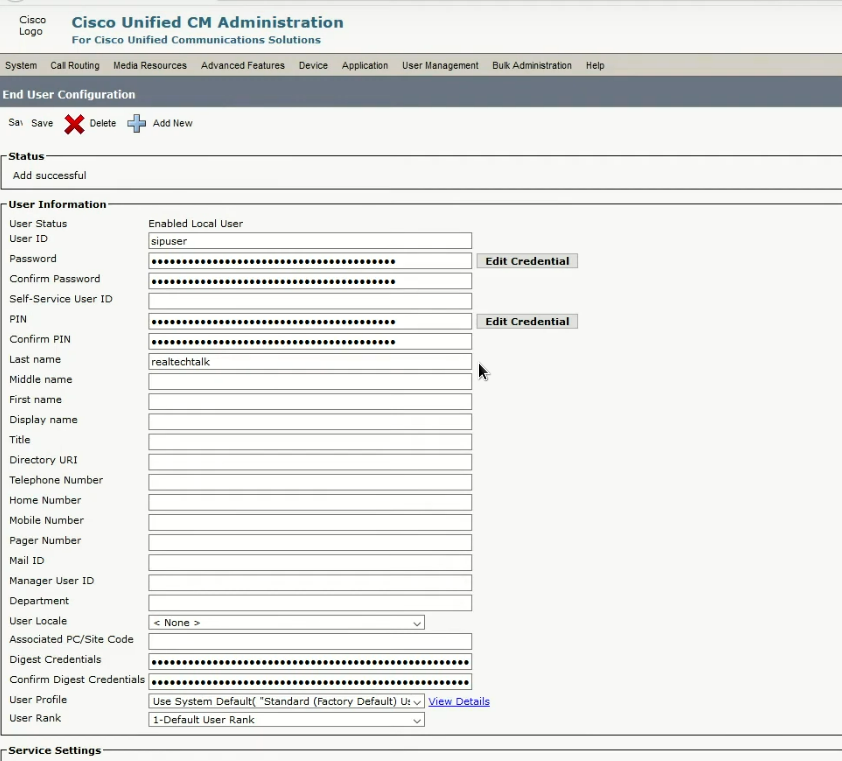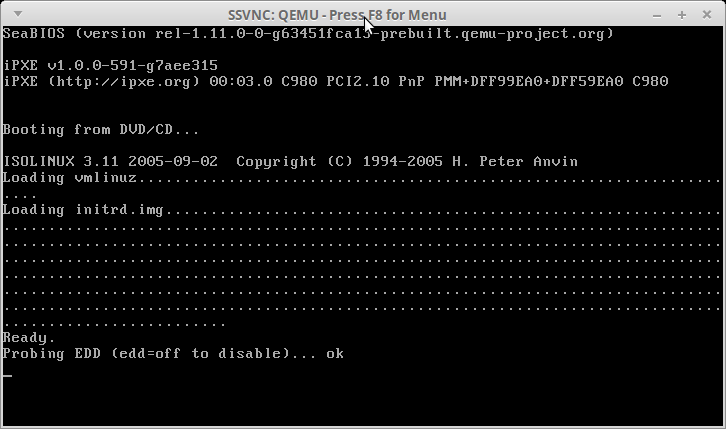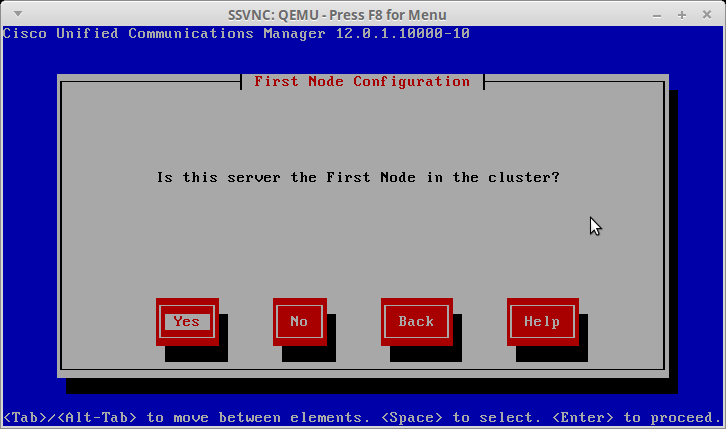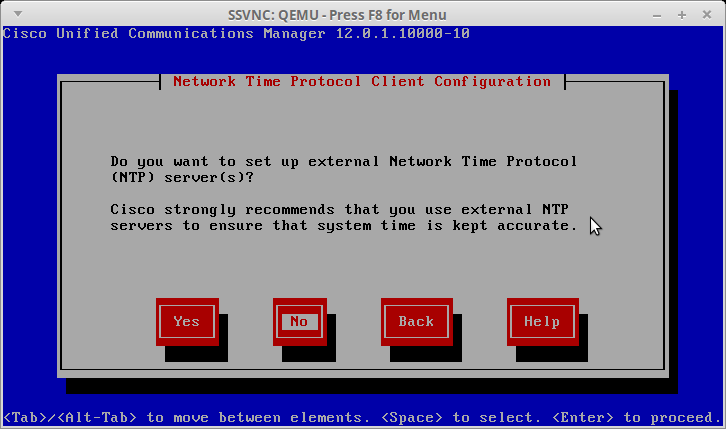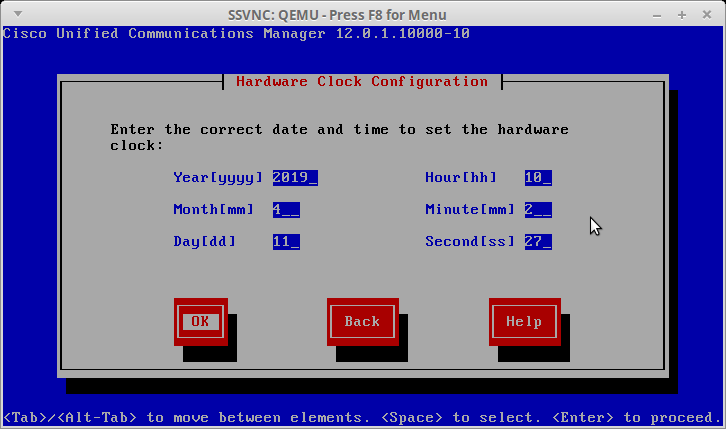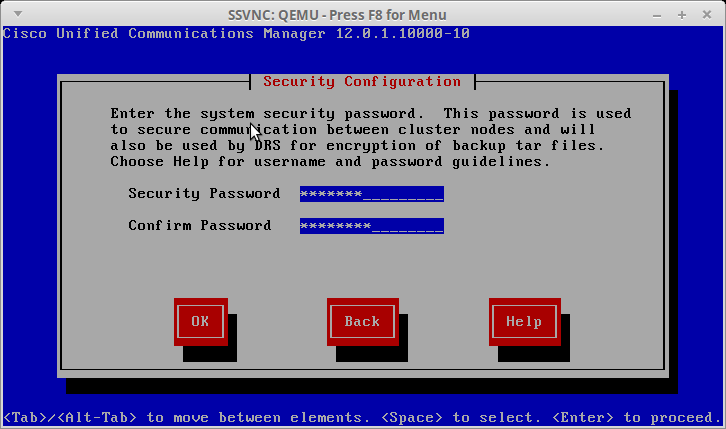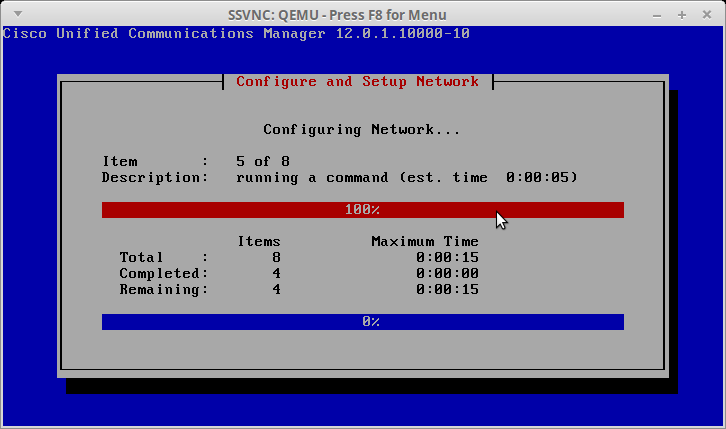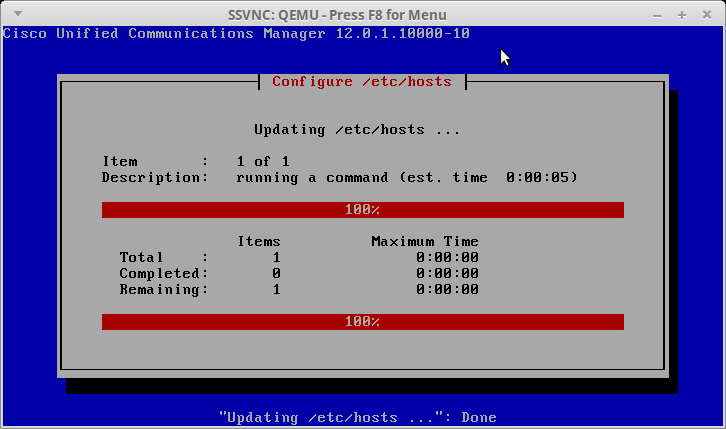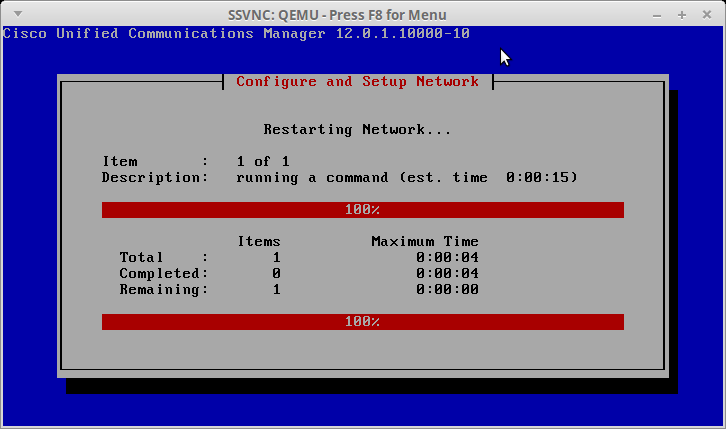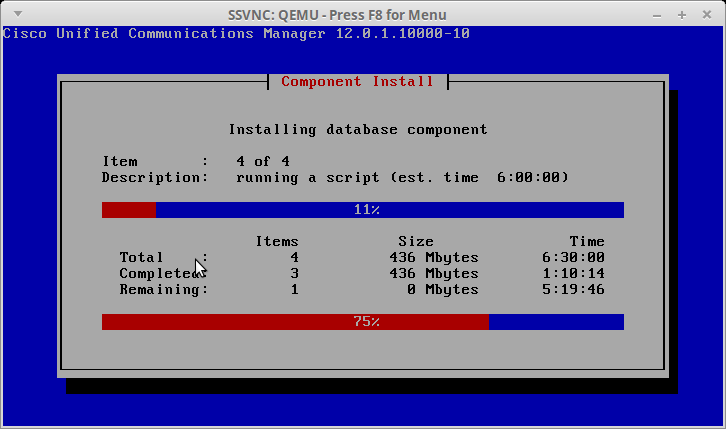RealTechTalk (RTT) - Linux/Server Administration/Related
We have years of knowledge with technology, especially in the IT (Information Technology) industry.
realtechtalk.com will always have fresh and useful information on a variety of subjects from Graphic Design, Server Administration, Web Hosting Industry and much more.
This site will specialize in unique topics and problems faced by web hosts, Unix/Linux administrators, web developers, computer technicians, hardware, networking, scripting, web design and much more. The aim of this site is to explain common problems and solutions in a simple way. Forums are ineffective because they have a lot of talk, but it's hard to find the answer you're looking for, and as we know, the answer is usually not there. No one has time to scour the net for forums and read pages of irrelevant information on different forums/threads. RTT just gives you what you're looking for.Recommended SFP+ to RJ45 Adapter Module for Switch Juniper Cisco Ubiquiti TP-Link etc...
I am mainly used to the enterprise where most connections are deployed by some "normal" kind of fiber eg SFP+, QSFP+, SFP28, QSFP28 and those modules are almost fool proof, run cool and are reliable. Like most normal admin users, I like to use my own hardware for routing and switching rather than the often poor equipment provided by the ISP, especially when you have enterprise hardware that will be more reliable.
The normal path is that you would just take the fiber optic link on an SFP or SFP+ and plug it in directly into your firewall, router or switch, cutting out the extra power usage, insecure ISP devices and another point of failure.
But enter the situation with a lot of home and office connections and anything on ISPs like Telus, AT&T, most ISPs in Japan etc... that are faster than 1.5G, they no longer use the standard GPON which just registers via the serial# of the module that the ISP has on file.
Now you need a device called the NAH (Network Access Hub) which uses XGSPON which is authenticated via this extra and unnecessary device/NAH. Plugging in an XGSPON SFP+ module to your router/switch will not work like a normal GPON.
Solution 1 - buy an expensive XGSPON module and hack and modify it
After more testing, I almost think that #1 in some cases here may be more reliable, yes there is the chance of authentication parameters changing which would instantly take you offline. However, many of the SFP+ to RJ45 adapters are known to be unreliable and randomly die. In theory if your XGSPON module doesn't die, then I will predict it will probably be more reliable than the #2 adapter method.
There are some solutions which modify XGSPON modules from fs.com so you can use it as normal, but they are pricey and this can be risky if the authentication mode/details changes in the future. In plain English, you could be away from home and need access to your home network but an ISP Update could render your internet access useless. Here is the procedure on Github to hack the XGSPON SFP+ module from fs.com.
Solution 2 - Use the NAH and use an SFP+ to RJ45 module
As much as I hate the NAH, this is the most reliable way for the reasons mentioned in #1. With a caveat being that I don't trust these adapters, they can die. For example one of mine died after 3 days. They do say the 80M are more reliable.
Recommended 80M SFP+ to RJ45
The 80M or 100M units use the BCM84891L Broadcom chip which is considered more reliable in my experience.
My 80M unit has been going strong for over a month now and temps vary between 42-48C which appears to be based on usage, whereas the 30M units seem to stay at almost a static temperature.
Amazon affil Link to the 80M 10G SFP+ RJ45 adapter I use.
I don't recommend the 30M SFP+ modules anymore below.
The 30Ms almost always use the Marvell AQR113C as mentioned below which is a chip that is proven to overheat and not last (eg. mine died after just 3 days!).
One module I recently tested has an ID of "SFP+-10G-SR" and runs at a reasonable 51C which is much better than what many users report with other modules (eg. burning hot 80-90C). I cannot be certain if the unit runs cool because of the design it claims to use which minimizes heat, or if it is because my enterprise switch has active cooling.
It seems almost all 30M SFP+ modules use the Marvell AQR113C chip which no matter the brand is often not reliable.
The 80M or 100M SFP+ modules usually use Broadcom BCM84891L which is known to be a cooler running chip. It does cost more but if they last longer then it is worth it.
After testing with heavy use for 3-4 days the temperature stayed the same but the module dies/drops out which causes downtime/packetloss:
Jan 25 13:04:08 chassism[1243]: link 3 SFP receive power low warning cleared
Jan 25 13:07:31 mib2d[1262]: SNMP_TRAP_LINK_DOWN: ifIndex 561, ifAdminStatus up(1), ifOperStatus down(2), ifName xe-0/1/3
Jan 25 13:07:33 chassism[1243]: link 3 SFP receive power low alarm set
Jan 25 13:07:33 chassism[1243]: link 3 SFP receive power low warning set
Jan 25 13:07:43 chassism[1243]: link 3 SFP receive power low alarm cleared
Jan 25 13:07:43 chassism[1243]: link 3 SFP receive power low warning cleared
Here is the affiliate link to the bad/dying after 3 days SFP+ to RJ45 item I bought.

Even when pushing 3Gigabit in both directions the module stayed at the same temp or maybe went to 52C.
Bad Power Supply Issue Story Diagnosing Troubleshooting
These are fairly classic symptoms but they may not present obviously enough early on.
I had a power supply issue with my old Corsair CX430 (430 Watt).
The build had two old 95W Xeon CPUs, 2 USB devices and a PCI-E powered Nvidia Quadro or at one point a GT710. This shouldn't have overwhelmed the PS but this power supply is known to be weak by many users.
Symptom 1. Graphics Issues
This would only present it self after coming back with the screensaver, when hitting the keyboard or mouse to stop the screensaver and get the login screen, it would just freeze for a number of seconds. I initially chalked it up to bad cooling or an old Nvidia driver.
Symptom 2. Mouse Issues
Sometimes the mouse would just freeze or not track properly, clearly in hindsight it was a power supply issue but the mouse itself also did test bad, so this was not completely obvious.
Symptom 3. USB Issues
I didn't have this particular issue but a lot of times I've seen issues with power supplies, you may notice a USB SSD does not work right or drops out. This is tricky to diagnose as it is often the USB SSD enclosure/cable itself, OR it is sometimes the internal cabling or resistance from motherboard to the front of the PC.
Symptom 4. Resetting randomly.
This one is fairly obvious but may slowly creep up. You may assume if you aren't at the PC all the time that it may be due to an update or even a bad motherboard or a watchdog service acting up.
Conclusion
If you ever have any issues like this, if practical, swap out for a known good power supply and see if any of these types of symptoms goes away.
In my example, I swapped in a known good 750W EVGA and all has been fine since (no resets, no screensaver freezing, no USB issues etc...)
Getting started with AI (Artificial Intelligence) in Linux / Ubuntu using by deploying LLM (Language Learing Models) using Ollama LLMA
In this quick tutorial we will deploy various AI models and compare the differences. We will be using smaller models so that most users should be able to follow this guide as long as they have at least 16G of memory and no other applications using much memory.
In this tutorial we recommend that you use Docker to deploy ollama. If you are not familiar with Docker, you can check our Docker Tutorial guide here.
Step 1.) Deploy
I recommend having a Ubuntu or Debian host for this, but it is supported in Windows and Mac too.
Visit the Ollama website to download it.
Step 2.) Install Ollama
Install curl if you don't have it already: apt update && apt install curl
curl -fsSL https://ollama.com/install.sh | sh
>>> Installing ollama to /usr/local
>>> Downloading Linux amd64 bundle
######################################################################## 100.0%
WARNING: Unable to detect NVIDIA/AMD GPU. Install lspci or lshw to automatically detect and install GPU dependencies.
>>> The Ollama API is now available at 127.0.0.1:11434.
>>> Install complete. Run "ollama" from the command line.
Step 3.) Start ollama server
ollama serve&
Make sure you use the & so it puts the service in the background, yet it will still output to the console. This is very useful for debugging and troubleshooting performance issues.
2025/04/22 21:00:21 routes.go:1231: INFO server config env="map[CUDA_VISIBLE_DEVICES: GPU_DEVICE_ORDINAL: HIP_VISIBLE_DEVICES: HSA_OVERRIDE_GFX_VERSION: HTTPS_PROXY: HTTP_PROXY: NO_PROXY: OLLAMA_CONTEXT_LENGTH:2048 OLLAMA_DEBUG:false OLLAMA_FLASH_ATTENTION:false OLLAMA_GPU_OVERHEAD:0 OLLAMA_HOST:http://127.0.0.1:11434 OLLAMA_INTEL_GPU:false OLLAMA_KEEP_ALIVE:5m0s OLLAMA_KV_CACHE_TYPE: OLLAMA_LLM_LIBRARY: OLLAMA_LOAD_TIMEOUT:5m0s OLLAMA_MAX_LOADED_MODELS:0 OLLAMA_MAX_QUEUE:512 OLLAMA_MODELS:/root/.ollama/models OLLAMA_MULTIUSER_CACHE:false OLLAMA_NEW_ENGINE:false OLLAMA_NOHISTORY:false OLLAMA_NOPRUNE:false OLLAMA_NUM_PARALLEL:0 OLLAMA_ORIGINS:[http://localhost https://localhost http://localhost:* https://localhost:* http://127.0.0.1 https://127.0.0.1 http://127.0.0.1:* https://127.0.0.1:* http://0.0.0.0 https://0.0.0.0 http://0.0.0.0:* https://0.0.0.0:* app://* file://* tauri://* vscode-webview://* vscode-file://*] OLLAMA_SCHED_SPREAD:false ROCR_VISIBLE_DEVICES: http_proxy: https_proxy: no_proxy:]"
time=2025-04-22T21:00:21.697Z level=INFO source=images.go:458 msg="total blobs: 0"
time=2025-04-22T21:00:21.697Z level=INFO source=images.go:465 msg="total unused blobs removed: 0"
time=2025-04-22T21:00:21.697Z level=INFO source=routes.go:1298 msg="Listening on 127.0.0.1:11434 (version 0.6.5)"
time=2025-04-22T21:00:21.697Z level=INFO source=gpu.go:217 msg="looking for compatible GPUs"
time=2025-04-22T21:00:21.727Z level=INFO source=gpu.go:377 msg="no compatible GPUs were discovered"
time=2025-04-22T21:00:21.727Z level=INFO source=types.go:130 msg="inference compute" id=0 library=cpu variant="" compute="" driver=0.0 name="" total="267.6 GiB" available="255.5 GiB"
Step 4.) Run your first llm!
Find the LLM you want to test on the ollama website.
Keep in mind that the larger the model, the more memory and more disk space and resources it consumes when running. For this reason, our example will use a smaller model.
ollama run qwen2.5:0.5b
Note that this smaller 0.5b model uses just about 397MB
You should see similar output as below and then have a chat prompt at the end.
ollama run qwen2.5:0.5b
[GIN] 2025/04/22 - 21:04:44 | 200 | 79.024µs | 127.0.0.1 | HEAD "/"
[GIN] 2025/04/22 - 21:04:44 | 404 | 455.218µs | 127.0.0.1 | POST "/api/show"
pulling manifest ⠇ time=2025-04-22T21:04:45.299Z level=INFO source=download.go:177 msg="downloading c5396e06af29 in 4 100 MB part(s)"
pulling manifest
pulling manifest
pulling c5396e06af29... 100% ▕██████████████████████████████████████████████████████████████████████████████▏ 397 MB tpulling manifest
pulling c5396e06af29... 100% ▕██████████████████████████████████████████████████████████████████████████████▏ 397 MB
pulling manifest
pulling c5396e06af29... 100% ▕██████████████████████████████████████████████████████████████████████████████▏ 397 MB
pulling manifest
pulling c5396e06af29... 100% ▕██████████████████████████████████████████████████████████████████████████████▏ 397 MB
pulling manifest
pulling manifest
pulling c5396e06af29... 100% ▕██████████████████████████████████████████████████████████████████████████████████████████████████████████████████████████████▏ 397 MB
pulling 66b9ea09bd5b... 100% ▕██████████████████████████████████████████████████████████████████████████████████████████████████████████████████████████████▏ 68 B
pulling eb4402837c78... 100% ▕██████████████████████████████████████████████████████████████████████████████████████████████████████████████████████████████▏ 1.5 KB
pulling 832dd9e00a68... 100% ▕██████████████████████████████████████████████████████████████████████████████████████████████████████████████████████████████▏ 11 KB
pulling 005f95c74751... 100% ▕██████████████████████████████████████████████████████████████████████████████████████████████████████████████████████████████▏ 490 B
verifying sha256 digest
writing manifest
success
[GIN] 2025/04/22 - 21:04:57 | 200 | 66.099807ms | 127.0.0.1 | POST "/api/show"
⠙ time=2025-04-22T21:04:57.759Z level=INFO source=server.go:105 msg="system memory" total="267.6 GiB" free="255.5 GiB" free_swap="976.0 MiB"
time=2025-04-22T21:04:57.759Z level=WARN source=ggml.go:152 msg="key not found" key=qwen2.vision.block_count default=0
time=2025-04-22T21:04:57.759Z level=WARN source=ggml.go:152 msg="key not found" key=qwen2.attention.key_length default=64
time=2025-04-22T21:04:57.759Z level=WARN source=ggml.go:152 msg="key not found" key=qwen2.attention.value_length default=64
time=2025-04-22T21:04:57.759Z level=INFO source=server.go:138 msg=offload library=cpu layers.requested=-1 layers.model=25 layers.offload=0 layers.split="" memory.available="[255.5 GiB]" memory.gpu_overhead="0 B" memory.required.full="782.6 MiB" memory.required.partial="0 B" memory.required.kv="96.0 MiB" memory.required.allocations="[782.6 MiB]" memory.weights.total="373.7 MiB" memory.weights.repeating="235.8 MiB" memory.weights.nonrepeating="137.9 MiB" memory.graph.full="298.5 MiB" memory.graph.partial="405.0 MiB"
llama_model_loader: loaded meta data with 34 key-value pairs and 290 tensors from /root/.ollama/models/blobs/sha256-c5396e06af294bd101b30dce59131a76d2b773e76950acc870eda801d3ab0515 (version GGUF V3 (latest))
llama_model_loader: Dumping metadata keys/values. Note: KV overrides do not apply in this output.
llama_model_loader: - kv 0: general.architecture str = qwen2
llama_model_loader: - kv 1: general.type str = model
llama_model_loader: - kv 2: general.name str = Qwen2.5 0.5B Instruct
llama_model_loader: - kv 3: general.finetune str = Instruct
llama_model_loader: - kv 4: general.basename str = Qwen2.5
llama_model_loader: - kv 5: general.size_label str = 0.5B
llama_model_loader: - kv 6: general.license str = apache-2.0
llama_model_loader: - kv 7: general.license.link str = https://huggingface.co/Qwen/Qwen2.5-0...
llama_model_loader: - kv 8: general.base_model.count u32 = 1
llama_model_loader: - kv 9: general.base_model.0.name str = Qwen2.5 0.5B
llama_model_loader: - kv 10: general.base_model.0.organization str = Qwen
llama_model_loader: - kv 11: general.base_model.0.repo_url str = https://huggingface.co/Qwen/Qwen2.5-0.5B
llama_model_loader: - kv 12: general.tags arr[str,2] = ["chat", "text-generation"]
llama_model_loader: - kv 13: general.languages arr[str,1] = ["en"]
llama_model_loader: - kv 14: qwen2.block_count u32 = 24
llama_model_loader: - kv 15: qwen2.context_length u32 = 32768
llama_model_loader: - kv 16: qwen2.embedding_length u32 = 896
llama_model_loader: - kv 17: qwen2.feed_forward_length u32 = 4864
llama_model_loader: - kv 18: qwen2.attention.head_count u32 = 14
llama_model_loader: - kv 19: qwen2.attention.head_count_kv u32 = 2
llama_model_loader: - kv 20: qwen2.rope.freq_base f32 = 1000000.000000
llama_model_loader: - kv 21: qwen2.attention.layer_norm_rms_epsilon f32 = 0.000001
llama_model_loader: - kv 22: general.file_type u32 = 15
llama_model_loader: - kv 23: tokenizer.ggml.model str = gpt2
llama_model_loader: - kv 24: tokenizer.ggml.pre str = qwen2
⠹ llama_model_loader: - kv 25: tokenizer.ggml.tokens arr[str,151936] = ["!", """, "#", "$", "%", "&", "'", ...
llama_model_loader: - kv 26: tokenizer.ggml.token_type arr[i32,151936] = [1, 1, 1, 1, 1, 1, 1, 1, 1, 1, 1, 1, ...
llama_model_loader: - kv 27: tokenizer.ggml.merges arr[str,151387] = ["Ġ Ġ", "ĠĠ ĠĠ", "i n", "Ġ t",...
llama_model_loader: - kv 28: tokenizer.ggml.eos_token_id u32 = 151645
llama_model_loader: - kv 29: tokenizer.ggml.padding_token_id u32 = 151643
llama_model_loader: - kv 30: tokenizer.ggml.bos_token_id u32 = 151643
llama_model_loader: - kv 31: tokenizer.ggml.add_bos_token bool = false
llama_model_loader: - kv 32: tokenizer.chat_template str = {%- if tools %}n {{- '<|im_start|>...
llama_model_loader: - kv 33: general.quantization_version u32 = 2
llama_model_loader: - type f32: 121 tensors
llama_model_loader: - type q5_0: 132 tensors
llama_model_loader: - type q8_0: 13 tensors
llama_model_loader: - type q4_K: 12 tensors
llama_model_loader: - type q6_K: 12 tensors
print_info: file format = GGUF V3 (latest)
print_info: file type = Q4_K - Medium
print_info: file size = 373.71 MiB (6.35 BPW)
⠼ load: special tokens cache size = 22
⠴ load: token to piece cache size = 0.9310 MB
print_info: arch = qwen2
print_info: vocab_only = 1
print_info: model type = ?B
print_info: model params = 494.03 M
print_info: general.name = Qwen2.5 0.5B Instruct
print_info: vocab type = BPE
print_info: n_vocab = 151936
print_info: n_merges = 151387
print_info: BOS token = 151643 '<|endoftext|>'
print_info: EOS token = 151645 '<|im_end|>'
print_info: EOT token = 151645 '<|im_end|>'
print_info: PAD token = 151643 '<|endoftext|>'
print_info: LF token = 198 'Ċ'
print_info: FIM PRE token = 151659 '<|fim_prefix|>'
print_info: FIM SUF token = 151661 '<|fim_suffix|>'
print_info: FIM MID token = 151660 '<|fim_middle|>'
print_info: FIM PAD token = 151662 '<|fim_pad|>'
print_info: FIM REP token = 151663 '<|repo_name|>'
print_info: FIM SEP token = 151664 '<|file_sep|>'
print_info: EOG token = 151643 '<|endoftext|>'
print_info: EOG token = 151645 '<|im_end|>'
print_info: EOG token = 151662 '<|fim_pad|>'
print_info: EOG token = 151663 '<|repo_name|>'
print_info: EOG token = 151664 '<|file_sep|>'
print_info: max token length = 256
llama_model_load: vocab only - skipping tensors
time=2025-04-22T21:04:58.219Z level=INFO source=server.go:405 msg="starting llama server" cmd="/usr/local/bin/ollama runner --model /root/.ollama/models/blobs/sha256-c5396e06af294bd101b30dce59131a76d2b773e76950acc870eda801d3ab0515 --ctx-size 8192 --batch-size 512 --threads 12 --no-mmap --parallel 4 --port 38569"
time=2025-04-22T21:04:58.219Z level=INFO source=sched.go:451 msg="loaded runners" count=1
time=2025-04-22T21:04:58.219Z level=INFO source=server.go:580 msg="waiting for llama runner to start responding"
time=2025-04-22T21:04:58.220Z level=INFO source=server.go:614 msg="waiting for server to become available" status="llm server error"
time=2025-04-22T21:04:58.241Z level=INFO source=runner.go:853 msg="starting go runner"
time=2025-04-22T21:04:58.243Z level=INFO source=ggml.go:109 msg=system CPU.0.LLAMAFILE=1 compiler=cgo(gcc)
time=2025-04-22T21:04:58.250Z level=INFO source=runner.go:913 msg="Server listening on 127.0.0.1:38569"
⠦ llama_model_loader: loaded meta data with 34 key-value pairs and 290 tensors from /root/.ollama/models/blobs/sha256-c5396e06af294bd101b30dce59131a76d2b773e76950acc870eda801d3ab0515 (version GGUF V3 (latest))
llama_model_loader: Dumping metadata keys/values. Note: KV overrides do not apply in this output.
llama_model_loader: - kv 0: general.architecture str = qwen2
llama_model_loader: - kv 1: general.type str = model
llama_model_loader: - kv 2: general.name str = Qwen2.5 0.5B Instruct
llama_model_loader: - kv 3: general.finetune str = Instruct
llama_model_loader: - kv 4: general.basename str = Qwen2.5
llama_model_loader: - kv 5: general.size_label str = 0.5B
llama_model_loader: - kv 6: general.license str = apache-2.0
llama_model_loader: - kv 7: general.license.link str = https://huggingface.co/Qwen/Qwen2.5-0...
llama_model_loader: - kv 8: general.base_model.count u32 = 1
llama_model_loader: - kv 9: general.base_model.0.name str = Qwen2.5 0.5B
llama_model_loader: - kv 10: general.base_model.0.organization str = Qwen
llama_model_loader: - kv 11: general.base_model.0.repo_url str = https://huggingface.co/Qwen/Qwen2.5-0.5B
llama_model_loader: - kv 12: general.tags arr[str,2] = ["chat", "text-generation"]
llama_model_loader: - kv 13: general.languages arr[str,1] = ["en"]
llama_model_loader: - kv 14: qwen2.block_count u32 = 24
llama_model_loader: - kv 15: qwen2.context_length u32 = 32768
llama_model_loader: - kv 16: qwen2.embedding_length u32 = 896
llama_model_loader: - kv 17: qwen2.feed_forward_length u32 = 4864
llama_model_loader: - kv 18: qwen2.attention.head_count u32 = 14
llama_model_loader: - kv 19: qwen2.attention.head_count_kv u32 = 2
llama_model_loader: - kv 20: qwen2.rope.freq_base f32 = 1000000.000000
llama_model_loader: - kv 21: qwen2.attention.layer_norm_rms_epsilon f32 = 0.000001
llama_model_loader: - kv 22: general.file_type u32 = 15
llama_model_loader: - kv 23: tokenizer.ggml.model str = gpt2
llama_model_loader: - kv 24: tokenizer.ggml.pre str = qwen2
llama_model_loader: - kv 25: tokenizer.ggml.tokens arr[str,151936] = ["!", """, "#", "$", "%", "&", "'", ...
⠧ llama_model_loader: - kv 26: tokenizer.ggml.token_type arr[i32,151936] = [1, 1, 1, 1, 1, 1, 1, 1, 1, 1, 1, 1, ...
llama_model_loader: - kv 27: tokenizer.ggml.merges arr[str,151387] = ["Ġ Ġ", "ĠĠ ĠĠ", "i n", "Ġ t",...
llama_model_loader: - kv 28: tokenizer.ggml.eos_token_id u32 = 151645
llama_model_loader: - kv 29: tokenizer.ggml.padding_token_id u32 = 151643
llama_model_loader: - kv 30: tokenizer.ggml.bos_token_id u32 = 151643
llama_model_loader: - kv 31: tokenizer.ggml.add_bos_token bool = false
llama_model_loader: - kv 32: tokenizer.chat_template str = {%- if tools %}n {{- '<|im_start|>...
llama_model_loader: - kv 33: general.quantization_version u32 = 2
llama_model_loader: - type f32: 121 tensors
llama_model_loader: - type q5_0: 132 tensors
llama_model_loader: - type q8_0: 13 tensors
llama_model_loader: - type q4_K: 12 tensors
llama_model_loader: - type q6_K: 12 tensors
print_info: file format = GGUF V3 (latest)
print_info: file type = Q4_K - Medium
print_info: file size = 373.71 MiB (6.35 BPW)
⠇ time=2025-04-22T21:04:58.472Z level=INFO source=server.go:614 msg="waiting for server to become available" status="llm server loading model"
⠏ load: special tokens cache size = 22
⠋ load: token to piece cache size = 0.9310 MB
print_info: arch = qwen2
print_info: vocab_only = 0
print_info: n_ctx_train = 32768
print_info: n_embd = 896
print_info: n_layer = 24
print_info: n_head = 14
print_info: n_head_kv = 2
print_info: n_rot = 64
print_info: n_swa = 0
print_info: n_embd_head_k = 64
print_info: n_embd_head_v = 64
print_info: n_gqa = 7
print_info: n_embd_k_gqa = 128
print_info: n_embd_v_gqa = 128
print_info: f_norm_eps = 0.0e+00
print_info: f_norm_rms_eps = 1.0e-06
print_info: f_clamp_kqv = 0.0e+00
print_info: f_max_alibi_bias = 0.0e+00
print_info: f_logit_scale = 0.0e+00
print_info: n_ff = 4864
print_info: n_expert = 0
print_info: n_expert_used = 0
print_info: causal attn = 1
print_info: pooling type = 0
print_info: rope type = 2
print_info: rope scaling = linear
print_info: freq_base_train = 1000000.0
print_info: freq_scale_train = 1
print_info: n_ctx_orig_yarn = 32768
print_info: rope_finetuned = unknown
print_info: ssm_d_conv = 0
print_info: ssm_d_inner = 0
print_info: ssm_d_state = 0
print_info: ssm_dt_rank = 0
print_info: ssm_dt_b_c_rms = 0
print_info: model type = 1B
print_info: model params = 494.03 M
print_info: general.name = Qwen2.5 0.5B Instruct
print_info: vocab type = BPE
print_info: n_vocab = 151936
print_info: n_merges = 151387
print_info: BOS token = 151643 '<|endoftext|>'
print_info: EOS token = 151645 '<|im_end|>'
print_info: EOT token = 151645 '<|im_end|>'
print_info: PAD token = 151643 '<|endoftext|>'
print_info: LF token = 198 'Ċ'
print_info: FIM PRE token = 151659 '<|fim_prefix|>'
print_info: FIM SUF token = 151661 '<|fim_suffix|>'
print_info: FIM MID token = 151660 '<|fim_middle|>'
print_info: FIM PAD token = 151662 '<|fim_pad|>'
print_info: FIM REP token = 151663 '<|repo_name|>'
print_info: FIM SEP token = 151664 '<|file_sep|>'
print_info: EOG token = 151643 '<|endoftext|>'
print_info: EOG token = 151645 '<|im_end|>'
print_info: EOG token = 151662 '<|fim_pad|>'
print_info: EOG token = 151663 '<|repo_name|>'
print_info: EOG token = 151664 '<|file_sep|>'
print_info: max token length = 256
load_tensors: loading model tensors, this can take a while... (mmap = false)
load_tensors: CPU model buffer size = 373.71 MiB
⠹ llama_init_from_model: n_seq_max = 4
llama_init_from_model: n_ctx = 8192
llama_init_from_model: n_ctx_per_seq = 2048
llama_init_from_model: n_batch = 2048
llama_init_from_model: n_ubatch = 512
llama_init_from_model: flash_attn = 0
llama_init_from_model: freq_base = 1000000.0
llama_init_from_model: freq_scale = 1
llama_init_from_model: n_ctx_per_seq (2048) < n_ctx_train (32768) -- the full capacity of the model will not be utilized
llama_kv_cache_init: kv_size = 8192, offload = 1, type_k = 'f16', type_v = 'f16', n_layer = 24, can_shift = 1
llama_kv_cache_init: CPU KV buffer size = 96.00 MiB
llama_init_from_model: KV self size = 96.00 MiB, K (f16): 48.00 MiB, V (f16): 48.00 MiB
llama_init_from_model: CPU output buffer size = 2.33 MiB
⠸ llama_init_from_model: CPU compute buffer size = 300.25 MiB
llama_init_from_model: graph nodes = 846
llama_init_from_model: graph splits = 1
time=2025-04-22T21:04:58.973Z level=INFO source=server.go:619 msg="llama runner started in 0.75 seconds"
[GIN] 2025/04/22 - 21:04:58 | 200 | 1.319178734s | 127.0.0.1 | POST "/api/generate"
>>> Send a message (/? for help)
Checking the ollama process we can see it uses about
1589132 root 20 0 2874.7m 553.7m 21.5m S 1140 0.2 3:03.60 ollama
553.7MB of RAM
microk8s kubernetes how to install OpenEBS
This is the official guide here from OpenEBS.
Step 1.) Make sure you have the right version.
As of this time 2025-04, we need Kubernetes/Microk8s version 1.23 or higher (note this will continue to increment higher).
Usually a good sign of having the wrong/old version is that you will encounter namespace and other errors:
error: unknown flag: --namespace
Step 2.) Enable Helm
microk8s enable helm
Step 3.) Get OpenEBS repo & update
microk8s helm repo add openebs https://openebs.github.io/openebs
microk8s helm repo update
Hang tight while we grab the latest from your chart repositories...
...Successfully got an update from the "openebs" chart repository
Update Complete. ⎈Happy Helming!⎈
Step 4.) Install OpenEBS
microk8s helm install openebs --namespace openebs openebs/openebs --create-namespace
NAME: openebs
LAST DEPLOYED: Thu Apr 17 17:38:46 2025
NAMESPACE: openebs
STATUS: deployed
REVISION: 1
NOTES:
Successfully installed OpenEBS.
Check the status by running: kubectl get pods -n openebs
The default values will install both Local PV and Replicated PV. However,
the Replicated PV will require additional configuration to be fuctional.
The Local PV offers non-replicated local storage using 3 different storage
backends i.e Hostpath, LVM and ZFS, while the Replicated PV provides one replicated highly-available
storage backend i.e Mayastor.
For more information,
- view the online documentation at https://openebs.io/docs
- connect with an active community on our Kubernetes slack channel.
- Sign up to Kubernetes slack: https://slack.k8s.io
- #openebs channel: https://kubernetes.slack.com/messages/openebs
Flash LSI MegaRAID 2208 to IT mode in Linux Mint/Debian/Ubuntu
03:00.0 RAID bus controller: Broadcom / LSI MegaRAID SAS 2208 [Thunderbolt] (rev 05)
This is risky but if you have an extra RAID/SAS card to replace it then you can try this to get IT mode.
https://docs.broadcom.com/docs-and-downloads/host-bus-adapters/host-bus-adapters-common-files/sas_sata_6g_p14/9207_8e_Package_P14_IT_Firmware_BIOS_for_MSDOS_Windows.zip
https://docs.broadcom.com/docs/12350477
Get the sas2flash for Linux:
https://docs.broadcom.com/docs-and-downloads/host-bus-adapters/host-bus-adapters-common-files/sas_sata_6g_p20/Installer_P20_for_Linux.zip
unzip Installer_P20_for_Linux.zip
Archive: Installer_P20_for_Linux.zip
inflating: Installer_P20_for_Linux/README_Installer_P20_Linux.txt
creating: Installer_P20_for_Linux/sas2flash_linux_i686_x86-64_rel/
inflating: Installer_P20_for_Linux/sas2flash_linux_i686_x86-64_rel/sas2flash
creating: Installer_P20_for_Linux/sas2flash_linux_ppc64_rel/
inflating: Installer_P20_for_Linux/sas2flash_linux_ppc64_rel/sas2flash
inflating: Installer_P20_for_Linux/SAS2FLASH_Phase20.0-20.00.00.00.pdf
inflating: Installer_P20_for_Linux/SAS2Flash_ReferenceGuide.pdf
chmod +x Installer_P20_for_Linux/sas2flash_linux_i686_x86-64_rel/sas2flash
Save Your Card Details:
Installer_P20_for_Linux/sas2flash_linux_i686_x86-64_rel/sas2flash -list -c 0
LSI Corporation SAS2 Flash Utility
Version 20.00.00.00 (2014.09.18)
Copyright (c) 2008-2014 LSI Corporation. All rights reserved
No LSI SAS adapters found! Limited Command Set Available!
ERROR: Command Not allowed without an adapter!
ERROR: Couldn't Create Command -list
Exiting Program.
P14 sas2flash won't run on Ubuntu 20 or similar/newer:
sas2flash: sas2flash: cannot execute binary file
LSI MegaRAID in Linux Ubuntu / Centos Tutorial Setup Guide megacli
Usually when I come across a system like this, I just flash the firmware to an IT mode so we get just an AHCI system with JBOD, but sometimes it is not practical for remote systems or if we fear that flashing is too risky if something goes wrong.
In this case, we unfortunately have to use LSI/Broadcom proprietary CLI tools (megacli) to even make the drives visible.
Step 1 - Download MegaCLI
The official broadcom packages lack .deb packages and only have .rpm for Linux
At this time the latest MegaCLI 5.5 P2 can be downloaded from here.
Step 2 - Extract MegaCLI
unzip 8-07-14_MegaCLI.zip
Archive: 8-07-14_MegaCLI.zip
inflating: 8.07.14_MegaCLI.txt
inflating: DOS/MegaCLI.exe
extracting: FreeBSD/MegaCLI.zip
extracting: FreeBSD/MegaCli64.zip
inflating: Linux/MegaCli-8.07.14-1.noarch.rpm
inflating: Solaris/MegaCli.pkg
inflating: Windows/MegaCli.exe
inflating: Windows/MegaCli64.exe
Step 3 - Convert to .deb using alien
apt install libncurses5 alien
alien MegaCli-8.07.06-1.noarch.rpm
Warning: Skipping conversion of scripts in package MegaCli: postinst postrm
Warning: Use the --scripts parameter to include the scripts.
megacli_8.07.06-2_all.deb generated
Step 4 - Install .deb
dpkg -i megacli_8.07.06-2_all.deb
Selecting previously unselected package megacli.
(Reading database ... 295031 files and directories currently installed.)
Preparing to unpack megacli_8.07.06-2_all.deb ...
Unpacking megacli (8.07.06-2) ...
Setting up megacli (8.07.06-2) ...
Processing triggers for libc-bin (2.31-0ubuntu9) ...
/opt/MegaRAID/MegaCli/MegaCli64: error while loading shared libraries: libncurses.so.5: cannot open shared object file: No such file or directory
If you get the above: apt install libncurses5
Step 5 - Run megacli
root@mint:~/Linux# /opt/MegaRAID/MegaCli/MegaCli64 -h
MegaCLI SAS RAID Management Tool Ver 8.07.06 Nov 13, 2012
(c)Copyright 2011, LSI Corporation, All Rights Reserved.
NOTE: The following options may be given at the end of any command below:
[-Silent] [-AppLogFile filename] [-NoLog] [-page[N]]
[-] is optional.
N - Number of lines per page.
MegaCli -v
MegaCli -help|-h|?
MegaCli -adpCount
MegaCli -AdpSetProp {CacheFlushInterval -val} | { RebuildRate -val}
| {PatrolReadRate -val} | {BgiRate -val} | {CCRate -val} | {ForceSGPIO -val}
| {ReconRate -val} | {SpinupDriveCount -val} | {SpinupDelay -val}
| {CoercionMode -val} | {ClusterEnable -val} | {PredFailPollInterval -val}
| {BatWarnDsbl -val} | {EccBucketSize -val} | {EccBucketLeakRate -val}
| {AbortCCOnError -val} | AlarmEnbl | AlarmDsbl | AlarmSilence
| {SMARTCpyBkEnbl -val} | {SSDSMARTCpyBkEnbl -val} | NCQEnbl | NCQDsbl
| {MaintainPdFailHistoryEnbl -val} | {RstrHotSpareOnInsert -val}
| {DisableOCR -val} | {BootWithPinnedCache -val} | {enblPI -val} |{PreventPIImport -val}
| AutoEnhancedImportEnbl | AutoEnhancedImportDsbl
| {EnblSpinDownUnConfigDrvs -val}|{UseDiskActivityforLocate -val} -aN|-a0,1,2|-aALL
| {ExposeEnclDevicesEnbl -val} | {SpinDownTime -val}
| {SpinUpEncDrvCnt -val} | {SpinUpEncDelay -val} | {Perfmode -val} -aN|-a0,1,2|-aALL
| {PerfMode -val �MaxFlushLines -val �MaxPDLatencyMS -val} -aN|-a0,1,2|-aALL
MegaCli -AdpSetProp -AutoDetectBackPlaneDsbl -val -aN|-a0,1,2|-aALL
val - 0=Enable Auto Detect of SGPIO and i2c SEP.
1=Disable Auto Detect of SGPIO.
2=Disable Auto Detect of i2c SEP.
3=Disable Auto Detect of SGPIO and i2c SEP.
MegaCli -AdpSetProp -CopyBackDsbl -val -aN|-a0,1,2|-aALL
val - 0=Enable Copyback.
1=Disable Copyback.
MegaCli -AdpSetProp -EnableJBOD -val -aN|-a0,1,2|-aALL
val - 0=Disable JBOD mode.
1=Enable JBOD mode.
MegaCli -AdpSetProp -DsblCacheBypass -val -aN|-a0,1,2|-aALL
val - 0=Enable Cache Bypass.
1=Disable Cache Bypass.
MegaCli -AdpSetProp -LoadBalanceMode -val -aN|-a0,1,2|-aALL
val - 0=Auto Load balance mode.
1=Disable Load balance mode.
MegaCli -AdpSetProp -UseFDEOnlyEncrypt -val -aN|-a0,1,2|-aALL
val - 0=FDE and controller encryption (if HW supports) is allowed.
1=Only support FDE encryption, disallow controller encryption.
MegaCli -AdpSetProp -PrCorrectUncfgdAreas -val -aN|-a0,1,2|-aALL
val - 0= Correcting Media error during PR is disabled.
1=Correcting Media error during PR is allowed.
MegaCli -AdpSetProp -DsblSpinDownHSP -val -aN|-a0,1,2|-aALL
val - 0= Spinning down the Hot Spare is enabled.
1=Spinning down the Hot Spare is disabled.
MegaCli -AdpSetProp -DefaultLdPSPolicy -Automatic| -None | -Maximum| -MaximumWithoutCaching -aN|-a0,1,2|-aALL
MegaCli -AdpSetProp -DisableLdPS -interval n1 -time n2 -aN|-a0,1,2|-aALL
where n1 is the number of hours beginning at time n2
where n2 is the number of minutes from 12:00am
MegaCli -AdpSetProp -ENABLEEGHSP -val -aN|-a0,1,2|-aALL
val - 0= Disabled Emergency GHSP.
1= Enabled Emergency GHSP.
MegaCli -AdpSetProp -ENABLEEUG -val -aN|-a0,1,2|-aALL
val - 0= Disabled Emergency UG as Spare.
1= Enabled Emergency UG as Spare.
MegaCli -AdpSetProp -ENABLEESMARTER -val -aN|-a0,1,2|-aALL
val - 0= Disabled Emergency Spare as Smarter.
1= Enabled Emergency Spare as Smarter.
MegaCli -AdpSetProp -DPMenable -val -aN|-a0,1,2|-aALL
val - 0=Disable Drive Performance Monitoring .
1=Enable Drive Performance Monitoring.
MegaCli -AdpSetProp -SupportSSDPatrolRead -val -aN|-a0,1,2|-aALL
val - 0=Disable Patrol read for SSD drives .
1=Enable Patrol read for SSD drives.
MegaCli -AdpGetProp CacheFlushInterval | RebuildRate | PatrolReadRate | ForceSGPIO
| BgiRate | CCRate | ReconRate | SpinupDriveCount | SpinupDelay
| CoercionMode | ClusterEnable | PredFailPollInterval | BatWarnDsbl
| EccBucketSize | EccBucketLeakRate | EccBucketCount | AbortCCOnError
| AlarmDsply | SMARTCpyBkEnbl | SSDSMARTCpyBkEnbl | NCQDsply
| MaintainPdFailHistoryEnbl | RstrHotSpareOnInsert
| EnblSpinDownUnConfigDrvs | DisableOCR
| BootWithPinnedCache | enblPI |PreventPIImport | AutoEnhancedImportDsply | AutoDetectBackPlaneDsbl
| CopyBackDsbl | LoadBalanceMode | UseFDEOnlyEncrypt | WBSupport | EnableJBOD
| DsblCacheBypass | ExposeEnclDevicesEnbl | SpinDownTime | PrCorrectUncfgdAreas
| UseDiskActivityforLocate | ENABLEEGHSP | ENABLEEUG | ENABLEESMARTER | Perfmode | PerfModeValues
| -DPMenable -aN|-a0,1,2|-aALL
| DefaultLdPSPolicy | DisableLdPsInterval | DisableLdPsTime | SpinUpEncDrvCnt
| SpinUpEncDelay | PrCorrectUncfgdAreas
| DsblSpinDownHSP | SupportSSDPatrolRead -aN|-a0,1,2|-aALL
MegaCli -AdpAllInfo -aN|-a0,1,2|-aALL
MegaCli -AdpGetTime -aN|-a0,1,2|-aALL
MegaCli -AdpSetTime yyyymmdd hh:mm:ss -aN
MegaCli -AdpSetVerify -f fileName -aN|-a0,1,2|-aALL
MegaCli -AdpBIOS -Enbl |-Dsbl | -SOE | -BE | -HCOE | - HSM | EnblAutoSelectBootLd | DsblAutoSelectBootLd | -Dsply -aN|-a0,1,2|-aALL
MegaCli -AdpBootDrive {-Set {-Lx | -physdrv[E0:S0]}} | {-Unset {-Lx | -physdrv[E0:S0]}} |-Get -aN|-a0,1,2|-aALL
MegaCli -AdpAutoRbld -Enbl|-Dsbl|-Dsply -aN|-a0,1,2|-aALL
MegaCli -AdpCacheFlush -aN|-a0,1,2|-aALL
MegaCli -AdpPR -Dsbl|EnblAuto|EnblMan|Start|Suspend|Resume|Stop|Info|SSDPatrolReadEnbl |SSDPatrolReadDsbl
|{SetDelay Val}|{-SetStartTime yyyymmdd hh}|{maxConcurrentPD Val} -aN|-a0,1,2|-aALL
MegaCli -AdpCcSched -Dsbl|-Info|{-ModeConc | -ModeSeq [-ExcludeLD -LN|-L0,1,2]
[-SetStartTime yyyymmdd hh ] [-SetDelay val ] } -aN|-a0,1,2|-aALL
MegaCli -AdpCcSched -SetStartTime yyyymmdd hh -aN|-a0,1,2|-aALL
MegaCli -AdpCcSched -SetDelay val -aN|-a0,1,2|-aALL
MegaCli -FwTermLog -BBUoff|BBUoffTemp|BBUon|BBUGet|Dsply|Clear -aN|-a0,1,2|-aALL
MegaCli -AdpAlILog -aN|-a0,1,2|-aALL
MegaCli -AdpDiag [val] -aN|-a0,1,2|-aALL
val - Time in second.
MegaCli -AdpGetPciInfo -aN|-a0,1,2|-aALL
MegaCli -AdpShutDown -aN|-a0,1,2|-aALL
MegaCli -AdpDowngrade -aN|-a0,1,2|-aALL
MegaCli -PDList -aN|-a0,1,2|-aALL
MegaCli -PDGetNum -aN|-a0,1,2|-aALL
MegaCli -pdInfo -PhysDrv[E0:S0,E1:S1,...] -aN|-a0,1,2|-aALL
MegaCli -PDOnline -PhysDrv[E0:S0,E1:S1,...] -aN|-a0,1,2|-aALL
MegaCli -PDOffline -PhysDrv[E0:S0,E1:S1,...] -aN|-a0,1,2|-aALL
MegaCli -PDMakeGood -PhysDrv[E0:S0,E1:S1,...] | [-Force] -aN|-a0,1,2|-aALL
MegaCli -PDMakeJBOD -PhysDrv[E0:S0,E1:S1,...] -aN|-a0,1,2|-aALL
MegaCli -PDHSP {-Set [-Dedicated [-ArrayN|-Array0,1,2...]] [-EnclAffinity] [-nonRevertible]}
|-Rmv -PhysDrv[E0:S0,E1:S1,...] -aN|-a0,1,2|-aALL
MegaCli -PDRbld -Start|-Stop|-Suspend|-Resume|-ShowProg |-ProgDsply
-PhysDrv [E0:S0,E1:S1,...] -aN|-a0,1,2|-aALL
MegaCli -PDClear -Start|-Stop|-ShowProg |-ProgDsply
-PhysDrv [E0:S0,E1:S1,...] -aN|-a0,1,2|-aALL
MegaCli -PdLocate {[-start] | -stop} -physdrv[E0:S0,E1:S1,...] -aN|-a0,1,2|-aALL
MegaCli -PdMarkMissing -physdrv[E0:S0,E1:S1,...] -aN|-a0,1,2|-aALL
MegaCli -PdGetMissing -aN|-a0,1,2|-aALL
MegaCli -PdReplaceMissing -physdrv[E0:S0] -arrayA, -rowB -aN
MegaCli -PdPrpRmv [-UnDo] -physdrv[E0:S0] -aN|-a0,1,2|-aALL
MegaCli -EncInfo -aN|-a0,1,2|-aALL
MegaCli -EncStatus -aN|-a0,1,2|-aALL
MegaCli -PhyInfo -phyM -aN|-a0,1,2|-aALL
MegaCli -PhySetLinkSpeed -phyM -speed -aN|-a0,1,2|-aALL
MegaCli -PdFwDownload [offline][ForceActivate] {[-SataBridge] -PhysDrv[0:1] }|{-EncdevId[devId1]} -f
MegaCli -LDInfo -Lx|-L0,1,2|-Lall -aN|-a0,1,2|-aALL
MegaCli -LDSetProp {-Name LdNamestring} | -RW|RO|Blocked|RemoveBlocked | WT|WB|ForcedWB [-Immediate] |RA|NORA|ADRA | DsblPI
| Cached|Direct | -EnDskCache|DisDskCache | CachedBadBBU|NoCachedBadBBU
-Lx|-L0,1,2|-Lall -aN|-a0,1,2|-aALL
MegaCli -LDSetPowerPolicy -Default| -Automatic| -None| -Maximum| -MaximumWithoutCaching
-Lx|-L0,1,2|-Lall -aN|-a0,1,2|-aALL
MegaCli -LDGetProp -Cache | -Access | -Name | -DskCache | -PSPolicy | Consistency -Lx|-L0,1,2|-LALL
-aN|-a0,1,2|-aALL
MegaCli -LDInit {-Start [-full]}|-Abort|-ShowProg|-ProgDsply -Lx|-L0,1,2|-LALL -aN|-a0,1,2|-aALL
MegaCli -LDCC {-Start [-force]}|-Abort|-Suspend|-Resume|-ShowProg|-ProgDsply -Lx|-L0,1,2|-LALL -aN|-a0,1,2|-aALL
MegaCli -LDBI -Enbl|-Dsbl|-getSetting|-Abort|-Suspend|-Resume|-ShowProg|-ProgDsply -Lx|-L0,1,2|-LALL -aN|-a0,1,2|-aALL
MegaCli -LDRecon {-Start -rX [{-Add | -Rmv} -Physdrv[E0:S0,...]]}|-ShowProg|-ProgDsply
-Lx -aN
MegaCli -LdPdInfo -aN|-a0,1,2|-aALL
MegaCli -LDGetNum -aN|-a0,1,2|-aALL
MegaCli -LDBBMClr -Lx|-L0,1,2,...|-Lall -aN|-a0,1,2|-aALL
MegaCli -getLdExpansionInfo -Lx|-L0,1,2|-Lall -aN|-a0,1,2|-aALL
MegaCli -LdExpansion -pN -dontExpandArray -Lx|-L0,1,2|-Lall -aN|-a0,1,2|-aALL
MegaCli -GetBbtEntries -Lx|-L0,1,2|-Lall -aN|-a0,1,2|-aALL
MegaCli -Cachecade -assign|-remove -Lx|-L0,1,2|-LALL -aN|-a0,1,2|-aALL
MegaCli -CfgLdAdd -rX[E0:S0,E1:S1,...] [WT|WB] [NORA|RA|ADRA] [Direct|Cached]
[CachedBadBBU|NoCachedBadBBU] [-szXXX [-szYYY ...]]
[-strpszM] [-Hsp[E0:S0,...]] [-AfterLdX] | [Secure]
[-Default| -Automatic| -None| -Maximum| -MaximumWithoutCaching] [-Cache] [-enblPI] [-Force]-aN
MegaCli -CfgCacheCadeAdd [-rX] -Physdrv[E0:S0,...] {-Name LdNamestring} [WT|WB|ForcedWB] [-assign -LX|L0,2,5..|LALL] -aN|-a0,1,2|-aALL
MegaCli -CfgEachDskRaid0 [WT|WB] [NORA|RA|ADRA] [Direct|Cached] [-enblPI]
[CachedBadBBU|NoCachedBadBBU] [-strpszM]|[Secure] [-Default| -Automatic| -None| -Maximum| -MaximumWithoutCaching] [-Cache] -aN|-a0,1,2|-aALL
MegaCli -CfgClr [-Force] -aN|-a0,1,2|-aALL
MegaCli -CfgDsply -aN|-a0,1,2|-aALL
MegaCli -CfgCacheCadeDsply -aN|-a0,1,2|-aALL
MegaCli -CfgLdDel -LX|-L0,2,5...|-LALL [-Force] -aN|-a0,1,2|-aALL
MegaCli -CfgCacheCadeDel -LX|-L0,2,5...|-LALL -aN|-a0,1,2|-aALL
MegaCli -CfgFreeSpaceinfo -aN|-a0,1,2|-aALL
MegaCli -CfgSpanAdd -r10 -Array0[E0:S0,E1:S1] -Array1[E0:S0,E1:S1] [-ArrayX[E0:S0,E1:S1] ...]
[WT|WB] [NORA|RA|ADRA] [Direct|Cached] [CachedBadBBU|NoCachedBadBBU]
[-szXXX[-szYYY ...]][-strpszM][-AfterLdX]| [Secure]
[-Default| -Automatic| -None| -Maximum| -MaximumWithoutCaching] [-Cache] [-enblPI] [-Force] -aN
MegaCli -CfgSpanAdd -r50 -Array0[E0:S0,E1:S1,E2:S2,...] -Array1[E0:S0,E1:S1,E2:S2,...]
[-ArrayX[E0:S0,E1:S1,E2:S2,...] ...] [WT|WB] [NORA|RA|ADRA] [Direct|Cached]
[CachedBadBBU|NoCachedBadBBU][-szXXX[-szYYY ...]][-strpszM][-AfterLdX]
[Secure] [-Default| -Automatic| -None| -Maximum| -MaximumWithoutCaching] [-Cache] [-enblPI] [-Force] -aN
MegaCli -CfgSpanAdd -r60 -Array0[E0:S0,E1:S1,E2:S2,E3,S3...] -Array1[E0:S0,E1:S1,E2:S2,E3,S3...]
[-ArrayX[E0:S0,E1:S1,E2:S2,E3,S3...] ...] [WT|WB] [NORA|RA|ADRA] [Direct|Cached]
[CachedBadBBU|NoCachedBadBBU][-szXXX[-szYYY ...]][-strpszM][-AfterLdX]|
[Secure] [-Default| -Automatic| -None| -Maximum| -MaximumWithoutCaching] [-Cache] [-enblPI] [-Force]-aN
MegaCli -CfgAllFreeDrv -rX [-SATAOnly] [-SpanCount XXX] [WT|WB] [NORA|RA|ADRA]
[Direct|Cached] [CachedBadBBU|NoCachedBadBBU] [-strpszM]
[-HspCount XX [-HspType -Dedicated|-EnclAffinity|-nonRevertible]]|
[Secure] [-Default| -Automatic| -None| -Maximum| -MaximumWithoutCaching] [-Cache] [-enblPI] -aN
MegaCli -CfgSave -f filename -aN
MegaCli -CfgRestore -f filename -aN
MegaCli -CfgForeign -Scan | [-Passphrase sssssssssss] -aN|-a0,1,2|-aALL
MegaCli -CfgForeign -Dsply [x] | [-Passphrase sssssssssss] -aN|-a0,1,2|-aALL
MegaCli -CfgForeign -Preview [x] | [-Passphrase sssssssssss] -aN|-a0,1,2|-aALL
MegaCli -CfgForeign -Import [x] | [-Passphrase sssssssssss] -aN|-a0,1,2|-aALL
MegaCli -CfgForeign -Clear [x]|[-Passphrase sssssssssss] -aN|-a0,1,2|-aALL
x - index of foreign configurations. Optional. All by default.
MegaCli -AdpEventLog -GetEventLogInfo -aN|-a0,1,2|-aALL
MegaCli -AdpEventLog -GetEvents {-info -warning -critical -fatal} {-f
MegaCli -AdpEventLog -GetSinceShutdown {-info -warning -critical -fatal} {-f
MegaCli -AdpEventLog -GetSinceReboot {-info -warning -critical -fatal} {-f
MegaCli -AdpEventLog -IncludeDeleted {-info -warning -critical -fatal} {-f
MegaCli -AdpEventLog -GetLatest n {-info -warning -critical -fatal} {-f
MegaCli -AdpEventLog -GetCCIncon -f
MegaCli -AdpEventLog -Clear -aN|-a0,1,2|-aALL
MegaCli -AdpBbuCmd -aN|-a0,1,2|-aALL
MegaCli -AdpBbuCmd -GetBbuStatus -aN|-a0,1,2|-aALL
MegaCli -AdpBbuCmd -GetBbuCapacityInfo -aN|-a0,1,2|-aALL
MegaCli -AdpBbuCmd -GetBbuDesignInfo -aN|-a0,1,2|-aALL
MegaCli -AdpBbuCmd -GetBbuProperties -aN|-a0,1,2|-aALL
MegaCli -AdpBbuCmd -BbuLearn -aN|-a0,1,2|-aALL
MegaCli -AdpBbuCmd -BbuMfgSleep -aN|-a0,1,2|-aALL
MegaCli -AdpBbuCmd -BbuMfgSeal -aN|-a0,1,2|-aALL
MegaCli -AdpBbuCmd -getBbumodes -aN|-a0,1,2|-aALL
MegaCli -AdpBbuCmd -SetBbuProperties -f
MegaCli -AdpBbuCmd -GetGGEEPData offset [Hexaddress] NumBytes n -aN|-a0,1,2|-aALL
MegaCli -AdpBbuCmd -ScheduleLearn -Dsbl|-Info|[-STARTTIME DDD hh] -aN|-a0,1,2|-aALL
MegaCli -AdpFacDefSet -aN
MegaCli -AdpFwFlash -f filename [-ResetNow] [-NoSigChk] [-NoVerChk] [-FWTYPE n] -aN|-a0,1,2|-aALL
MegaCli -AdpGetConnectorMode -ConnectorN|-Connector0,1|-ConnectorAll -aN|-a0,1,2|-aALL
MegaCli -AdpSetConnectorMode -Internal|-External|-Auto -ConnectorN|-Connector0,1|-ConnectorAll -aN|-a0,1,2|-aALL
MegaCli -PhyErrorCounters -aN|-a0,1,2|-aALL
MegaCli -DirectPdMapping -Enbl|-Dsbl|-Dsply -aN|-a0,1,2|-aALL
MegaCli -PDCpyBk -Start -PhysDrv[E0:S0,E1:S1] -aN|-a0,1,2|-aALL
MegaCli -PDCpyBk -Stop|-Suspend|-Resume|-ShowProg|-ProgDsply -PhysDrv[E0:S0] -aN|-a0,1,2|-aALL
MegaCli -PDInstantSecureErase -PhysDrv[E0:S0,E1:S1,...] | [-Force] -aN|-a0,1,2|-aALL
MegaCli -CfgSpanAdd -rX -array0[E0:S1,E1:S1.....] array1[E0:S1,E1:S1.....] -szxxx -enblPI -aN|-a0,1,2|-aALL
MegaCli -LDMakeSecure -Lx|-L0,1,2,...|-Lall -aN|-a0,1,2|-aALL
MegaCli -DeleteSecurityKey | [-Force] -aN
MegaCli -CreateSecurityKey -Passphrase sssssssssss [-KeyID kkkkkkkkkkk] -aN
MegaCli -CreateSecurityKey useEKMS -aN
MegaCli -ChangeSecurityKey -OldPassphrase sssssssssss | -Passphrase sssssssssss |
[-KeyID kkkkkkkkkkk] -aN
MegaCli -ChangeSecurityKey -Passphrase sssssssssss |
[-KeyID kkkkkkkkkkk] -aN
MegaCli -ChangeSecurityKey useEKMS -oldPassphrase sssssssssss -aN
MegaCli -ChangeSecurityKey -useEKMS -aN
MegaCli -GetKeyID [-PhysDrv[E0:S0]] -aN
MegaCli -SetKeyID -KeyID kkkkkkkkkkk -aN
MegaCli -VerifySecurityKey -Passphrase sssssssssss -aN
MegaCli -GetPreservedCacheList -aN|-a0,1,2|-aALL
MegaCli -DiscardPreservedCache -Lx|-L0,1,2|-Lall -force -aN|-a0,1,2|-aALL
sssssssssss - It must be between eight and thirty-two
characters and contain at least one number,
one lowercase letter, one uppercase
letter and one non-alphanumeric character.
kkkkkkkkkkk - Must be less than 256 characters.
MegaCli -ShowSummary [-f filename] -aN
MegaCli -ELF -GetSafeId -aN|-a0,1,2|-aALL
MegaCli -ELF -ControllerFeatures -aN|-a0,1,2|-aALL
MegaCli -ELF -Applykey key
MegaCli -ELF -TransferToVault -aN|-a0,1,2|-aALL
MegaCli -ELF -DeactivateTrialKey -aN|-a0,1,2|-aALL
MegaCli -ELF -ReHostInfo -aN|-a0,1,2|-aALL
MegaCli -ELF -ReHostComplete -aN|-a0,1,2|-aALL
MegaCli -LDViewMirror -Lx|-L0,1,2,...|-Lall -aN|-a0,1,2|-aALL
MegaCli -LDJoinMirror -DataSrc
MegaCli -SecureErase
Start[
Simple|
[Normal [ |ErasePattern ErasePatternA|ErasePattern ErasePatternA ErasePattern ErasePatternB]]|
[Thorough [ |ErasePattern ErasePatternA|ErasePattern ErasePatternA ErasePattern ErasePatternB]]]
| Stop
| ShowProg
| ProgDsply
[-PhysDrv [E0:S0,E1:S1,...] | -Lx|-L0,1,2|-LALL] -aN|-a0,1,2|-aALL
MegaCli -Version -Cli|-Ctrl|-Driver|-Pd -aN|-a0,1,2|-aALL
MegaCli -Perfmon {-start -interval
MegaCli -DpmStat -Dsply {lct | hist | ra | ext } [-physdrv[E0:S0]] -aN|-a0,1,2|-aALL
MegaCli -DpmStat -Clear {lct | hist | ra | ext } -aN|-a0,1,2|-aALL
Note: The directly connected drives can be specified as [:S]
Wildcard '?' can be used to specify the enclosure ID for the drive in the
only enclosure without direct connected device or the direct connected
drives with no enclosure in the system.
Note:[-aALL] option assumes that the parameters specified are valid
for all the Adapters.
Note:ProgDsply option is not supported in VMWARE-COSLESS.
The following options may be given at the end of any command above:
[-Silent] [-AppLogFile filename] [-NoLog] [-page[N]]
[-] is optional.
N - Number of lines per page.
MegaCli XD -AddVd
MegaCli XD -RemVd
MegaCli XD -AddCdev
MegaCli XD -RemCdev
MegaCli XD -VdList | -Configured | -Unconfigured
MegaCli XD -CdevList | -Configured | -Unconfigured
MegaCli XD -ConfigInfo
MegaCli XD -PerfStats
MegaCli XD -OnlineVd
MegaCli XD -WarpDriveInfo -iN | -iALL
MegaCli XD -FetchSafeId -iN | -iALL
MegaCli XD -ApplyActivationKey
Exit Code: 0x00
MegaCLI Command Tutorial
This command lists all of the physical drives on adapter 0 or (-a0).
/opt/MegaRAID/MegaCli/MegaCli64 -pdlist -a0
| Useful Items | |
| Slot Number: | the physical slot the drive is on the server |
| Raw Size: | the size of the disk in GB |
Notable things
Slot Number:
Notice it will list the slot# so you know the physical position of the drive in the server.
Adapter #0
Enclosure Device ID: 32
Slot Number: 1
Enclosure position: 1
Device Id: 1
WWN: 5000C5003A260844
Sequence Number: 1
Media Error Count: 0
Other Error Count: 0
Predictive Failure Count: 0
Last Predictive Failure Event Seq Number: 0
PD Type: SAS
Raw Size: 279.396 GB [0x22ecb25c Sectors]
Non Coerced Size: 278.896 GB [0x22dcb25c Sectors]
Coerced Size: 278.875 GB [0x22dc0000 Sectors]
Sector Size: 0
Firmware state: Unconfigured(good), Spun Up
Device Firmware Level: FS64
Shield Counter: 0
Successful diagnostics completion on : N/A
SAS Address(0): 0x5000c5003a260845
SAS Address(1): 0x0
Connected Port Number: 1(path0)
Inquiry Data: SEAGATE ST9300603SS FS646SE3T176
FDE Capable: Not Capable
FDE Enable: Disable
Secured: Unsecured
Locked: Unlocked
Needs EKM Attention: No
Foreign State: None
Device Speed: 6.0Gb/s
Link Speed: 6.0Gb/s
Media Type: Hard Disk Device
Drive Temperature :28C (82.40 F)
PI Eligibility: No
Drive is formatted for PI information: No
PI: No PI
Port-0 :
Port status: Active
Port's Linkspeed: 6.0Gb/s
Port-1 :
Port status: Active
Port's Linkspeed: Unknown
Drive has flagged a S.M.A.R.T alert : No
MegaRAID Create RAID 10 Example
First we need the slots of our drives, in this exampe on this server I only had 4 drives and knew I wanted each of them, so doing a grep on slot was fine to use any that came out.
Get Slot Numbers of Drives
MegaCli64 -PDList -aALL|grep -i slot
Slot Number: 1
Slot Number: 3
Slot Number: 5
Slot Number: 7
Use the slot numbers from above later on in our array creation.
Get "Enclosure Device ID":
MegaCli64 -PDList -aALL|grep -i enclosure
Enclosure Device ID: 32
Enclosure position: 1
Enclosure Device ID: 32
Enclosure position: 1
Enclosure Device ID: 32
Enclosure position: 1
Enclosure Device ID: 32
Enclosure position: 1
In our case we can see the enclosure ID is 32
Create RAID 10 Array
CfgSpanAdd command which is required for a RAID 10 array.
r10 specifies it as RAID 10
Array is required as RAID 10 in theory is 2 RAID 1's combined into a RAID 0.
Note that in the brackets the 32:1 is based on the fact from above that our enclosure ID is "32" and the 1 is one of our slot numbers of a disk we want to use. Be sure to adjust according
MegaCli64 -CfgSpanAdd -r10 -Array0[32:1,32:3] -Array1[32:5,32:7] -a0
Adapter 0: Created VD 0
Adapter 0: Configured the Adapter!!
Exit Code: 0x00
Success in RAID 10
You will now see that you have a new device that automatically appears as the next available drive letter.
Disk /dev/sdc: 557.77 GiB, 598879502336 bytes, 1169686528 sectors
Disk model: PERC H710P
Units: sectors of 1 * 512 = 512 bytes
Sector size (logical/physical): 512 bytes / 512 bytes
I/O size (minimum/optimal): 512 bytes / 512 bytes
MegaRAID RAID 0 Example
MegaCli64 -CfgLdAdd -r0[32:5] -a0
The above creates a RAID 0 array out of a single drive located in enclosure 32 and slot#5 on adapter 0.
This is the way if you want simpler and better performance by using mdadm to create your own array.
Of course you could have specified multiple drives if you truly wanted a fast but totally unreliable RAID 0 multi disk array (eg. -r0[32:5,32:4]
Check array/rebuild state:
./MegaCli64 -LDInfo -LALL -aALL
Adapter 0 -- Virtual Drive Information:
Virtual Drive: 0 (Target Id: 0)
Name :
RAID Level : Primary-1, Secondary-0, RAID Level Qualifier-0
Size : 557.75 GB
Sector Size : 512
Mirror Data : 557.75 GB
State : Optimal
Strip Size : 64 KB
Number Of Drives per span:2
Span Depth : 2
Default Cache Policy: WriteBack, ReadAdaptive, Direct, No Write Cache if Bad BBU
Current Cache Policy: WriteBack, ReadAdaptive, Direct, No Write Cache if Bad BBU
Default Access Policy: Read/Write
Current Access Policy: Read/Write
Disk Cache Policy : Disk's Default
Ongoing Progresses:
Background Initialization: Completed 24%, Taken 10 min.
Encryption Type : None
Default Power Savings Policy: Controller Defined
Current Power Savings Policy: None
Can spin up in 1 minute: Yes
LD has drives that support T10 power conditions: Yes
LD's IO profile supports MAX power savings with cached writes: No
Bad Blocks Exist: No
Is VD Cached: Yes
Cache Cade Type : Read Only
MegaRAID Create Single Disk RAID 0 Example
If you don't want to use the entire RAID function and want to use mdadm, you can create a fake RAID 0 of each drive to expose it as a sort of normal drive and then make a RAID out of that for use with mdadm. mdadm usually gives better performance, especially in RAID 10.
For example using an old 4 disk RAID 10 array with MegaRAID it produces only 249MB/s:
5242880000 bytes (5.2 GB, 4.9 GiB) copied, 21.0175 s, 249 MB/s
Now compare the same 4 disks with mdadm RAID 10 with virtual raid 0 drives
5242880000 bytes (5.2 GB, 4.9 GiB) copied, 16.2648 s, 322 MB/s
Note that this test was done while the array was still initializing too!
Look at how much faster the fully sync'd mdadm RAID 10 is (nearly 2x faster than the MegaRAID 10):
5242880000 bytes (5.2 GB, 4.9 GiB) copied, 10.412 s, 504 MB/s
Create each PD/physical drive using the enlosure ID and slot ID [32:1] for example.
MegaCli64 CfgLdAdd -r0 [32:1] -a0
Adapter 0: Created VD 0
Adapter 0: Configured the Adapter!!
Exit Code: 0x00
MegaCli64 CfgLdAdd -r0 [32:3] -a0
Adapter 0: Created VD 1
Adapter 0: Configured the Adapter!!
Exit Code: 0x00
MegaCli64 CfgLdAdd -r0 [32:5] -a0
Adapter 0: Created VD 2
Adapter 0: Configured the Adapter!!
Exit Code: 0x00
MegaCli64 CfgLdAdd -r0 [32:7] -a0
Adapter 0: Created VD 3
Adapter 0: Configured the Adapter!!
After this just do the normal mdadm config on each disk (in my case the above created a /dev/sdc sdd sde sdf).
How To Delete Virtual Drive
For example above we created the Virtual Drive with ID "0"
Virtual Drive: 0 (Target Id: 0)
./MegaCli64 CfgLdDel -L0 -Force -a0
The 0 in -L0 means logical drive 0 from above. Change to match your ID.
If you don't use -Force before -a0 you get this error: Virtual Disk is associate with Cache Cade. Please Use force option to delete
Adapter 0: Deleted Virtual Drive-0(target id-0)
How to use smartctl normally with megaraid
One other irritating thing about tools like megaraid is that smart doesn't work as you expect. Take a virtual drive /dev/sdc it doesn't show anything useful.
With smartctl you can use the megaraid option/plugin and specify the drive#/slot# and get normal info like this:
Note below the magic is in -d megaraid,3 which says we want the megaraid drive#3 or slot#3 smart info, which then gives us the normal expected info.
smartctl -a /dev/sdc -d megaraid,3 -T permissive
smartctl 7.1 2019-12-30 r5022 [x86_64-linux-5.4.0-26-generic] (local build)
Copyright (C) 2002-19, Bruce Allen, Christian Franke, www.smartmontools.org
=== START OF INFORMATION SECTION ===
Vendor: IBM-ESXS
Product: ST9300603SS F
Revision: B53A
Compliance: SPC-3
User Capacity: 300,000,000,000 bytes [300 GB]
Logical block size: 512 bytes
Rotation Rate: 10000 rpm
Form Factor: 2.5 inches
Logical Unit id: 0x5000c5001dbdea07
Serial number: 3SE1MFK400009035N4B3
Device type: disk
Transport protocol: SAS (SPL-3)
Local Time is: Mon Mar 24 20:16:16 2025 UTC
SMART support is: Available - device has SMART capability.
SMART support is: Enabled
Temperature Warning: Enabled
=== START OF READ SMART DATA SECTION ===
SMART Health Status: OK
Current Drive Temperature: 0 C
Drive Trip Temperature: 0 C
Elements in grown defect list: 0
Error Counter logging not supported
Device does not support Self Test logging
Convert-im6.q16: attempt to perform an operation not allowed by the security policy `PDF' @ error/constitute.c/IsCoderAuthorized/413. convert-im6.q16: no images defined `pts-time.jpg' @ error/convert.c/ConvertImageCommand/3258. solution ImageMagick P
Were you trying to convert a PDF and get this message?:
Convert-im6.q16: attempt to perform an operation not allowed by the security policy `PDF' @ error/constitute.c/IsCoderAuthorized/413.
convert-im6.q16: no images defined `pts-time.jpg' @ error/convert.c/ConvertImageCommand/3258.
Solution:
Find the "PDF" pattern and set it like below:
<policy domain="coder" rights="read|write" pattern="PDF" />
By default the rights are none (rights="none") which is why you get that error.
Apache PHP sending expires header solution cannot use cache with CDN
We've had clients asking why their CDN is not working, it is often a PHP setting that causes the below header to be sent:
expires: Thu, 19 Nov 1981 08:52:00 GMT
Solution Edit your /etc/php.ini
Set the option below as just being empty. Generally the default is nocache and will result in sending the expires header from 1981.
session.cache_limiter =
Here is what the man says about the option:
; Set to {nocache,private,public,} to determine HTTP caching aspects
; or leave this empty to avoid sending anti-caching headers.
; http://php.net/session.cache-limiter
However, we have often seen that any option but being empty results in the expires header being sent. If you want your content to be cachable by CDN, then make sure the session.cache_limiter contains a NULL/empty value.
How to install virt-manager in Mint 22/Ubuntu 22
Step 1.) Install virt-manager
sudo apt install virt-manager
Step 2.) Start libvirtd
sudo systemctl start libvirtd
sudo systemctl enable libvirtd
Step 3.) Permissions
Your user needs access to libvirt and kvm or it won't work without running as sudo.
sudo usermod -a -G kvm yourusername
sudo usermond -a -G libvirt yourusername
Step 4.) Logout and Login
If you get errors relating to being unable to connect to QEMU or not active connection, it is probably a permissions issue.
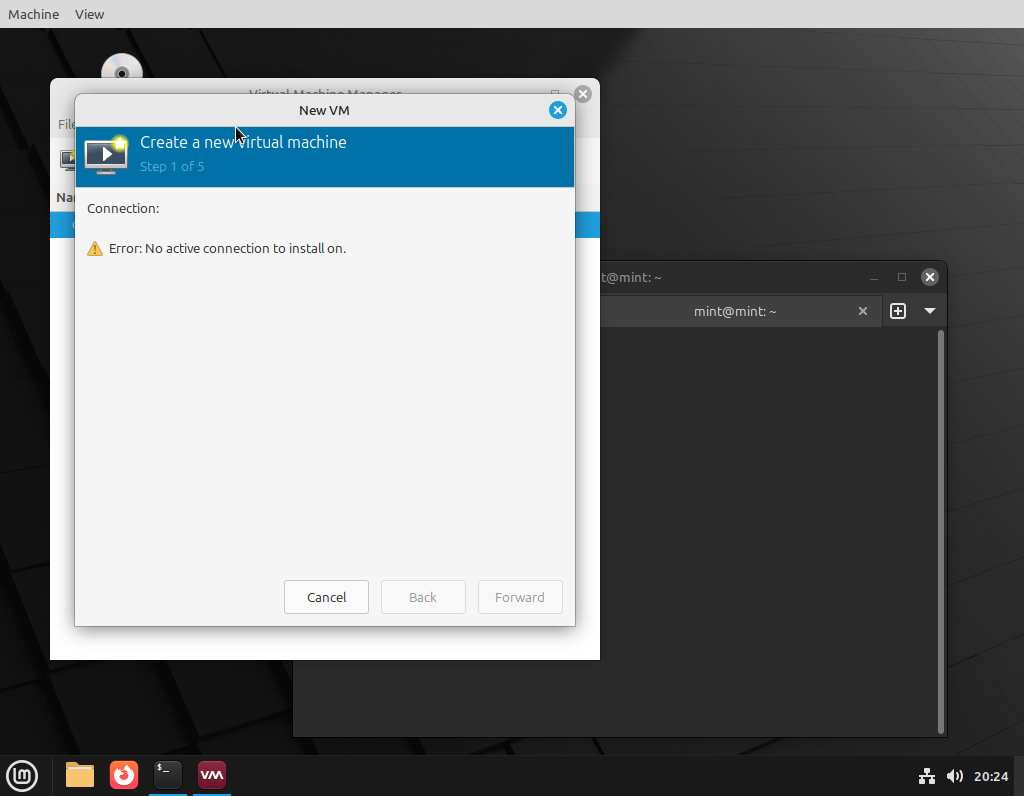
if you get errors with being unable to connect to libvirtd, it is probably not started.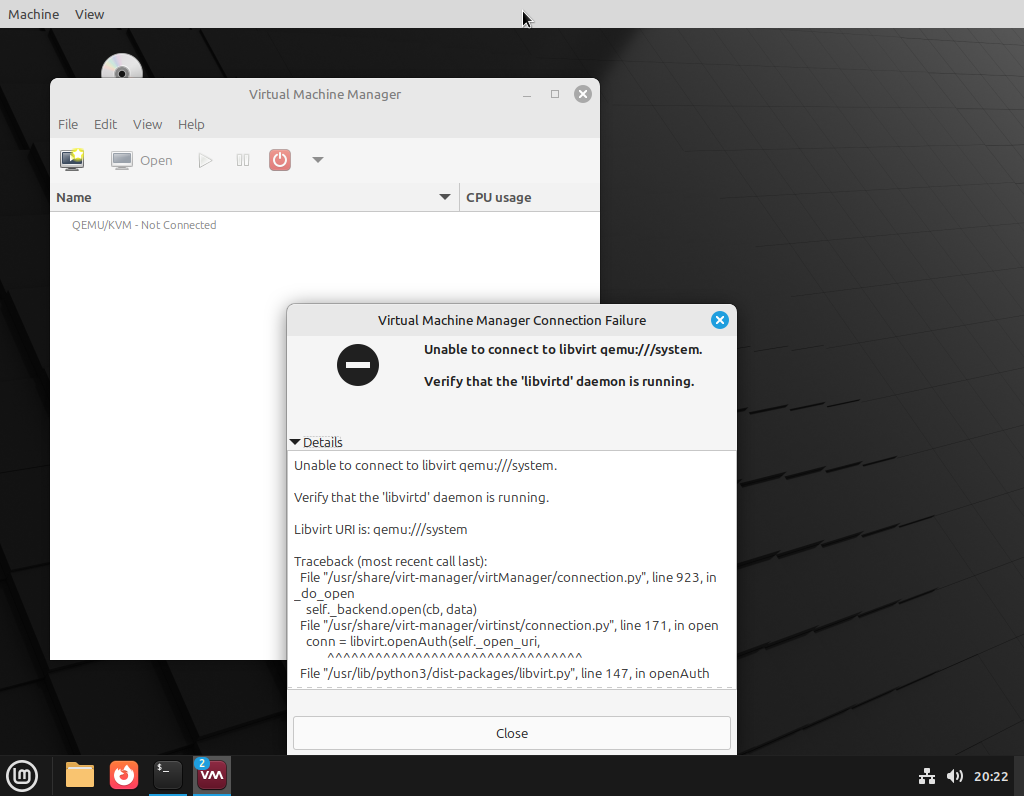
Infiniband Guide
A practical guide for admins who need to plan the required amount of bandwidth and what connectors/cards are needed for which.
| Standard | Speed | Cable/Connector |
| SDR | 8G | SFP |
| DDR | 10/16G | SFP, QSFP |
| QDR | 40/32G | QSFP |
| FDR | 56G | QSFP |
| EDR | 100G | QSP28 |
| HDR | 200G | QSP56 |
| NDR | 400G | QSFP-DD |
| XDR | 800G | OSFP, QSFP-DD |
python mysql install error: /bin/sh: 1: mysql_config: not found /bin/sh: 1: mariadb_config: not found /bin/sh: 1: mysql_config: not found mysql_config --version
These errors are usually caused by the lack mysql client dev files
If using mariadb install this:
apt-get install libmariadbclient-dev
If using mysql install this:
apt-get install libmysqlclient-dev
pip3 install mysql
The directory '/root/.cache/pip/http' or its parent directory is not owned by the current user and the cache has been disabled. Please check the permissions and owner of that directory. If executing pip with sudo, you may want sudo's -H flag.
The directory '/root/.cache/pip' or its parent directory is not owned by the current user and caching wheels has been disabled. check the permissions and owner of that directory. If executing pip with sudo, you may want sudo's -H flag.
Collecting mysql
Downloading https://files.pythonhosted.org/packages/9a/52/8d29c58f6ae448a72fbc612955bd31accb930ca479a7ba7197f4ae4edec2/mysql-0.0.3-py3-none-any.whl
Collecting mysqlclient (from mysql)
Downloading https://files.pythonhosted.org/packages/50/5f/eac919b88b9df39bbe4a855f136d58f80d191cfea34a3dcf96bf5d8ace0a/mysqlclient-2.1.1.tar.gz (88kB)
100% |████████████████████████████████| 92kB 5.5MB/s
Complete output from command python setup.py egg_info:
/bin/sh: 1: mysql_config: not found
/bin/sh: 1: mariadb_config: not found
/bin/sh: 1: mysql_config: not found
mysql_config --version
mariadb_config --version
mysql_config --libs
Traceback (most recent call last):
File "
File "/tmp/pip-install-twfzngc5/mysqlclient/setup.py", line 15, in
metadata, options = get_config()
File "/tmp/pip-install-twfzngc5/mysqlclient/setup_posix.py", line 70, in get_config
libs = mysql_config("libs")
File "/tmp/pip-install-twfzngc5/mysqlclient/setup_posix.py", line 31, in mysql_config
raise OSError("{} not found".format(_mysql_config_path))
OSError: mysql_config not found
----------------------------------------
Command "python setup.py egg_info" failed with error code 1 in /tmp/pip-install-twfzngc5/mysqlclient/
FreePBX 17 How To Add a Trunk
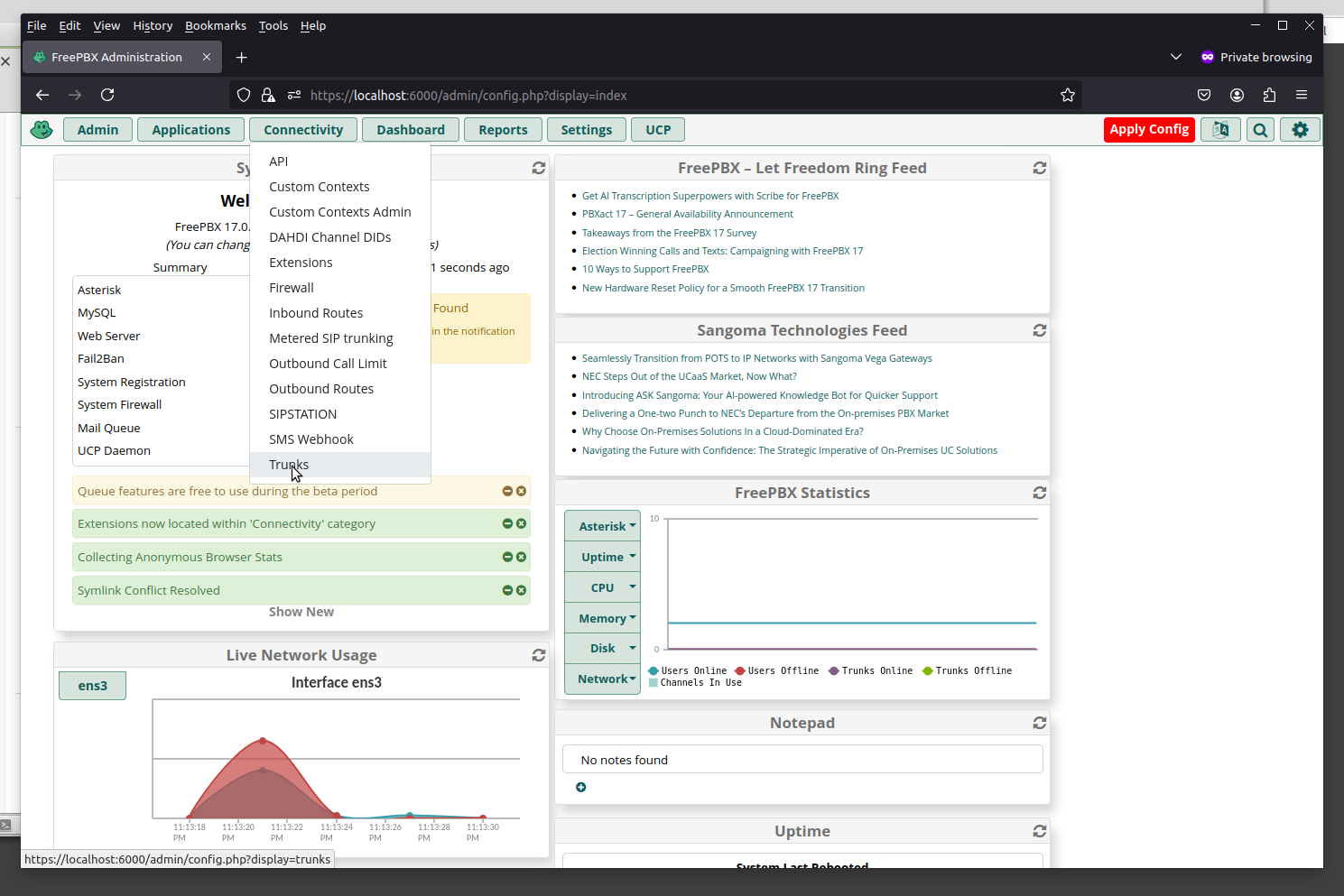
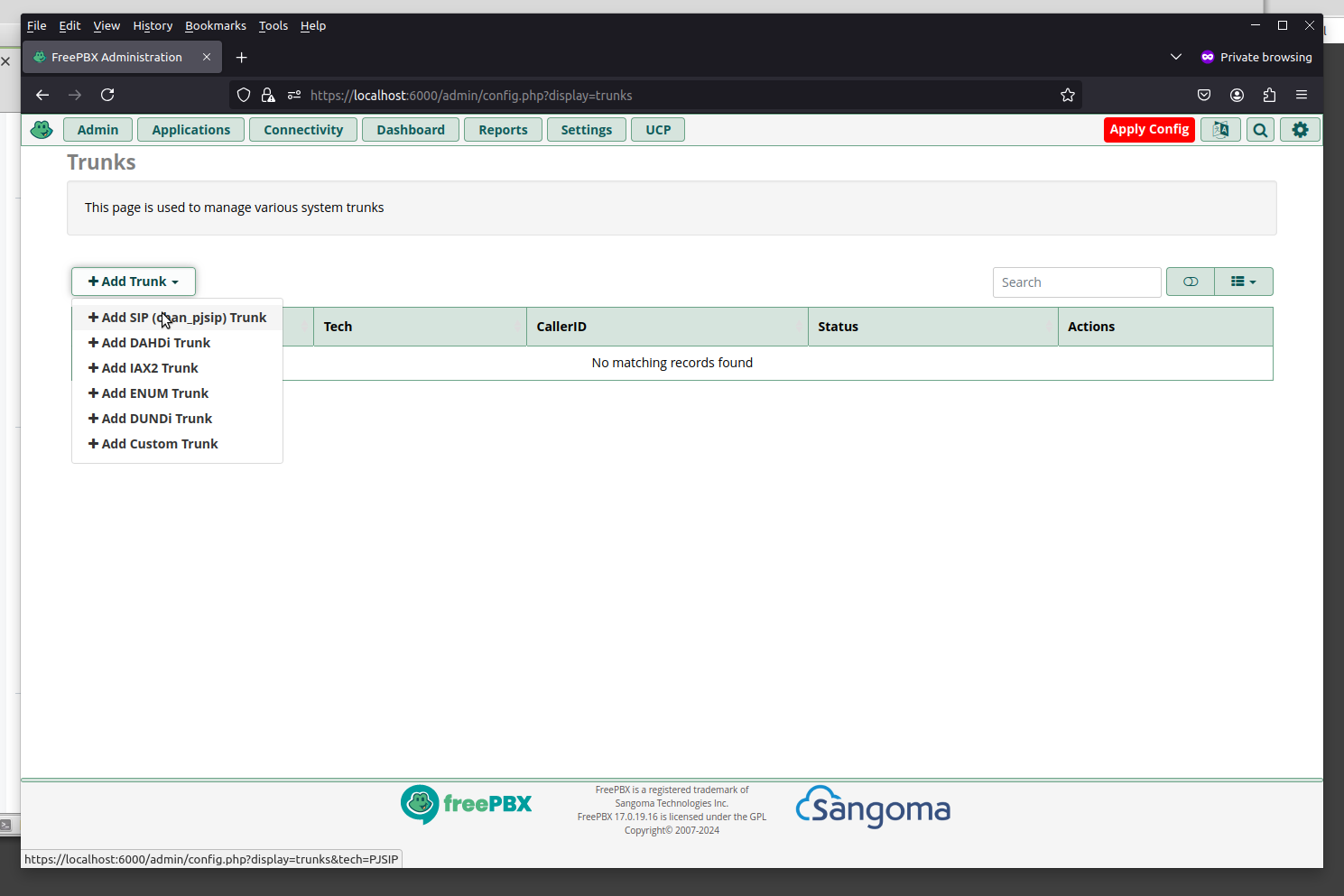
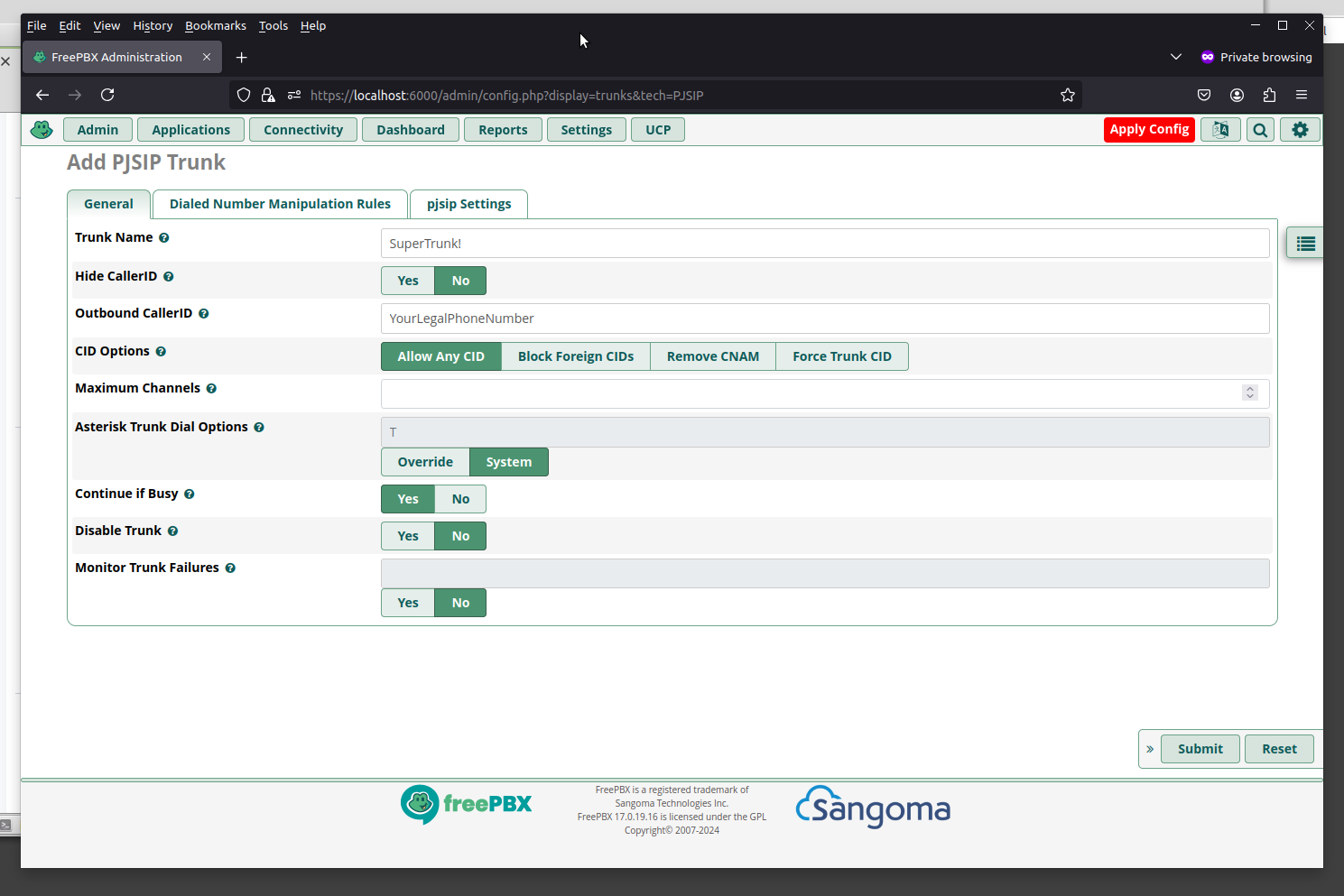
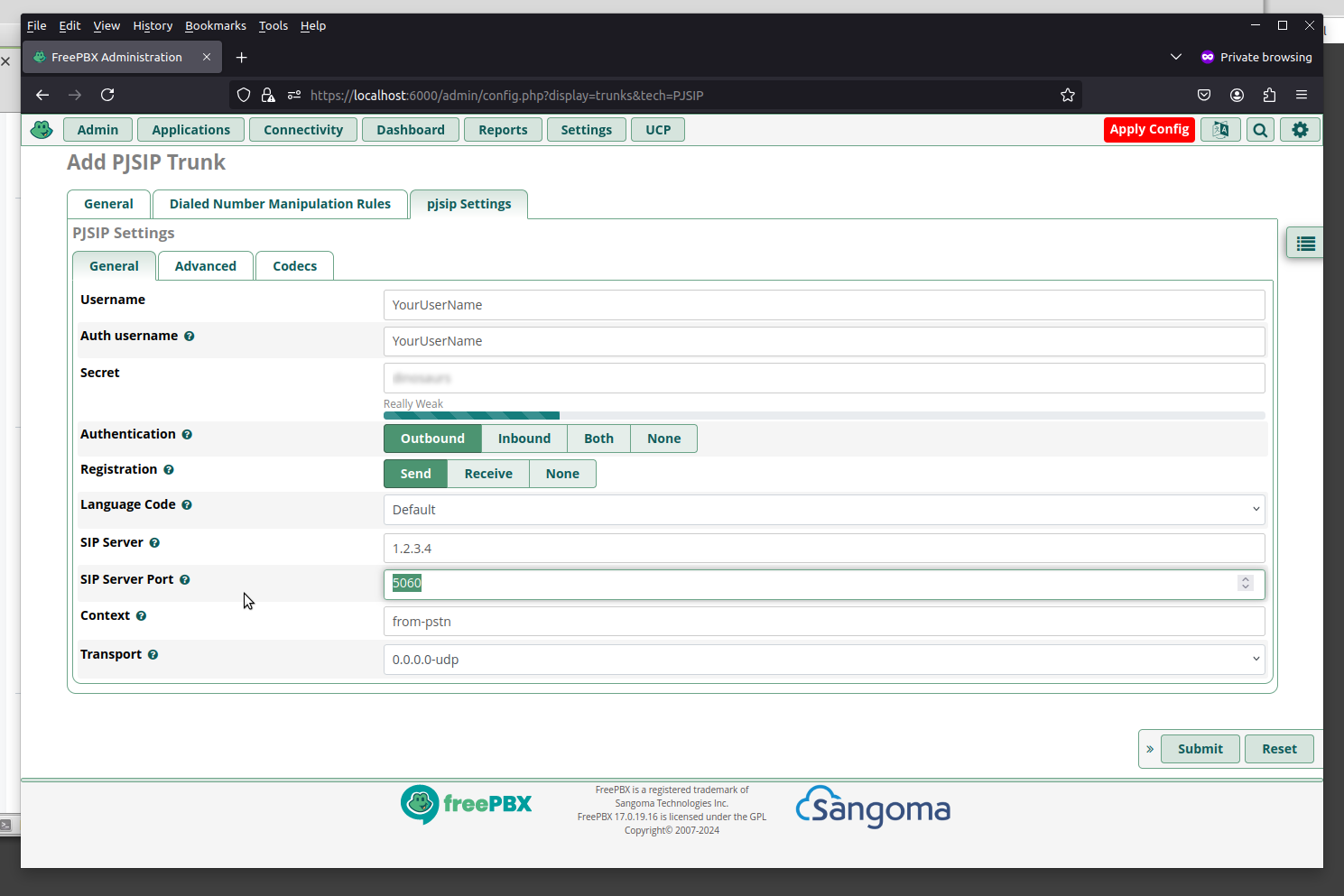
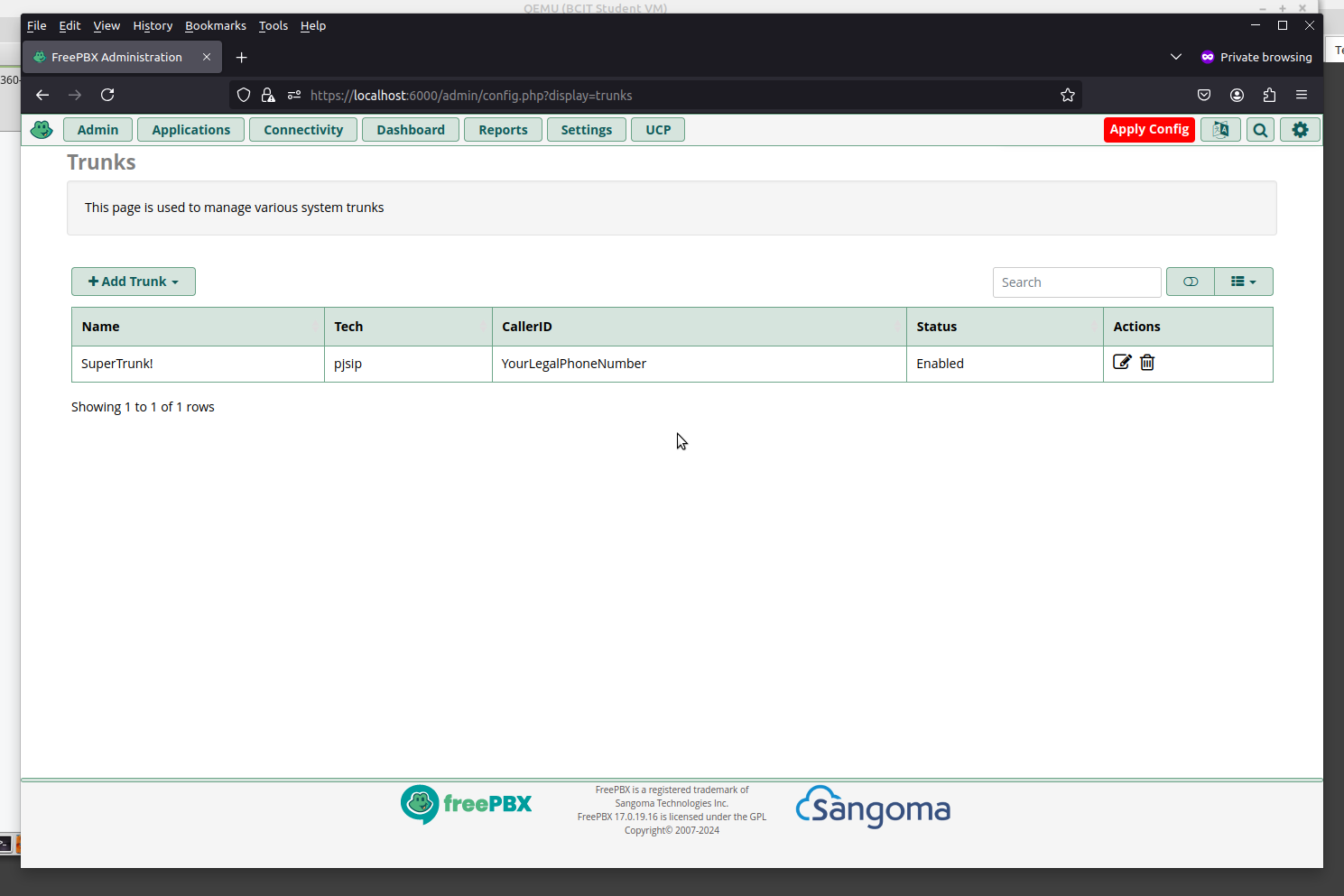
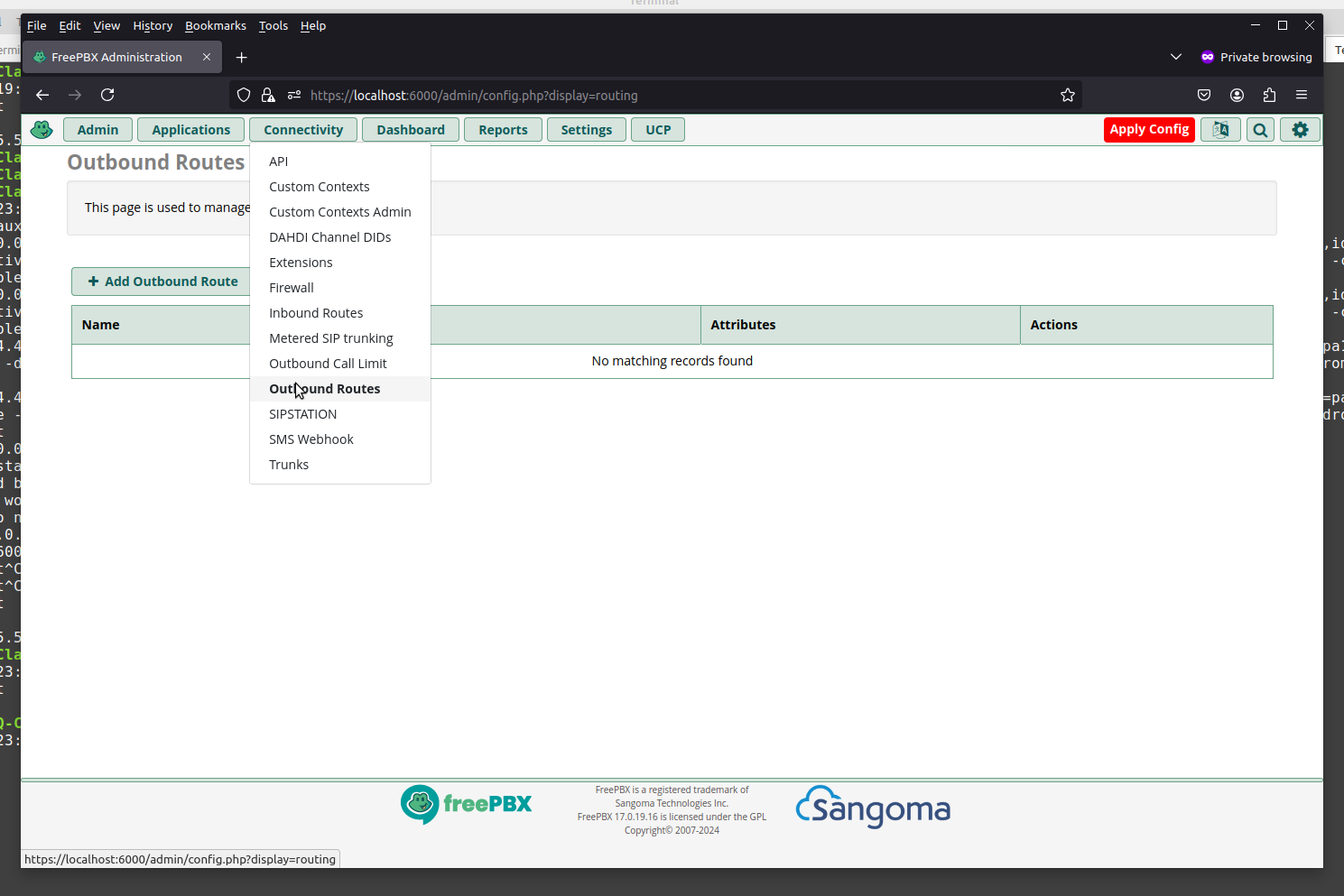
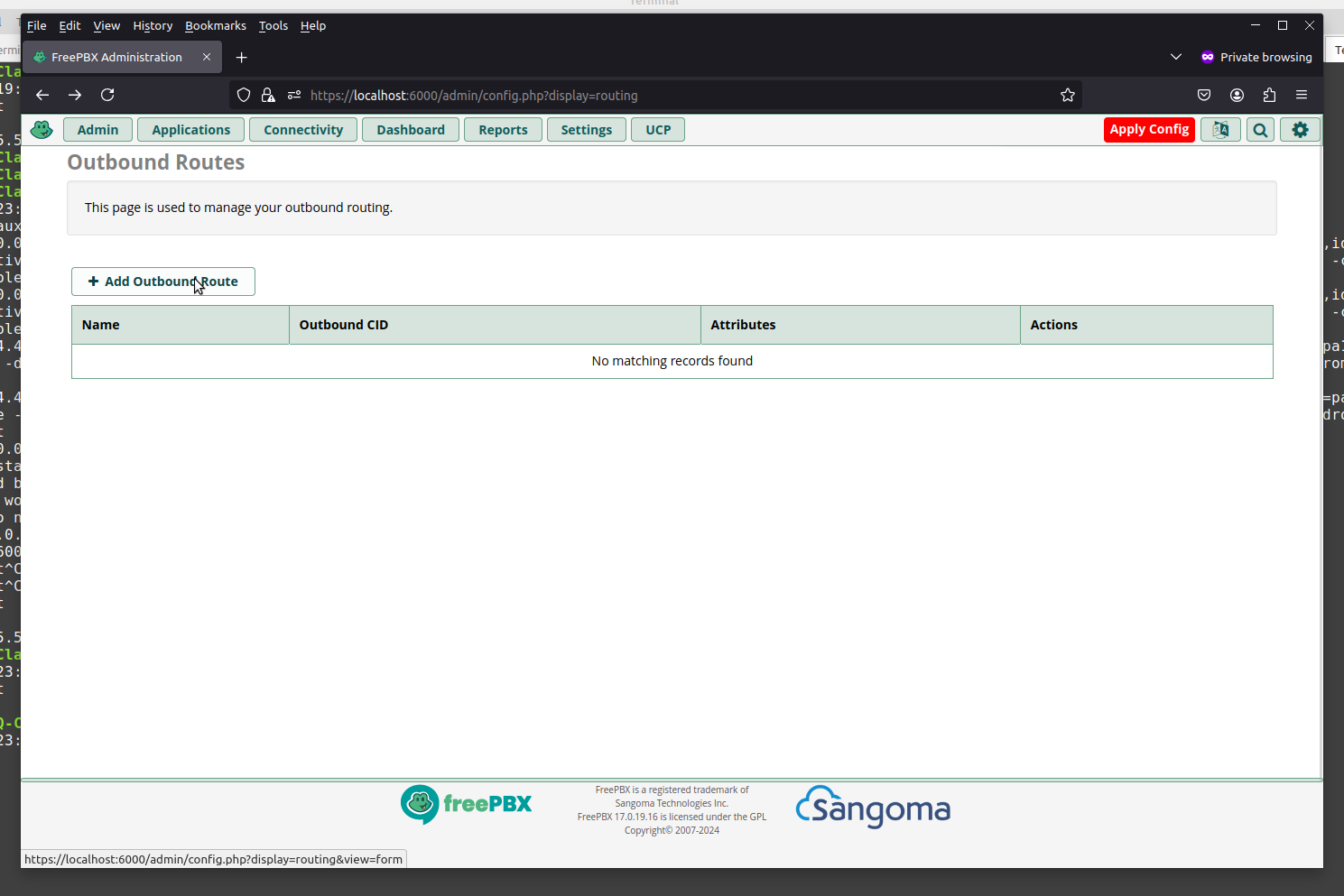
Make sure you choose your Trunk under "Trunk Sequence for Matched Routes"
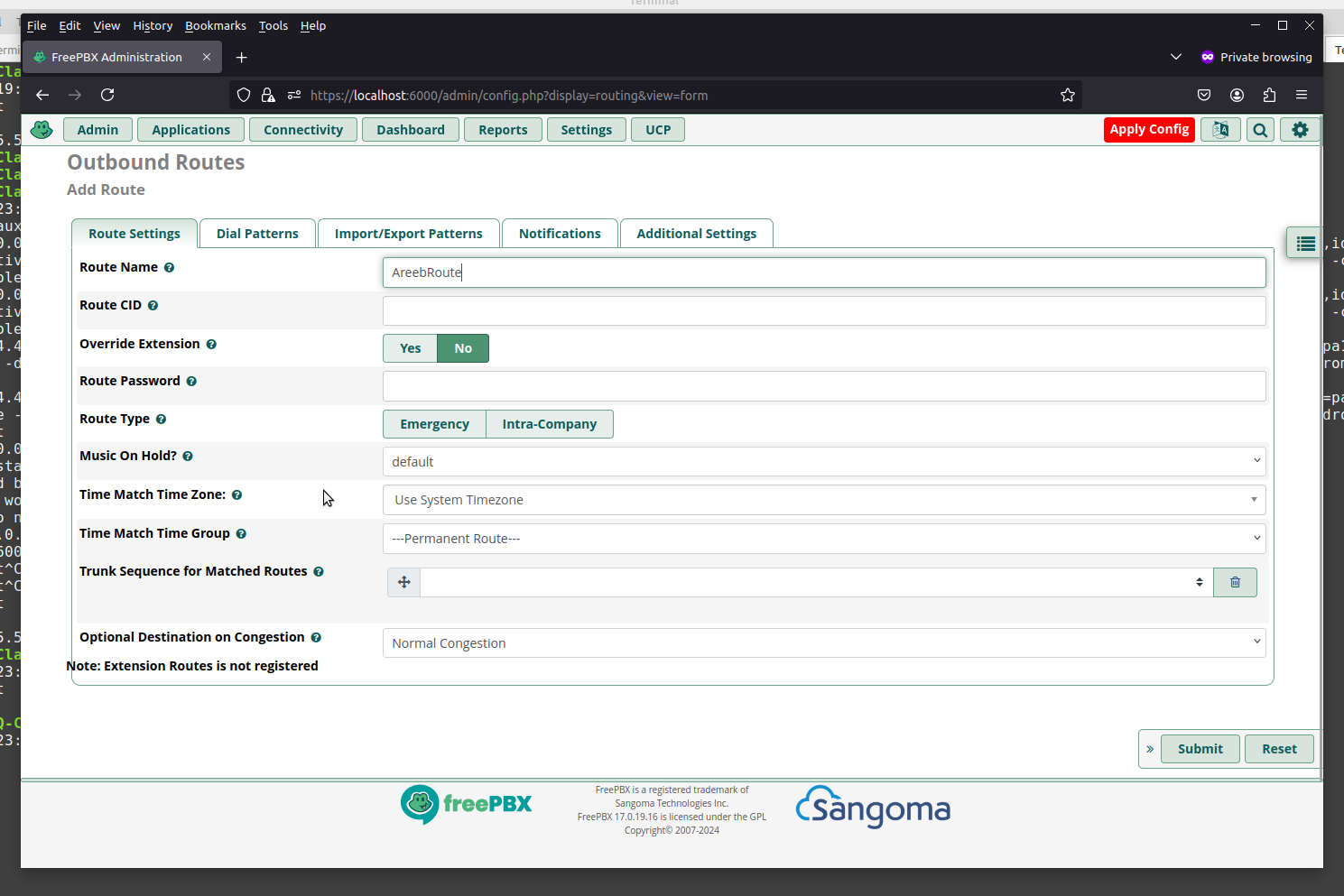
Setup Your Dial-Patterns Using the Wizard
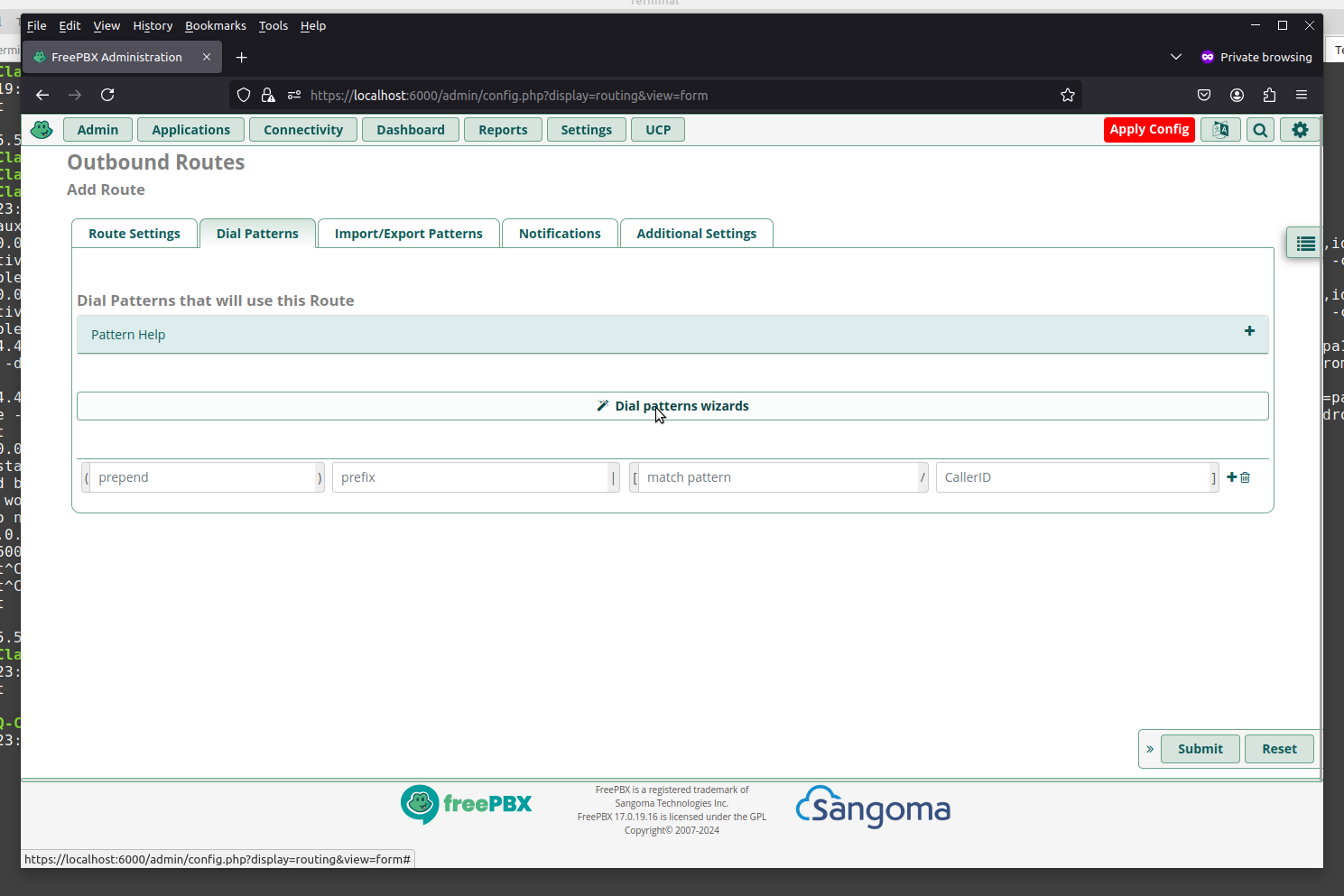
Remember to Click Submit and then Apply
Docker Container Onboot Policy - How to make sure a container is always running
Generally most containers are by default set not to start automatically.
Ther eare 3 settings for the "RestartPolicy" of containers:
No: Do not automatically restart the container (default).Always: Always restart the container regardless of the exit status.Unless-stopped: Always restart the container unless it is explicitly stopped.On-failure: Restart the container only if it exits with a non-zero status
Here is how you can see the policy:
docker ps -aq | xargs -I {} docker inspect --format='{{.Name}}: {{.HostConfig.RestartPolicy.Name}}' {}
We can see the output of all containers on the node and in the case below we see that all 3 are set to "no".
/festive_wiles: no
/magical_goldberg: no
/angry_hamilton: no
Say if we wanted "festive_wiles" to always be running (eg. if the server/node is rebooted we want the container to startup automatically):
docker update --restart=always festive_wiles
How can set these startup/restart settings when creating the container?
We just specify --restart=
docker run --name YourContainerName --restart=Always -d nginx
FreePBX 17 How To Add Phones / Extensions and Register
Step 1 - Login to FreePBX and Go to Connectivity
Click Connectivity -> Extensions
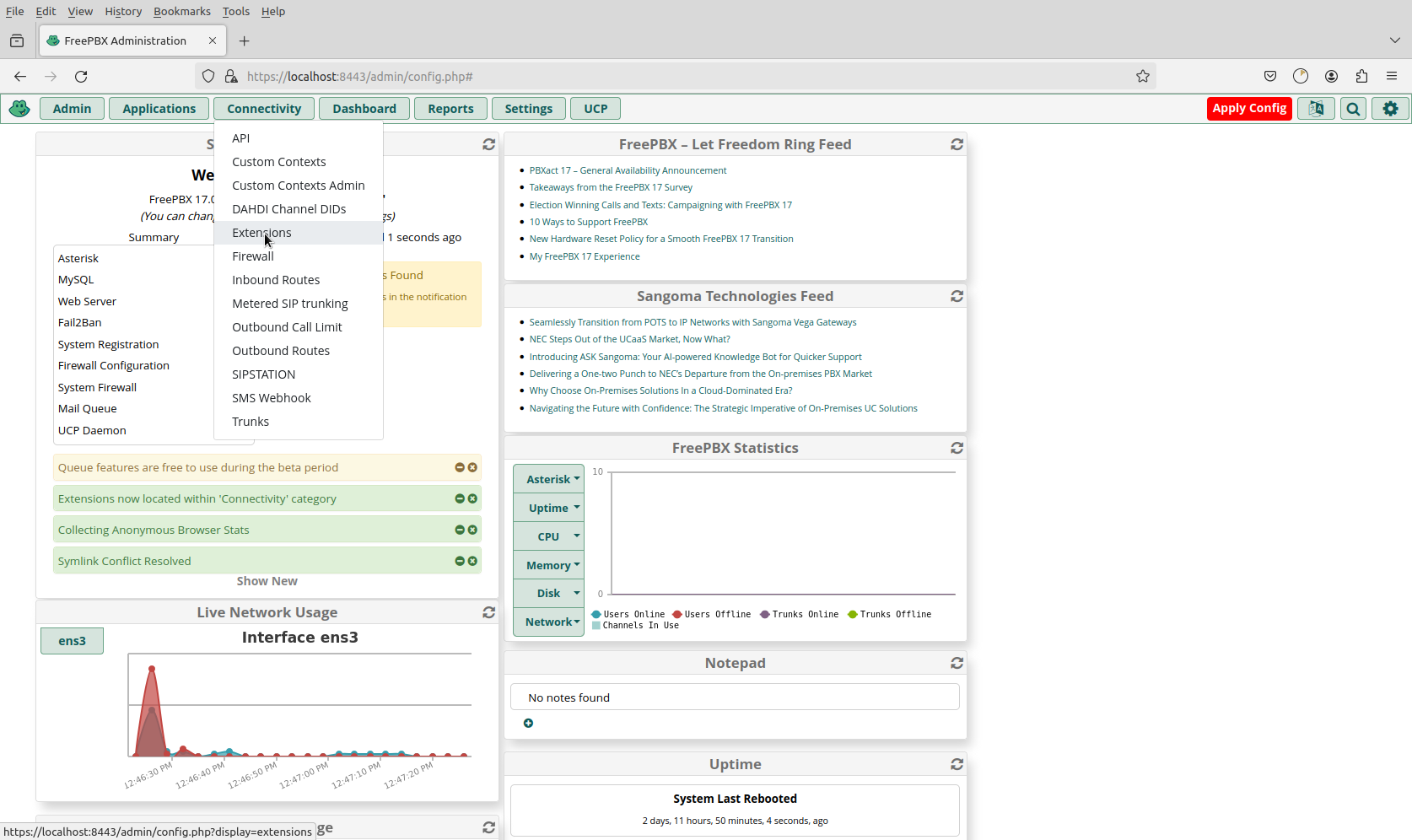
Step 2 - Create Extension
Click on "Quick Create Extension" or "Add Extension".
Quick is fine for more users, unless you have more specific requirements.
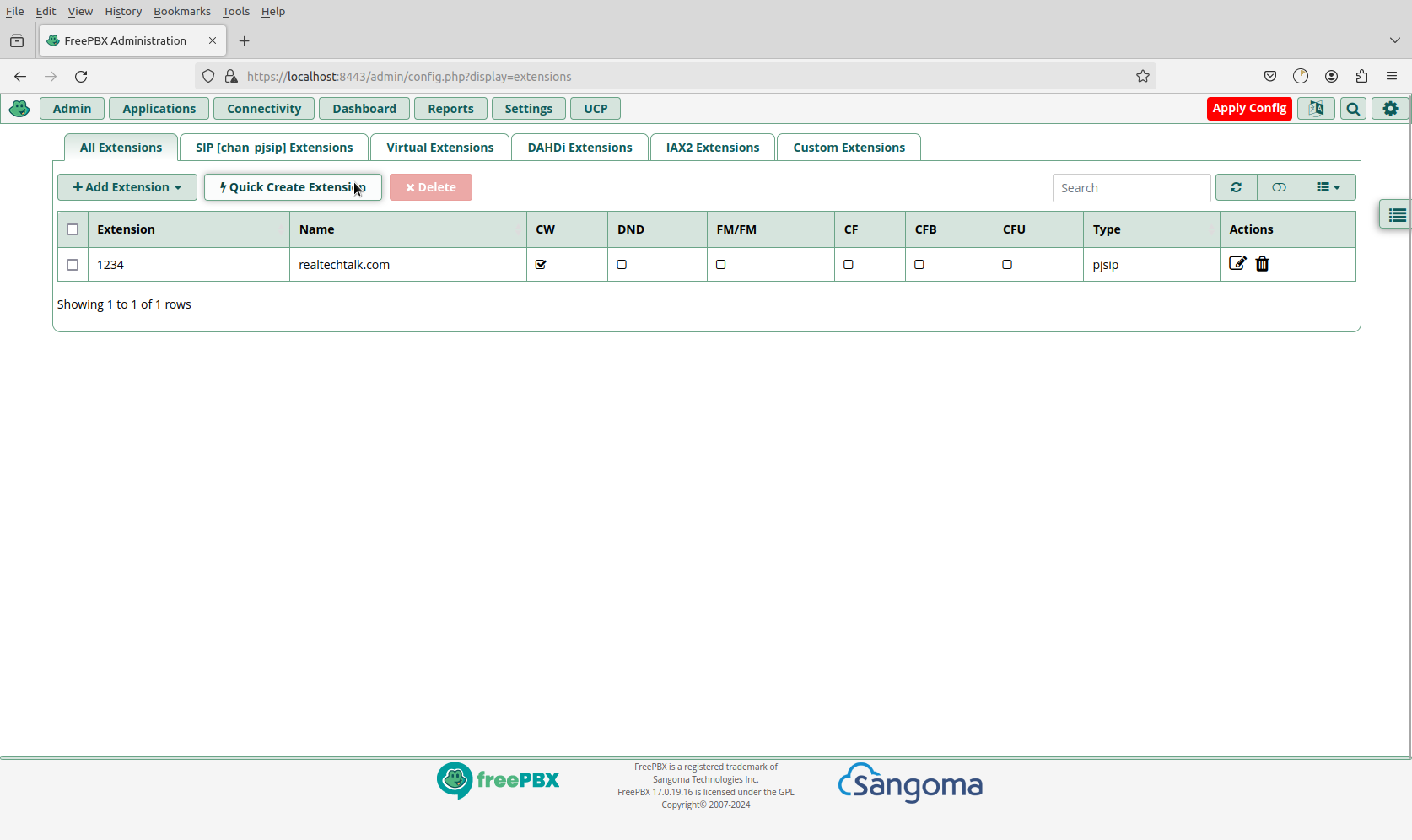
Step 3 - Create the Extension
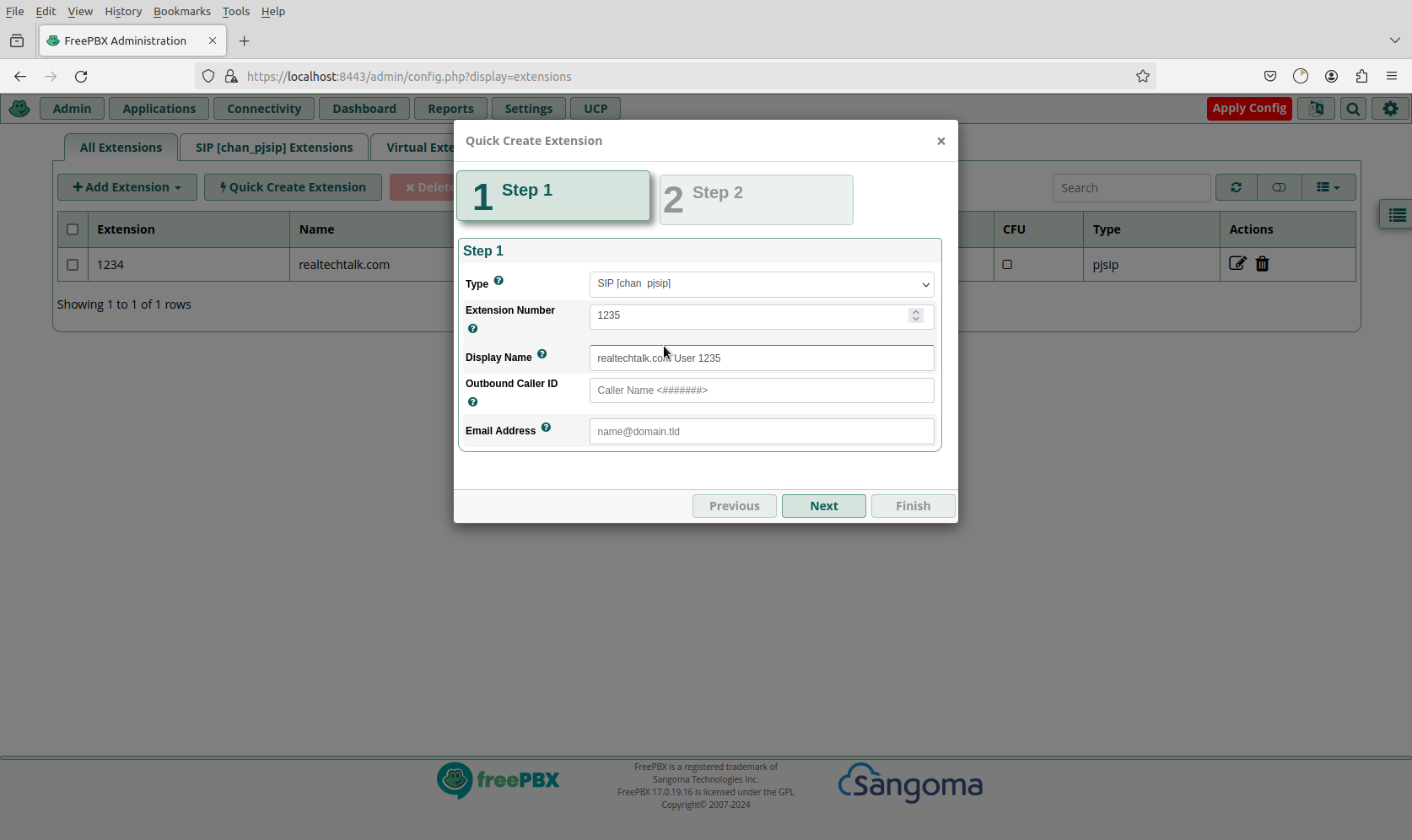
Once you click finish, the details are then e-mailed to the user.
If you use Quick Create, you can just edit the extension and click on their "secret" field to find the password.
To make your SIP softphone or real register use the following info:
SIP Server: Your IP/Domain of FreePBX
Username: Extension# (eg 1234)
Password: the secret
3CX Example
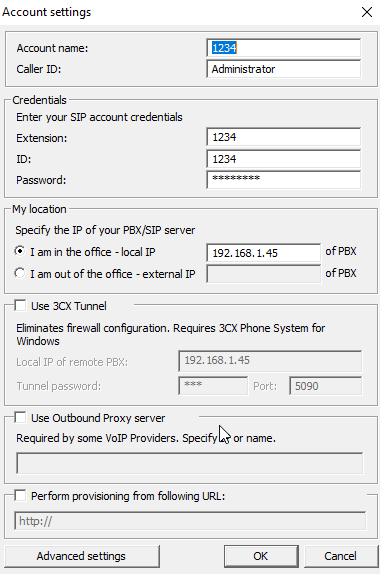
Warning: The driver descriptor says the physical block size is 2048 bytes, but Linux says it is 512 bytes. solution
Disk /dev/sdb: 15.22 GiB, 16336814080 bytes, 31907840 sectors
Disk model: SD/MMC
Units: sectors of 1 * 512 = 512 bytes
Sector size (logical/physical): 512 bytes / 512 bytes
I/O size (minimum/optimal): 512 bytes / 512 bytes
Disklabel type: dos
Disk identifier: 0x00000000
The fdisk output is above and below is the error you may get when trying to use the drive or even format it.
Warning: The driver descriptor says the physical block size is 2048 bytes, but Linux says it is 512 bytes.
wipefs is a useful tool to show us what filesystems exist on the drive.
root@mint:/home/mint# wipefs /dev/sdb
DEVICE OFFSET TYPE UUID LABEL
sdb 0x52 vfat 53E2-5BC6
sdb 0x0 vfat 53E2-5BC6
sdb 0x1fe vfat 53E2-5BC6
Let's wipe out all filesystems to fix the error
Make sure you have backed up any data.
Change sdX below with the actual drive you want to do this to.
wipefs --all /dev/sdX
Cisco How To Use a Third Party SIP Phone (eg. Avaya, 3CX)
Most relevant config points from my video here.
1.) Create a new End User
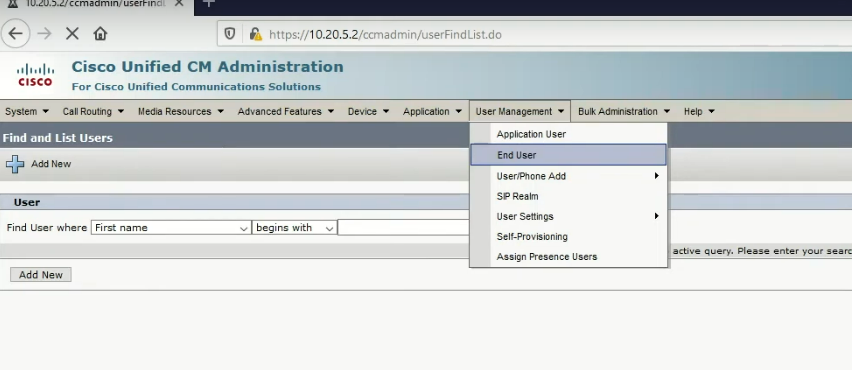
The most important part is setting the "Digest Credentials", that is the password that the phone will use to authenticate.
2.) Add a New Phone
Device -> Phone
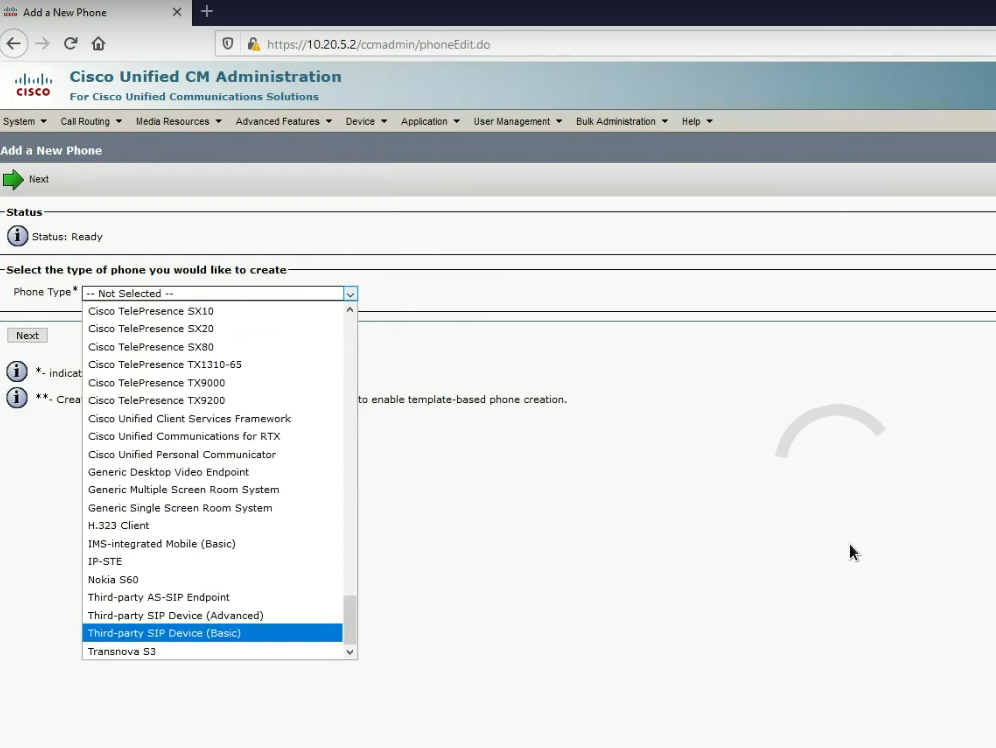
3.)
Set a fake MAC address in the right format eg. AAABBBCCCDDD.
Remember to assign the phone to the user you created earlier.
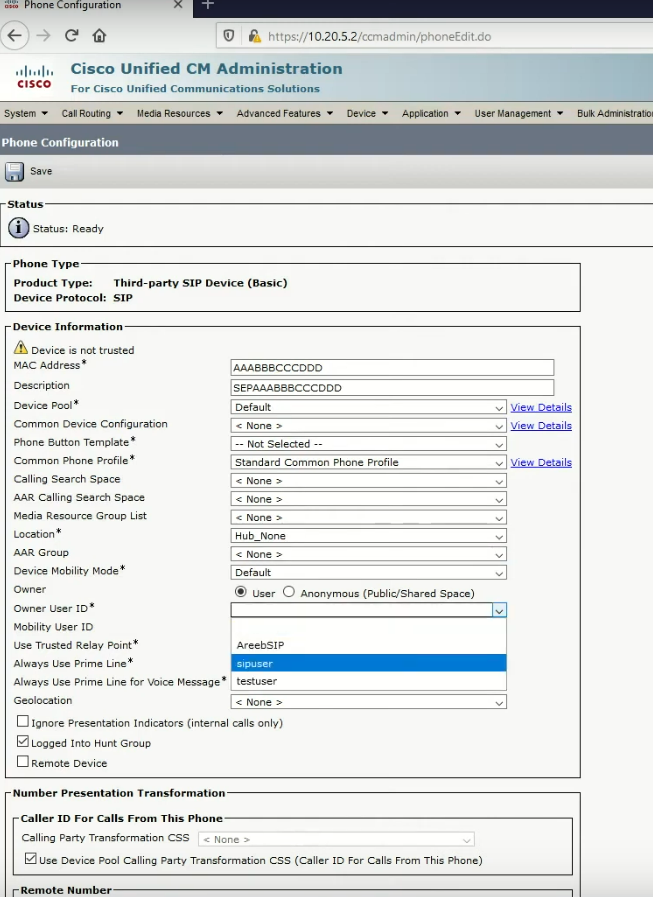
Set the "Third-party SIP Device Basic - Standard SIP" security profile as below.
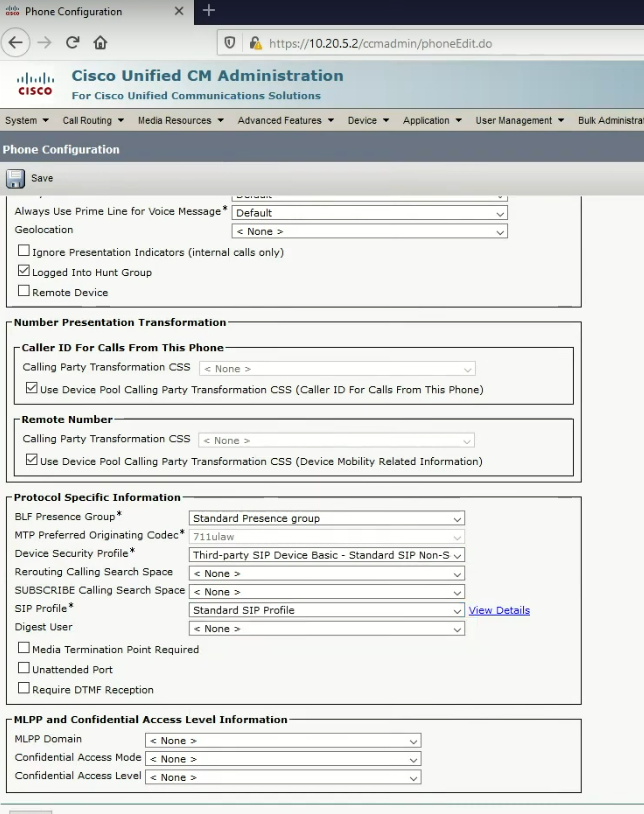
Scroll down and set the Digest user to the user we sent earlier.
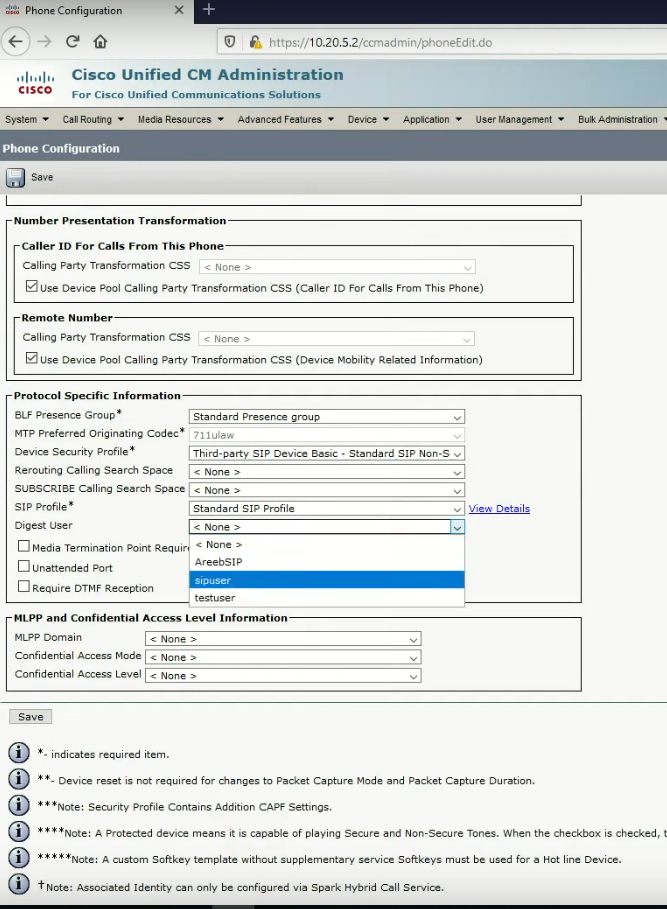
Remember to create a DN, your phone will then authenticate with the DN as the username and the password of the "Digest User".
Cisco Unified Communication Manager (CUCM) - How To Add Phones
Before starting you should reset your phone(s) if they have been previously registered to another CME/CUCM:
Before starting go to "Cisco Unified Serviceability" drop-down on the top-right
Under Tools go to Service Activation.
Enable "CallManger" and "tftp" in order for phones to register.
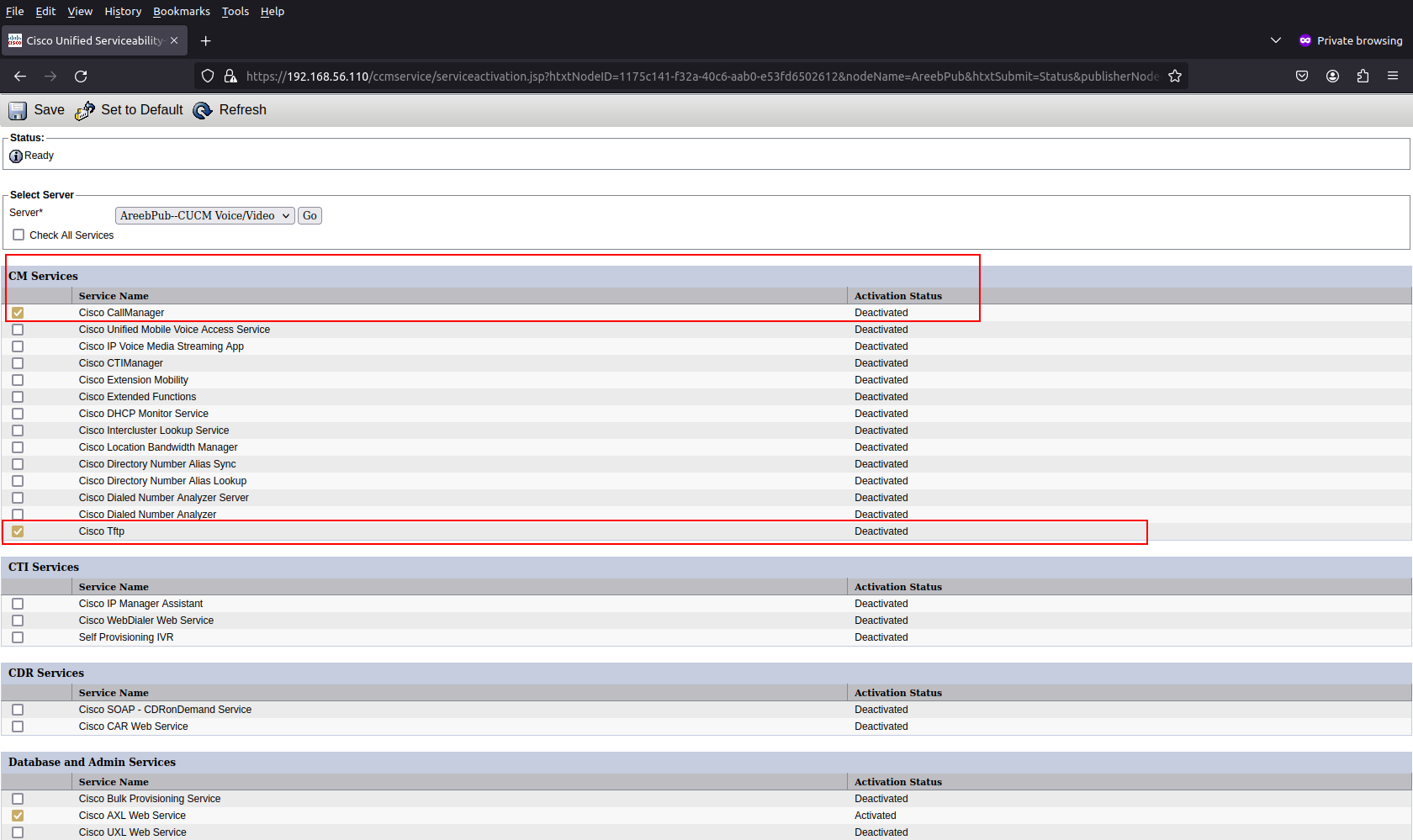
Step 1 - Go The Phone Menu 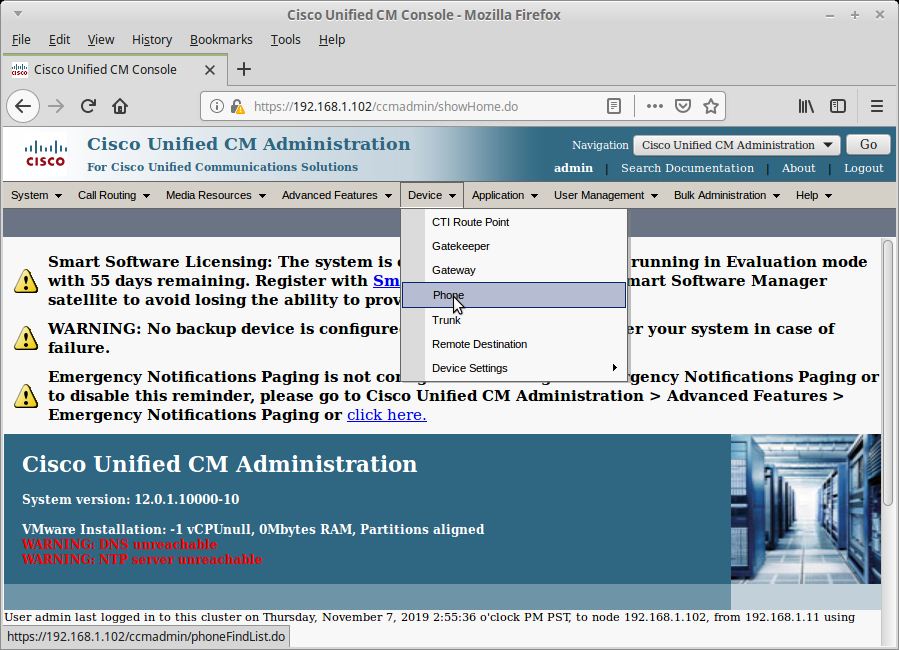
Step 2 - Add New Phone 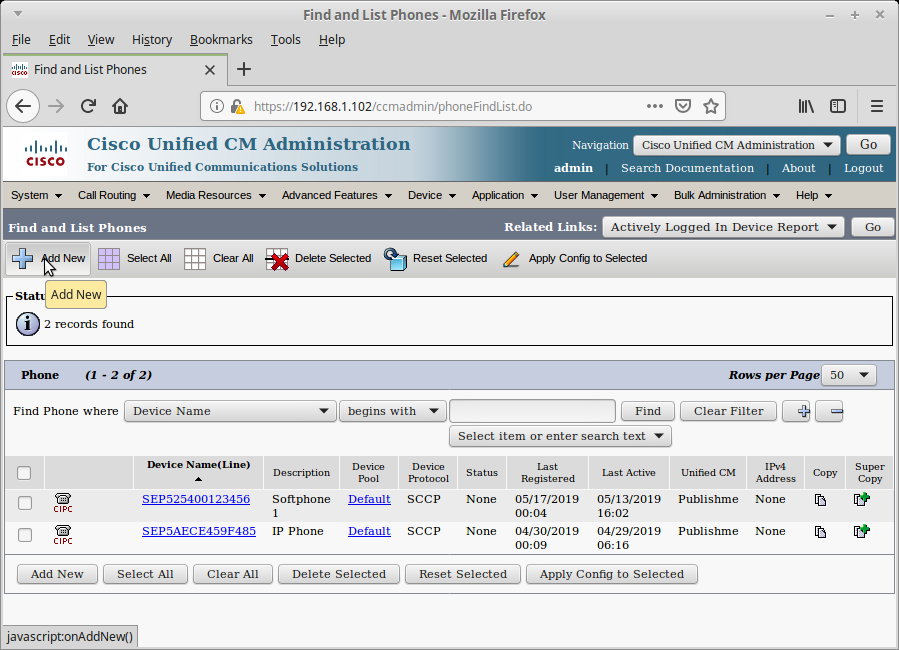
Step 3 - Choose Phone Type 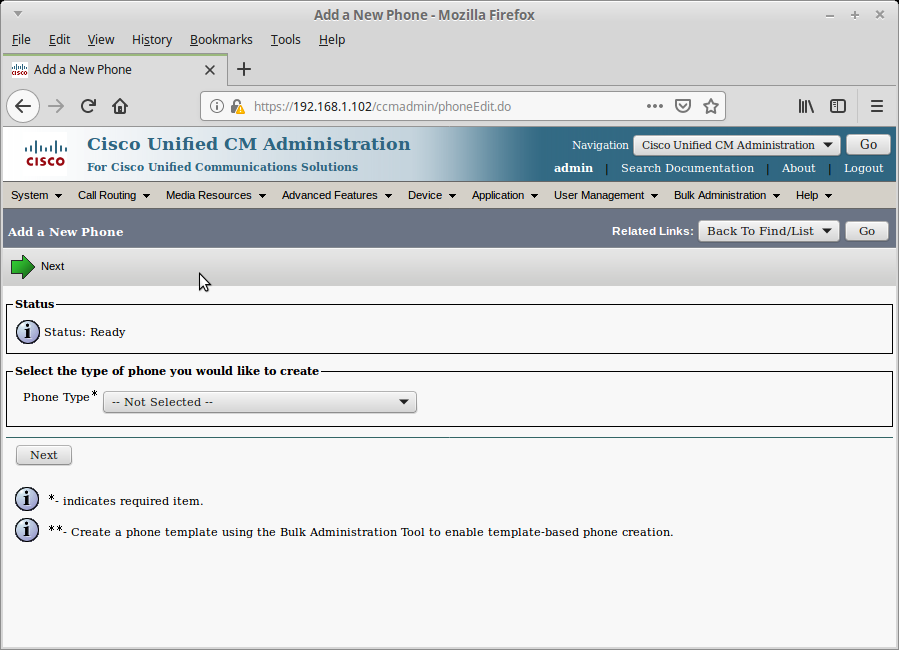
Step 4 - Set Phone MAC
The format is SEPMACADDRESS
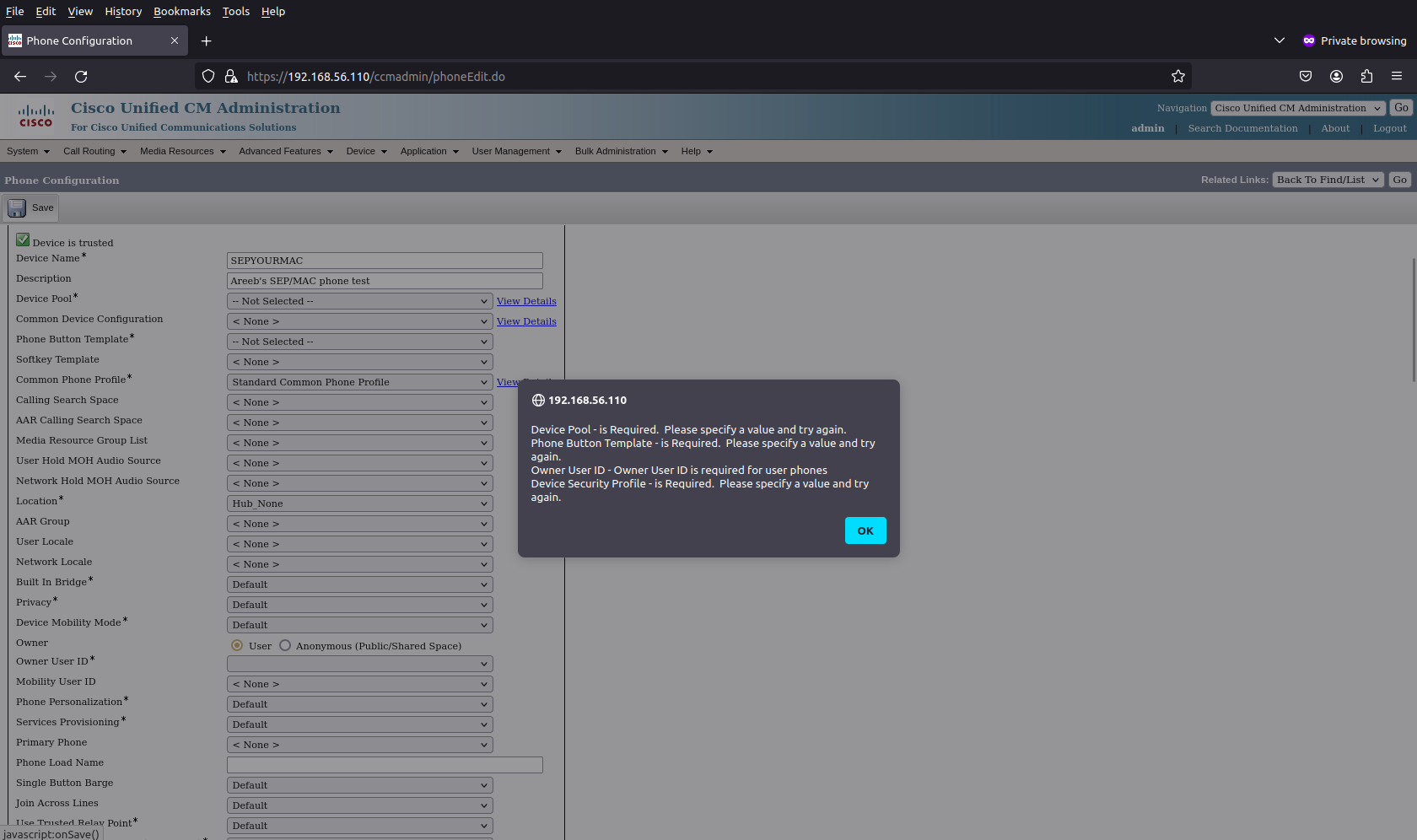
As we can see, the minimum requirements are that we specify the following:
Device Name:
Device Pool:
Owner User ID:
Device Security Profile:
Step 5 - Add New DN (top left) 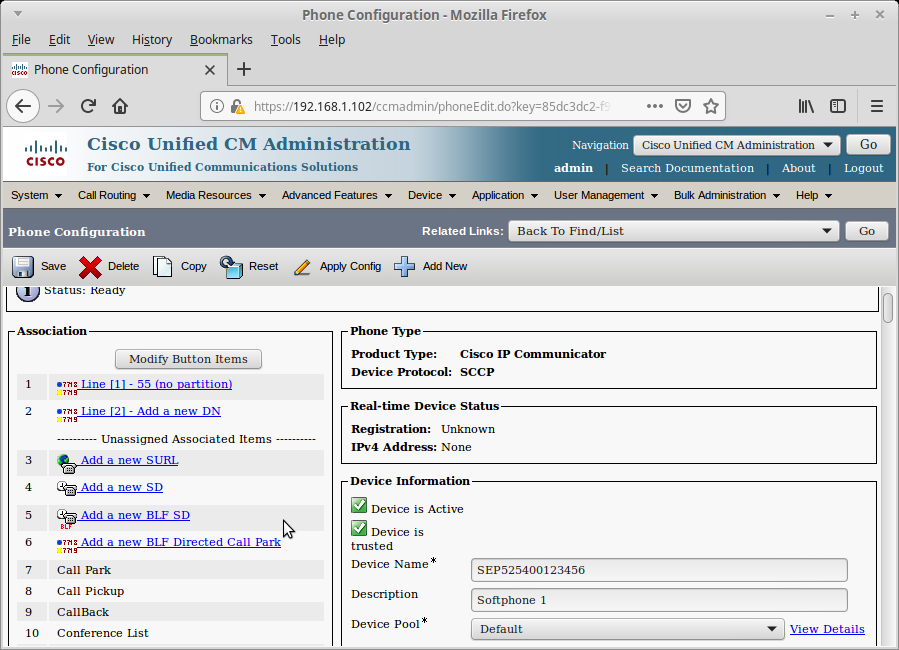
pptp / pptpd not working in DD-WRT iptables / router
Although it is well-known that pptp is not secure and is subject to many forms of attacks, the reality is that a lot of legacy and embedded devices use pptp. I argue that if it is being used for routing or remote access or over an already secure connection (eg. another VPN like ikev2) then this is still acceptable. Or in a LAN or in a public environment where no private data is exchanged. However, if the nature of the data is extremely sensitive, you should do whatever it takes to have the second layer of encryption by using a secure VPN protocol.
In iptables you can find many threads and discussions about how to make pptp work with iptables, with crazy forwarding rules and blindly and manually allowing all GRE etc... However it's much more simple in my experience. You just need to enable the netfilter conntracking to be able to connect your pptp client.
This solution also applies to a node running Kubernetes and Docker containers (eg. an embedded device that is for some odd reason using pptp). If you can, switch to ikev2 or OpenVPN.
sysctl -w net.netfilter.nf_conntrack_helper=1
For permanent changes add this to /etc/sysctl.conf:
net.netfilter.nf_conntrack_helper=1
There are other modules necessary to make pptp work, but you can see that any recent kernel will load them on its own:
nf_nat_pptp 20480 0
nf_conntrack_pptp 24576 1 nf_nat_pptp
nf_nat 45056 3 nf_nat_pptp,iptable_nat,xt_MASQUERADE
nf_conntrack 139264 6 xt_conntrack,nf_nat,nf_conntrack_pptp,nf_nat_pptp,nf_conntrack_netlink,xt_MASQUERADE
systemd-journald high memory usage solution
Sometimes systemd-journald can take several hundred megs of RAM or more which is bad for microservices and embedded devices.
Edit /etc/systemd/journald.conf
You can set it to max 5M of RAM like below:
SystemMaxUse=5M
How to Install FreePBX 17 in Linux Debian Ubuntu Mint Guide
FreePBX official install guide is here.
Requirements:
- Debian 12 Download Link
- Minimal - System Utilities
- RAM: 4G
- HDD: 20G
Note that if you don't have the required base OS you will get an error like this at the end of the install
2024-10-23 00:30:22 - Upgrading FreePBX 17 modules
2024-10-23 00:30:22 - Installation failed at step Upgrading FreePBX 17 modules. Please check log /var/log/pbx/freepbx17-install-2024.11.05-00.14.36.log for details.
2024-10-23 00:30:22 - Error at line: 1135 exiting with code 255 (last command was: fwconsole ma upgradeall >> $log)
2024-10-23 00:30:22 - Exiting script
#log
In modulefunctions.class.php line 2814:
preg_replace(): Passing null to parameter #3 ($subject) of type array|string is deprecated
moduleadmin [-f|--force] [-d|--debug] [--edge] [--ignorecache] [--stable] [--color] [--skipchown] [-e|--autoenable] [--skipdisabled] [--snapshot SNAPSHOT] [--format FORMAT] [-R|--repo REPO] [-t|--tag TAG] [--skipbreakingcheck] [--sendemail] [--onlystdout] [--] [
2024-10-23 00:30:22 - ****** INSTALLATION FAILED *****
2024-10-23 00:30:22 - Installation failed at step Upgrading FreePBX 17 modules. Please check log /var/log/pbx/freepbx17-install-2024.11.05-00.14.36.log for details.
2024-10-23 00:30:22 - Error at line: 1135 exiting with code 255 (last command was: fwconsole ma upgradeall >> $log)
2024-10-23 00:30:22 - Exiting script
Step 1- Get and execute the official Sangoma (maker of Asterisk) install script:
wget https://github.com/FreePBX/sng_freepbx_debian_install/raw/master/sng_freepbx_debian_install.sh
bash sng_freepbx_debian_install.sh
The install took about 20 minutes for me on a single core Xeon on an SSD.
If successful it should look like this at the end:
______ ______ ______ __ __
| ___| | ___ | ___ \ / /
| |_ _ __ ___ ___ | |_/ /| |_/ / V /
| _| | '__| / _ / _ | __/ | ___ /
| | | | | __/| __/| | | |_/ // /^
_| |_| ___| ___|_| ____/ / /
NOTICE! You have 4 notifications! Please log into the UI to see them!
Current Network Configuration
+-----------+-------------------+---------------------------+
| Interface | MAC Address | IP Addresses |
+-----------+-------------------+---------------------------+
| ens3 | | |
| | | fe80::dcad:beff:feef:6e79 |
+-----------+-------------------+---------------------------+
Please note most tasks should be handled through the GUI.
You can access the GUI by typing one of the above IPs in to your web browser.
For support please visit:
http://www.freepbx.org/support-and-professional-services
+---------------------------------------------------------------------+
| This machine is not activated. Activating your system ensures that |
| your machine is eligible for support and that it has the ability to |
| install Commercial Modules. |
| |
| If you already have a Deployment ID for this machine, simply run: |
| |
| fwconsole sysadmin activate deploymentid |
| |
| to assign that Deployment ID to this system. If this system is new, |
| please go to Activation (which is on the System Admin page in the |
| Web UI) and create a new Deployment there. |
+---------------------------------------------------------------------+
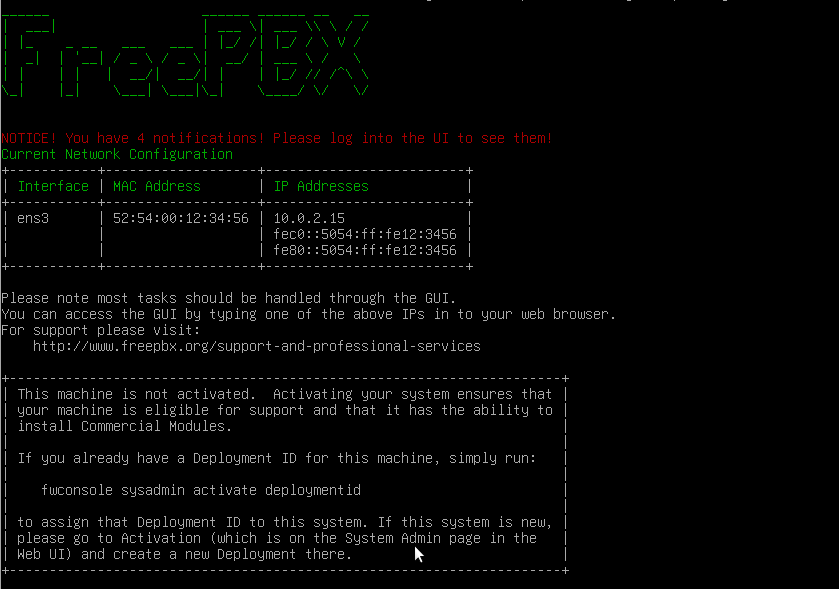
Step 2 - Setup and Login to the GUI
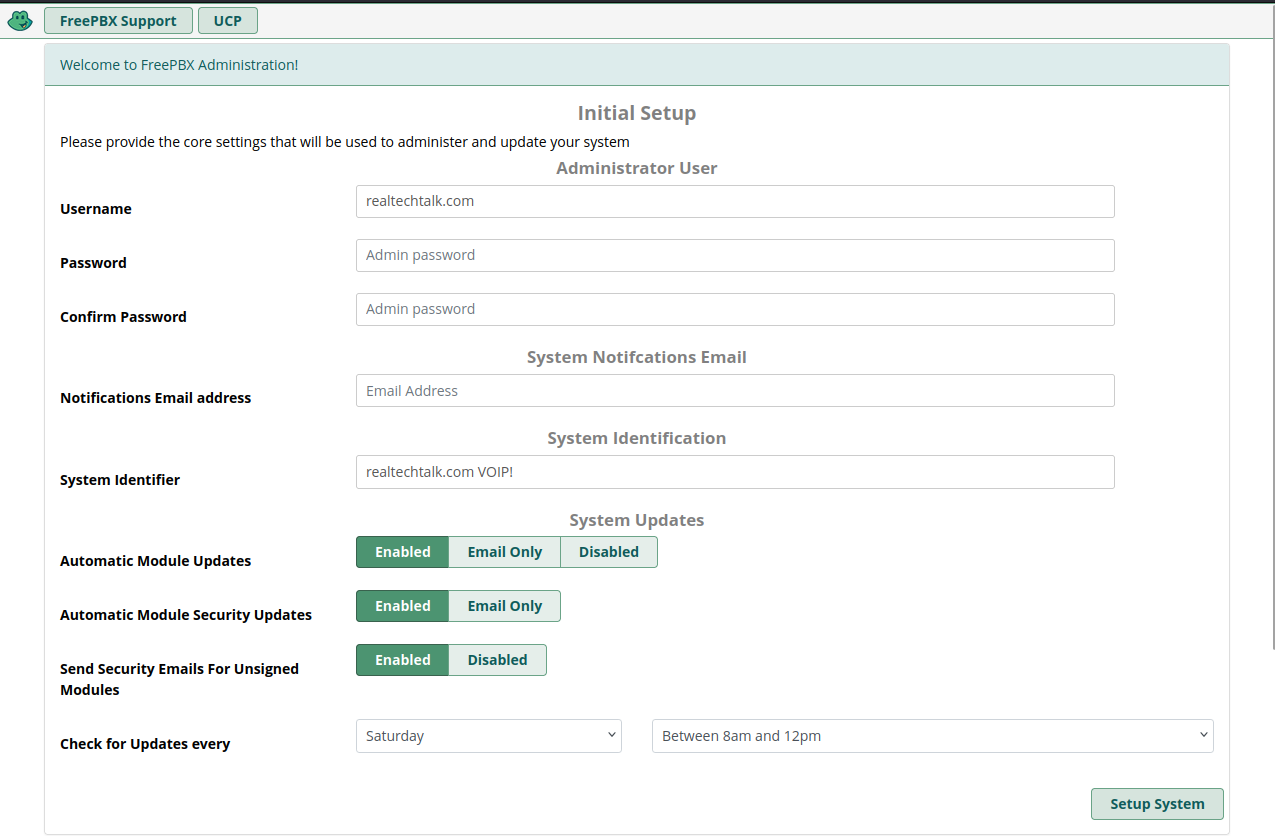
Then enter the Administration Section
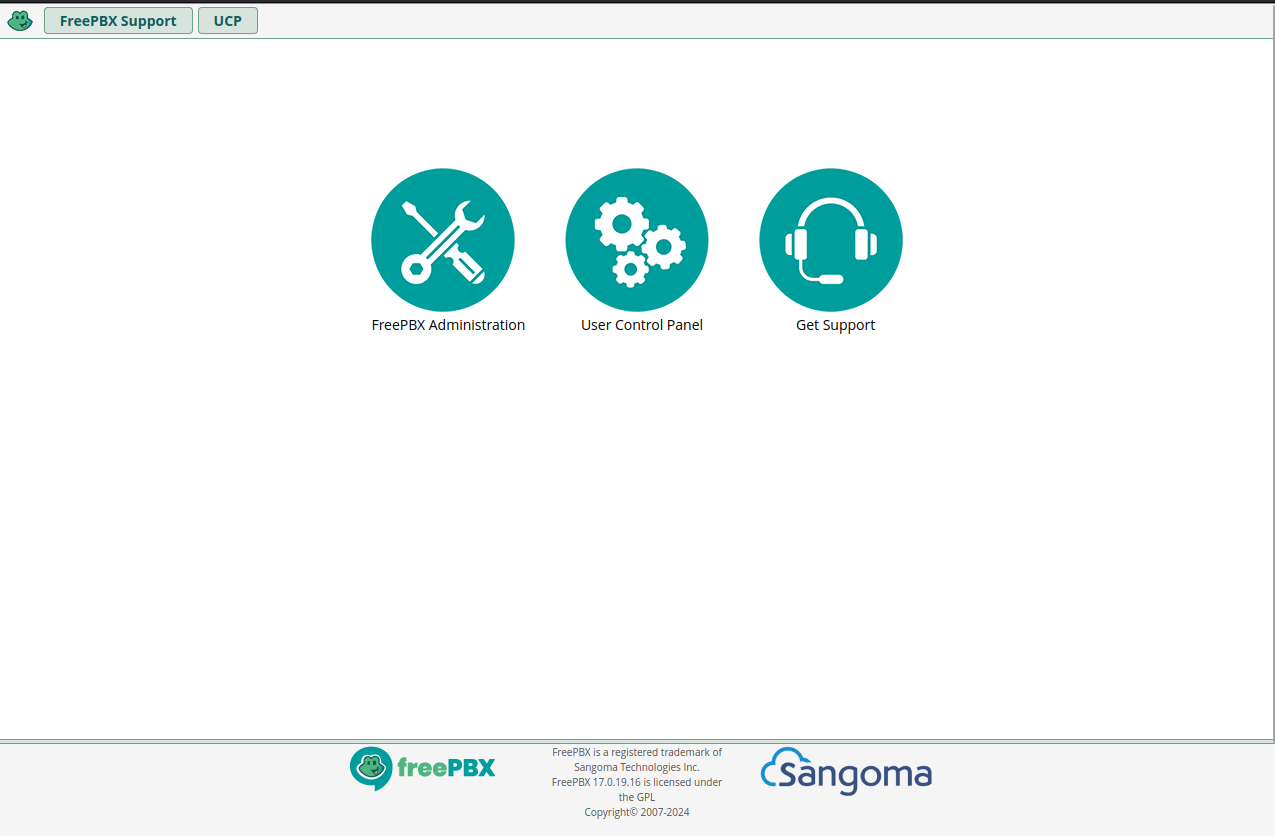
Do all of the default Firewall Settings and then you'll be in the Admin home page
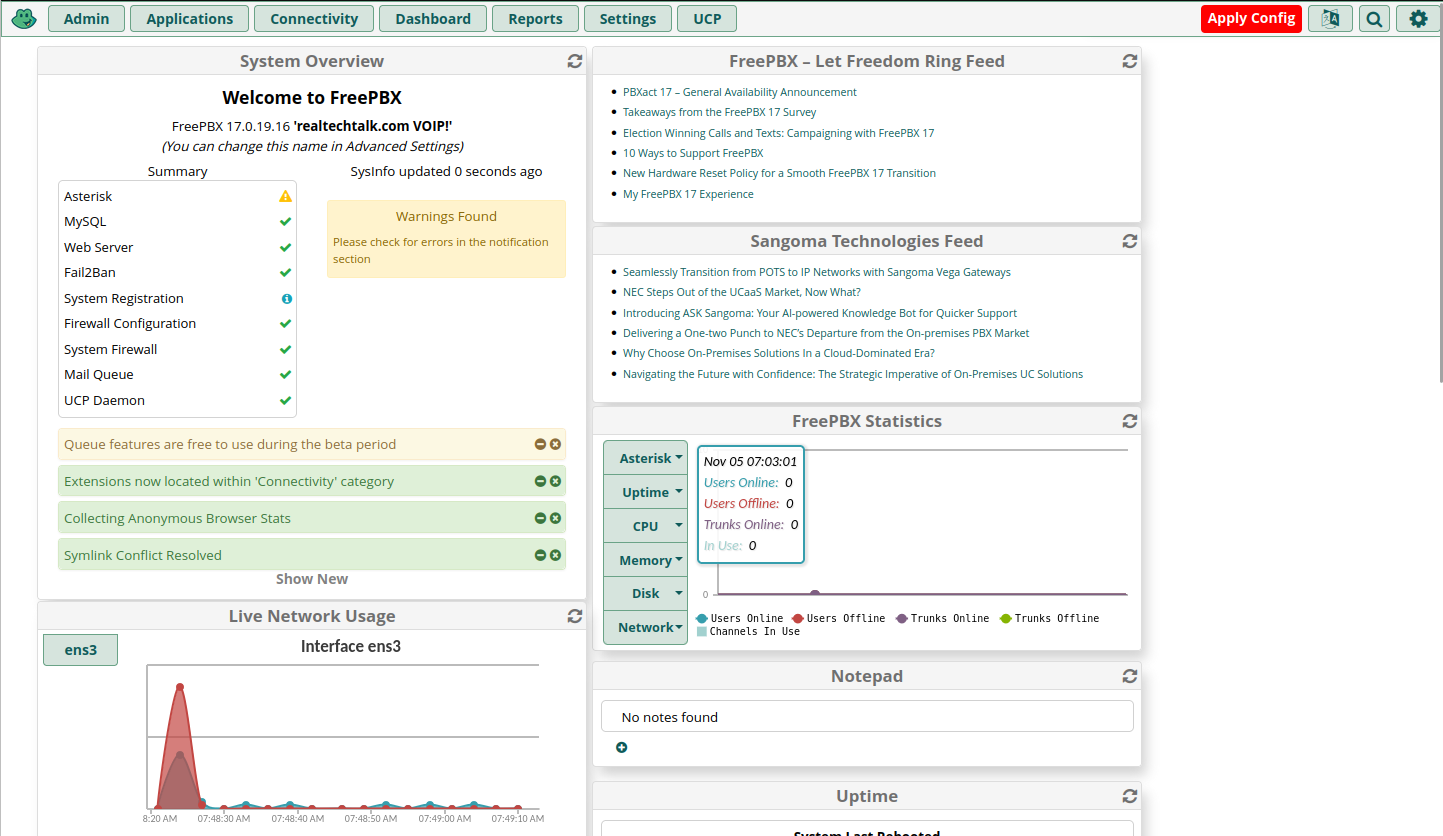
Firewall Issues
CLI Firewall Commands:
fwconsole firewall help
Valid Commands:
disable : Disable the System Firewall. This will shut it down cleanly.
stop : Stop the System Firewall
start : Start (and enable, if disabled) the System Firewall
restart : Restart the System Firewall
lerules [enable] or [disable] : Enable or disable Lets Encrypt rules.
trust : Add the hostname or IP specified to the Trusted Zone
untrust : Remove the hostname or IP specified from the Trusted Zone
list [zone] : List all entries in zone 'zone'
add [zone] [id id id..] : Add to 'zone' the IDs provided.
del [zone] [id id id..] : Delete from 'zone' the IDs provided.
listzones : Show zones that can be used to add and del.
fix_custom_rules : Create the files for the custom rules if they don't exist and set the permissions and owners correctly.
sync : Synchronizes all selected zones of the firewall module with the intrusion detection whitelist.
f2bstatus or f2bs : Display ignored and banned IPs. (Only root user).
When adding or deleting from a zone, one or many IDs may be provided.
These may be IP addresses, hostnames, or networks.
Example:
fwconsole firewall add trusted 10.46.80.0/24 hostname.example.com 1.2.3.4
Note that the firewall in production should never be disabled as there are massive amounts of hackers that target FreePBX and SIP servers. This can be used for learning, but ideally the firewall should be configured to whitelist yourself or other trusted IPs, rather than completely disabling.
If you are locked out:
Change 192.168.1.0/24 to your subnet or IP
iptables -I INPUT -s 192.168.1.0/24 -j ACCEPT
systemctl stop fail2ban
This buys time before the firewall reactivates.
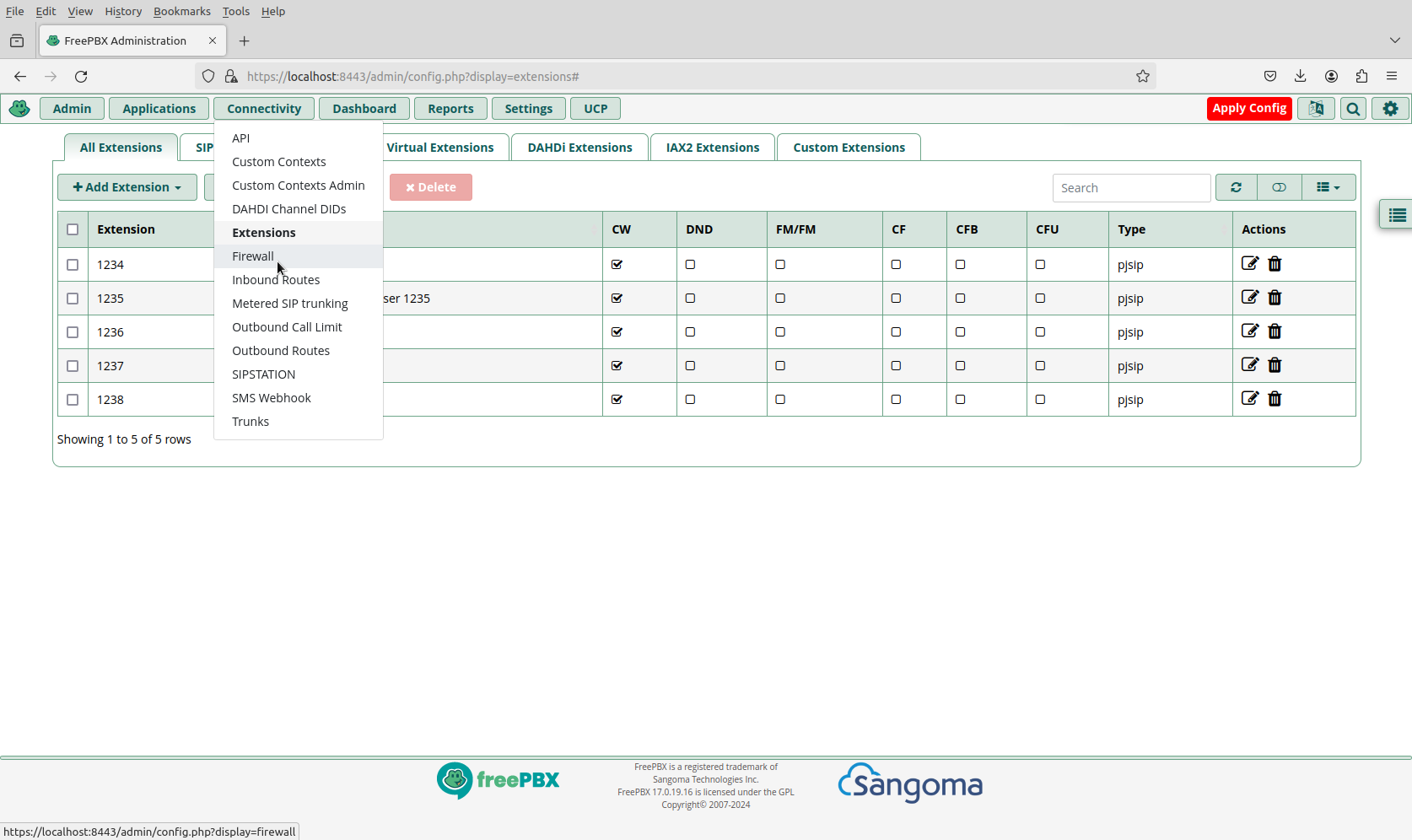
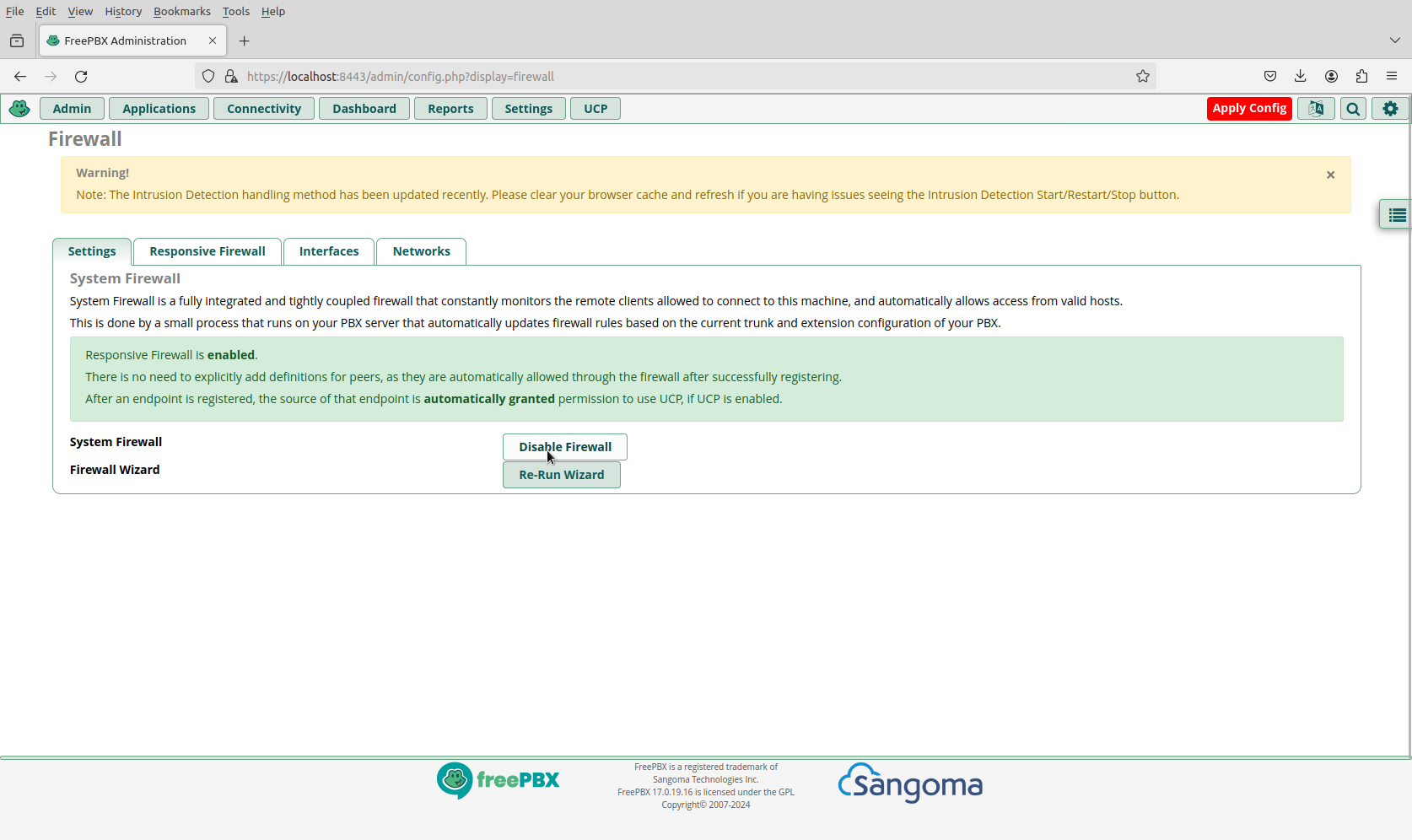
Bug in installer script:
This happens if you try the near impossible by using an older/different Debian
The current script as of 2024-10-11 has a bug where they pass -S to add-apt-repository when it must be a lower case -s which breaks everything as you can see in the log:
esolving deb.freepbx.org (deb.freepbx.org)... 52.217.40.28, 54.231.128.57, 52.217.9.44, ...
Connecting to deb.freepbx.org (deb.freepbx.org)|52.217.40.28|:80... connected.
HTTP request sent, awaiting response... 200 OK
Length: 3139 (3.1K) [binary/octet-stream]
Saving to: 'STDOUT'
0K ... 100% 19.4M=0s
2024-10-11 21:52:03 (19.4 MB/s) - written to stdout [3139/3139]
Usage: add-apt-repository
add-apt-repository is a script for adding apt sources.list entries.
It can be used to add any repository and also provides a shorthand
syntax for adding a Launchpad PPA (Personal Package Archive)
repository.
- The apt repository source line to add. This is one of:
a complete apt line in quotes,
a repo url and areas in quotes (areas defaults to 'main')
a PPA shortcut.
a distro component
Examples:
apt-add-repository 'deb http://myserver/path/to/repo stable myrepo'
apt-add-repository 'http://myserver/path/to/repo myrepo'
apt-add-repository 'https://packages.medibuntu.org free non-free'
apt-add-repository http://extras.ubuntu.com/ubuntu
apt-add-repository ppa:user/repository
apt-add-repository ppa:user/distro/repository
apt-add-repository multiverse
If --remove is given the tool will remove the given sourceline from your
sources.list
add-apt-repository: error: no such option: -S
This can be fixed by editing the bash installer file you downloaded and changing -S to -s

How To Install Cisco's CUCM (Cisco Unified Communication Manager) 12 Guide
This is a quick overview of the main screens that you will need to go through to do the Cisco Unified Communication Manager installation (CUCM).
Skip the media test
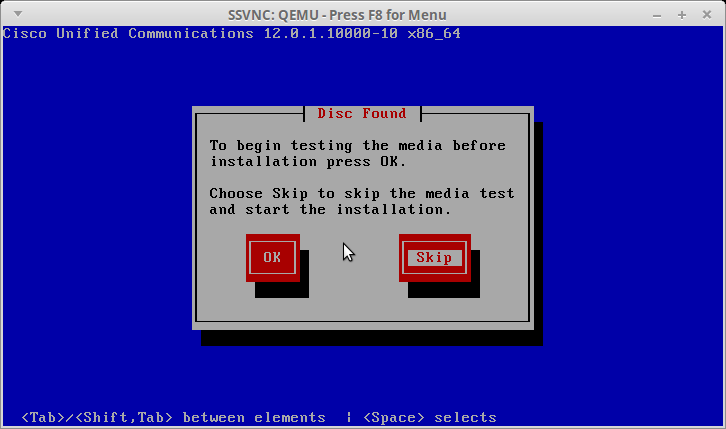
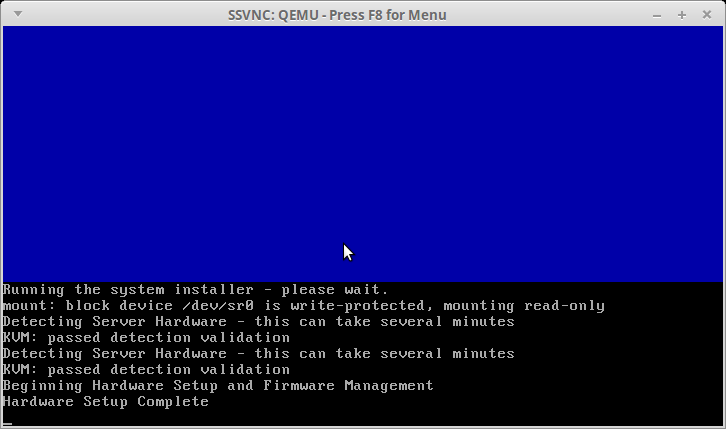
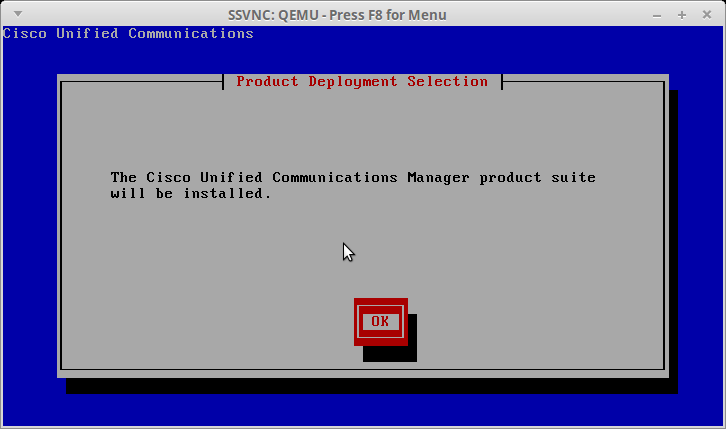
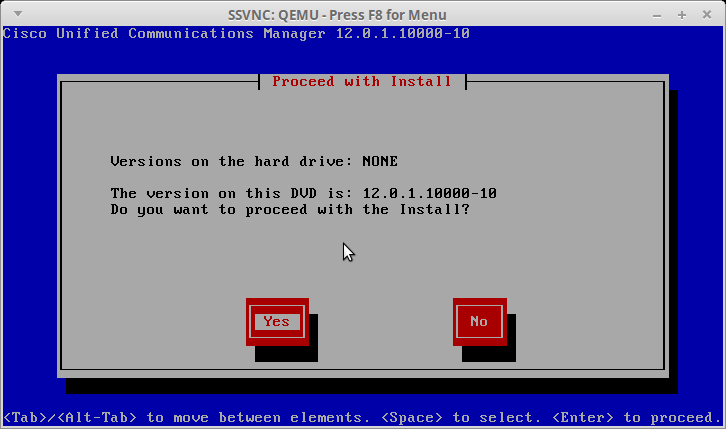
Skip the Platform Installation Wizard (we'll do it later)
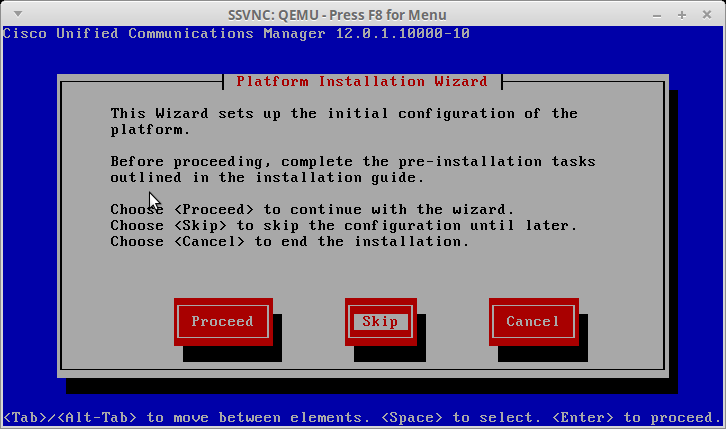
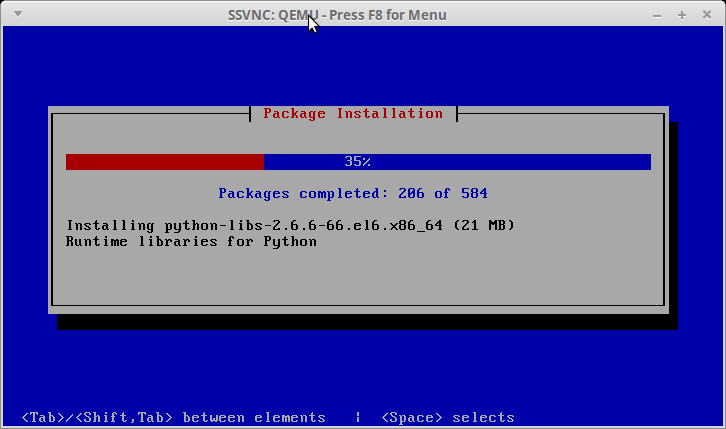
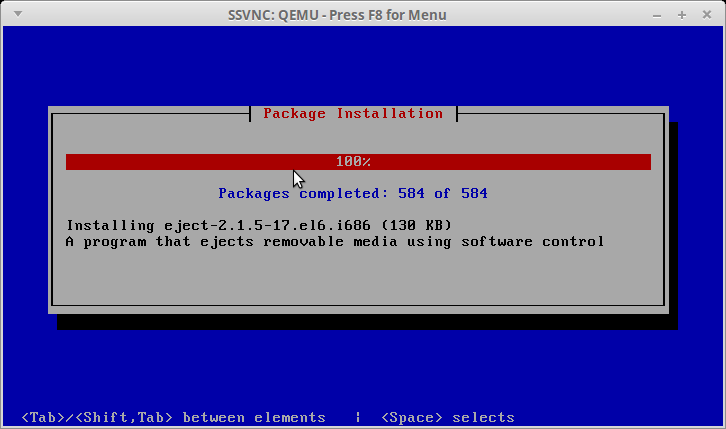
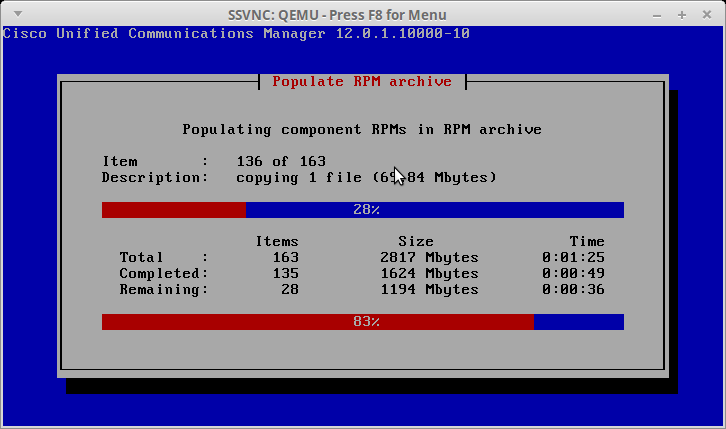
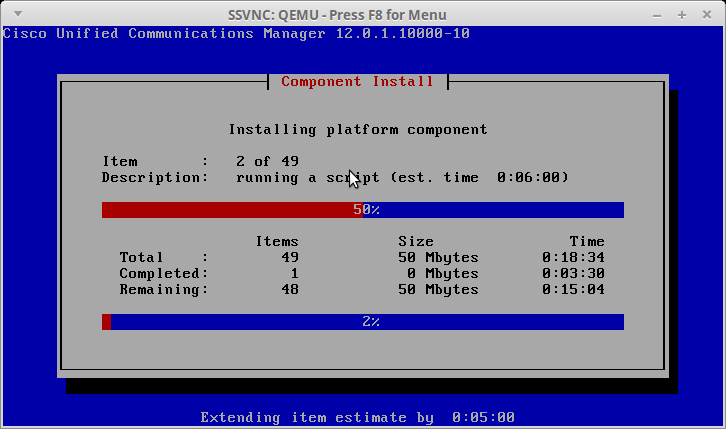
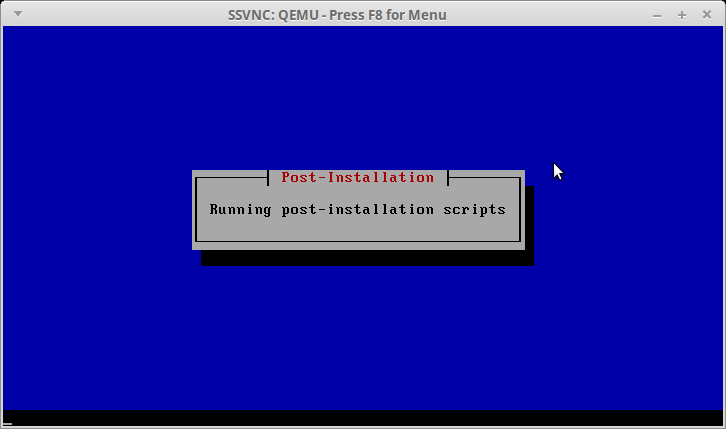
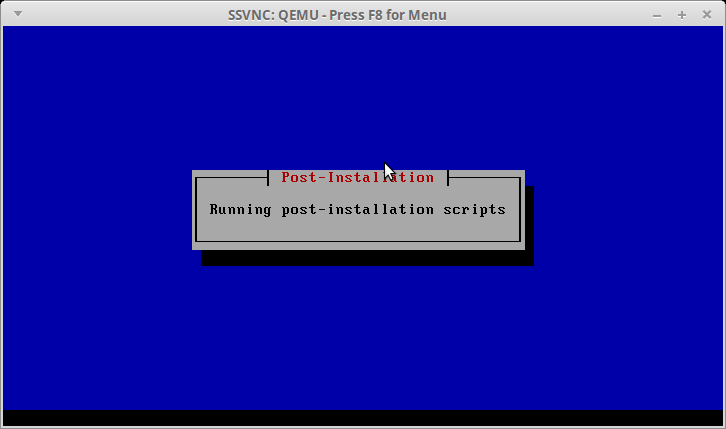
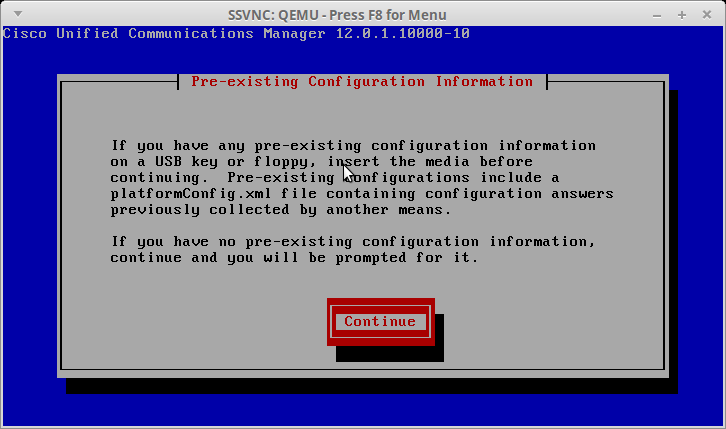
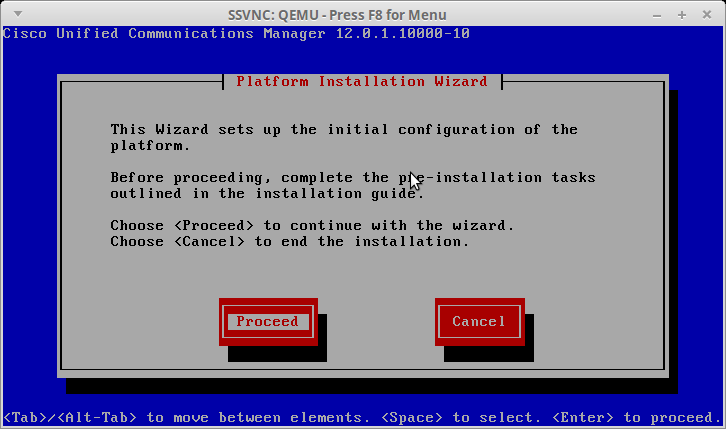
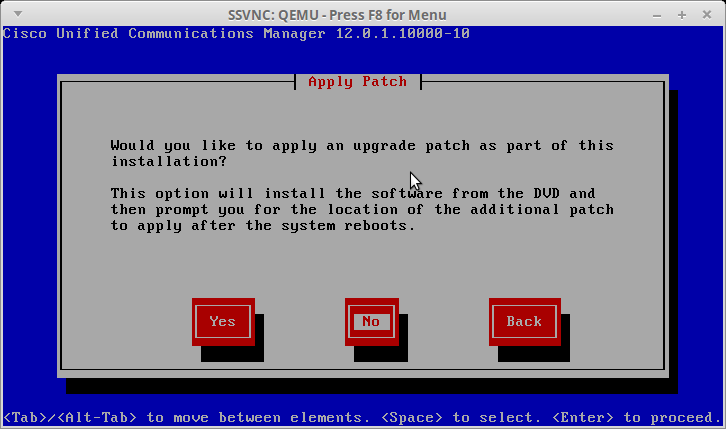
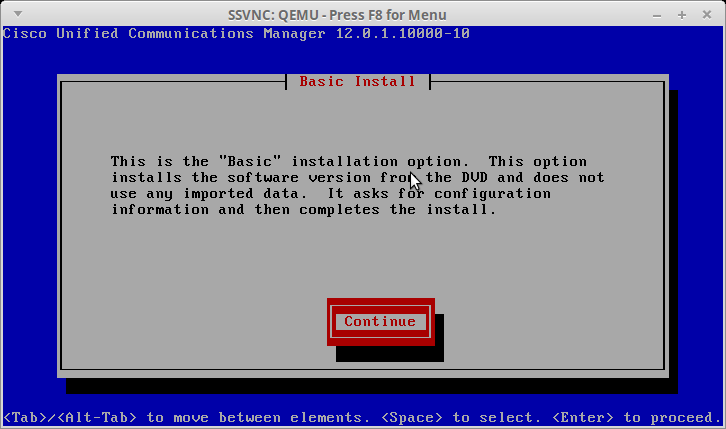
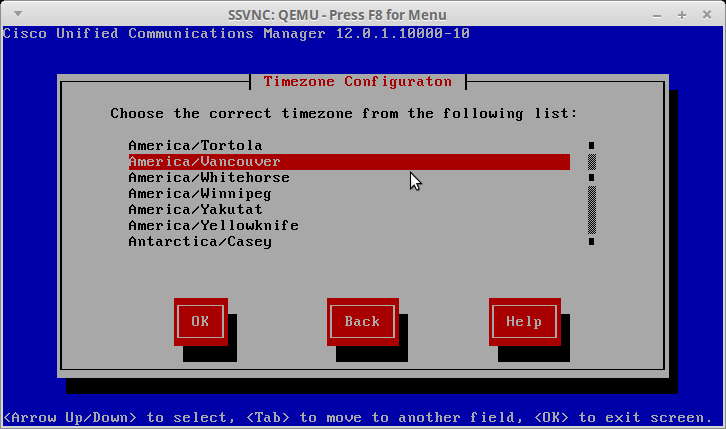
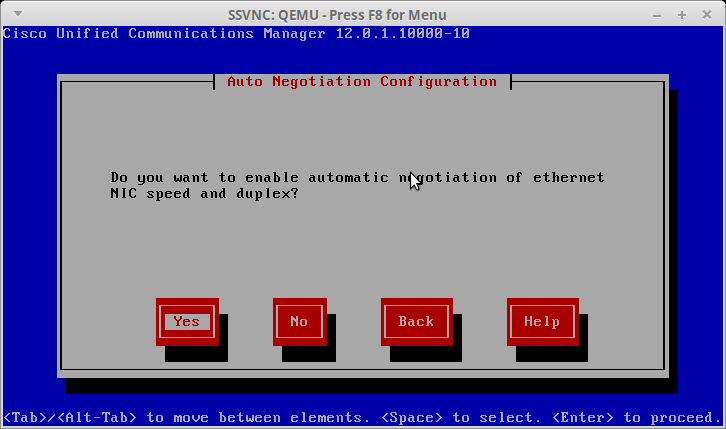
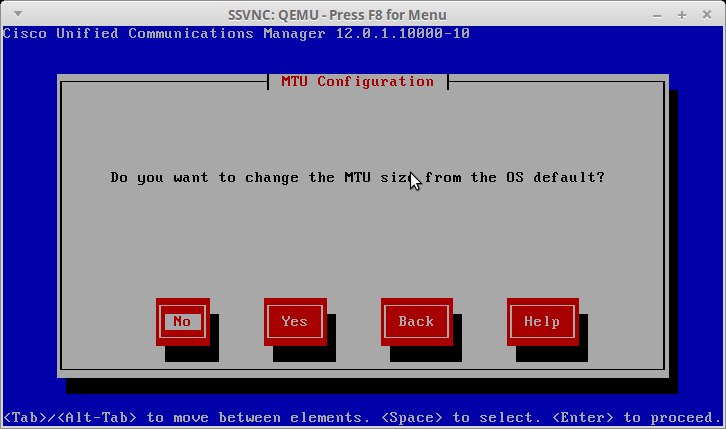
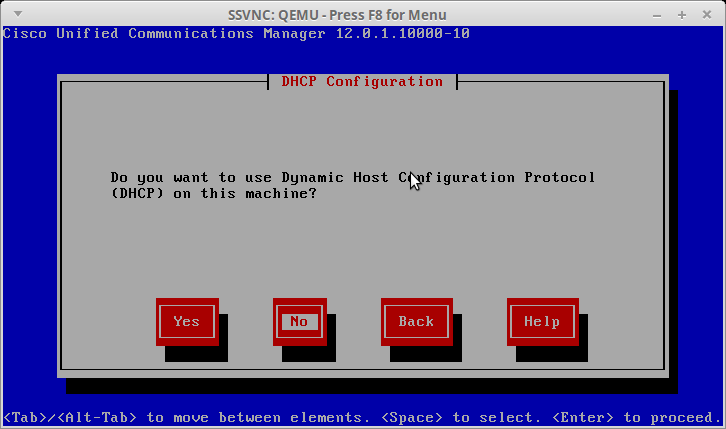
Set the relevant hostname and IP address information
Remember below is just an example, make sure you set a valid IP for your network.
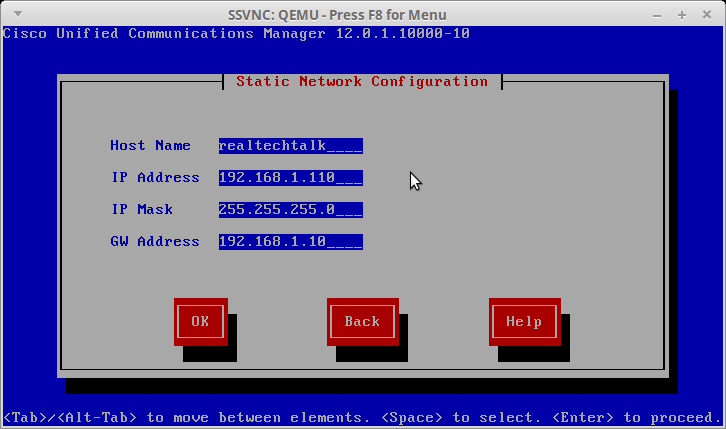
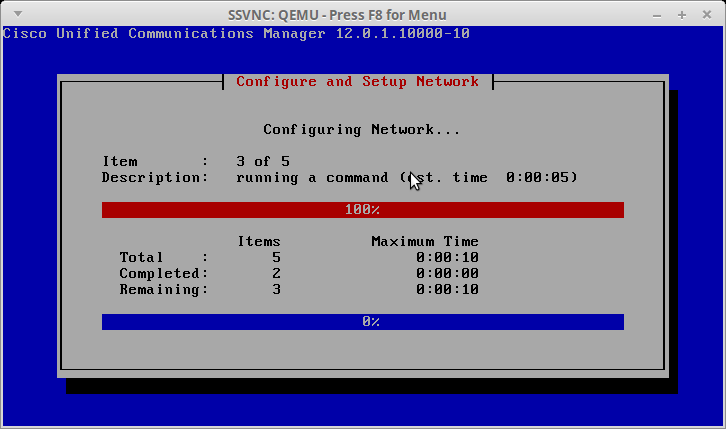
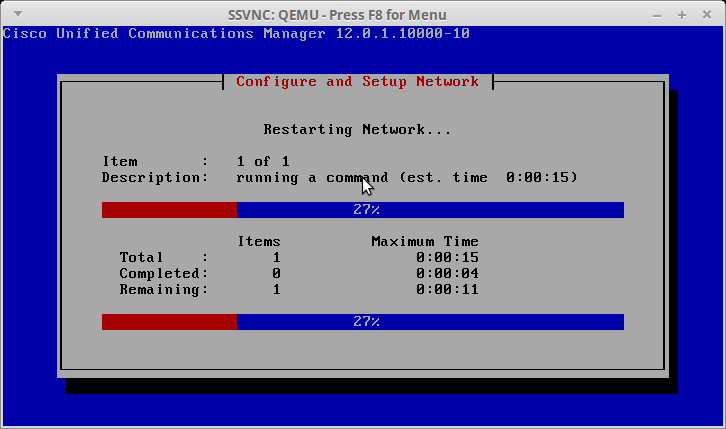
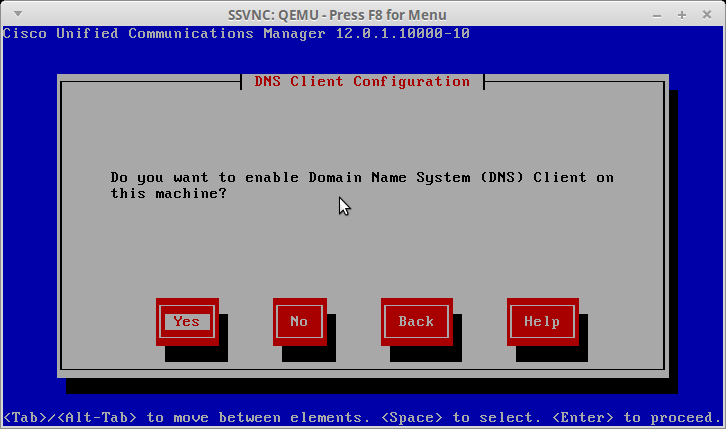
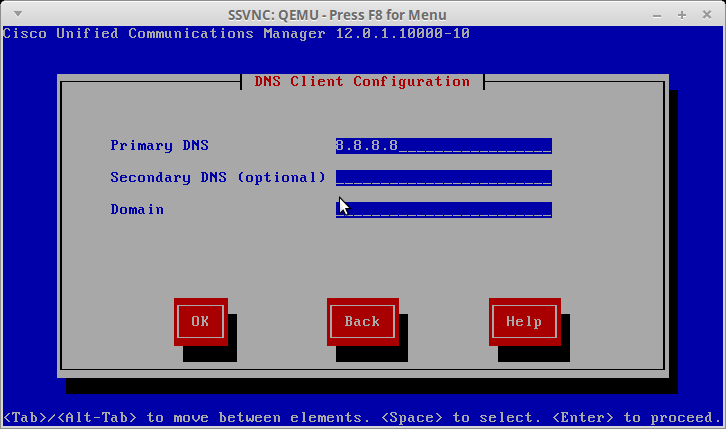
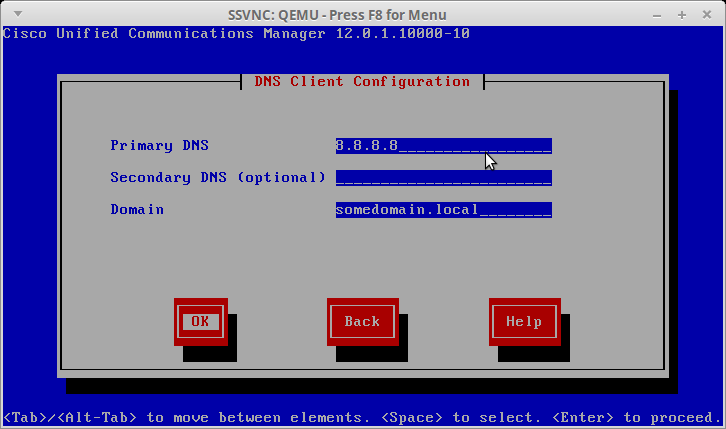
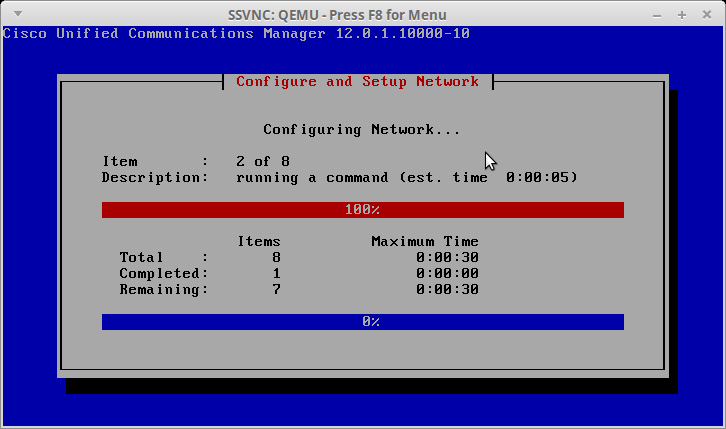
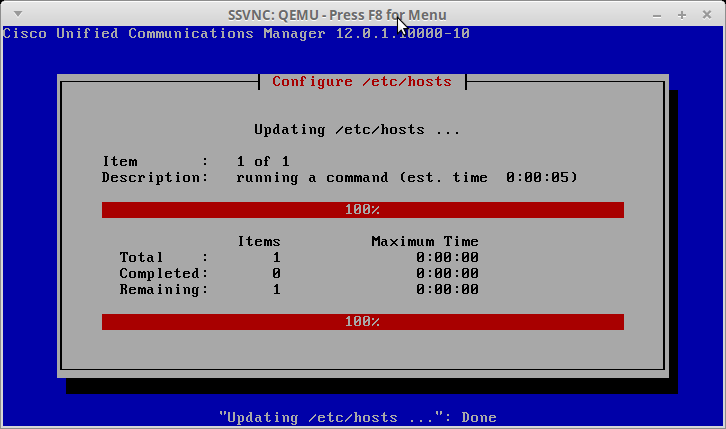
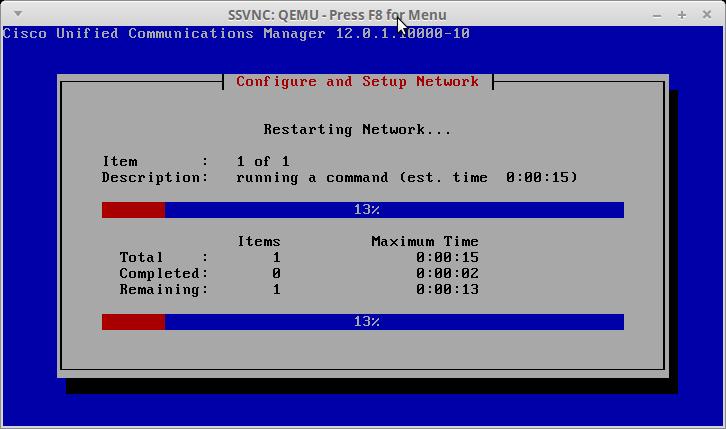
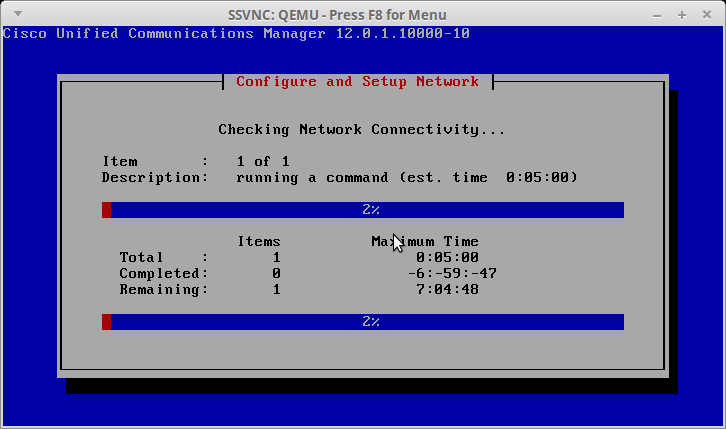
Don't worry about a DNS error exactly like below
If you get the exact error below notice that it is complaining about "Reverse DNS lookup failed". You can safely proceed and continue the install, or if you control your own DNS, then you can add a reverse entry for your IP to avoid this error.
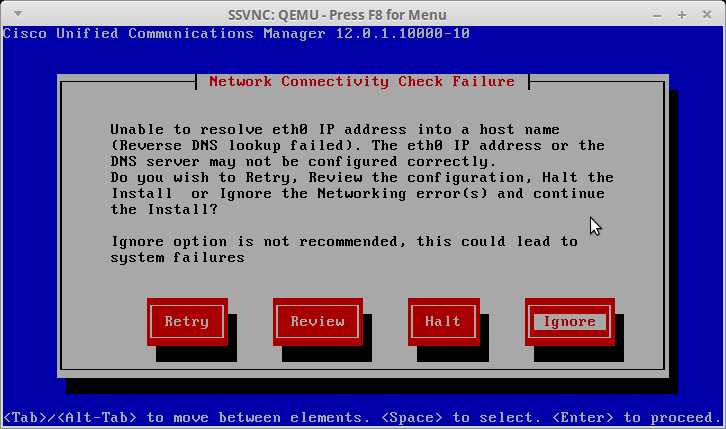
In the next screens you will be creating different usernames and passwords for different purposes (eg. Admin user, App/UI user etc..). Make sure you write down what each username and password is for and DO NOT forget them .
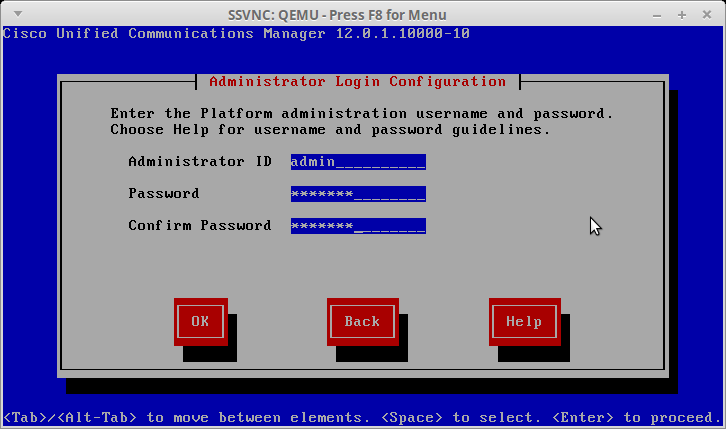
Create your SSL certificate, normally it would be something relevant to your company eg. (yourcompany.com).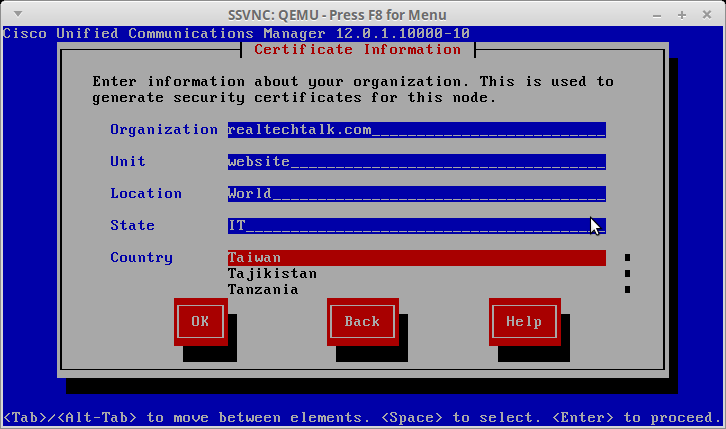
First Node Configuration Screen.
If this is your first install and you don't have an existing Cluster you should choose "Yes".
Otherwise you would Choose "No" and enter the details of the Publisher in the next screen.
Normally we should have NTP in production, you may opt not to use NTP if your firewall blocks it or if your network has no outside access.
Keep your Security Password Somewhere Safe
The most common issue in setting up a Cluster is that you have bad network and/or the wrong Security Password.
Normally you would want SMTP but if you are on a network that doesn't allow SMTP or you have no mail account to use, it is OK to say "No" for now.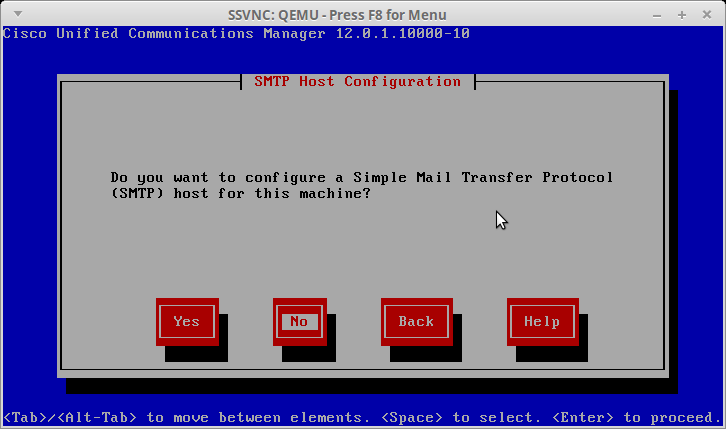
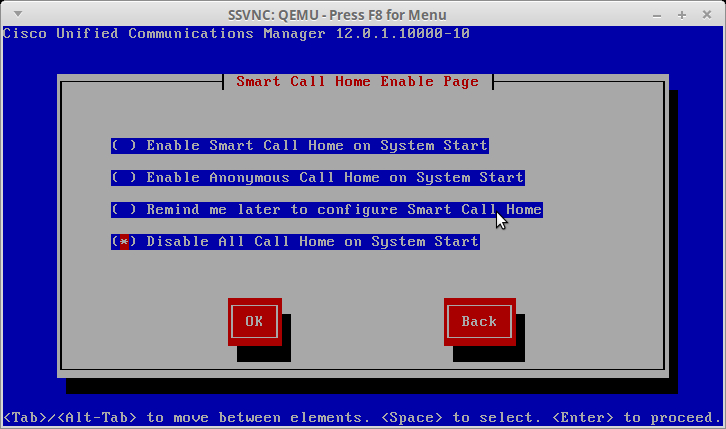
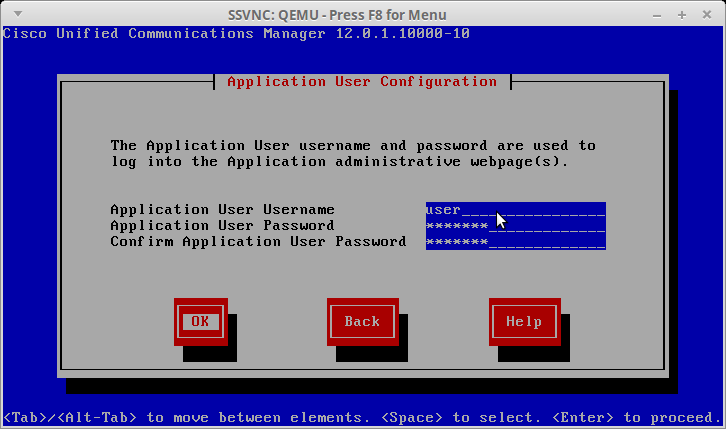
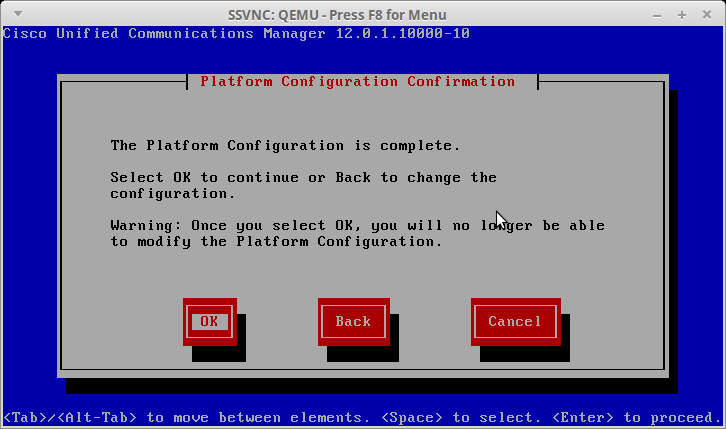
This step is another crucial part of the install and where people go wrong.
Note that if you have specified a bad IP or a non-working default gateway that this step will fail and you'll need to go back and set proper IP info.
This is one of the longest steps below. Note that there is some timeout in the install script, if this step takes too long the install times out, fails and you have to reinstall.
This is normally only an issue on machines with lots of IOPS of other usage or if you have an older/slower RAID array or mechanical disks/insufficient IO bandwidth at the moment.
Congrats! After this point, you should be able to reboot and login to the Web GUI of CUCM (using your application user).
Note that it may take 5-15 minutes on initial boot for the Web GUI to be ready.
Linux Ubuntu Redhat How To Extract Images from PDF
Just use pdfimages:
Change yourpdf.pdf to the name of your pdf
output-name is the name format (eg. output-name01.jpg output-name02.jpg) is how the files will be named if you use "output-name". Change as needed.
pdfimages -all yourpdf.pdf output-name
After that you will have extracted all of the images.
You can also just run the command with -list and see all of the images contained within the pdf like this:
pdfimages -list file.pdf
page num type width height color comp bpc enc interp object ID x-ppi y-ppi size ratio
--------------------------------------------------------------------------------------------
1 0 image 2543 1553 rgb 3 8 jpeg no 4 0 231 188 64.6K 0.6%
2 1 image 2543 1553 rgb 3 8 jpeg no 4 0 231 188 64.6K 0.6%
2 2 image 1120 1120 rgb 3 8 jpeg no 8 0 136 136 245K 6.7%
2 3 smask 1120 1120 gray 1 8 image no 8 0 136 136 1236B 0.1%
3 4 image 2543 1553 rgb 3 8 jpeg no 4 0 231 188 64.6K 0.6%
3 5 image 1120 1120 rgb 3 8 jpeg no 14 0 136 136 216K 5.9%
3 6 smask 1120 1120 gray 1 8 image no 14 0 136 136 1236B 0.1%
4 7 image 2543 1553 rgb 3 8 jpeg no 4 0 231 188 64.6K 0.6%
5 8 image 2543 1553 rgb 3 8 jpeg no 4 0 231 188 64.6K 0.6%
6 9 image 2543 1553 rgb 3 8 jpeg no 4 0 231 188 64.6K 0.6%
7 10 image 2543 1553 rgb 3 8 jpeg no 4 0 231 188 64.6K 0.6%
8 11 image 2543 1553 rgb 3 8 jpeg no 4 0 231 188 64.6K 0.6%
9 12 image 2543 1553 rgb 3 8 jpeg no 4 0 231 188 64.6K 0.6%
10 13 image 2543 1553 rgb 3 8 jpeg no 4 0 231 188 64.6K 0.6%
11 14 image 2543 1553 rgb 3 8 jpeg no 4 0 231 188 64.6K 0.6%
11 15 image 726 429 rgb 3 8 image no 41 0 66 66 13.6K 1.5%
11 16 smask 726 429 gray 1 8 image no 41 0 66 66 343B 0.1%
12 17 image 2543 1553 rgb 3 8 jpeg no 4 0 231 188 64.6K 0.6%
12 18 image 726 429 rgb 3 8 image no 48 0 66 66 12.4K 1.4%
12 19 smask 726 429 gray 1 8 image no 48 0 66 66 343B 0.1%
13 20 image 2543 1553 rgb 3 8 jpeg no 4 0 231 188 64.6K 0.6%
13 21 image 726 429 rgb 3 8 image no 55 0 66 66 10.6K 1.2%
13 22 smask 726 429 gray 1 8 image no 55 0 66 66 343B 0.1%
14 23 image 2543 1553 rgb 3 8 jpeg no 4 0 231 188 64.6K 0.6%
14 24 image 726 429 rgb 3 8 image no 62 0 66 66 13.1K 1.4%
14 25 smask 726 429 gray 1 8 image no 62 0 66 66 343B 0.1%
15 26 image 2543 1553 rgb 3 8 jpeg no 4 0 231 188 64.6K 0.6%
15 27 image 726 429 rgb 3 8 image no 69 0 66 66 11.9K 1.3%
15 28 smask 726 429 gray 1 8 image no 69 0 66 66 343B 0.1%
16 29 image 2543 1553 rgb 3 8 jpeg no 4 0 231 188 64.6K 0.6%
16 30 image 726 429 rgb 3 8 image no 76 0 66 66 16.2K 1.8%
16 31 smask 726 429 gray 1 8 image no 76 0 66 66 343B 0.1%
17 32 image 2543 1553 rgb 3 8 jpeg no 4 0 231 188 64.6K 0.6%
17 33 image 726 429 rgb 3 8 image no 83 0 66 66 10.8K 1.2%
17 34 smask 726 429 gray 1 8 image no 83 0 66 66 343B 0.1%
18 35 image 2543 1553 rgb 3 8 jpeg no 4 0 231 188 64.6K 0.6%
18 36 image 726 429 rgb 3 8 image no 90 0 66 66 11.2K 1.2%
18 37 smask 726 429 gray 1 8 image no 90 0 66 66 343B 0.1%
19 38 image 2543 1553 rgb 3 8 jpeg no 4 0 231 188 64.6K 0.6%
19 39 image 726 429 rgb 3 8 image no 97 0 66 66 13.3K 1.5%
19 40 smask 726 429 gray 1 8 image no 97 0 66 66 343B 0.1%
20 41 image 2543 1553 rgb 3 8 jpeg no 4 0 231 188 64.6K 0.6%
20 42 image 726 429 rgb 3 8 image no 104 0 66 66 13.4K 1.5%
20 43 smask 726 429 gray 1 8 image no 104 0 66 66 343B 0.1%
21 44 image 2543 1553 rgb 3 8 jpeg no 4 0 231 188 64.6K 0.6%
21 45 image 726 429 rgb 3 8 image no 111 0 66 66 8856B 0.9%
21 46 smask 726 429 gray 1 8 image no 111 0 66 66 343B 0.1%
22 47 image 2543 1553 rgb 3 8 jpeg no 4 0 231 188 64.6K 0.6%
22 48 image 726 429 rgb 3 8 image no 118 0 66 66 8841B 0.9%
22 49 smask 726 429 gray 1 8 image no 118 0 66 66 343B 0.1%
23 50 image 2543 1553 rgb 3 8 jpeg no 4 0 231 188 64.6K 0.6%
23 51 image 726 429 rgb 3 8 image no 125 0 66 66 17.3K 1.9%
23 52 smask 726 429 gray 1 8 image no 125 0 66 66 343B 0.1%
24 53 image 2543 1553 rgb 3 8 jpeg no 4 0 231 188 64.6K 0.6%
24 54 image 726 429 rgb 3 8 image no 132 0 66 66 15.0K 1.6%
24 55 smask 726 429 gray 1 8 image no 132 0 66 66 343B 0.1%
25 56 image 2543 1553 rgb 3 8 jpeg no 4 0 231 188 64.6K 0.6%
25 57 image 726 429 rgb 3 8 image no 139 0 66 66 15.0K 1.6%
25 58 smask 726 429 gray 1 8 image no 139 0 66 66 343B 0.1%
26 59 image 2543 1553 rgb 3 8 jpeg no 4 0 231 188 64.6K 0.6%
26 60 image 726 429 rgb 3 8 image no 146 0 66 66 14.8K 1.6%
26 61 smask 726 429 gray 1 8 image no 146 0 66 66 343B 0.1%
27 62 image 2543 1553 rgb 3 8 jpeg no 4 0 231 188 64.6K 0.6%
27 63 image 726 429 rgb 3 8 image no 153 0 66 66 13.6K 1.5%
27 64 smask 726 429 gray 1 8 image no 153 0 66 66 343B 0.1%
28 65 image 2543 1553 rgb 3 8 jpeg no 4 0 231 188 64.6K 0.6%
28 66 image 726 429 rgb 3 8 image no 160 0 66 66 15.0K 1.6%
28 67 smask 726 429 gray 1 8 image no 160 0 66 66 343B 0.1%
29 68 image 2543 1553 rgb 3 8 jpeg no 4 0 231 188 64.6K 0.6%
29 69 image 726 429 rgb 3 8 image no 167 0 66 66 13.3K 1.5%
29 70 smask 726 429 gray 1 8 image no 167 0 66 66 343B 0.1%
30 71 image 2543 1553 rgb 3 8 jpeg no 4 0 231 188 64.6K 0.6%
30 72 image 726 429 rgb 3 8 image no 174 0 66 66 12.9K 1.4%
30 73 smask 726 429 gray 1 8 image no 174 0 66 66 343B 0.1%
31 74 image 2543 1553 rgb 3 8 jpeg no 4 0 231 188 64.6K 0.6%
31 75 image 726 429 rgb 3 8 image no 181 0 66 66 13.3K 1.5%
31 76 smask 726 429 gray 1 8 image no 181 0 66 66 343B 0.1%
32 77 image 2543 1553 rgb 3 8 jpeg no 4 0 231 188 64.6K 0.6%
32 78 image 726 429 rgb 3 8 image no 188 0 66 66 13.7K 1.5%
32 79 smask 726 429 gray 1 8 image no 188 0 66 66 343B 0.1%
33 80 image 2543 1553 rgb 3 8 jpeg no 4 0 231 188 64.6K 0.6%
33 81 image 726 429 rgb 3 8 image no 195 0 66 66 12.3K 1.3%
33 82 smask 726 429 gray 1 8 image no 195 0 66 66 343B 0.1%
34 83 image 2543 1553 rgb 3 8 jpeg no 4 0 231 188 64.6K 0.6%
34 84 image 726 429 rgb 3 8 image no 202 0 66 66 12.4K 1.4%
34 85 smask 726 429 gray 1 8 image no 202 0 66 66 343B 0.1%
35 86 image 2543 1553 rgb 3 8 jpeg no 4 0 231 188 64.6K 0.6%
35 87 image 726 429 rgb 3 8 image no 209 0 66 66 13.2K 1.5%
35 88 smask 726 429 gray 1 8 image no 209 0 66 66 343B 0.1%
36 89 image 2543 1553 rgb 3 8 jpeg no 4 0 231 188 64.6K 0.6%
36 90 image 726 429 rgb 3 8 image no 216 0 66 66 12.9K 1.4%
36 91 smask 726 429 gray 1 8 image no 216 0 66 66 343B 0.1%
37 92 image 2543 1553 rgb 3 8 jpeg no 4 0 231 188 64.6K 0.6%
37 93 image 726 429 rgb 3 8 image no 223 0 66 66 13.2K 1.5%
37 94 smask 726 429 gray 1 8 image no 223 0 66 66 343B 0.1%
38 95 image 2543 1553 rgb 3 8 jpeg no 4 0 231 188 64.6K 0.6%
38 96 image 726 429 rgb 3 8 image no 230 0 66 66 12.3K 1.4%
38 97 smask 726 429 gray 1 8 image no 230 0 66 66 343B 0.1%
39 98 image 2543 1553 rgb 3 8 jpeg no 4 0 231 188 64.6K 0.6%
39 99 image 726 429 rgb 3 8 image no 237 0 66 66 12.5K 1.4%
39 100 smask 726 429 gray 1 8 image no 237 0 66 66 343B 0.1%
40 101 image 2543 1553 rgb 3 8 jpeg no 4 0 231 188 64.6K 0.6%
40 102 image 726 429 rgb 3 8 image no 244 0 66 66 12.4K 1.4%
40 103 smask 726 429 gray 1 8 image no 244 0 66 66 343B 0.1%
41 104 image 2543 1553 rgb 3 8 jpeg no 4 0 231 188 64.6K 0.6%
41 105 image 726 429 rgb 3 8 image no 251 0 66 66 12.5K 1.4%
41 106 smask 726 429 gray 1 8 image no 251 0 66 66 343B 0.1%
42 107 image 2543 1553 rgb 3 8 jpeg no 4 0 231 188 64.6K 0.6%
42 108 image 726 429 rgb 3 8 image no 258 0 66 66 17.3K 1.9%
42 109 smask 726 429 gray 1 8 image no 258 0 66 66 343B 0.1%
43 110 image 2543 1553 rgb 3 8 jpeg no 4 0 231 188 64.6K 0.6%
43 111 image 726 429 rgb 3 8 image no 265 0 66 66 14.7K 1.6%
43 112 smask 726 429 gray 1 8 image no 265 0 66 66 343B 0.1%
44 113 image 2543 1553 rgb 3 8 jpeg no 4 0 231 188 64.6K 0.6%
44 114 image 726 429 rgb 3 8 image no 272 0 66 66 15.5K 1.7%
44 115 smask 726 429 gray 1 8 image no 272 0 66 66 343B 0.1%
45 116 image 2543 1553 rgb 3 8 jpeg no 4 0 231 188 64.6K 0.6%
45 117 image 726 429 rgb 3 8 image no 279 0 66 66 12.8K 1.4%
45 118 smask 726 429 gray 1 8 image no 279 0 66 66 343B 0.1%
46 119 image 2543 1553 rgb 3 8 jpeg no 4 0 231 188 64.6K 0.6%
46 120 image 726 429 rgb 3 8 image no 286 0 66 66 15.0K 1.6%
46 121 smask 726 429 gray 1 8 image no 286 0 66 66 343B 0.1%
47 122 image 2543 1553 rgb 3 8 jpeg no 4 0 231 188 64.6K 0.6%
47 123 image 726 429 rgb 3 8 image no 293 0 66 66 14.4K 1.6%
47 124 smask 726 429 gray 1 8 image no 293 0 66 66 343B 0.1%
48 125 image 2543 1553 rgb 3 8 jpeg no 4 0 231 188 64.6K 0.6%
48 126 image 726 429 rgb 3 8 image no 300 0 66 66 15.6K 1.7%
48 127 smask 726 429 gray 1 8 image no 300 0 66 66 343B 0.1%
49 128 image 2543 1553 rgb 3 8 jpeg no 4 0 231 188 64.6K 0.6%
49 129 image 726 429 rgb 3 8 image no 307 0 66 66 13.6K 1.5%
49 130 smask 726 429 gray 1 8 image no 307 0 66 66 343B 0.1%
50 131 image 2543 1553 rgb 3 8 jpeg no 4 0 231 188 64.6K 0.6%
50 132 image 726 429 rgb 3 8 image no 314 0 66 66 14.3K 1.6%
50 133 smask 726 429 gray 1 8 image no 314 0 66 66 343B 0.1%
51 134 image 2543 1553 rgb 3 8 jpeg no 4 0 231 188 64.6K 0.6%
51 135 image 726 429 rgb 3 8 image no 321 0 66 66 15.2K 1.7%
51 136 smask 726 429 gray 1 8 image no 321 0 66 66 343B 0.1%
52 137 image 2543 1553 rgb 3 8 jpeg no 4 0 231 188 64.6K 0.6%
52 138 image 726 429 rgb 3 8 image no 328 0 66 66 14.7K 1.6%
52 139 smask 726 429 gray 1 8 image no 328 0 66 66 343B 0.1%
53 140 image 2543 1553 rgb 3 8 jpeg no 4 0 231 188 64.6K 0.6%
53 141 image 726 429 rgb 3 8 image no 335 0 66 66 12.3K 1.3%
53 142 smask 726 429 gray 1 8 image no 335 0 66 66 343B 0.1%
54 143 image 2543 1553 rgb 3 8 jpeg no 4 0 231 188 64.6K 0.6%
54 144 image 726 429 rgb 3 8 image no 342 0 66 66 12.5K 1.4%
54 145 smask 726 429 gray 1 8 image no 342 0 66 66 343B 0.1%
55 146 image 2543 1553 rgb 3 8 jpeg no 4 0 231 188 64.6K 0.6%
55 147 image 726 429 rgb 3 8 image no 349 0 66 66 12.3K 1.3%
55 148 smask 726 429 gray 1 8 image no 349 0 66 66 343B 0.1%
56 149 image 2543 1553 rgb 3 8 jpeg no 4 0 231 188 64.6K 0.6%
56 150 image 726 429 rgb 3 8 image no 356 0 66 66 12.8K 1.4%
56 151 smask 726 429 gray 1 8 image no 356 0 66 66 343B 0.1%
Linux and Windows Dual Boot Issue NIC Won't work After Booting Windows
In Windows, with some NICs, especially Intel, Windows may enable features on the card that break it in Linux. It is hard to troubleshoot as what you'll see is that the NIC is still detected in Linux, the NIC/port will be up but nothing will work (eg. DHCP requests or even static IPs won't work). You may see STP bridge traffic but that is all.
In a corporate environment this can result in many calls to support and is essentially downtime and an unnecessary waste of resources.
Solution - Disable any Power Management and Wake on LAN Features in Windows
Generally these are any of the "Wake on LAN" or "Wake on Magic" or simiilarly named features. Make sure you disable those under Device Manager for any of your NICs.
Quick Fix - If you have no control over the Windows NIC
The quick fix for this (if you don't have control over Windows) is powering off the machine and powering back.
Cisco CME How To Enable ACD hunt groups
In our example below, we create 2 hunt groups.
You could assume the #1 group is sales and #2 group is support etc.. and you can create more as needed.
The main part of hunt is the "list" option where you add each phone number that is to be part of the group
ephone-hunt 1 sequential
pilot 2001
list 1234
timeout 10
ephone-hunt 2 sequential
pilot 2002
list 5678
timeout 10
ephone-hunt 1 sequential
This sets up the first hunt group. The keyword sequential specifies that calls will be sent to each phone in the list one by one until someone answers, or the list is exhausted.
pilot 2001: This is the number used to reach the hunt group. When someone calls this number (2001), the system will follow the hunt sequence.
list 1234: This is the list of ephone-dn (directory numbers) the call will be routed to. In this case, the call will be sequentially forwarded to phones associated with extension 1234.
timeout 10: This is the amount of time (in seconds) the system will wait before trying the next phone in the sequence. In this case, it will wait for 10 seconds before forwarding the call to the next phone.
How to install gns3 on Linux Ubuntu Mint
Step 01 - Download
Visit https://gns3.com/software/download
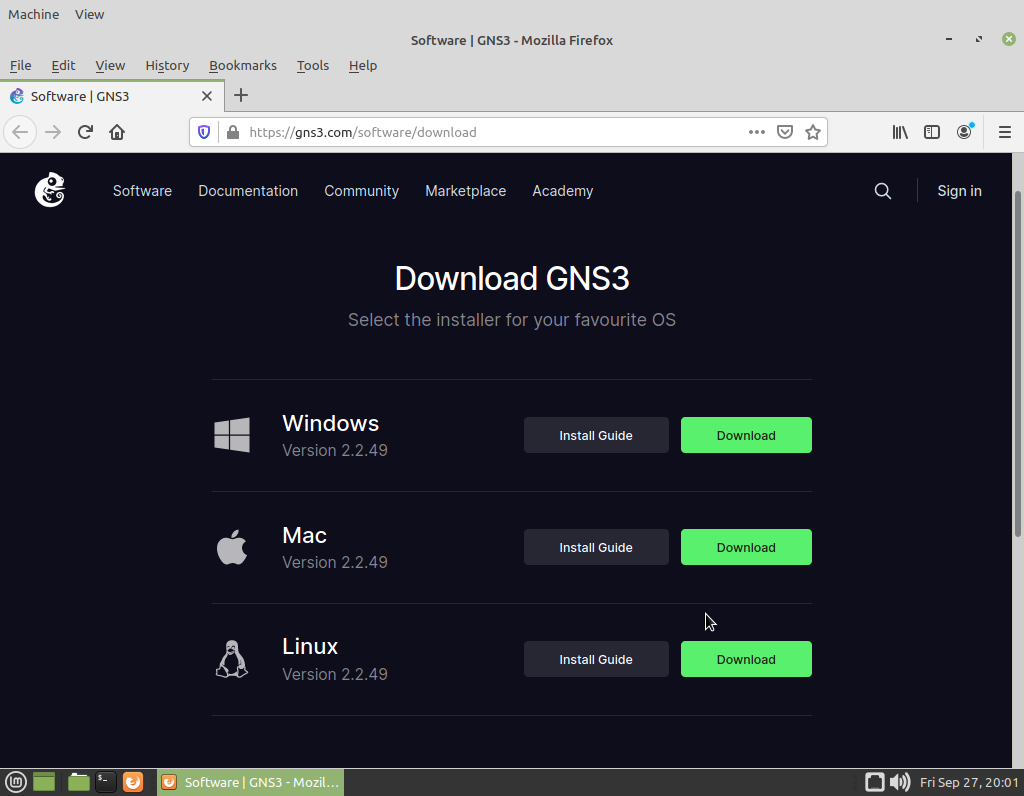
Click on "Linux" on the side under "Installation".
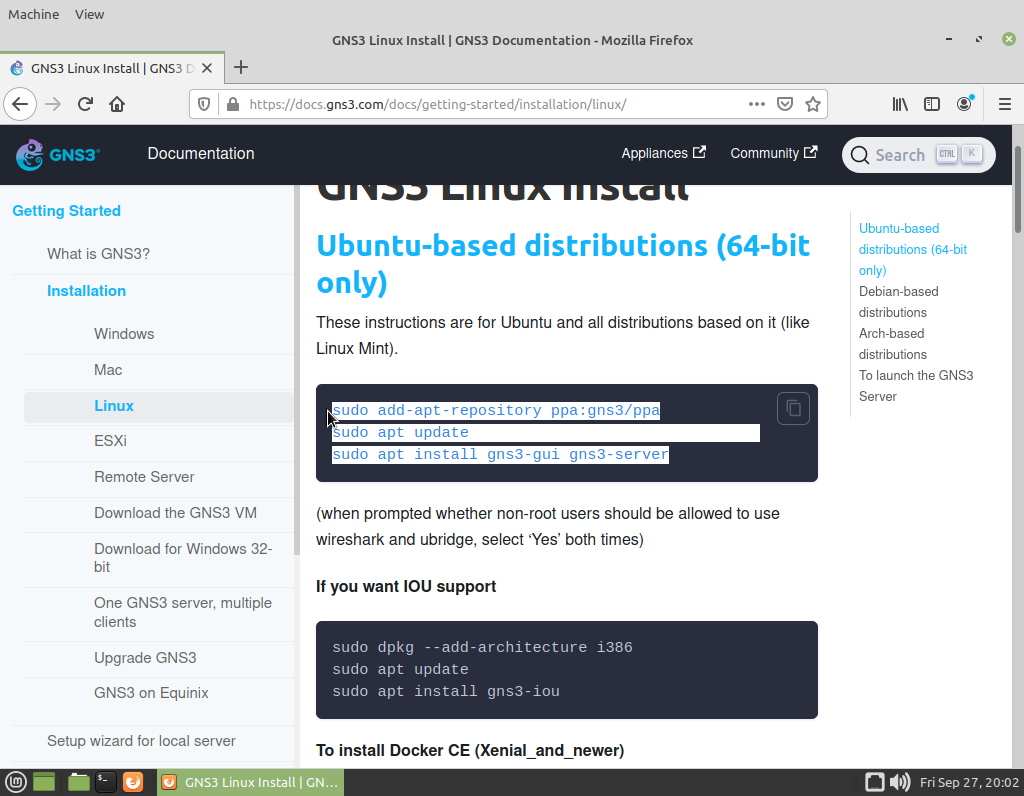
Run these commands:
What we are doing is adding the repo/ppa for gns3, then updating apt and then install gns3 and the gui.
sudo add-apt-repository ppa:gns3/ppa
sudo apt update
sudo apt install gns3-gui gns3-server
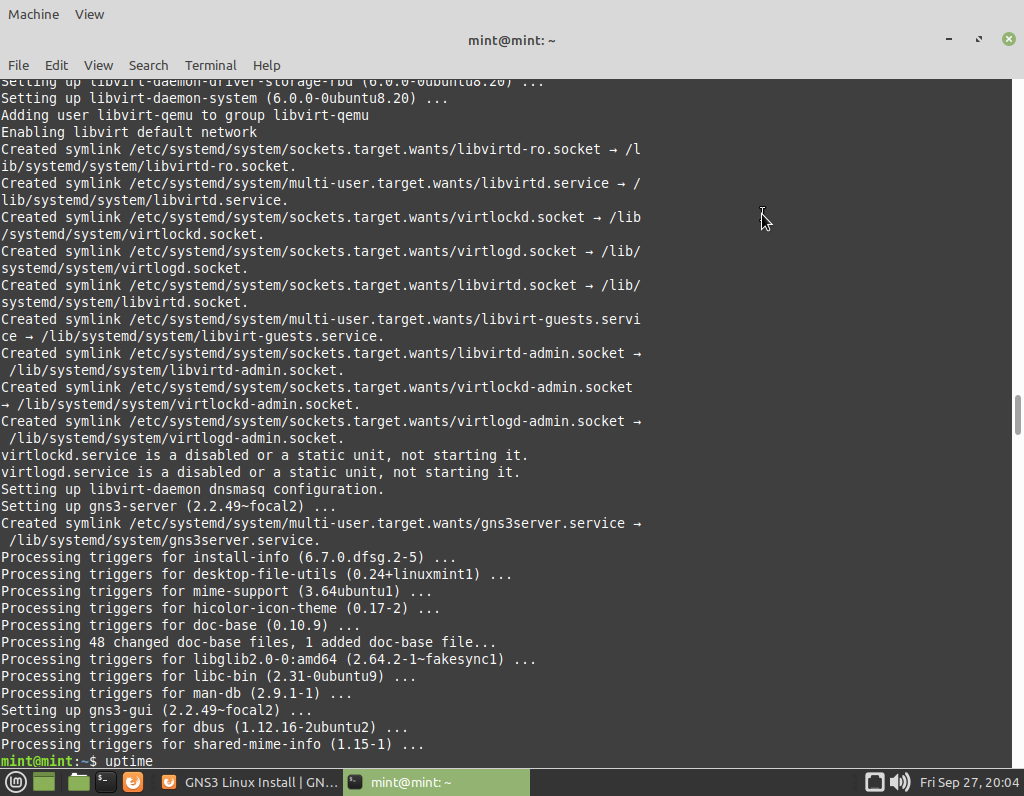
Run gns3 from the terminal by typing "gns3"
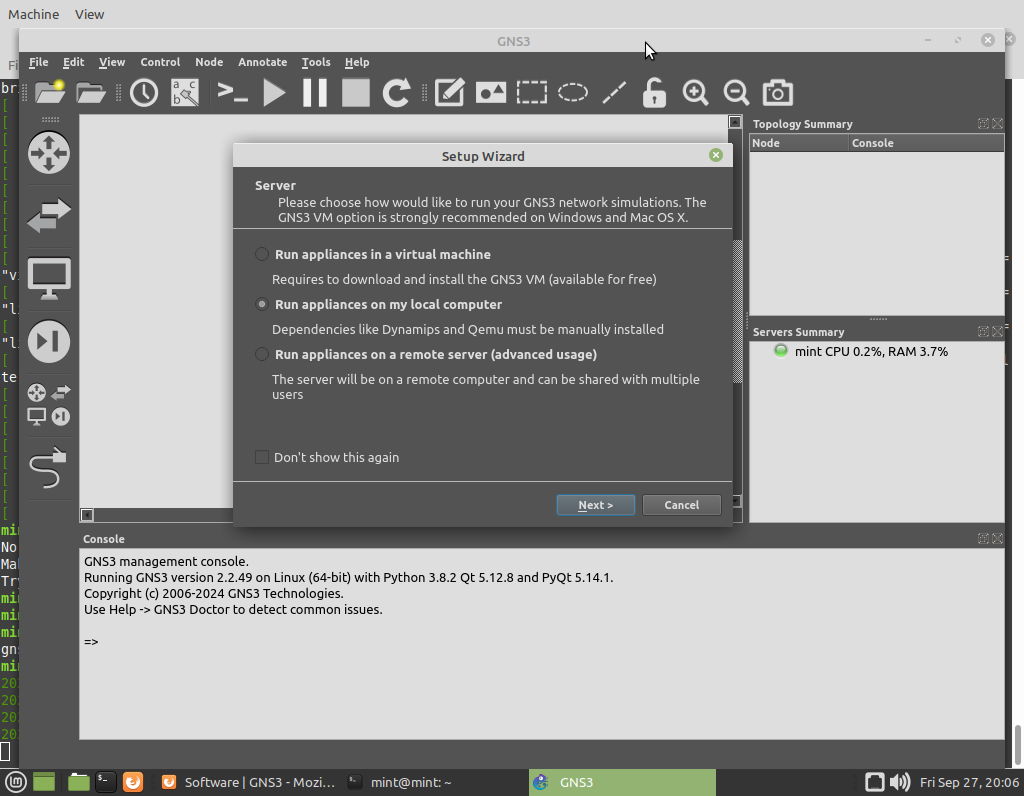
How to convert audio for Asterisk .wav format
In our example we take "sound.mp3" and convert it to .wav.
Generally Asterisk for its wave needs one audio channel (-ac 1) / mono and 8000hz (-ar 8000) instead of the standard CD/MP3 of 44100hz.
Here is the command to convert into Asterisk .wav format:
ffmpeg -i sound.mp3 -ac 1 -ar 8000 sound.wav
Errors Asterisk may give you if the format is wrong:
-- Executing [91781891@cme:3] Playback("SIP/234-00000008", "/var/lib/asterisk/sounds/sound") in new stack
[Sep 26 15:45:32] WARNING[4400][C-00000009]: format_wav.c:111 check_header_fmt: Unexpected frequency mismatch 44100 (expecting 8000)
[Sep 26 15:45:32] WARNING[4400][C-00000009]: file.c:510 fn_wrapper: Unable to open format wav
[Sep 26 15:45:32] WARNING[4400][C-00000009]: file.c:1303 ast_streamfile: Unable to open /var/lib/asterisk/sounds/sound (format (ulaw)): No such file or directory
[Sep 26 15:45:32] WARNING[4400][C-00000009]: app_playback.c:513 playback_exec: Playback failed on SIP/234-00000008 for /var/lib/asterisk/sounds/sound
-- Executing [9132131@cme:3] Playback("SIP/234-00000006", "/var/lib/asterisk/sounds/sound") in new stack
[Sep 26 15:44:18] WARNING[4384][C-00000007]: format_wav.c:102 check_header_fmt: Not in mono 2
[Sep 26 15:44:18] WARNING[4384][C-00000007]: file.c:510 fn_wrapper: Unable to open format wav
[Sep 26 15:44:18] WARNING[4384][C-00000007]: file.c:1303 ast_streamfile: Unable to open /var/lib/asterisk/sounds/sound (format (ulaw)): No such file or directory
[Sep 26 15:44:18] WARNING[4384][C-00000007]: app_playback.c:513 playback_exec: Playback failed on SIP/234-00000006 for /var/lib/asterisk/sounds/sound
Using Cisco CME Router with Asterisk as a dial-peer
#Remember that you need a valid gateway IP unless the Asterisk server is on the same subnet and LAN
Set Valid Gateway IP (if you don't have one already)
ip route 0.0.0.0 0.0.0.0 GATEWAYIP
Enable VOIP Trust
voice service voip
ip address trusted list
ipv4 0.0.0.0 0.0.0.0
sip
Set Credentials For Asterisk and Register To Asterisk
sip-ua
credentials username username password password realm asterisk
registrar ipv4:ASTERISKIP expires 3600
sip-server ipv4:ASTERISKIP
Set a Dial-Peer which uses Asterisk
This is so we can actually make calls out through it. In our case we are simulating a typical office setup where you dial 9 for outside access. This is a very "unoptimized" way that takes too long, in reality you probably want dial-peers that have more specific matches eg for local numbers (713-403-1234) format.
dial-peer voice 123 voip
destination-pattern 9T
session protocol sipv2
session target ipv4:ASTERISKIP
codec g711ulaw
At this point if you have done things correctly, all calls beginning with a 9 will go out through Asterisk (unless you already have more specific dial-peers).
Remember Asterisk must be configured to accept the client. In some cases, you may need to modify the security users for the "friend" on Asterisk.
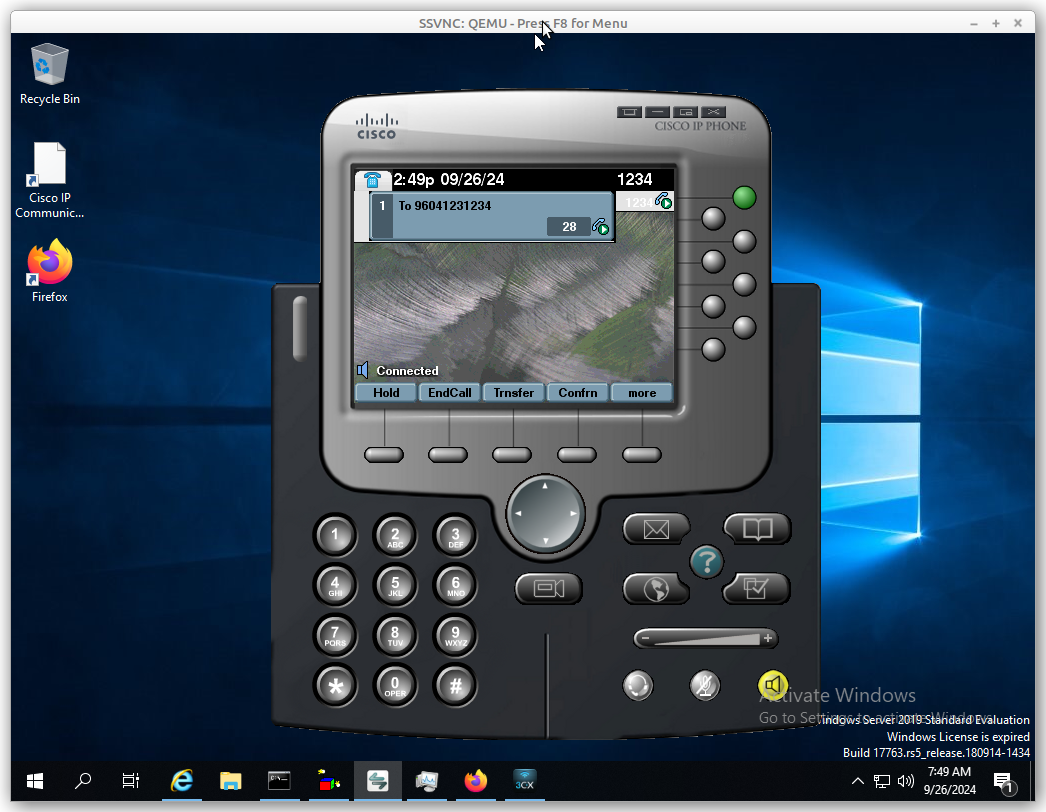
Cisco CME How To Configure SIP Trunk VOIP
This is how we configure outside PSTN access or dialing through another SIP trunk. Beware that this a simplistic example that neglects most security including SRTP
First you'll need to be in config mode:
Step - 1 Enter Voice Service VOIP security options
There are more options but for now we'll just focus on security/allowing connections to and from our phones and the trunk.
Router(config)#voice service voip
Then enter the trusted IP list:
Router(conf-voi-serv)#ip address trusted list
Set Trusted IPs:
In practice you would set the static IPs/ranges of your SIP trunk(s)
o be easy/insecure for testing just set any IP as being trusted (for trusted/LAN/testing only!)
Router(cfg-iptrust-list)#ipv4 0.0.0.0 0.0.0.0
To set a specify IP
This could be one of your SIP trunk IPs
Router(cfg-iptrust-list)#ipv4 192.168.5.20 255.255.255.0
To set a range (/24):
This may be a range of phones on your internal network that you want to trust.
Router(cfg-iptrust-list)#ipv4 10.0.0.0 255.255.255.0
You can add more entries as needed.
Step 2 - Setup Trunk
We'll set our preferred codec list
Router(config)#voice class codec 1
Router(config-class)#codec preference 1 g711ulaw
Router(config-class)#codec preference 2 g729r8
Go back to config mode:
Here is how we setup our trunk, depending on your service provider it may have different requirements (most providers will provide example configs).
Basically we are just authenticating using our username and password from our SIP provider and the last part "realm" is the IP or domain of the server.
authentication command will use the default username/password when authenticating.
credentials command is really the same but you can have multiple of these (eg. if you have accounts with multiple SIP trunks/providers).
Router(config)#sip-ua
Router(config-sip-ua)#credentials username YOUR-USERNAME password 0 YOUR-PASSWORD realm IP-or-domain-of-Trunk.com
There is another option for credentials which can specify a specific phone number tied to the account (some providers do this and some may not).
Router(config-sip-ua)#credentials number 1234 username YOUR-USERNAME password 0 YOUR-PASSWORD realm IP-or-domain-of-Trunk.com
Router(config-sip-ua)#authentication username YOUR-USERNAME password 0 YOUR-PASSWORD realm IP-or-domain-of-Trunk.com
Step 3 - Use Trunk for outgoing calls
This is a generic use the trunk for all non-local calls, but in practice, you may have many providers and may have a more specific dial pattern so perhaps calls for country ABC go through dialpeer 4444 to give better or cheaper calls to a specific destination.
Be in config mode
In our example we call our dial-peer "123" but it could be any unused number.
Create the dial-peer
Router(config)#dial-peer voice 123 voip
We set destination pattern as anything starting with a 9 (the idea is that 9 is for dialing out, change according to your needs).
Router(config-dial-peer)#destination-pattern 9T
We set the protocol as sip, since we use this protocol for a SIP trunk of course.
Router(config-dial-peer)#session protocol sipv2
We set the codec, a very standard g711ulaw, but change according to your needs (what your provider also must support).
Router(config-dial-peer)#codec g711ulaw
Set callerid (usually should be the number your provider assigned):
In this example we set callerid as "12345678"
Router(config-dial-peer)#clid network-number 12345678
Set your session target
It's Cisco talk about which IP/domain do we send the calls to when this dial-peer is matched?
You can use a hostname like this
Router(config-dial-peer)#session target dns:your-server-domain
Or preferably if they have a static IP use this:
Router(config-dial-peer)#session target ipv4:192.168.5.254
Congrats, after this you should be able to make outgoing calls to the PSTN!
Virtualbox host Only Network Error Failed to save host network interface parameter - Cannot change gateway IP of host only network
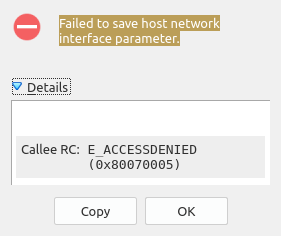
In newer versions this is a very stubborn issue. Here is how you fix it.
Step 1 - Create networks.conf
sudo mkdir /etc/vbox/
sudo vi /etc/vbox/networks.conf
put this in:
In our case we can use the slash /16 range of 192.168.0..0, change the subnet according to your needs
* 192.168.0.0/16
Step 2 - Restart and close Virtualbox
service virtualbox restart
now reopen the GUI.
Edit your host-only network, you will find the IP changes back. However, if you close and open Vbox you should see that it did indeed set.
Cisco CME and C7200 Router Testing and Learning Environment on Ubuntu 20+ Setup Tutorial Guide
Since newer versions of Ubuntu like 20, you will find there is no longer dynagen and that the dynamips provided is faulty and will segfault each time:
Cisco Router Simulation Platform (version 0.2.14-amd64/Linux stable)
Copyright (c) 2005-2011 Christophe Fillot.
Build date: Apr 3 2018 12:20:29
Local UUID: 3c1c0b7f-2fab-4fda-b40b-74841d1bcfe0
Instance ID set to 1.
netio_tap_create: unable to open TAP device tap1 (No such file or directory)
C7200 'default': unable to create NETIO descriptor for slot 0
IOS image file: c7200-adventerprisek9-mz.151-4.M.bin
ILT: loaded table "mips64j" from cache.
ILT: loaded table "mips64e" from cache.
ILT: loaded table "ppc32j" from cache.
ILT: loaded table "ppc32e" from cache.
CPU0: carved JIT exec zone of 64 Mb into 2048 pages of 32 Kb.
C7200 instance 'default' (id 1):
VM Status : 0
RAM size : 256 Mb
IOMEM size : 0 Mb
NVRAM size : 128 Kb
NPE model : npe-400
Midplane : vxr
IOS image : c7200-adventerprisek9-mz.151-4.M.bin
Loading ELF file 'c7200-adventerprisek9-mz.151-4.M.bin'...
ELF entry point: 0x80008000
C7200 'default': starting simulation (CPU0 PC=0xffffffffbfc00000), JIT enabled.
Segmentation fault (core dumped)
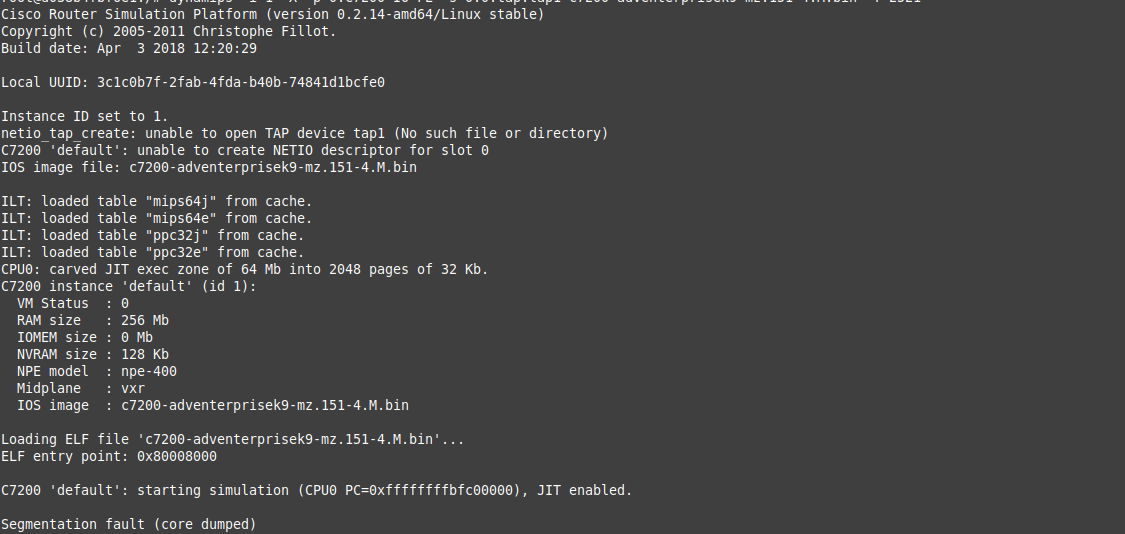
Solution - Compile The Newer Version of dynamips
As you can see from the output, the newest version in the repo is 0.2.14 which was built in 2018. The versioning numbers themselves, without being a whole number, are understandly "alpha" sounding versions.
Clearly, something has to be fixed and there is no newer version in the repos, so we'll have to compile our own.
Fortunately the project was picked up and lives on here: https://github.com/GNS3/dynamips
Step 1 - Get Required Packages
apt install git libpcap0.8-dev libelf-dev cmake
Step 2 - Get Source Code:
git clone https://github.com/GNS3/dynamips
Cloning into 'dynamips'...
remote: Enumerating objects: 4195, done.
remote: Counting objects: 100% (775/775), done.
remote: Compressing objects: 100% (134/134), done.
remote: Total 4195 (delta 694), reused 641 (delta 641), pack-reused 3420 (from 1)
Receiving objects: 100% (4195/4195), 2.63 MiB | 20.39 MiB/s, done.
Resolving deltas: 100% (3019/3019), done.
Step 3 - Prepare Environment and Compile
cd dynamips
mkdir build
cd build
cmake .. -DDYNAMIPS_CODE=stable
You should see this at the end of successful compilation:
-- DYNAMIPS_FLAGS=-m64;-Wall;-O2;-fomit-frame-pointer
-- DYNAMIPS_DEFINITIONS=-DHAS_POSIX_MEMALIGN=1;-DDYNAMIPS_VERSION="0.2.23";-DJIT_ARCH="amd64";-DJIT_CPU=CPU_amd64;-DMIPS64_ARCH_INC_FILE="mips64_amd64_trans.h";-DPPC32_ARCH_INC_FILE="ppc32_amd64_trans.h";-D_FILE_OFFSET_BITS=64;-D_LARGEFILE_SOURCE;-D_LARGEFILE64_SOURCE;-DLINUX_ETH;-DGEN_ETH;-DHAS_RFC2553=1;-DOSNAME=Linux
-- DYNAMIPS_INCLUDES=/usr/include
-- DYNAMIPS_LIBRARIES=dl;rt;nsl;/usr/lib/x86_64-linux-gnu/libelf.so;-lpthread;/usr/lib/x86_64-linux-gnu/libpcap.so
-- configure - END
Summary:
CMAKE_INSTALL_PREFIX : /usr/local
DYNAMIPS_ARCH : amd64
DYNAMIPS_CODE : stable
DYNAMIPS_RENAME : dynamips_amd64_stable -> dynamips (auto)
BUILD_NVRAM_EXPORT : ON
BUILD_UDP_SEND : OFF
BUILD_UDP_RECV : OFF
Large File support : ENABLE_LARGEFILE=ON
Linux Ethernet (RAW sockets) : ENABLE_LINUX_ETH=ON (linux_eth)
Generic Ethernet (libpcap/WinPcap) : ENABLE_GEN_ETH=ON (gen_eth)
IPv6 support (RFC 2553) : ENABLE_IPV6=ON
-- Configuring done
-- Generating done
-- Build files have been written to: /root/dynamips/build
root@d038b4fbf6e1:~/dynamips/build#
Now make and install
make
make install
ln -s /usr/local/bin/dynamips /bin
Confirm it is the right version:
You should as below that it is version 0.2.23 and the compilation date should be the date and time you did this.
dynamips|head
Please specify an IOS image filename
Cisco Router Simulation Platform (version 0.2.23-amd64/Linux stable)
Copyright (c) 2005-2011 Christophe Fillot.
Build date: Sep 16 2024 21:09:39
Abusive IP ranges blacklist
Make sure this makes sense for you but I've started to block a lot of commercial Cloud services and easily accessible providers as they are a very high source of abusive traffic. The cost savings for a lot of organizations are huge, as you now have less bandwidth usage and less resource usage from garbage/bot/malicious traffic. This mainly works for when you can be reasonably sure that your audience has no business visiting your service(s) from freely accessible commercial IP space (eg. Amazon, Huawei Cloud, Oracle Cloud etc..). In general, any large service that offers Cloud to anyone without proper authentication, for cheap or offer any free trials/refunds (having a credit card is not enough authentication) is going to be a huge source of abusive traffic.
Some is not meant to be abusive but many of the SEO tools and services will scan your site, often causing a huge load by constantly hitting your services every second or several times per second. Even if this does not slow your services down, there is a cost to it and you may be surprised at how much it is costing you or how much extra CPU, RAM and disk IO is wasted to abuse.
This will serve as a comprehensive list of suggested ranges to block. If this causes issues from legitimate traffic, make sure you have a mechanism in place to whitelist "known good IPs" that you, your work or clients may be using. Also discourage the use of rotating IPs unless there is a good reason, all traffic should be received by static IPs that are whitelisted.
If you have publicly accessible services, there are generally not too many good reasons why users should be hitting you from commercial cloud services or VPN providers (unless your users genuinely need a VPN for security or to access your services). These services are a huge waste of resources as in many cases, I've seen 80-90% of traffic is just garbage traffic, and often it is a competitor or bad actor using these services to actively attack public services.
Now if you happen to know a service that uses a cloud service, such as Pinterest using Amazon and don't want to block it, you can whitelist their IP ranges as most reputable services will list their range of IPs for this purpose.
Note that this is not recommended as replacement for good security and firewalls but it already reduces the abusive traffic angle.
However, given that the Cloud providers offer services to anyone, they are still a source of intentionally maliicious traffic because throw away accounts are allowed on many Cloud services (eg. free trial that one uses with a prepaid credit card for the purposes of abuse).
The presence or lack of presence of a Cloud provider here does not mean they are better or worse for abuse, but I just haven't gotten a chance to list them here yet.
All proposed blocks are based on real-world examples (eg. abusive traffic coming from those hosts).
In another post we'll list a bunch of bad user agents to block.
When not to use Cloud Providers
1.) If you value privacy or control of your data
2.) If you are using it as a VPN or other outward facing service there is a good chance it may be transparently blocked.
3.) If you must use a VPN, it is best to run it from one of your office's legitimate internet connection as these IPs are the least likely to be blocked.
Where are they really from?
Beware that user agents can be forged, many DDOS services will try to masquerade as a legitimate service or scanning tool but you will often find that there is no relation (eg. a bot hitting your site that has the Google bot agent set but is really from Digital Ocean and not truly Google).
Other proposed blocks:
In general any cheap provider and any large provider should probably be blocked. This especially means providers that offer a free trial or X-day money back guarantee.
- GCP (Google Cloud)
- Vultr (Cloud)
- Hetzner (Cheap host)
- Microsoft Azure
- Oracle Cloud
- Worldstream (smaller but abusive traffic)
- Scaleway
- OVH
- Leaseweb
- IPXO LLC
- Server Destroyers LLC
Other Crap:
turnitin
It's a service for plagiarism but we've seen it hitting client servers abusively so it's the same as a DDOS/waste of resources/botnet since it offers no value to the hoster.
199.47.80.0/21
Block SEO Tools:
Popular tools include:
- Moz
- Ahrefs
- SEMRush
- Majestic SEO
If you aren't using the tools for the particular site(s) running then these should be blocked or at least give them a 403 based on the user agent.
We've seen several SEO tools used at once by determined attacker as a similar impact as DDOS by having reports run on the target site/URL done by several SEO tools or other scanning site performance tools that were otherwise legitimate.
Block Search Engines/Crawlers:
If you don't get traffic from certain search engines then consider blocking them. There are dozens of other smaller crawling services that cause huge issues.
Block AI Tools:
This has the double effect of preserving your resources and stopping AI from stealing or using your info in their replies.
Our experience is that most providers simply don't have time or care about the large amount of abuse reports they get (eg. complain and you will usually never receive any response or action).
Huawei Cloud is a good idea to block as I've seen too many cases of abuse from their ranges despite them not being considered such a huge provider compared to AWS.
1.178.32.0/20
1.178.48.0/20
101.44.0.0/20
101.44.144.0/20
101.44.16.0/20
101.44.160.0/20
101.44.173.0/24
101.44.176.0/20
101.44.192.0/20
101.44.208.0/22
101.44.212.0/22
101.44.216.0/22
101.44.220.0/22
101.44.224.0/22
101.44.228.0/22
101.44.232.0/22
101.44.236.0/22
101.44.244.0/22
101.44.248.0/22
101.44.252.0/24
101.44.253.0/24
101.44.254.0/24
101.44.255.0/24
101.44.32.0/20
101.44.48.0/20
101.44.64.0/20
101.44.80.0/20
101.44.96.0/20
101.46.0.0/20
101.46.128.0/21
101.46.136.0/21
101.46.144.0/21
101.46.152.0/21
101.46.160.0/21
101.46.168.0/21
101.46.176.0/21
101.46.184.0/21
101.46.192.0/21
101.46.208.0/21
101.46.216.0/21
101.46.236.0/22
101.46.240.0/22
101.46.248.0/22
101.46.252.0/24
101.46.254.0/24
101.46.255.0/24
101.46.32.0/20
101.46.48.0/20
101.46.64.0/20
103.215.0.0/24
103.215.1.0/24
103.215.3.0/24
103.239.72.0/24
103.240.157.0/24
103.255.61.0/24
103.255.62.0/24
110.238.100.0/22
110.238.104.0/21
110.238.112.0/21
110.238.120.0/22
110.238.124.0/22
110.238.64.0/21
110.238.72.0/21
110.238.80.0/20
110.238.96.0/24
110.238.98.0/24
110.238.99.0/24
110.239.127.0/24
110.239.64.0/19
110.239.96.0/19
110.41.210.0/24
110.41.90.0/24
111.119.192.0/20
111.119.208.0/20
111.119.224.0/20
111.119.240.0/20
114.119.128.0/19
114.119.160.0/21
114.119.168.0/24
114.119.169.0/24
114.119.170.0/24
114.119.171.0/24
114.119.172.0/22
114.119.176.0/20
115.30.32.0/20
115.30.48.0/20
119.12.160.0/20
119.13.112.0/20
119.13.160.0/24
119.13.161.0/24
119.13.162.0/23
119.13.163.0/24
119.13.164.0/22
119.13.168.0/24
119.13.169.0/24
119.13.170.0/24
119.13.171.0/24
119.13.172.0/24
119.13.173.0/24
119.13.174.0/24
119.13.175.0/24
119.13.64.0/24
119.13.65.0/24
119.13.66.0/23
119.13.68.0/22
119.13.72.0/22
119.13.76.0/22
119.13.80.0/21
119.13.88.0/22
119.13.92.0/22
119.13.96.0/20
119.8.0.0/21
119.8.128.0/24
119.8.129.0/24
119.8.13.0/24
119.8.130.0/23
119.8.132.0/22
119.8.136.0/21
119.8.144.0/20
119.8.15.0/24
119.8.160.0/19
119.8.18.0/24
119.8.192.0/20
119.8.192.0/21
119.8.200.0/21
119.8.208.0/20
119.8.21.0/24
119.8.22.0/24
119.8.224.0/24
119.8.227.0/24
119.8.228.0/22
119.8.23.0/24
119.8.232.0/21
119.8.24.0/21
119.8.240.0/23
119.8.242.0/23
119.8.244.0/24
119.8.245.0/24
119.8.246.0/24
119.8.247.0/24
119.8.248.0/24
119.8.249.0/24
119.8.250.0/24
119.8.252.0/24
119.8.253.0/24
119.8.254.0/23
119.8.32.0/19
119.8.4.0/24
119.8.64.0/22
119.8.68.0/24
119.8.69.0/24
119.8.70.0/24
119.8.71.0/24
119.8.72.0/21
119.8.8.0/21
119.8.80.0/20
119.8.96.0/19
121.91.152.0/21
121.91.168.0/21
121.91.200.0/21
121.91.200.0/24
122.8.128.0/20
122.8.144.0/20
122.8.160.0/20
122.8.176.0/21
122.8.184.0/22
122.8.188.0/22
124.243.128.0/18
124.243.156.0/24
124.243.157.0/24
124.243.158.0/24
124.243.159.0/24
124.71.248.0/24
124.71.249.0/24
124.71.252.0/24
124.71.253.0/24
124.81.0.0/20
124.81.16.0/20
124.81.160.0/20
124.81.176.0/20
124.81.192.0/20
124.81.208.0/20
124.81.224.0/20
124.81.240.0/20
124.81.32.0/20
124.81.48.0/20
124.81.64.0/20
124.81.80.0/20
14.137.132.0/22
14.137.136.0/22
14.137.140.0/22
14.137.152.0/24
14.137.153.0/24
14.137.154.0/24
14.137.156.0/24
14.137.157.0/24
14.137.161.0/24
14.137.169.0/24
14.137.170.0/23
14.137.172.0/22
149.232.128.0/20
149.232.144.0/20
150.40.128.0/20
150.40.144.0/20
150.40.160.0/20
150.40.176.0/20
150.40.192.0/20
150.40.208.0/20
150.40.224.0/20
150.40.240.0/20
154.220.192.0/19
154.81.16.0/20
154.83.0.0/23
154.86.32.0/20
154.86.48.0/20
154.93.100.0/23
154.93.104.0/23
156.227.22.0/23
156.230.32.0/21
156.230.40.0/21
156.230.64.0/18
156.232.16.0/20
156.240.128.0/18
156.249.32.0/20
156.253.16.0/20
159.138.0.0/20
159.138.112.0/21
159.138.114.0/24
159.138.120.0/22
159.138.124.0/24
159.138.125.0/24
159.138.126.0/23
159.138.128.0/20
159.138.144.0/20
159.138.152.0/21
159.138.16.0/22
159.138.160.0/20
159.138.176.0/23
159.138.178.0/24
159.138.179.0/24
159.138.180.0/24
159.138.181.0/24
159.138.182.0/23
159.138.188.0/23
159.138.190.0/23
159.138.192.0/20
159.138.20.0/22
159.138.208.0/21
159.138.216.0/22
159.138.220.0/23
159.138.224.0/20
159.138.24.0/21
159.138.240.0/20
159.138.32.0/20
159.138.48.0/20
159.138.64.0/21
159.138.67.0/24
159.138.76.0/24
159.138.77.0/24
159.138.78.0/24
159.138.79.0/24
159.138.80.0/20
159.138.96.0/20
166.108.192.0/20
166.108.208.0/20
166.108.224.0/20
166.108.240.0/20
176.52.128.0/20
176.52.144.0/20
180.87.192.0/20
180.87.208.0/20
180.87.224.0/20
180.87.240.0/20
182.160.0.0/20
182.160.16.0/24
182.160.17.0/24
182.160.18.0/23
182.160.20.0/24
182.160.24.0/21
182.160.36.0/22
182.160.49.0/24
182.160.52.0/22
182.160.56.0/24
182.160.57.0/24
182.160.58.0/24
182.160.59.0/24
182.160.60.0/24
182.160.61.0/24
182.160.62.0/24
183.87.112.0/20
183.87.128.0/20
183.87.144.0/20
183.87.32.0/20
183.87.48.0/20
183.87.64.0/20
183.87.80.0/20
183.87.96.0/20
188.239.0.0/20
188.239.16.0/20
189.1.192.0/20
189.1.208.0/20
189.1.224.0/20
189.1.240.0/20
189.28.112.0/20
189.28.96.0/20
190.92.192.0/19
190.92.224.0/19
190.92.248.0/24
190.92.252.0/24
190.92.253.0/24
190.92.254.0/24
193.105.244.0/23
193.84.248.0/23
201.77.32.0/20
202.170.88.0/21
203.123.80.0/20
203.167.20.0/23
203.167.22.0/24
212.34.192.0/20
212.34.208.0/20
212.34.216.32/32
213.250.128.0/20
213.250.144.0/20
27.106.0.0/20
27.106.112.0/20
27.106.16.0/20
27.106.32.0/20
27.106.48.0/20
27.106.64.0/20
27.106.80.0/20
27.106.96.0/20
43.225.140.0/22
43.255.104.0/22
45.194.104.0/21
45.199.144.0/22
45.202.128.0/19
45.202.160.0/20
45.202.176.0/21
45.202.184.0/21
45.203.32.0/21
45.203.40.0/21
46.250.160.0/20
46.250.176.0/20
49.0.192.0/21
49.0.200.0/21
49.0.224.0/22
49.0.228.0/22
49.0.232.0/21
49.0.240.0/20
80.238.132.0/22
80.238.136.0/22
80.238.180.0/24
80.238.190.0/24
80.238.192.0/20
80.238.208.0/20
80.238.224.0/20
83.101.0.0/21
83.101.16.0/21
83.101.48.0/21
83.101.56.0/21
87.119.12.0/24
94.45.160.0/24
94.45.161.0/24
94.45.163.0/24
94.74.112.0/21
94.74.120.0/21
94.74.64.0/20
94.74.80.0/20
94.74.96.0/20
Digital Ocean
Digital Ocean is a huge offender based on experience and we have never seen any response to abuse complaints.
5.101.96.0/21
5.101.104.0/22
5.101.108.0/24
5.101.109.0/24
5.101.110.0/24
5.101.111.0/24
24.144.64.0/22
24.144.68.0/22
24.144.72.0/24
24.144.73.0/24
24.144.74.0/23
24.144.76.0/22
24.144.80.0/20
24.144.96.0/19
24.199.64.0/22
24.199.68.0/22
24.199.72.0/21
24.199.80.0/20
24.199.96.0/20
24.199.112.0/20
37.139.0.0/19
45.55.0.0/19
45.55.32.0/19
45.55.64.0/19
45.55.96.0/22
45.55.100.0/22
45.55.104.0/22
45.55.108.0/22
45.55.112.0/22
45.55.116.0/22
45.55.120.0/22
45.55.124.0/22
45.55.128.0/18
45.55.192.0/18
46.101.0.0/18
46.101.64.0/22
46.101.68.0/22
46.101.72.0/21
46.101.80.0/20
46.101.96.0/19
46.101.128.0/17
64.23.128.0/20
64.23.144.0/20
64.23.160.0/20
64.23.176.0/20
64.23.192.0/19
64.23.224.0/20
64.23.240.0/20
64.225.0.0/20
64.225.16.0/20
64.225.32.0/20
64.225.48.0/20
64.225.64.0/20
64.225.80.0/22
64.225.84.0/22
64.225.88.0/22
64.225.92.0/22
64.225.96.0/20
64.225.112.0/20
64.226.64.0/20
64.226.80.0/20
64.226.96.0/20
64.226.112.0/20
64.227.0.0/20
64.227.16.0/20
64.227.32.0/20
64.227.48.0/20
64.227.64.0/20
64.227.80.0/20
64.227.96.0/20
64.227.112.0/20
64.227.128.0/19
64.227.160.0/20
64.227.176.0/20
67.205.128.0/20
67.205.144.0/20
67.205.160.0/20
67.205.176.0/20
67.207.64.0/23
67.207.66.0/24
67.207.68.0/22
67.207.72.0/22
67.207.76.0/22
67.207.80.0/20
68.183.0.0/20
68.183.16.0/20
68.183.32.0/20
68.183.48.0/20
68.183.64.0/20
68.183.80.0/20
68.183.96.0/20
68.183.112.0/20
68.183.128.0/20
68.183.144.0/20
68.183.160.0/20
68.183.176.0/20
68.183.192.0/20
68.183.208.0/20
68.183.224.0/20
68.183.240.0/22
68.183.244.0/22
68.183.248.0/22
68.183.252.0/22
69.55.48.0/22
69.55.49.0/24
69.55.54.0/24
69.55.55.0/24
69.55.58.0/23
69.55.60.0/22
80.240.128.0/20
82.196.0.0/20
95.85.0.0/18
103.253.144.0/22
104.131.0.0/18
104.131.64.0/18
104.131.128.0/20
104.131.144.0/20
104.131.160.0/20
104.131.176.0/20
104.131.192.0/19
104.131.224.0/19
104.236.0.0/18
104.236.64.0/18
104.236.128.0/18
104.236.192.0/18
104.248.0.0/20
104.248.16.0/20
104.248.32.0/20
104.248.48.0/20
104.248.64.0/20
104.248.80.0/20
104.248.96.0/22
104.248.100.0/22
104.248.104.0/22
104.248.108.0/22
104.248.112.0/20
104.248.128.0/20
104.248.144.0/20
104.248.160.0/20
104.248.176.0/20
104.248.192.0/20
104.248.208.0/20
104.248.224.0/20
104.248.240.0/20
107.170.0.0/17
107.170.128.0/19
107.170.160.0/19
107.170.192.0/18
128.199.0.0/20
128.199.16.0/20
128.199.32.0/19
128.199.64.0/18
128.199.128.0/18
128.199.192.0/18
134.122.0.0/20
134.122.16.0/20
134.122.32.0/20
134.122.48.0/20
134.122.64.0/20
134.122.80.0/20
134.122.96.0/20
134.122.112.0/20
134.209.0.0/20
134.209.16.0/20
134.209.32.0/20
134.209.48.0/20
134.209.64.0/20
134.209.80.0/20
134.209.96.0/20
134.209.112.0/20
134.209.128.0/22
134.209.132.0/22
134.209.136.0/22
134.209.140.0/22
134.209.144.0/20
134.209.160.0/20
134.209.176.0/20
134.209.192.0/20
134.209.208.0/20
134.209.224.0/20
134.209.240.0/20
137.184.0.0/20
137.184.16.0/20
137.184.32.0/20
137.184.48.0/20
137.184.64.0/20
137.184.80.0/20
137.184.96.0/20
137.184.112.0/20
137.184.128.0/20
137.184.144.0/20
137.184.160.0/20
137.184.176.0/20
137.184.192.0/20
137.184.208.0/20
137.184.224.0/20
137.184.240.0/22
137.184.244.0/22
137.184.248.0/22
137.184.252.0/24
137.184.254.0/24
137.184.255.0/24
138.68.0.0/20
138.68.16.0/20
138.68.32.0/24
138.68.34.0/24
138.68.36.0/22
138.68.40.0/21
138.68.48.0/20
138.68.64.0/20
138.68.80.0/20
138.68.96.0/20
138.68.112.0/22
138.68.116.0/22
138.68.120.0/23
138.68.122.0/23
138.68.124.0/22
138.68.128.0/20
138.68.144.0/20
138.68.160.0/20
138.68.176.0/20
138.68.192.0/22
138.68.196.0/22
138.68.200.0/22
138.68.204.0/22
138.68.208.0/20
138.68.224.0/20
138.68.240.0/20
138.197.0.0/20
138.197.16.0/20
138.197.32.0/20
138.197.48.0/22
138.197.52.0/22
138.197.56.0/22
138.197.60.0/22
138.197.64.0/20
138.197.80.0/20
138.197.96.0/20
138.197.112.0/20
138.197.128.0/20
138.197.144.0/20
138.197.160.0/20
138.197.176.0/20
138.197.192.0/20
138.197.208.0/20
138.197.224.0/22
138.197.228.0/22
138.197.232.0/22
138.197.236.0/22
138.197.240.0/22
138.197.252.0/22
139.59.0.0/20
139.59.16.0/20
139.59.32.0/20
139.59.48.0/22
139.59.52.0/22
139.59.56.0/21
139.59.64.0/20
139.59.80.0/20
139.59.96.0/20
139.59.112.0/20
139.59.128.0/19
139.59.160.0/20
139.59.176.0/20
139.59.192.0/22
139.59.196.0/22
139.59.200.0/22
139.59.204.0/22
139.59.208.0/21
139.59.216.0/22
139.59.220.0/22
139.59.224.0/20
139.59.240.0/20
141.0.169.0/24
141.0.170.0/24
142.93.0.0/20
142.93.16.0/20
142.93.32.0/20
142.93.48.0/20
142.93.64.0/20
142.93.80.0/20
142.93.96.0/20
142.93.112.0/20
142.93.128.0/20
142.93.144.0/20
142.93.160.0/20
142.93.176.0/20
142.93.192.0/20
142.93.208.0/20
142.93.224.0/20
142.93.240.0/20
143.110.128.0/20
143.110.144.0/20
143.110.160.0/20
143.110.176.0/20
143.110.192.0/20
143.110.208.0/20
143.110.224.0/20
143.110.240.0/20
143.198.0.0/20
143.198.16.0/20
143.198.32.0/20
143.198.48.0/20
143.198.64.0/20
143.198.80.0/20
143.198.96.0/20
143.198.112.0/20
143.198.128.0/20
143.198.144.0/20
143.198.160.0/20
143.198.176.0/20
143.198.192.0/20
143.198.208.0/20
143.198.224.0/20
143.198.240.0/22
143.198.244.0/22
143.198.248.0/22
143.244.128.0/20
143.244.144.0/20
143.244.160.0/20
143.244.176.0/20
143.244.196.0/22
143.244.200.0/22
143.244.204.0/22
143.244.208.0/22
143.244.212.0/22
143.244.217.0/24
143.244.218.0/24
143.244.219.0/24
143.244.220.0/22
144.126.192.0/20
144.126.208.0/20
144.126.224.0/20
144.126.240.0/22
144.126.244.0/22
144.126.248.0/22
144.126.252.0/22
146.185.128.0/19
146.185.160.0/20
146.185.176.0/21
146.185.184.0/21
146.190.0.0/22
146.190.4.0/22
146.190.8.0/22
146.190.12.0/22
146.190.16.0/20
146.190.32.0/19
146.190.64.0/20
146.190.80.0/20
146.190.96.0/20
146.190.112.0/20
146.190.128.0/19
146.190.160.0/20
146.190.176.0/22
146.190.184.0/22
146.190.188.0/22
146.190.192.0/22
146.190.196.0/22
146.190.200.0/22
146.190.204.0/22
146.190.208.0/20
146.190.224.0/20
146.190.240.0/20
147.182.128.0/20
147.182.144.0/20
147.182.160.0/20
147.182.176.0/20
147.182.192.0/20
147.182.208.0/20
147.182.224.0/20
147.182.240.0/20
152.42.128.0/20
152.42.144.0/22
152.42.148.0/22
152.42.152.0/22
152.42.156.0/22
152.42.160.0/19
152.42.192.0/19
152.42.224.0/20
152.42.240.0/20
157.230.0.0/20
157.230.16.0/20
157.230.32.0/20
157.230.48.0/20
157.230.64.0/22
157.230.68.0/22
157.230.72.0/22
157.230.76.0/22
157.230.80.0/20
157.230.96.0/20
157.230.112.0/20
157.230.128.0/20
157.230.144.0/20
157.230.160.0/20
157.230.176.0/20
157.230.192.0/22
157.230.196.0/22
157.230.200.0/22
157.230.204.0/22
157.230.208.0/20
157.230.224.0/20
157.230.240.0/20
157.245.0.0/20
157.245.16.0/22
157.245.20.0/22
157.245.24.0/22
157.245.28.0/22
157.245.32.0/20
157.245.48.0/20
157.245.64.0/20
157.245.80.0/20
157.245.96.0/20
157.245.112.0/20
157.245.128.0/20
157.245.144.0/20
157.245.160.0/20
157.245.176.0/20
157.245.192.0/20
157.245.208.0/20
157.245.224.0/20
157.245.240.0/20
159.65.0.0/20
159.65.16.0/20
159.65.32.0/20
159.65.48.0/20
159.65.64.0/20
159.65.80.0/20
159.65.96.0/20
159.65.112.0/20
159.65.128.0/20
159.65.144.0/20
159.65.160.0/20
159.65.176.0/20
159.65.192.0/20
159.65.208.0/22
159.65.212.0/22
159.65.216.0/21
159.65.224.0/20
159.65.240.0/20
159.89.0.0/20
159.89.16.0/20
159.89.32.0/20
159.89.48.0/21
159.89.58.0/24
159.89.59.0/24
159.89.60.0/24
159.89.61.0/24
159.89.62.0/24
159.89.63.0/24
159.89.64.0/20
159.89.80.0/20
159.89.96.0/20
159.89.112.0/20
159.89.128.0/20
159.89.144.0/20
159.89.160.0/20
159.89.176.0/20
159.89.192.0/20
159.89.208.0/22
159.89.212.0/22
159.89.216.0/22
159.89.220.0/22
159.89.224.0/20
159.89.240.0/22
159.89.244.0/22
159.89.248.0/22
159.89.252.0/22
159.203.0.0/20
159.203.16.0/20
159.203.32.0/20
159.203.48.0/22
159.203.52.0/22
159.203.56.0/21
159.203.64.0/20
159.203.80.0/20
159.203.96.0/20
159.203.112.0/20
159.203.128.0/20
159.203.144.0/22
159.203.148.0/22
159.203.152.0/22
159.203.156.0/22
159.203.160.0/20
159.203.176.0/20
159.203.192.0/20
159.203.208.0/20
159.203.224.0/20
159.203.240.0/20
159.223.0.0/20
159.223.16.0/20
159.223.32.0/20
159.223.48.0/20
159.223.64.0/20
159.223.80.0/20
159.223.96.0/20
159.223.112.0/20
159.223.128.0/20
159.223.144.0/20
159.223.160.0/19
159.223.192.0/20
159.223.208.0/20
159.223.224.0/20
159.223.240.0/22
159.223.244.0/22
159.223.248.0/22
161.35.0.0/20
161.35.16.0/20
161.35.32.0/20
161.35.48.0/20
161.35.64.0/20
161.35.80.0/20
161.35.96.0/20
161.35.112.0/20
161.35.128.0/20
161.35.144.0/20
161.35.160.0/20
161.35.176.0/20
161.35.192.0/20
161.35.208.0/20
161.35.224.0/20
161.35.240.0/22
161.35.244.0/22
161.35.248.0/22
161.35.252.0/22
162.243.0.0/17
162.243.128.0/19
162.243.160.0/20
162.243.184.0/22
162.243.188.0/23
162.243.190.0/24
162.243.191.0/24
162.243.192.0/18
163.47.8.0/22
164.90.128.0/20
164.90.144.0/20
164.90.160.0/20
164.90.176.0/20
164.90.192.0/20
164.90.208.0/20
164.90.224.0/20
164.90.240.0/22
164.90.244.0/22
164.90.248.0/24
164.90.249.0/24
164.90.250.0/24
164.90.252.0/22
164.92.64.0/19
164.92.96.0/19
164.92.128.0/20
164.92.144.0/20
164.92.160.0/20
164.92.176.0/20
164.92.192.0/20
164.92.208.0/20
164.92.224.0/20
164.92.240.0/20
165.22.0.0/20
165.22.16.0/20
165.22.32.0/20
165.22.48.0/20
165.22.64.0/20
165.22.80.0/20
165.22.96.0/20
165.22.112.0/20
165.22.128.0/20
165.22.144.0/20
165.22.160.0/20
165.22.176.0/20
165.22.192.0/20
165.22.208.0/20
165.22.224.0/20
165.22.240.0/20
165.227.0.0/20
165.227.16.0/20
165.227.32.0/20
165.227.48.0/20
165.227.64.0/20
165.227.80.0/20
165.227.96.0/20
165.227.112.0/20
165.227.128.0/20
165.227.144.0/20
165.227.160.0/20
165.227.176.0/20
165.227.192.0/20
165.227.208.0/20
165.227.224.0/20
165.227.240.0/22
165.227.244.0/22
165.227.248.0/22
165.227.252.0/22
165.232.32.0/20
165.232.48.0/20
165.232.64.0/20
165.232.80.0/20
165.232.96.0/20
165.232.112.0/20
165.232.128.0/20
165.232.144.0/20
165.232.160.0/20
165.232.176.0/20
167.71.0.0/20
167.71.16.0/20
167.71.32.0/20
167.71.48.0/20
167.71.64.0/20
167.71.80.0/20
167.71.96.0/20
167.71.112.0/20
167.71.128.0/20
167.71.144.0/20
167.71.160.0/20
167.71.176.0/20
167.71.192.0/20
167.71.208.0/20
167.71.224.0/20
167.71.240.0/20
167.99.0.0/20
167.99.16.0/22
167.99.20.0/22
167.99.24.0/22
167.99.28.0/22
167.99.32.0/20
167.99.48.0/20
167.99.64.0/20
167.99.80.0/20
167.99.96.0/20
167.99.112.0/20
167.99.128.0/20
167.99.144.0/20
167.99.160.0/20
167.99.176.0/20
167.99.192.0/20
167.99.208.0/20
167.99.224.0/20
167.99.240.0/20
167.172.0.0/22
167.172.4.0/22
167.172.8.0/22
167.172.12.0/22
167.172.16.0/20
167.172.32.0/20
167.172.48.0/20
167.172.64.0/20
167.172.80.0/20
167.172.96.0/20
167.172.112.0/20
167.172.128.0/20
167.172.144.0/20
167.172.160.0/20
167.172.176.0/20
167.172.192.0/20
167.172.208.0/20
167.172.224.0/20
167.172.240.0/20
170.64.128.0/18
170.64.192.0/19
170.64.224.0/20
170.64.240.0/21
170.64.248.0/21
174.138.0.0/20
174.138.16.0/20
174.138.32.0/20
174.138.48.0/20
174.138.64.0/20
174.138.80.0/20
174.138.96.0/22
174.138.100.0/22
174.138.104.0/22
174.138.108.0/22
174.138.112.0/22
174.138.116.0/22
174.138.120.0/22
174.138.124.0/22
178.62.0.0/18
178.62.64.0/18
178.62.128.0/18
178.62.192.0/18
178.128.0.0/20
178.128.16.0/20
178.128.32.0/20
178.128.48.0/20
178.128.64.0/20
178.128.80.0/20
178.128.96.0/20
178.128.112.0/20
178.128.128.0/22
178.128.132.0/22
178.128.136.0/22
178.128.140.0/22
178.128.144.0/20
178.128.160.0/20
178.128.176.0/20
178.128.192.0/20
178.128.208.0/20
178.128.224.0/20
178.128.240.0/20
185.14.184.0/22
188.166.0.0/18
188.166.64.0/18
188.166.128.0/22
188.166.132.0/22
188.166.136.0/22
188.166.140.0/22
188.166.144.0/20
188.166.160.0/21
188.166.168.0/21
188.166.176.0/20
188.166.192.0/22
188.166.196.0/22
188.166.200.0/22
188.166.204.0/22
188.166.208.0/20
188.166.224.0/20
188.166.240.0/20
188.226.128.0/17
192.34.56.0/21
192.81.208.0/21
192.81.216.0/22
192.81.220.0/22
192.241.128.0/19
192.241.160.0/19
192.241.192.0/19
192.241.224.0/20
192.241.240.0/20
198.199.64.0/20
198.199.80.0/21
198.199.88.0/22
198.199.92.0/22
198.199.96.0/20
198.199.112.0/21
198.199.120.0/22
198.199.124.0/22
198.211.96.0/20
198.211.112.0/22
198.211.116.0/23
198.211.118.0/23
198.211.120.0/21
204.48.16.0/20
206.81.0.0/20
206.81.16.0/20
206.189.0.0/20
206.189.16.0/20
206.189.32.0/20
206.189.48.0/20
206.189.64.0/20
206.189.80.0/20
206.189.96.0/20
206.189.112.0/20
206.189.128.0/20
206.189.144.0/20
206.189.160.0/20
206.189.176.0/20
206.189.192.0/20
206.189.208.0/20
206.189.224.0/20
206.189.240.0/22
206.189.244.0/22
206.189.248.0/22
206.189.252.0/22
207.154.192.0/20
207.154.208.0/20
207.154.224.0/20
207.154.240.0/20
208.68.36.0/22
209.38.0.0/22
209.38.4.0/22
209.38.8.0/21
209.38.16.0/20
209.38.32.0/20
209.38.48.0/22
209.38.52.0/22
209.38.64.0/20
209.38.96.0/20
209.38.128.0/19
209.38.160.0/22
209.38.164.0/22
209.38.168.0/22
209.38.172.0/22
209.38.176.0/20
209.38.192.0/19
209.38.224.0/19
209.97.128.0/20
209.97.144.0/20
209.97.160.0/20
209.97.176.0/20
Google Cloud (GCP):
https://www.gstatic.com/ipranges/cloud.json

34.1.208.0/20
34.35.0.0/16
34.152.86.0/23
34.177.50.0/23
34.80.0.0/15
34.137.0.0/16
35.185.128.0/19
35.185.160.0/20
35.187.144.0/20
35.189.160.0/19
35.194.128.0/17
35.201.128.0/17
35.206.192.0/18
35.220.32.0/21
35.221.128.0/17
35.229.128.0/17
35.234.0.0/18
35.235.16.0/20
35.236.128.0/18
35.242.32.0/21
104.155.192.0/19
104.155.224.0/20
104.199.128.0/18
104.199.192.0/19
104.199.224.0/20
104.199.242.0/23
104.199.244.0/22
104.199.248.0/21
107.167.176.0/20
130.211.240.0/20
34.92.0.0/16
34.96.128.0/17
34.104.88.0/21
34.124.24.0/21
34.150.0.0/17
35.215.128.0/18
35.220.27.0/24
35.220.128.0/17
35.241.64.0/18
35.242.27.0/24
35.243.8.0/21
34.84.0.0/16
34.85.0.0/17
34.104.62.0/23
34.104.128.0/17
34.127.190.0/23
34.146.0.0/16
34.157.64.0/20
34.157.164.0/22
34.157.192.0/20
35.187.192.0/19
35.189.128.0/19
35.190.224.0/20
35.194.96.0/19
35.200.0.0/17
35.213.0.0/17
35.220.56.0/22
35.221.64.0/18
35.230.240.0/20
35.242.56.0/22
35.243.64.0/18
104.198.80.0/20
104.198.112.0/20
34.97.0.0/16
34.104.49.0/24
34.127.177.0/24
35.217.128.0/17
35.220.45.0/24
35.242.45.0/24
35.243.56.0/21
34.0.96.0/19
34.22.64.0/19
34.22.96.0/20
34.47.64.0/18
34.50.0.0/18
34.64.32.0/19
34.64.64.0/22
34.64.68.0/22
34.64.72.0/21
34.64.80.0/20
34.64.96.0/19
34.64.128.0/22
34.64.132.0/22
34.64.136.0/21
34.64.144.0/20
34.64.160.0/19
34.64.192.0/18
35.216.0.0/17
34.0.227.0/24
34.47.128.0/17
34.93.0.0/16
34.100.128.0/17
34.104.108.0/23
34.124.44.0/23
34.152.64.0/22
34.153.58.0/23
34.153.250.0/23
34.157.87.0/24
34.157.215.0/24
34.177.32.0/22
35.200.128.0/17
35.201.41.0/24
35.207.192.0/18
35.220.42.0/24
35.234.208.0/20
35.242.42.0/24
35.244.0.0/18
34.0.0.0/20
34.104.120.0/23
34.124.56.0/23
34.126.208.0/20
34.131.0.0/16
34.153.32.0/24
34.153.224.0/24
34.1.128.0/20
34.1.192.0/20
34.21.128.0/17
34.87.0.0/17
34.87.128.0/18
34.104.58.0/23
34.104.106.0/23
34.124.42.0/23
34.124.128.0/17
34.126.64.0/18
34.126.128.0/18
34.128.44.0/23
34.128.60.0/23
34.142.128.0/17
34.143.128.0/17
34.153.40.0/23
34.153.232.0/23
34.157.82.0/23
34.157.88.0/23
34.157.210.0/23
35.185.176.0/20
35.186.144.0/20
35.187.224.0/19
35.197.128.0/19
35.198.192.0/18
35.213.128.0/18
35.220.24.0/23
35.234.192.0/20
35.240.128.0/17
35.242.24.0/23
35.247.128.0/18
34.34.216.0/21
34.50.64.0/18
34.101.18.0/24
34.101.20.0/22
34.101.24.0/22
34.101.32.0/19
34.101.64.0/18
34.101.128.0/17
34.128.64.0/18
34.152.68.0/24
34.153.44.0/24
34.153.236.0/24
34.157.254.0/24
35.219.0.0/17
34.40.128.0/17
34.87.192.0/18
34.104.104.0/23
34.116.64.0/18
34.124.40.0/23
34.128.36.0/24
34.128.48.0/24
34.151.64.0/18
34.151.128.0/18
35.189.0.0/18
35.197.160.0/19
35.201.0.0/19
35.213.192.0/18
35.220.41.0/24
35.234.224.0/20
35.242.41.0/24
35.244.64.0/18
34.0.16.0/20
34.1.176.0/20
34.104.122.0/23
34.124.58.0/23
34.126.192.0/20
34.129.0.0/16
34.0.240.0/20
34.104.116.0/22
34.116.128.0/17
34.118.0.0/17
34.124.52.0/22
34.88.0.0/16
34.104.96.0/21
34.124.32.0/21
35.203.232.0/21
35.217.0.0/18
35.220.26.0/24
35.228.0.0/16
35.242.26.0/24
34.0.192.0/19
34.157.44.0/23
34.157.172.0/23
34.164.0.0/16
34.175.0.0/16
8.34.208.0/23
8.34.211.0/24
8.34.220.0/22
23.251.128.0/20
34.22.112.0/20
34.22.128.0/17
34.34.128.0/18
34.38.0.0/16
34.76.0.0/14
34.118.254.0/23
34.140.0.0/16
35.187.0.0/17
35.187.160.0/19
35.189.192.0/18
35.190.192.0/19
35.195.0.0/16
35.205.0.0/16
35.206.128.0/18
35.210.0.0/16
35.220.96.0/19
35.233.0.0/17
35.240.0.0/17
35.241.128.0/17
35.242.64.0/19
104.155.0.0/17
104.199.0.0/18
104.199.66.0/23
104.199.68.0/22
104.199.72.0/21
104.199.80.0/20
104.199.96.0/20
130.211.48.0/20
130.211.64.0/19
130.211.96.0/20
146.148.2.0/23
146.148.4.0/22
146.148.8.0/21
146.148.16.0/20
146.148.112.0/20
192.158.28.0/22
34.1.160.0/20
34.32.0.0/17
34.152.80.0/23
34.177.36.0/23
34.1.144.0/20
34.17.0.0/16
34.157.124.0/23
34.157.250.0/23
34.39.0.0/17
34.89.0.0/17
34.105.128.0/17
34.127.186.0/23
34.128.52.0/22
34.142.0.0/17
34.147.128.0/17
34.157.36.0/22
34.157.40.0/22
34.157.168.0/22
35.189.64.0/18
35.197.192.0/18
35.203.210.0/23
35.203.212.0/22
35.203.216.0/22
35.214.0.0/17
35.220.20.0/22
35.230.128.0/19
35.234.128.0/19
35.235.48.0/20
35.242.20.0/22
35.242.128.0/18
35.246.0.0/17
34.0.224.0/24
34.0.226.0/24
34.40.0.0/17
34.89.128.0/17
34.104.112.0/23
34.107.0.0/17
34.118.244.0/22
34.124.48.0/23
34.141.0.0/17
34.157.48.0/20
34.157.176.0/20
34.159.0.0/16
35.198.64.0/18
35.198.128.0/18
35.207.64.0/18
35.207.128.0/18
35.220.18.0/23
35.234.64.0/18
35.235.32.0/20
35.242.18.0/23
35.242.192.0/18
35.246.128.0/17
34.1.224.0/19
34.32.128.0/17
34.34.0.0/17
34.90.0.0/15
34.104.126.0/23
34.124.62.0/23
34.141.128.0/17
34.147.0.0/17
34.157.80.0/23
34.157.92.0/22
34.157.208.0/23
34.157.220.0/22
35.204.0.0/16
35.214.128.0/17
35.220.16.0/23
35.234.160.0/20
35.242.16.0/23
34.65.0.0/16
34.104.110.0/23
34.124.46.0/23
35.216.128.0/17
35.220.44.0/24
35.235.216.0/21
35.242.44.0/24
34.0.160.0/19
34.153.38.0/24
34.153.230.0/24
34.154.0.0/16
34.157.8.0/23
34.157.121.0/24
34.157.136.0/23
34.157.249.0/24
35.219.224.0/19
34.1.0.0/20
34.155.0.0/16
34.157.12.0/22
34.157.140.0/22
34.163.0.0/16
34.36.0.0/16
34.49.0.0/16
34.54.0.0/16
34.95.64.0/18
34.96.64.0/18
34.98.64.0/18
34.102.128.0/17
34.104.27.0/24
34.107.128.0/17
34.110.128.0/17
34.111.0.0/16
34.116.0.0/21
34.117.0.0/16
34.120.0.0/16
34.128.128.0/18
34.144.192.0/18
34.149.0.0/16
34.160.0.0/16
35.186.192.0/18
35.190.0.0/18
35.190.64.0/19
35.190.112.0/20
35.201.64.0/18
35.227.192.0/18
35.241.0.0/18
35.244.128.0/17
107.178.240.0/20
130.211.4.0/22
130.211.8.0/21
130.211.16.0/20
130.211.32.0/20
34.1.32.0/20
34.18.0.0/16
34.157.126.0/23
34.157.252.0/23
34.1.48.0/20
34.152.84.0/23
34.166.0.0/16
34.177.48.0/23
34.0.64.0/19
34.157.90.0/23
34.157.216.0/23
34.165.0.0/16
34.19.128.0/17
34.20.0.0/17
34.47.0.0/18
34.95.0.0/18
34.104.76.0/22
34.118.128.0/18
34.124.12.0/22
34.128.37.0/24
34.128.42.0/23
34.128.49.0/24
34.128.58.0/23
34.152.0.0/18
35.203.0.0/17
35.215.0.0/18
35.220.43.0/24
35.234.240.0/20
35.242.43.0/24
34.0.32.0/20
34.104.114.0/23
34.124.50.0/23
34.124.112.0/20
34.130.0.0/16
34.152.69.0/24
34.157.255.0/24
34.51.0.0/17
34.153.42.0/23
34.153.234.0/23
34.39.128.0/17
34.95.128.0/17
34.104.80.0/21
34.124.16.0/21
34.151.0.0/18
34.151.192.0/18
35.198.0.0/18
35.199.64.0/18
35.215.192.0/18
35.220.40.0/24
35.235.0.0/20
35.242.40.0/24
35.247.192.0/18
34.0.48.0/20
34.104.50.0/23
34.127.178.0/23
34.153.33.0/24
34.153.225.0/24
34.176.0.0/16
8.34.210.0/24
8.34.212.0/22
8.34.216.0/22
8.35.192.0/21
23.236.48.0/20
23.251.144.0/20
34.0.225.0/24
34.16.0.0/17
34.27.0.0/16
34.28.0.0/14
34.33.0.0/16
34.41.0.0/16
34.42.0.0/16
34.44.0.0/15
34.46.0.0/16
34.66.0.0/15
34.68.0.0/14
34.72.0.0/16
34.118.200.0/21
34.121.0.0/16
34.122.0.0/15
34.128.32.0/22
34.132.0.0/14
34.136.0.0/16
34.153.48.0/21
34.153.240.0/21
34.157.84.0/23
34.157.96.0/20
34.157.212.0/23
34.157.224.0/20
34.170.0.0/15
34.172.0.0/15
34.177.52.0/22
35.184.0.0/16
35.188.0.0/17
35.188.128.0/18
35.188.192.0/19
35.192.0.0/15
35.194.0.0/18
35.202.0.0/16
35.206.64.0/18
35.208.0.0/15
35.220.64.0/19
35.222.0.0/15
35.224.0.0/15
35.226.0.0/16
35.232.0.0/16
35.238.0.0/15
35.242.96.0/19
104.154.16.0/20
104.154.32.0/19
104.154.64.0/19
104.154.96.0/20
104.154.113.0/24
104.154.114.0/23
104.154.116.0/22
104.154.120.0/23
104.154.128.0/17
104.155.128.0/18
104.197.0.0/16
104.198.16.0/20
104.198.32.0/19
104.198.64.0/20
104.198.128.0/17
107.178.208.0/20
108.59.80.0/21
130.211.112.0/20
130.211.128.0/18
130.211.192.0/19
130.211.224.0/20
146.148.32.0/19
146.148.64.0/19
146.148.96.0/20
162.222.176.0/21
173.255.112.0/21
199.192.115.0/24
199.223.232.0/22
199.223.236.0/24
34.22.0.0/19
35.186.0.0/17
35.186.128.0/20
35.206.32.0/19
35.220.46.0/24
35.242.46.0/24
107.167.160.0/20
108.59.88.0/21
173.255.120.0/21
34.23.0.0/16
34.24.0.0/15
34.26.0.0/16
34.73.0.0/16
34.74.0.0/15
34.98.128.0/21
34.118.250.0/23
34.138.0.0/15
34.148.0.0/16
34.152.72.0/21
34.177.40.0/21
35.185.0.0/17
35.190.128.0/18
35.196.0.0/16
35.207.0.0/18
35.211.0.0/16
35.220.0.0/20
35.227.0.0/17
35.229.16.0/20
35.229.32.0/19
35.229.64.0/18
35.231.0.0/16
35.237.0.0/16
35.242.0.0/20
35.243.128.0/17
104.196.0.0/18
104.196.65.0/24
104.196.66.0/23
104.196.68.0/22
104.196.96.0/19
104.196.128.0/18
104.196.192.0/19
162.216.148.0/22
34.21.0.0/17
34.48.0.0/16
34.85.128.0/17
34.86.0.0/16
34.104.60.0/23
34.104.124.0/23
34.118.252.0/23
34.124.60.0/23
34.127.188.0/23
34.145.128.0/17
34.150.128.0/17
34.157.0.0/21
34.157.16.0/20
34.157.128.0/21
34.157.144.0/20
35.186.160.0/19
35.188.224.0/19
35.194.64.0/19
35.199.0.0/18
35.212.0.0/17
35.220.60.0/22
35.221.0.0/18
35.230.160.0/19
35.234.176.0/20
35.236.192.0/18
35.242.60.0/22
35.243.40.0/21
35.245.0.0/16
34.1.16.0/20
34.157.32.0/22
34.157.160.0/22
34.162.0.0/16
34.104.56.0/23
34.127.184.0/23
34.161.0.0/16
35.206.10.0/23
34.0.128.0/19
34.157.46.0/23
34.157.174.0/23
34.174.0.0/16
34.19.0.0/17
34.53.0.0/17
34.82.0.0/15
34.105.0.0/17
34.118.192.0/21
34.127.0.0/17
34.145.0.0/17
34.157.112.0/21
34.157.240.0/21
34.168.0.0/15
35.185.192.0/18
35.197.0.0/17
35.199.144.0/20
35.199.160.0/19
35.203.128.0/18
35.212.128.0/17
35.220.48.0/21
35.227.128.0/18
35.230.0.0/17
35.233.128.0/17
35.242.48.0/21
35.243.32.0/21
35.247.0.0/17
104.196.224.0/19
104.198.0.0/20
104.198.96.0/20
104.199.112.0/20
34.20.128.0/17
34.94.0.0/16
34.102.0.0/17
34.104.64.0/21
34.108.0.0/16
34.118.248.0/23
34.124.0.0/21
35.215.64.0/18
35.220.47.0/24
35.235.64.0/18
35.236.0.0/17
35.242.47.0/24
35.243.0.0/21
34.22.32.0/19
34.104.52.0/24
34.106.0.0/16
34.127.180.0/24
35.217.64.0/18
35.220.31.0/24
35.242.31.0/24
34.16.128.0/17
34.104.72.0/22
34.118.240.0/22
34.124.8.0/22
34.125.0.0/16
35.219.128.0/18
34.37.0.0/16
34.128.46.0/23
34.128.62.0/23
Hetzner
5.9.0.0/16
5.75.128.0/17
5.161.0.0/21
5.161.164.0/22
5.161.168.0/21
5.161.238.0/23
5.222.0.0/15
23.88.0.0/17
37.27.0.0/16
45.145.227.0/24
46.4.0.0/16
46.62.128.0/17
49.12.0.0/15
65.21.0.0/16
65.108.0.0/15
77.42.0.0/17
78.46.0.0/15
78.138.62.0/24
85.10.192.0/18
88.99.0.0/16
88.198.0.0/16
89.167.0.0/17
91.99.0.0/16
91.107.128.0/17
91.190.240.0/21
91.233.8.0/22
94.130.0.0/16
95.216.0.0/15
116.202.0.0/15
128.140.0.0/17
135.181.0.0/16
136.243.0.0/16
138.199.128.0/17
138.201.0.0/16
142.132.128.0/17
144.76.0.0/16
148.251.0.0/16
157.90.0.0/16
157.180.0.0/17
159.69.0.0/16
162.55.0.0/16
167.233.0.0/16
167.235.0.0/16
168.119.0.0/16
171.25.225.0/24
176.9.0.0/16
178.63.0.0/16
178.212.75.0/24
185.12.64.0/22
185.50.120.0/23
185.107.52.0/22
185.126.28.0/22
185.157.83.0/24
185.157.176.0/22
185.171.224.0/22
185.189.228.0/22
185.213.45.0/24
185.216.237.0/24
185.226.99.0/24
185.228.8.0/23
185.242.76.0/24
185.253.111.0/24
188.34.128.0/17
188.40.0.0/16
188.245.0.0/16
193.25.170.0/23
193.110.6.0/23
193.163.198.0/24
194.42.180.0/22
194.42.184.0/22
194.62.106.0/24
195.60.226.0/24
195.201.0.0/16
195.248.224.0/24
197.242.84.0/22
201.131.3.0/24
204.29.146.0/24
213.133.96.0/19
213.232.193.0/24
213.239.192.0/18
216.55.108.0/22
ahrefs (SEO tool)
You can often see your logs dominated by their IPs. Block all of ahrefs listed IPs.
On any random day, a lot of sites will receive quite a bit of traffic and high frequency queries from ahrefs. If you aren't using their SEO service there is no point in allowing their traffic.

54.36.148.0/24
54.36.149.0/24
195.154.122.0/24
195.154.123.0/24
195.154.126.0/24
195.154.127.0/24
51.222.253.0/26
167.114.139.0/24
54.39.6.0/24
54.39.136.0/24
142.44.233.0/24
54.39.0.0/24
51.161.37.0/24
142.44.220.0/24
54.39.210.0/24
54.39.203.0/24
148.113.130.0/24
51.222.95.0/24
51.161.65.0/24
54.39.89.0/24
15.235.27.0/24
148.113.128.0/24
15.235.96.0/24
142.44.228.0/24
142.44.225.0/24
51.222.168.0/24
15.235.98.0/24
54.37.118.64/27
51.75.236.128/27
92.222.108.96/27
51.68.247.192/27
176.31.139.0/27
5.39.1.224/27
92.222.104.192/27
37.59.204.128/27
94.23.188.192/27
5.39.109.160/27
51.195.244.0/24
198.244.168.0/24
198.244.226.0/24
51.195.183.0/24
198.244.183.0/24
54.38.147.0/24
198.244.240.0/24
198.244.242.0/24
51.89.129.0/24
51.195.215.0/24
168.119.68.0/24
198.244.186.0/24
202.94.84.0/24
168.119.64.0/24
168.119.65.0/24
How to Install Any OS on a Physical Drive from Windows Using VMware Workstation (Linux, Windows, BSD)
Uses:
- Install OS on physical drive
- Linux installation VMware
- Install Windows on physical drive
- Boot OS from physical drive
- VMware Workstation tutorial
- Linux virtual machine to physical disk
- Windows to Linux migration
- Dual boot OS installation
- Boot from external SSD
- Linux, Windows, BSD installation guide
- Physical drive boot OS
- Create bootable OS drive VMware
- Install OS on external drive
Description:
"Learn how to install any operating system—Linux, BSD, Windows, and more—on a physical drive from within Windows using VMware Workstation! This step-by-step guide shows you how to set up any OS on an external or internal drive and boot directly from it. Whether you're looking to dual boot or completely migrate from Windows to a new OS, this tutorial covers everything you need. You don’t need a bootable USB drive—everything is done directly through VMware Workstation on Windows.
🔹 What you’ll learn:
- Installing any OS (Linux, BSD, Windows, etc.) on a physical disk using VMware Workstation
- Creating a bootable drive from Windows
- Dual boot setup with Windows and another OS
- Setting up any OS to boot from an external or internal drive
- Troubleshooting common installation issues
🔹 Tools needed:
- VMware Workstation
- OS ISO file (Linux, BSD, Windows, etc.)
- Physical drive (internal/external HDD or SSD)
Youtube Video of Installing Linux to a physical drive from VMWare Workstation in Windows.
Step 1 - Open the "Disk Management Tool" in Windows
In this example there is a disk 0 and disk 1. The easiest way is to verify by size, however if both drives are similar in size then the better way is to right click on each disk and click "Properties"
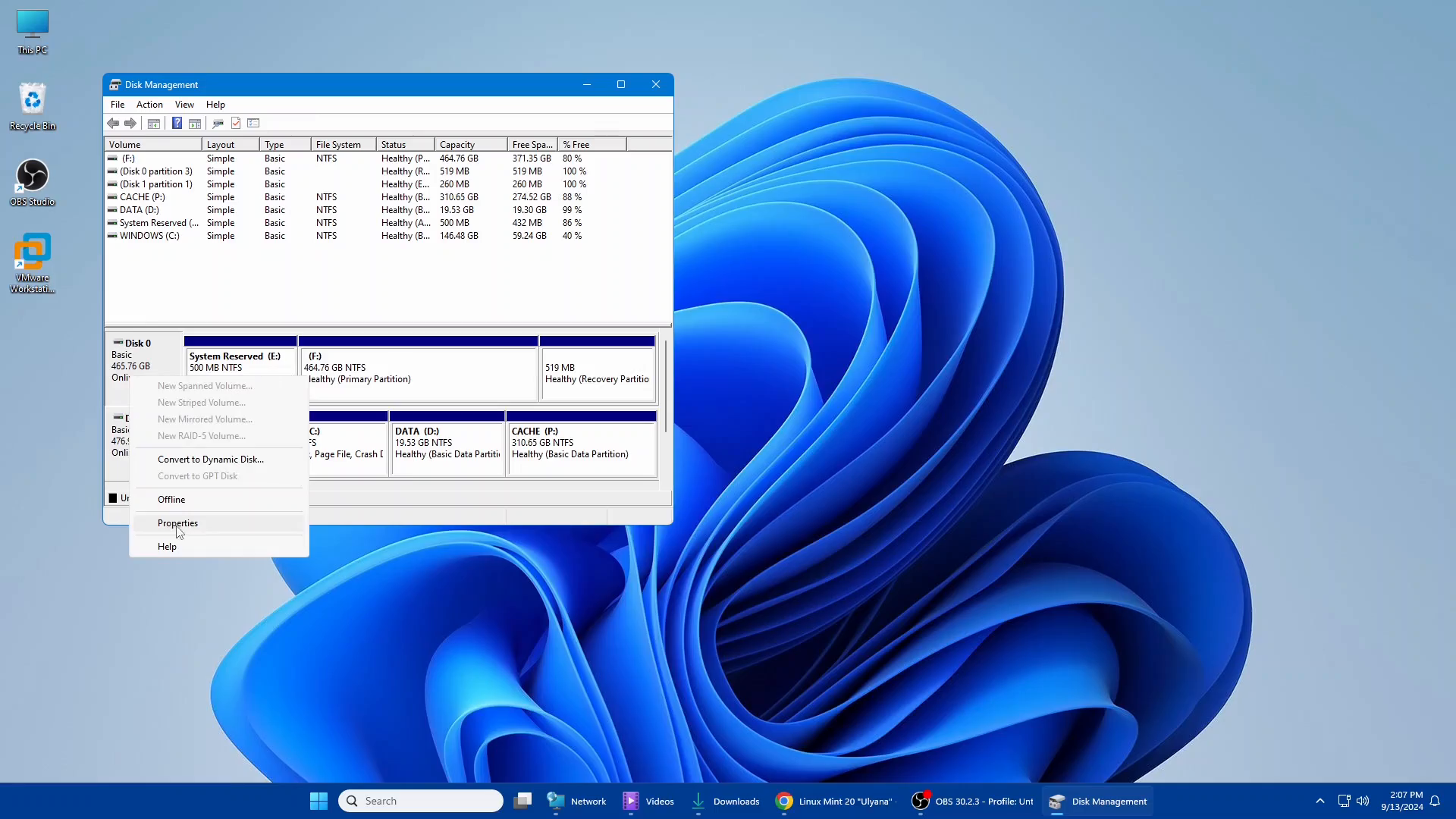
As we can see below Disk 0 is a WDC drive ( Western Digital ), if we know there's no other Western Digital drive and this is the one we want to install our OS to, choose this drive.
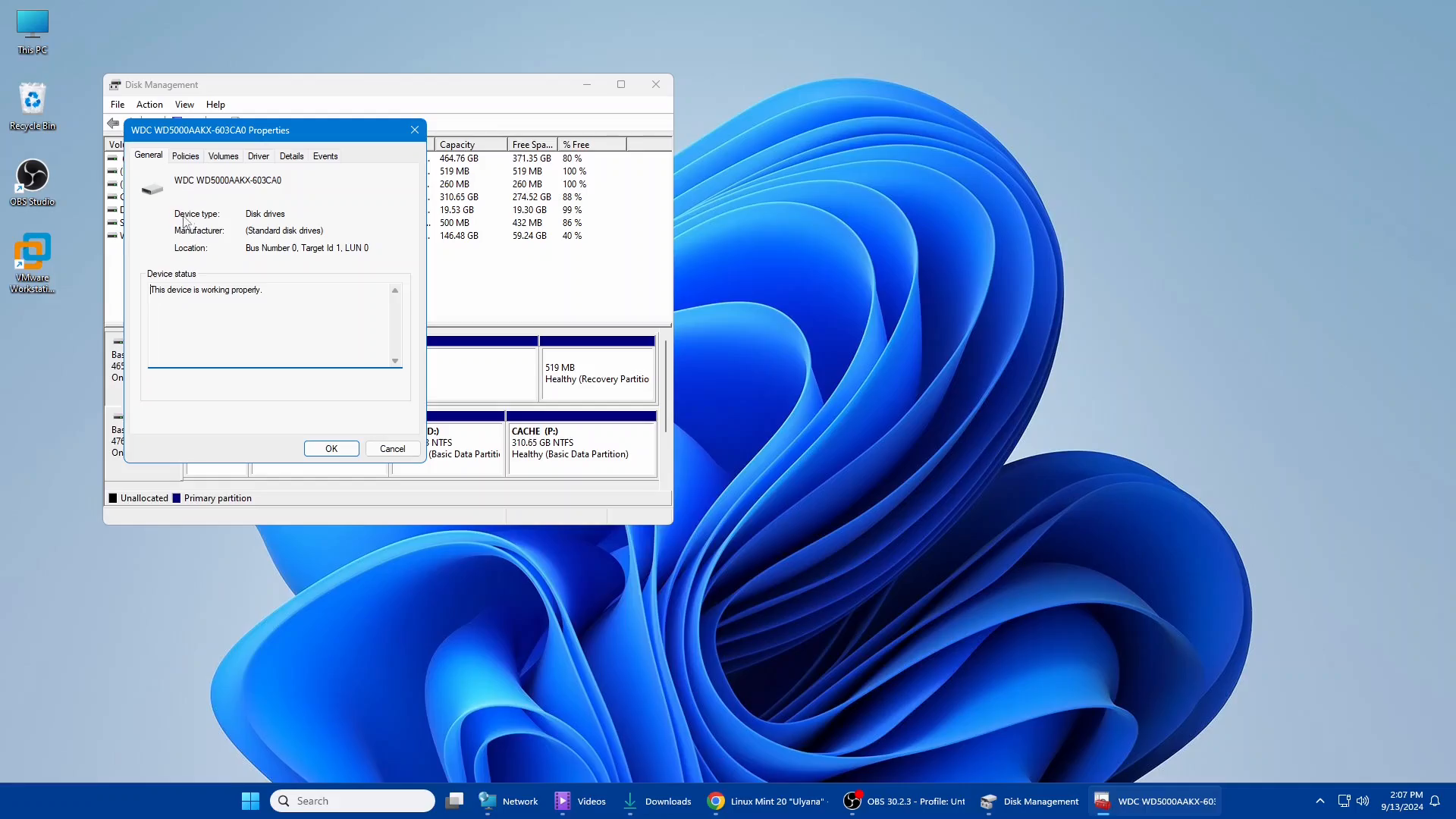
Step 2 - Create a new VM in VMWare Workstation
Open VMWare Workstation as "Administrator" and click "File -> New Virtual Machine" to create a new VM.
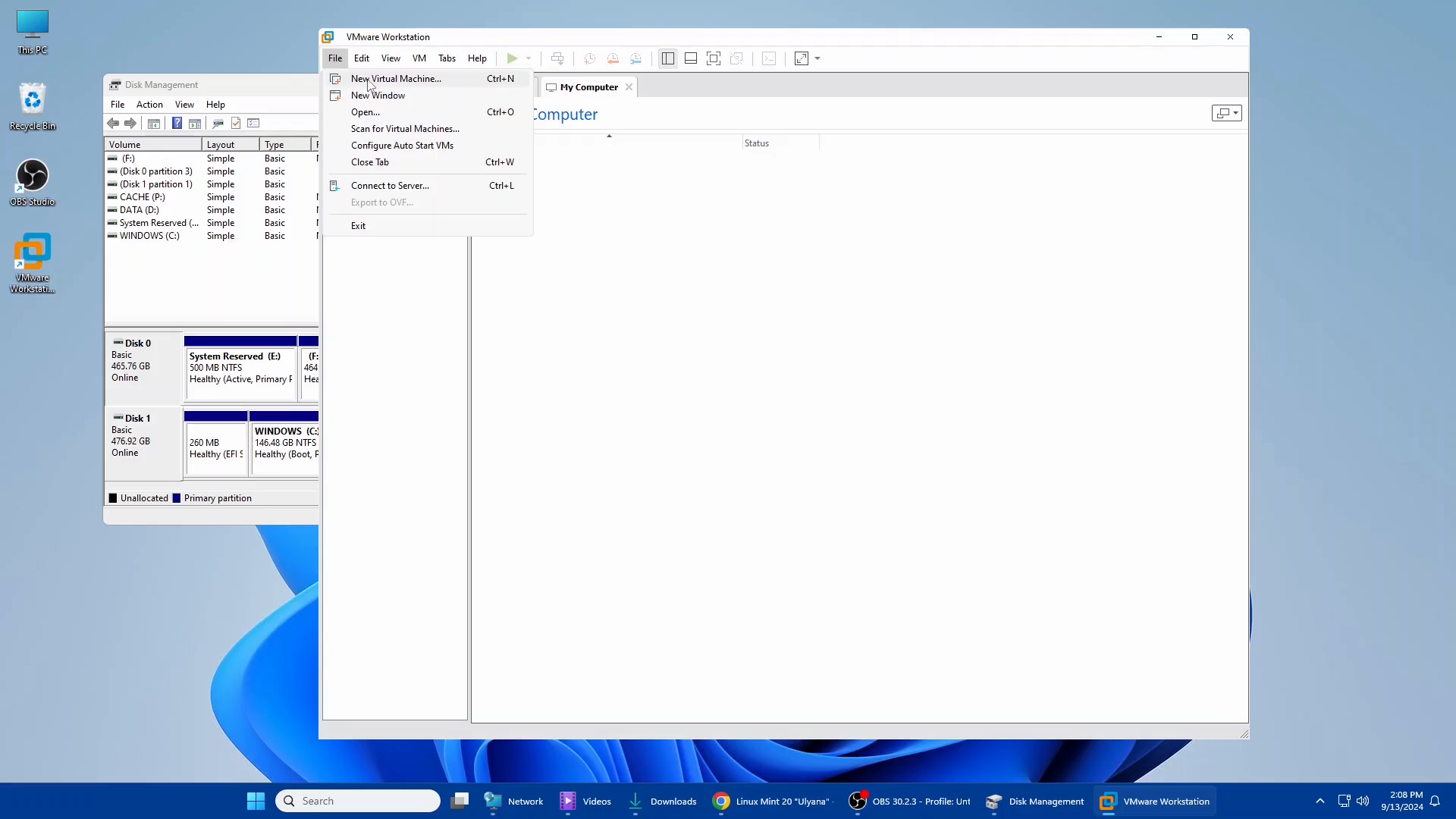
Step 3 - Create VM as "Custom (advanced)"
This just has the advantage of allowing us to have the Physical Drive attached initially as the only drive in VMWare rather than going back and modifying the storage settings/HDDs later on.
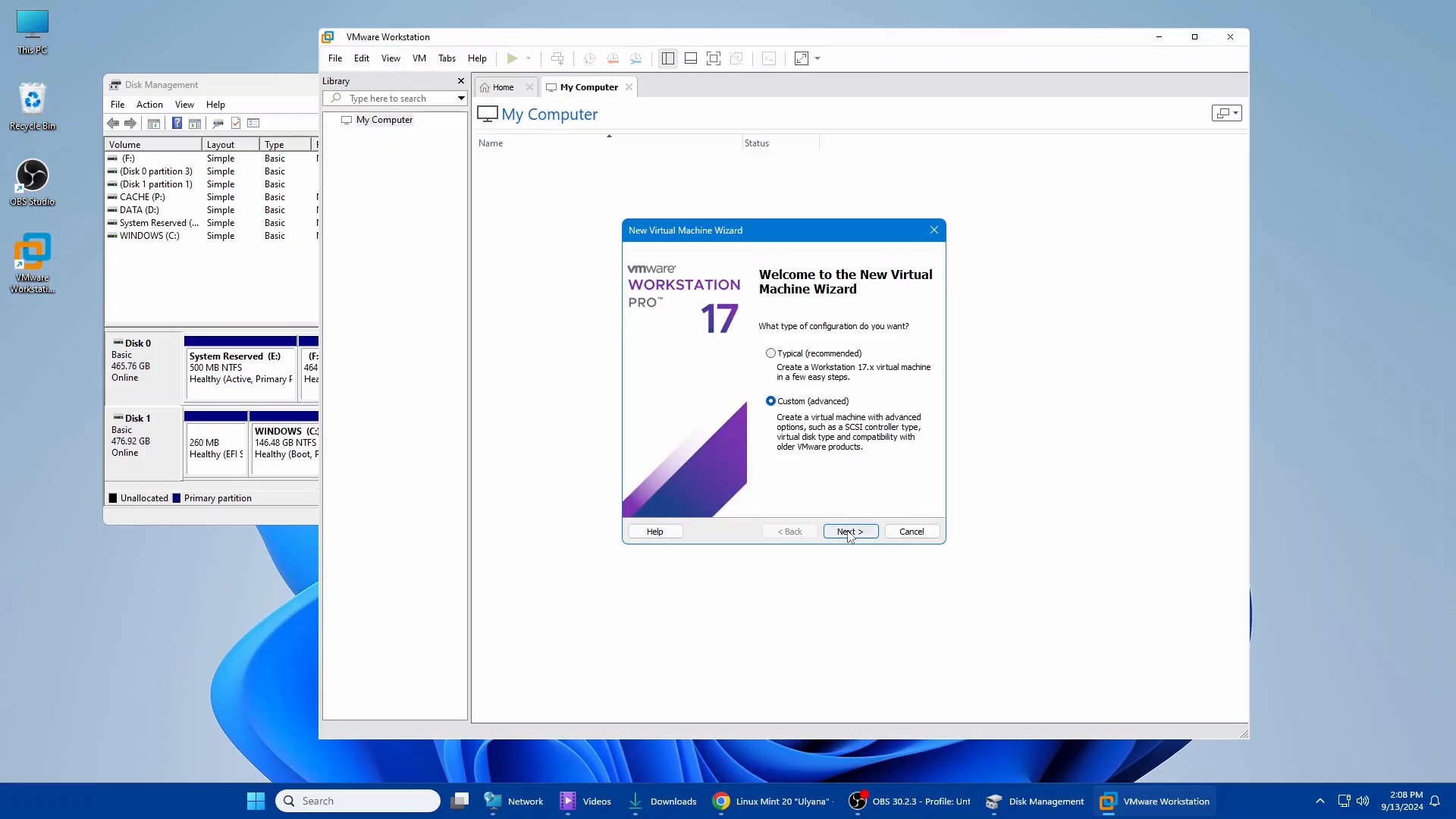
Step 4 - Choose the OS
In our example we are installing Ubuntu 64 bit, it's important to choose the correct OS type and even more important to choose the right architecture (eg 64 bit). This becomes more apparent later on if the intended computer you want to boot your installed OS on uses EFI (EFI mode can only be enabled easily when there is the 64-bit architecture selected).
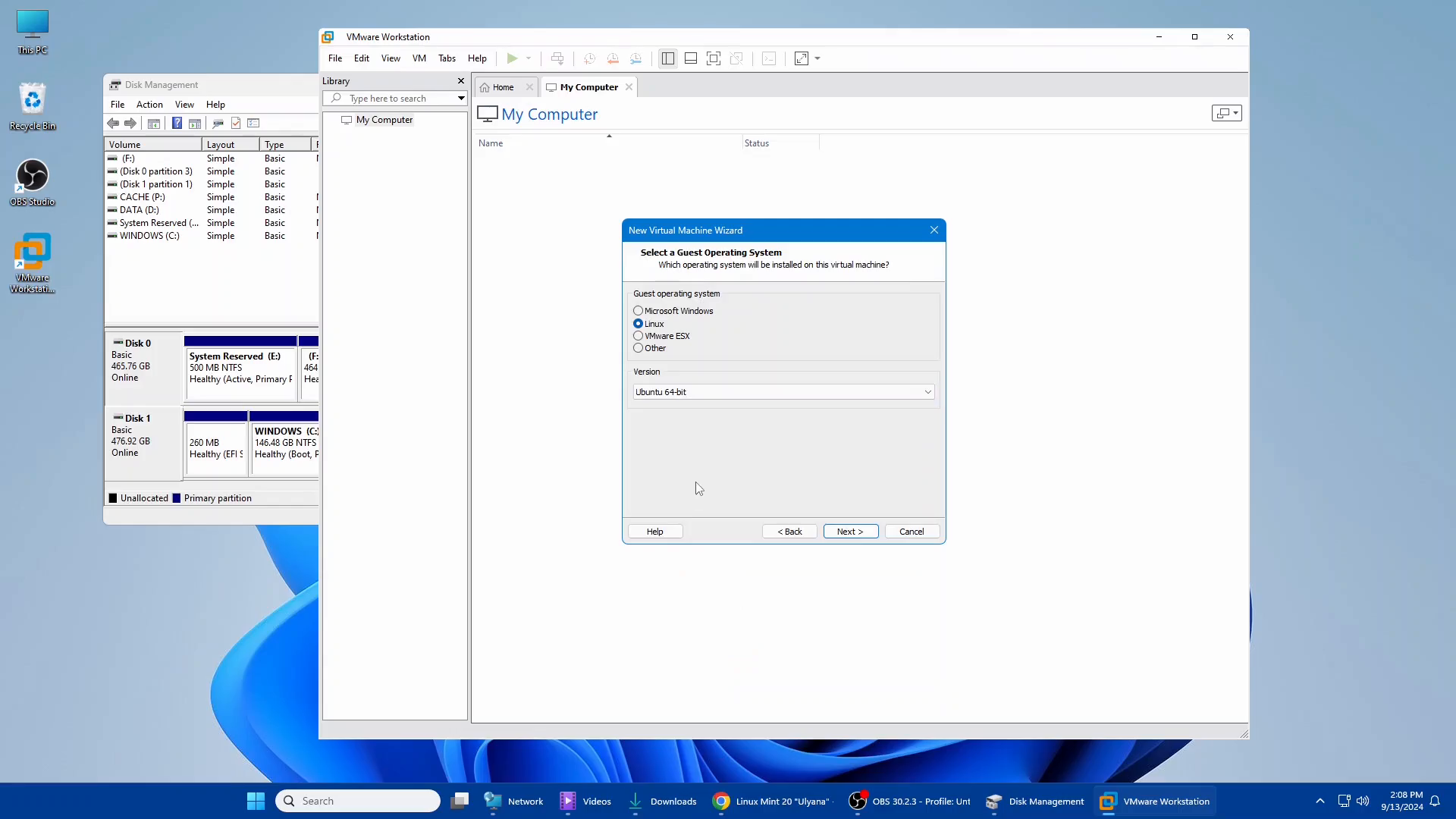
Step 5 - Choose Your Physical Disk
This part is crucial and critical, if you mess this up you could delete your crypto keys or family photos by accident! If possible make sure all other drives/storage devices are disconnected or disabled by this time.
- Click "Use physical disk (for advanced users)" and then we'll select the physical drive#
- Remember that the drive number corresponds to the drive we identify in Disk Management (in our case we want to install to Drive 0 which we showed earlier is our WDC drive).
Make sure that you make proper note of the physical drive so you don't wipe the wrong drive and lose data!
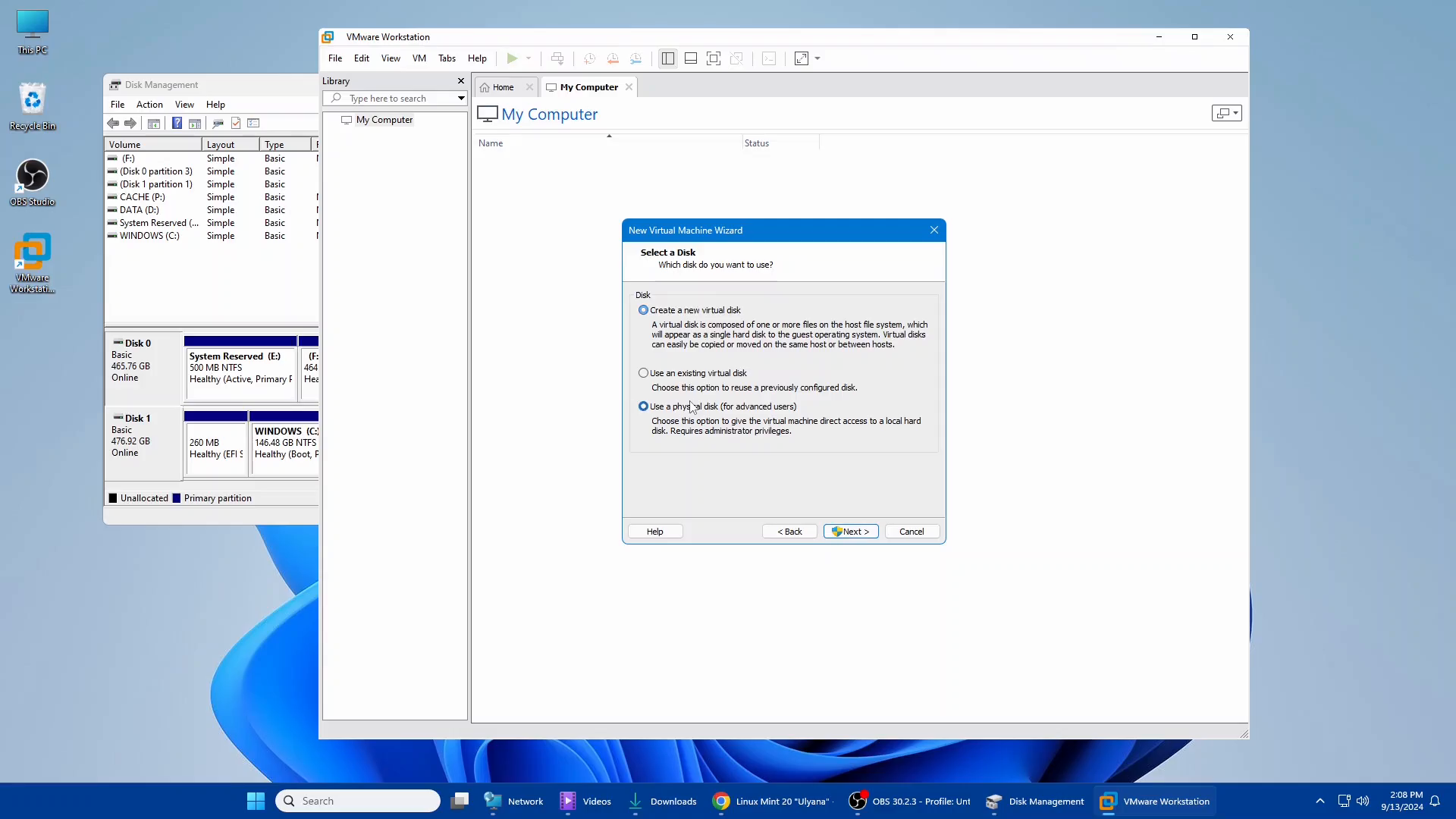
Once again we choose PhysicalDrive0 because it corresponds to the identified "Disk 0" in Disk Management. You need to verify your physical drive number or you may wipe your data on an unintended drive.
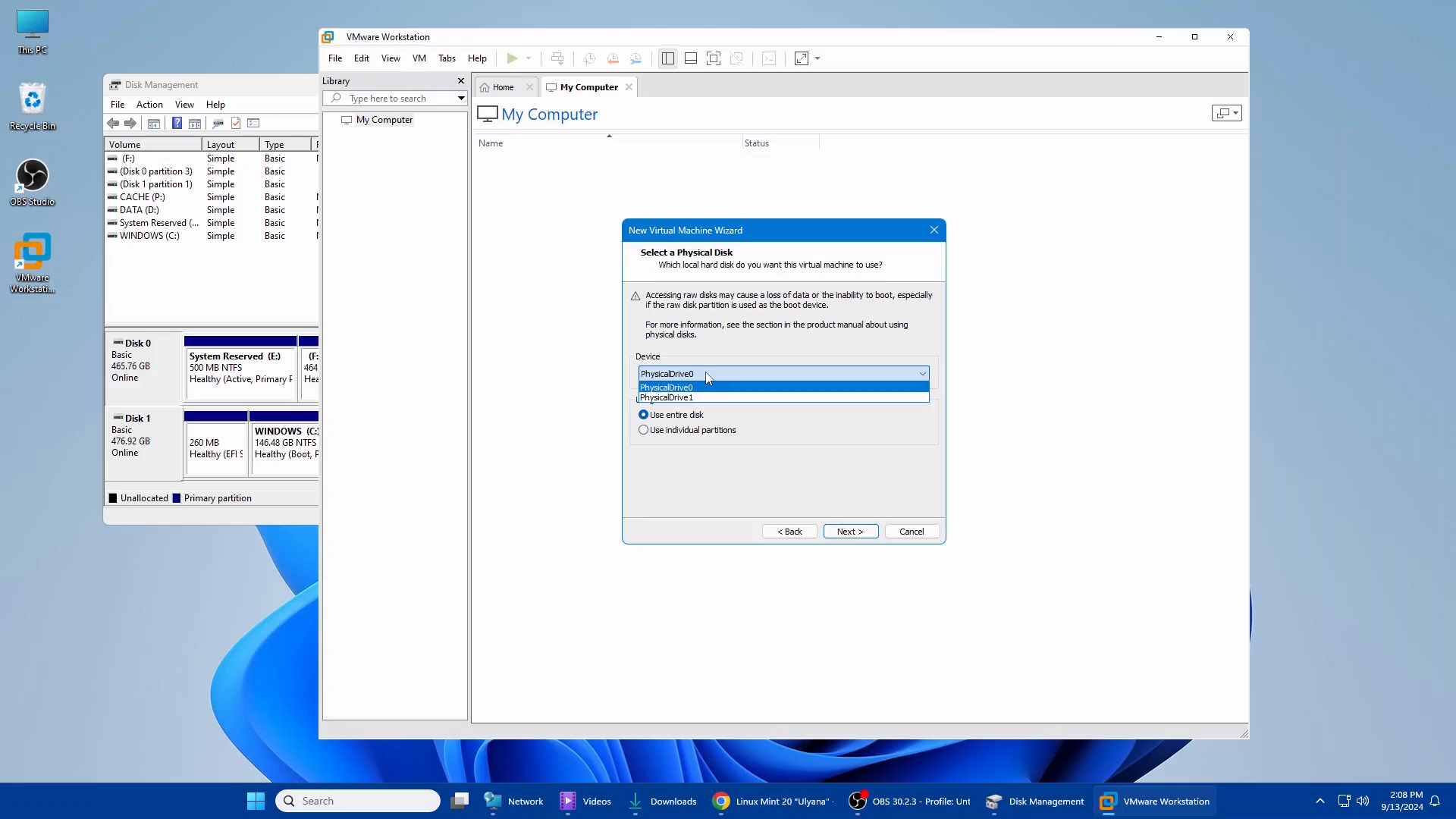
After this point all the defaults are normally fine (continue to click next through the menu to create the VM).
Step 6 - Set EFI boot mode if you need
If your target device will be booting by EFI you need to edit your VM by going to Settings and then "Options" and "Advanced" and choose UEFI as the boot mode. This is not necessary if you will be booting by MBR (however many newer systems will only boot EFI)
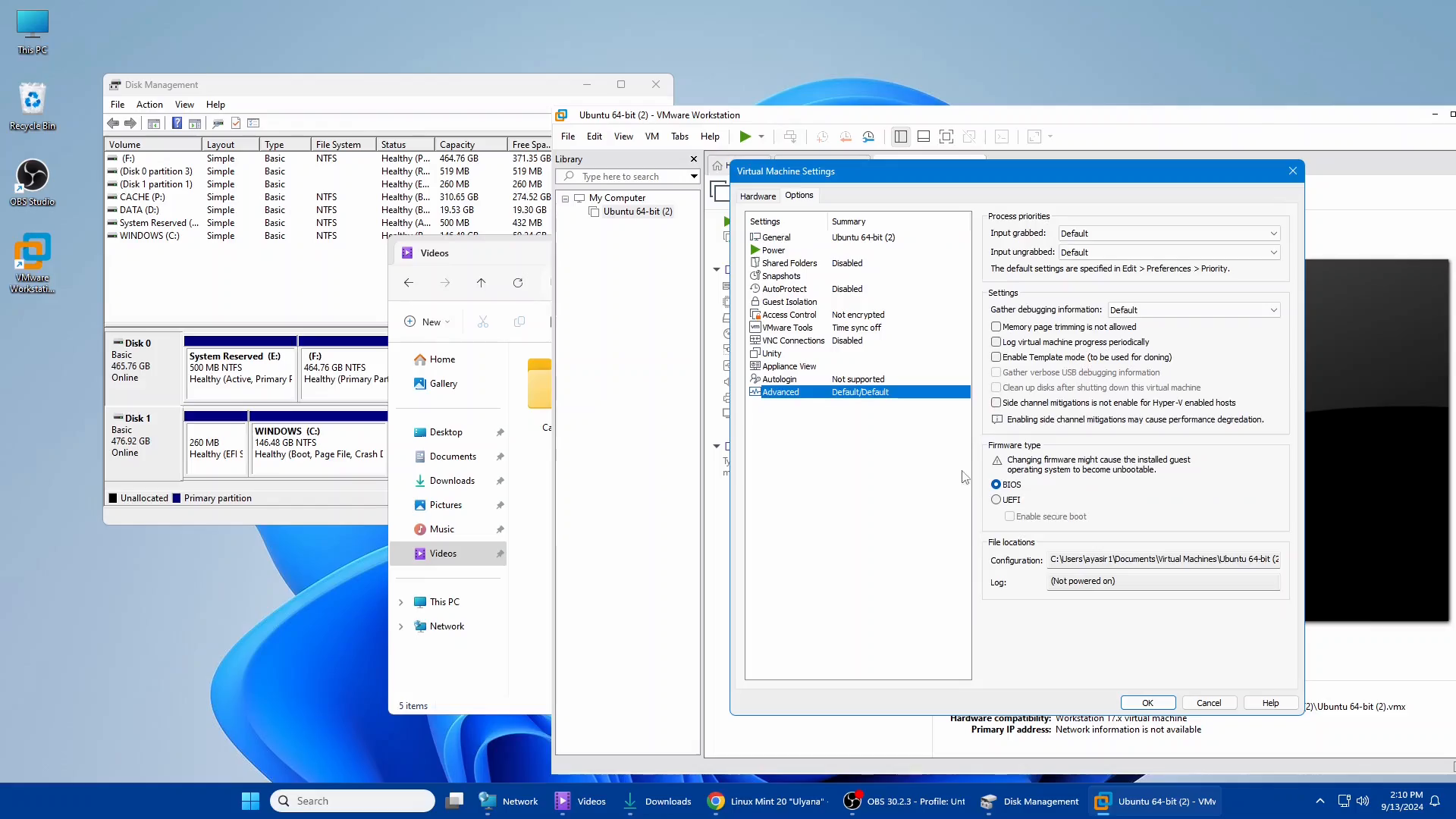
Step 7 - Boot your .iso and install to your physical drive.
Install your OS like it's a normal physical machine, once the install is completed, power off the VM and you can now boot the drive you installed to on the same or other computer.
CDN Cloudflare how to set and preserve the real IP of the client without modifying application code on Apache
Your frontend CDN (eg. Cloudflare or even your own load balancer/proxy) must be sending the X-Forwarded-For and you must be running Apache on the backend.
This solves the problem where your logs and services will only see the proxy/CDN IP and not the real client IP.
mod_rpaf will fix all of this
This solution transparently sets the real IP of the client for Apache and any services that rely on the REMOTE_ADDR without having to modify any code.
Install the right tools:
#install the devel tools and gcc for your distro and git
yum -y install httpd-devel gcc git
Get the mod_rpaf source code
#let's git the mod_rpaf module (most distros don't have this as a package installable module) so we have to build it ourselves
cd ~
git clone https://github.com/gnif/mod_rpaf.git
cd mod_rpaf
Compile mod_rpaf
#let's compile and install the mod_rpaf.c code
apxs -i -c -n rpaf mod_rpaf.c
Edit httpd.conf
#edit the httpd.conf for Apache to enable mod_rpaf, be sure to set the RPAF_ProxyIPs to whatever IPs your CDN/proxy uses otherwise the original CDN IP will still be presented to Apache
Edit the two example of IPs below to be your CDN/Proxy/LoadBalancer IPs (if you only have 1 IP then only put 1 there).
LoadModule rpaf_module modules/mod_rpaf.so
RPAF_Enable On
RPAF_Header X-Forwarded-For
RPAF_ProxyIPs 1.2.3.4 5.6.7.8
RPAF_SetHostName On
RPAF_SetHTTPS On
RPAF_SetPort On
#remember to restart httpd/apache
systemctl restart httpd
#now remove gcc and httpd-devel and git for security reasons
yum -y remove gcc httpd-devel git
CentOS 7 fix Could not retrieve mirrorlist http://mirrorlist.centos.org/?release=7&arch=x86_64&repo=os&infra=container error was 14: curl#6 -
yum update
Loaded plugins: fastestmirror, ovl
Determining fastest mirrors
Could not retrieve mirrorlist http://mirrorlist.centos.org/?release=7&arch=x86_64&repo=os&infra=container error was
14: curl#6 - "Could not resolve host: mirrorlist.centos.org; Unknown error"
One of the configured repositories failed (Unknown),
and yum doesn't have enough cached data to continue. At this point the only
safe thing yum can do is fail. There are a few ways to work "fix" this:
1. Contact the upstream for the repository and get them to fix the problem.
2. Reconfigure the baseurl/etc. for the repository, to point to a working
upstream. This is most often useful if you are using a newer
distribution release than is supported by the repository (and the
packages for the previous distribution release still work).
3. Run the command with the repository temporarily disabled
yum --disablerepo=
4. Disable the repository permanently, so yum won't use it by default. Yum
will then just ignore the repository until you permanently enable it
again or use --enablerepo for temporary usage:
yum-config-manager --disable
or
subscription-manager repos --disable=
5. Configure the failing repository to be skipped, if it is unavailable.
Note that yum will try to contact the repo. when it runs most commands,
so will have to try and fail each time (and thus. yum will be be much
slower). If it is a very temporary problem though, this is often a nice
compromise:
yum-config-manager --save --setopt=
Cannot find a valid baseurl for repo: base/7/x86_64
The issue is that CentOS 7 went EOL in June 2024, but you can still access the packages in the CentOS vault for the last 7.9.2009 release for testing purposes or to create an environment to update to AlmaLinux or another newer distro.
[base]
name=CentOS-$releasever - Base
baseurl=http://vault.centos.org/7.9.2009/os/$basearch/
gpgcheck=1
gpgkey=file:///etc/pki/rpm-gpg/RPM-GPG-KEY-CentOS-7
[updates]
name=CentOS-$releasever - Updates
baseurl=http://vault.centos.org/7.9.2009/updates/$basearch/
gpgcheck=1
gpgkey=file:///etc/pki/rpm-gpg/RPM-GPG-KEY-CentOS-7
[extras]
name=CentOS-$releasever - Extras
baseurl=http://vault.centos.org/7.9.2009/extras/$basearch/
gpgcheck=1
gpgkey=file:///etc/pki/rpm-gpg/RPM-GPG-KEY-CentOS-7
[centosplus]
name=CentOS-$releasever - Plus
baseurl=http://vault.centos.org/7.9.2009/centosplus/$basearch/
gpgcheck=1
enabled=0
gpgkey=file:///etc/pki/rpm-gpg/RPM-GPG-KEY-CentOS-7
Solution for the SCLo repo
yum install centos-release-scl
/etc/yum.repos.d/CentOS-SCLo-scl.repo
[centos-sclo-sclo]
name=CentOS-7 - SCLo sclo
baseurl=http://vault.centos.org/7.9.2009/sclo/$basearch/sclo/
gpgcheck=1
enabled=1
gpgkey=file:///etc/pki/rpm-gpg/RPM-GPG-KEY-CentOS-7
[centos-sclo-sclo-source]
name=CentOS-7 - SCLo sclo Source
baseurl=http://vault.centos.org/7.9.2009/sclo/Source/sclo/
gpgcheck=1
enabled=0
gpgkey=file:///etc/pki/rpm-gpg/RPM-GPG-KEY-CentOS-7
/etc/yum.repos.d/CentOS-SCLo-scl
[centos-sclo-rh]
name=CentOS-7 - SCLo rh
baseurl=http://vault.centos.org/7.9.2009/sclo/$basearch/rh/
gpgcheck=1
enabled=1
gpgkey=file:///etc/pki/rpm-gpg/RPM-GPG-KEY-CentOS-7
[centos-sclo-rh-source]
name=CentOS-7 - SCLo rh Source
baseurl=http://vault.centos.org/7.9.2009/sclo/Source/rh/
gpgcheck=1
enabled=0
gpgkey=file:///etc/pki/rpm-gpg/RPM-GPG-KEY-CentOS-7
Ubuntu Debian How To Install Recommended Packages Automatically
A lot of times you may see when installing packages that apt will recommend packages, a lot of times when doing things like upgrading or install a new kernel, it is very smart at recommending related packages (eg. modules, headers, extras etc..)

All you need to do is add this flag to your "apt install" command:
--install-suggests
As you can see below, when we add this flag, it then installs all of the "Suggested packages" from above:
sudo apt install --install-suggests linux-image-5.15.0-119-generic
Reading package lists... Done
Building dependency tree
Reading state information... Done
The following packages were automatically installed and are no longer required:
linux-objects-nvidia-510-4.15.0-188-generic linux-signatures-nvidia-4.15.0-188-generic
Use 'sudo apt autoremove' to remove them.
The following additional packages will be installed:
fdutils linux-doc linux-headers-5.15.0-119-generic linux-hwe-5.15-headers-5.15.0-119 linux-modules-5.15.0-119-generic linux-modules-extra-5.15.0-119-generic
Suggested packages:
linux-hwe-5.15-tools
The following NEW packages will be installed:
fdutils linux-doc linux-headers-5.15.0-119-generic linux-hwe-5.15-headers-5.15.0-119 linux-image-5.15.0-119-generic linux-modules-5.15.0-119-generic linux-modules-extra-5.15.0-119-generic
How to set Linux Ubuntu Redhat Debian Command Line http https socks proxy for yum apt
Just export these variables:
export http_proxy="socks5://127.0.0.1:1234"
export https_proxy="socks5://127.0.0.1:1234"
The above example uses a socks 5 proxy at localhost and port 1234.
This is a great way to improve performance of some activities for things like package installation, especially if your routing is not ideal to the repos.
How to resize a pdf without losing much quality in Linux Mint Ubuntu Debian Redhat Solution
Do you have a PDF that was too large after merging using convert / ImageMagick?
Use gs or ghostscript as below, specify the output file and also the input file.
In the example below the output file is "outputfile-resized.pdf" and the input file is "original-pdf.pdf". Change the input file to the name of your pdf
gs -sDEVICE=pdfwrite -dCompatibilityLevel=1.4 -dPDFSETTINGS=/prepress -dNOPAUSE -dQUIET -dBATCH -sOutputFile=outputfile-resized.pdf original-pdf.pdf
For example the above method took a pdf from 12MB to about 500KB with no noticeable quality loss.
qemu: could not load PC BIOS 'bios-256k.bin' solution
qemu: could not load PC BIOS 'bios-256k.bin'
The file exists here:
/usr/share/qemu/bios-256k.bin
It is symlinked to here:
/usr/share/seabios/bios.bin
A quick fix is manually specifying the BIOS:
-bios /usr/share/qemu/bios-256k.bin
Proxmox How To Custom Partition During Install
If you just have 1 disk per node/testing/POC then you can reduce the overall disk usage during install as below:
1.) Click on "Options" on the HDD that you want to install to.
.png)
2.) Under "hdsize" Set the Maximum Size smaller than the disk size.
In this example the disk is 60G and I set max size as 20G. This then leaves 40G remaining of unpartitioned space that you could later use for other things like Ceph, DRBD etc...
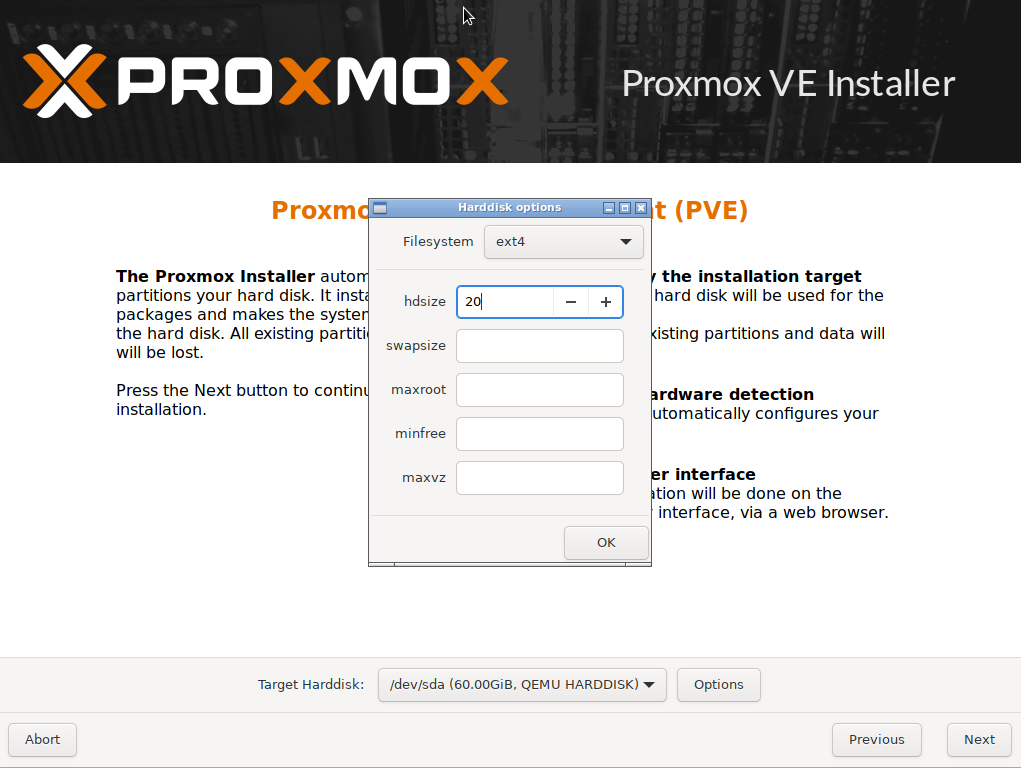
Hyper-V Linux VM Boots to Black Screen, Storage, NIC Not Found Issues
Hyper-V uses obscure virtual hardware, you can enable the FB device for Hyper-V but if you just need text/console to work just compile this option:
Device Drivers --->
Graphics support --->
<*> Framebuffer Devices --->
<*> Simple framebuffer support
Ubuntu Mint How to Fix Missing/Broken /dev and /dev/pts which causes terminal to immediately close exit and not work
If you have ever seen a system where terminal in the GUI closes instantly and/or you cannot SSH to the server/machine.
mount -t devtmpfs none /dev
mount -t devpts none /dev/pts
How high can a Xeon CPU get?
As a fun test in an old/unloved dual CPU Xeon system, I removed the fan for the heatsink and after 1.5 hours, the system was completely stable and had surprisingly not crashed, despite exceeding or hitting the critical thermal levels
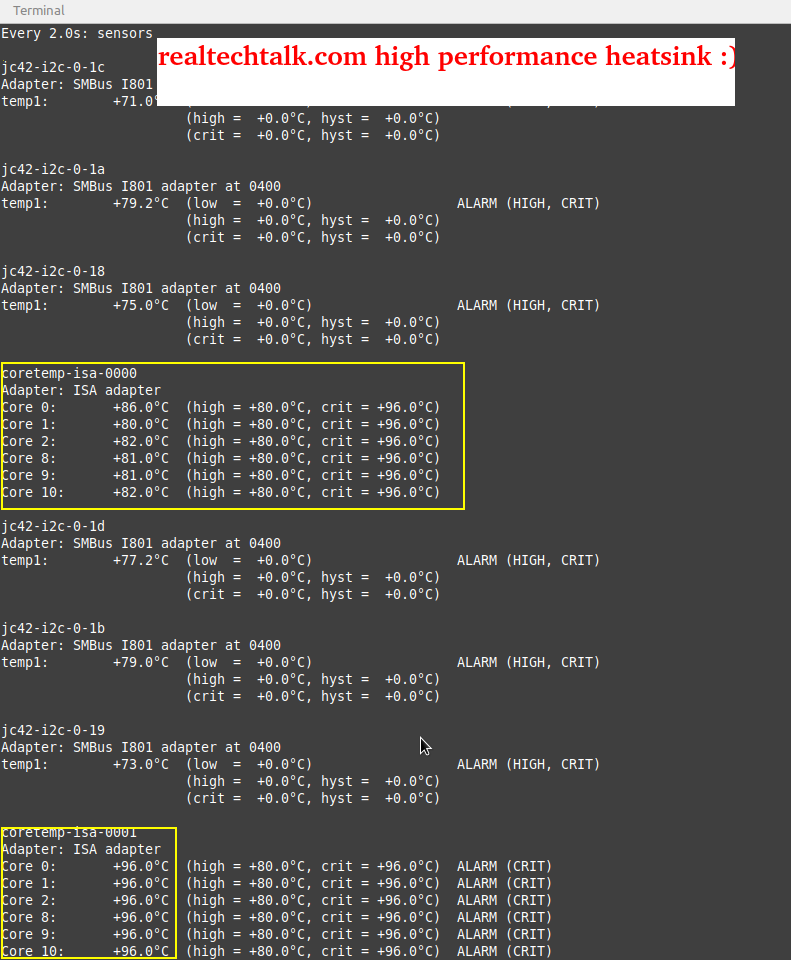
bash fix PATH environment variable "command not found" solution
If you are sure the binary/program exists, it could be that your PATH variable is broken or not set.
Just do this to set most of the common paths:
export PATH=$PATH:/usr/local/sbin:/usr/local/bin:/usr/sbin:/usr/bin:/sbin:/bin
There's no risk to the above, because it just takes your current PATH variable and adds more to what is already existing.
To make this permanent you can add this to your ~/.bashrc file
Ubuntu Linux Mint Debian Redhat Youtube Cannot Play HD or 4K videos, dropped frames or high CPU usage with Nvidia or AMD Driver
In a lot of distros, vdpau which accelerates video through the GPU is often not installed even in recent distros. This will result in Firefox with Youtube dropping frames when you check the "Stats for Nerds" and to the eye as jerky or slower video playback due to the dropped frames.
Some sites will say that because you are watching VP09 that there is no GPU support, but with vdpau installed and enabled, many GPUs will still be able to use hardware decoding for 4K Youtube videos. Information on this is spotty but you can clearly see the GPU utilization going up when watching Youtube GPUs, so the GPU is doing something to decode the video.
This will make you think that your GPU is not capable of playing even 1080P sometimes or 4K even though it is, as in many cases it is your CPU doing the video decoding and a lot of times some CPUs cannot reliably or consistently support 4K decoding in Youtube.
The easiest solution is to install vdpau and restart your browser:
sudo apt install vdpau-driver-all
I was surprised that this helped even on even much older cards including older Nvidia GPUs.
After doing the above and restarting Firefox, the stats for nerds showed 0 dropped frames when watching 4K, compared to some dropped frames at 1080P and many dropped at 4K before enabling vdpau.
.png)
One caveat that it may be that your video card is still too slow and may not be able to support decoding Youtube in fullscreen at certain resolutions. You may see the above but then on a weaker GPU, may find that it does drop frames when running fullscreen.
Sometimes frames will only drop when having the Stats for nerds on top, or the progress bar open.
In general VP09 full support and decoding is not guaranteed to work well or at all, and unfortunately Youtube has not stuck to normal standards that most GPUs support like H265 or H264, XVID, DIVX etc...
Related Links:
https://support.mozilla.org/en-US/kb/firefox-4k-ultra-high-definition-youtube-videos
https://www.reddit.com/r/linuxquestions/comments/ugp19e/help_playing_back_4k60fps_youtube_on_linux/
hostapd example configuration for high speed AC on 5GHz using WPA2
This example is using RTL8821AU chipset from a TP-Link T2U Plus USB adapter and other similar ones should work the same.
Here's how to get this chipset RTL8821AU working in Linux.
Here's how to get RTL8812 and RTL8822 working in Linux.
With these settings I can get very good speeds of 300+ mbit per second and for some reason the upload speed is faster than download.
Change wlan0 if your adapter has a different device name and make sure you set your WPA passphrase or change it.
interface=wlan0
# "a" simply means 5GHz
#driver=cfg80211
hw_mode=a
# the channel to use, 0 means the AP will search for the channel with the least interferences (ACS)
channel=36
#ieee80211d=1
country_code=US
ieee80211n=1
ht_capab=[HT40+][HT40-][SHORT-GI-20][SHORT-GI-40][MAX-AMSDU-7935]
#the below doesn't work hostapd wouldn't start
#ht_capab=[HT40+][HT40-][SHORT-GI-20][SHORT-GI-40][RX-STBC1][MAX-AMSDU-7935]
# 802.11ac support
ieee80211ac=1
wmm_enabled=1
#vht_capab=[MAX-MPDU-11454][SHORT-GI-80][HTC-VHT]
vht_capab=[MAX-MPDU-11454][SHORT-GI-80][RX-STBC-1][HTC-VHT][MAX-A-MPDU-LEN-EXP7]
#optimize?
beacon_int=100
dtim_period=2
max_num_sta=32
macaddr_acl=0
rts_threshold=2347
fragm_threshold=2346
#end optimize
ssid=rttWirelessInternet
auth_algs=1
wpa=2
wpa_key_mgmt=WPA-PSK
rsn_pairwise=CCMP
wpa_passphrase=YOURWirelessInSecurePasswordHere
hostapd how to enable and use WPS to connect wireless devices like printers
Edit your /etc/hostapd/hostapd.conf file like below and restart hostapd.
#WPS stuff
# Enable control interface for PBC/PIN entry
wpa_psk_file=/etc/hostapd/hostapd.psk
ctrl_interface=/var/run/hostapd
eap_server=1
wps_state=2
ap_setup_locked=1
wps_pin_requests=/var/run/hostapd.pin-req
config_methods=label display push_button keypad
#WPS model info stuff change to suit your needs
device_name=Your Device Name
manufacturer=Company
model_name=Model
model_number=ModelNum
Create the .psk file from above
touch /etc/hostapd/hostapd.psk
Restart hostapd
systemctl restart hostapd
Here's how to push the non-existent button on your router for WPS
hostapd_cli wps_pbc
Then you should get this and your device should be able to connect now.
Once you see the below, the device has 2 minutes to connect.
Selected interface 'wlan0'
OK
Dell Server Workstation iDRAC Dead after Firmware Update Solution R720, R320, R730
This is certainly a poor design, as you can read many seasoned admins who have updated their iDRAC only to have it killed. One possible cause is not by doing all the incremental updates, doing updates from an old iDRAC to one many revisions newer is a sure way to kill things, but even then there is no guarantee based on the amount of failures.
List of threads of people's dead iDRAC's:
https://www.reddit.com/r/homelab/comments/a49b4y/r720_idrac_help/?rdt=40792
https://www.reddit.com/r/homelab/comments/960wx8/dell_r720_idrac_recovery/
https://community.spiceworks.com/t/alert-idrac-not-responding-rebooting/776991
The first solution is don't mass update, as we've seen entire datacenters or racks full of Dell machines with dead iDRAC due to mass update attempts. It is likely not practical to do this fix on a wide scale unless you can migrate the applications to another facility or rack as this requires the servers to be pulled off the rack or at least pulled by the rails and to open the case of course.
Try This First (only if you have lights on the iDRAC):
This solution is for if your iDRAC is totally dead, no flashing lights, dead NIC etc...
You will first need a USB to TTL adapter like this Amazon affil link.
Another successful recovery: http://blog.ignoranthack.me/?p=86
You will see Dell themselves advising to replace the motherboard, but in many cases by connecting to the UART below with a USB to TTL cable, you can tell the iDRAC to reflash from the SDCARD image.
Based off this example of a Dell R720, we can see the UART pins which are labelled by this github user.
This area is at the back right of the server (if looking from the server from the front) and will require you to remove the riser cage to access this area.
Step 1.) Connect to USB to TTL adapter.
Be sure to use the correct pins below (remember the TX side of the TTL goes to the RX side of the UART and the the RX side of the TTL goes to the TX side of the UART). If in doubt, use a multimeter to make sure you aren't connecting to the wrong pins/getting voltage where you shouldn't be.
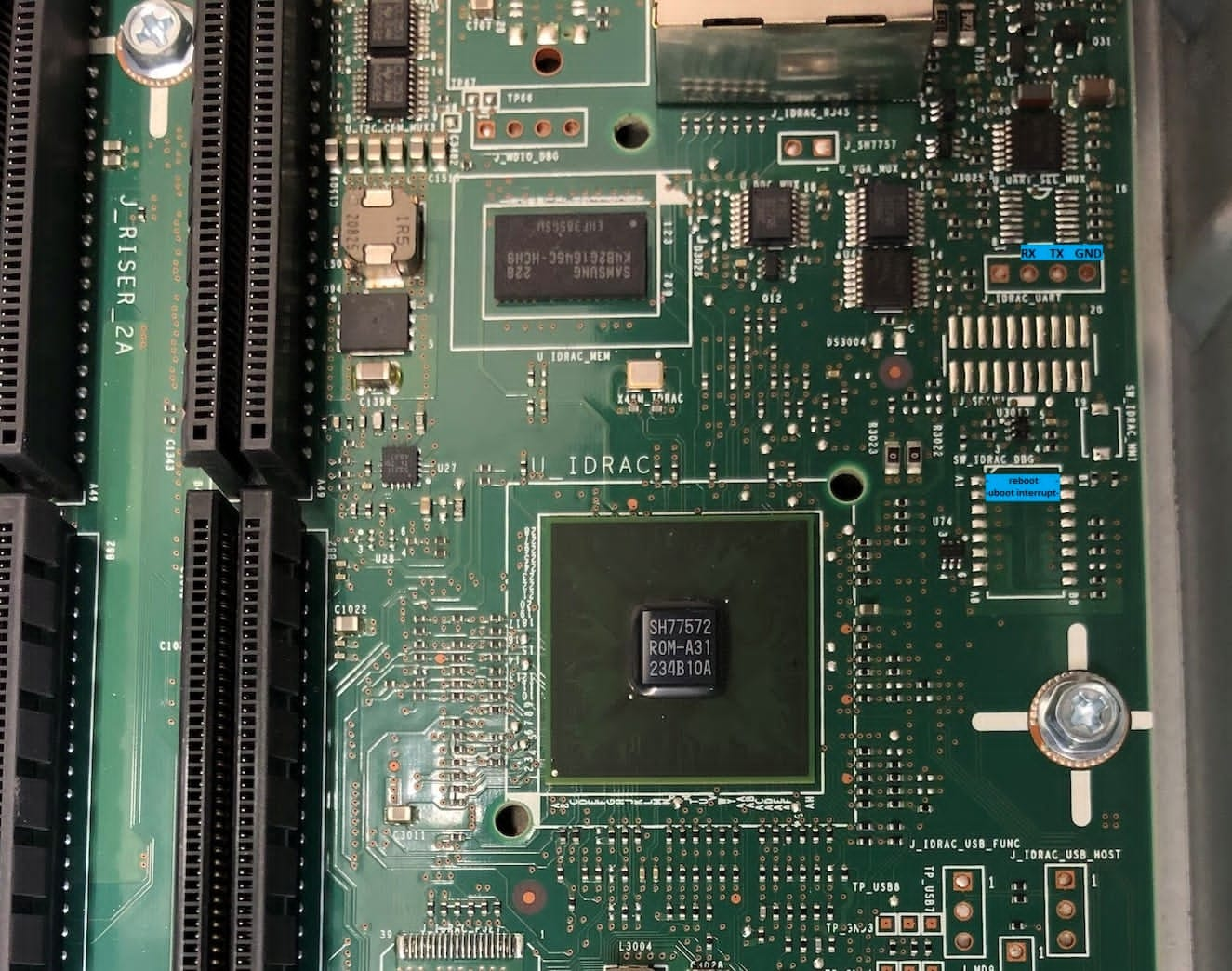
Note About Format of SD Card
I have seen this occur on some servers, I am not sure how it was done like this but the SD Card came formatted as the root drive, without any partition. It seems that U-Boot recovery DOES NOT like this, or the fact that it is a 16GB Card even though it is from Dell.
UTIL RECOVER:Transport:sd TargetMMC:EMMC File:firmimg.d7
UTIL RECOVER:ERROR:Could not locate 'firmimg.d7' in FAT or EXT2 file system.
If you get the errors above and you are sure the file exists, then it is worth doing the following.
1.) Backup all files from the SD Card.
2.) Completely wipe the card.
3.) Format a single partition as 2GB as ext2 (ext2 not ext3 or ext4 or it won't work as the environment does not have the kernel modules to load anything but FAT and EXT2).
Step 2.) Recover
Sometimes you may need to go through 2 rounds of bootup procedure by hitting all the annoying keys to get the server booted normally for this to work.
Connect using minicom or screen and run these commands:
screen /dev/ttyUSB0 115200
The connection speed is crucial, otherwise you will see nothing or garbage characters.
If all goes well you should see like below.
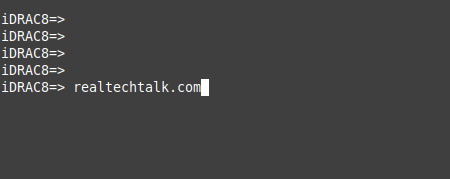
Make sure you have the file firmimg.d7 or whatever the name one is from the iDRAC firmware on the SD card that inserts at the front of the server.
util recover -emmc -from sd -f firmimg.d7 -noreset -clear
Some versions will not have this -from_sd option
iDRAC8=> util recover -emmc -from_sd -f firmimg.d6 -noreset -clear
util recover:mcgetopt:ERROR: option "-from_sd" was not found.
Then once the above completes do this:
util reset
Short iDRAC DBG interrupt/reboot pins
If you see a shell prompt like below (SH7757), you will need to short the DBG pins in the image from earlier.
Use a paper clip to short the two pins shown above as the interrupt/reboot pins in the diagram above.
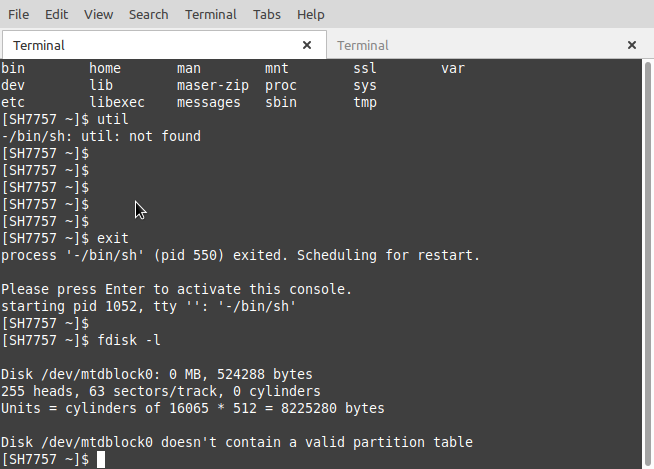
After shorting you should see U-Boot again:
U-Boot 2009.08 (Mar 10 2012 - 02:52:09) Avocent (0.0.3) EVB, Build: jenkins-12G_iDRAC_Releases-402
CPU: SH-4A
BOARD: R0P7757LC00xxRL (C0 step) board
BOOT: Secure, HRK generated
DRAM: 240MB
(240MB of 256MB total DRAM is available on U-Boot)
ENV: Using primary env area.
In: serial
Out: serial
Err: serial
PCIe: Bridge loaded with 0x18000 bytes
WDT2: Booted Lower Vector, 'uboot1'
sh_mmcif: 0, sh-sdhi: 1
Net: sh_eth.0, sh_g_eth.0
INFO: 00:002 Start-up -to- util_idrac_main()
INFO: 00:004 U-Boot 2009.08 (Mar 10 2012 - 02:52:09) Avocent (0.0.3) EVB
INFO: 00:007 U-Boot checkin date(03-02-2012) Version(1.0.175)
INFO: 00:006 iDRAC PPID <NULL>
INFO: 00:003 SPI NOR init 4096 KiB N25Q032 bus=0 cs=0, speed=1000000, mode=3
INFO: 00:007 SH-4A Product: Major Ver=0x31 Minor Ver=0x13 C3 Little endian
Family=0x10 Major Ver=0x30 Minor Ver=0x0b
PASS: 00:016 Dedicated monolithic mgmt NIC disabled
INFO: 00:128 BCM54610 OUI=0x3fffff Model=0x3f Revision=0x0f PhyAddr=1
INFO: 00:362 SD CARD: Device: sh-sdhi Manufacturer ID: 41 OEM: 3432
Name: DELL1 Tran Speed: 25000000 Rd Block Len: 512
SD version 2.0 High Capacity: Yes Capacity: -843055104
INFO: 00:059 EMMC: Device: sh_mmcif Manufacturer ID: 90 OEM: 14a
Name: HYNIX Tran Speed: 25000000 Rd Block Len: 512
MMC version 4.0 High Capacity: Yes Capacity: 0
INFO: 00:019 CPLD: Major Ver=0x1 Minor Ver=0x0 Maint Ver=0x3
Planar: Type=0x02 Rev=0x8 Rework=0x8 Scratch/PathRetry=0x00
PASS: 00:013 Coin cell detected good, AD=0x397 low water=0x2c1
PASS: 00:008 PCIe C0 Ver=0.13 MCTP en, CRC=0x19592849 @0x8efbf3a8 cnt=0x18000
INFO: 00:007 Init PCIe mailbox(PCIe 0xFFEE0150=0x40010000)
INFO: 00:006 mode=normal
INFO: 00:002 reset_cause=ac
PASS: 00:005 Booted Lower Vector, 'uboot1' wdt2cnt=0
INFO: 00:005 wdt0cnt=0
PASS: 00:003 Clear CH1/CH2, clear 4K shared memory@0xffcaa000 on AC power up
PASS: 00:007 SMR0 no sermux env, default 0xd4
INFO: 00:004 GRACR=0x3c HISEL=0x00 SIRQCR5_D=0x03 SIRQCR6_D=0x01 LADMSK0=0xff2
MRSTCR0=0xfedffe7f MRSTCR1=0xfff3ff0f MRSTCR2=0x7f80feff
BARMAP=0x1 BCR=0x85000000 NCER=0x01fc NCMCR=0x0006 NCCSR=0x0303
PASS: 00:021 etherc0=78:45:C4:F6:88:68
getherc0=78:45:C4:F6:88:69
INFO: 00:010 Fan logic for monolithic planar type 2
fan1 - def 0000 1fff 3d fan2 - def 0000 1fff 3d
fan3 - def 0000 1fff 3d fan4 - def 0000 1fff 3d
fan5 - def 0000 1fff 3d fan6 - def 0000 1fff 3d
fan7 - def 0000 1fff 3d fan8 - def 0000 1fff 3d
INFO: 00:076 Env and backup CRC'ed ok
*** no text signature found ***
INFO: 00:536 Sync eMMC/SPI NOR/Alternate u-boot images
PASS: 00:258 Current u-boot1 1.0.175 verified with 'ubootN'
Trailer Struct - Missing start token, exp=0xc0de1111 rec=0x0
U-boot2 in sync with u-boot1 1.0.175
PASS: 03:607 Verify OS Images N: CRC32 OK: Kernel=0x4d21804a Rootfs=0x40007db7
PASS: 00:008 Boot device=emmc Boot partition1/N
Boot Path Retry:P1/N=0 P5/N-1=0
INFO: 00:000 05:198
WDT2: Disabled
Initialization complete, proceed with boot
*** no text signature found ***
No. Device
---------------------
1 EVB SD/MMC
4 FLASH
Current Device ==> 1
OS_WDT0_EN:180 seconds, Re-load ILRAM:
Boot Path Retry:P1/N=0 P5/N-1=0
Copying kernel image ... OK
## Booting kernel from Legacy Image at 82000000 ...
Image Name: sh-linux
Image Type: SuperH Linux Kernel Image (gzip compressed)
Data Size: 2535377 Bytes = 2.4 MB
Load Address: 80001000
Entry Point: 80002000
Verifying Checksum ... OK
Uncompressing Kernel Image ... OK
WDT2: Disable in do_bootm_linux()
sh_eth_init
Monolithic/DRB
init started: BusyBox v1.18.4 (2012-03-10 03:35:27 UTC)
starting pid 415, tty '': '/etc/init.d/rcS'
waitfor: pid 415 ...
setting net.ipv6.conf.default.accept_dad based on kernel bootup option
enable normal accept DAD for ipv6
Sat Jan 1 00:00:01 UTC 2000 To execute command __source /etc/sysapps_script/I_1000_mountfs.sh__
Sat Jan 1 00:00:03 UTC 2000 To execute command __source /etc/sysapps_script/I_1001_trigwdt.sh__
<========= Start H/W watchdog first... =========>
Sat Jan 1 00:00:03 UTC 2000 To execute command __source /etc/sysapps_script/I_1100_nfs.sh__
Sat Jan 1 00:00:03 UTC 2000 To execute command __source /etc/sysapps_script/I_1105_ps.sh__
XXXXXX /dev/mmcblk0p11
/dev/mmcblk0p11: recovering journal
fsck.ext3: Attempt to read block from filesystem resulted in short read while trying to re-open /dev/mmcblk0p11
e2fsck: io manager magic bad!
e2fsck 1.41.14 (22-Dec-2010)
fsck.ext3: Attempt to read block from filesystem resulted in short read while trying to open /dev/mmcblk0p11
Could this be a zero-length partition?
mount: mounting /dev/mmcblk0p11 on /flash/data0 failed: Invalid argument
mounting private storage fail, formatting partition
/etc/init.d/rcS: /etc/sysapps_script/I_1105_ps.sh: line 29: mkfs.ext3: Input/output error
/etc/init.d/rcS: /etc/sysapps_script/I_1105_ps.sh: line 29: tune2fs: Input/output error
mount: mounting /dev/mmcblk0p11 on /flash/data0 failed: Invalid argument
Sat Jan 1 00:00:04 UTC 2000 To execute command __source /etc/sysapps_script/I_1106_clear_ps.sh__
Sat Jan 1 00:00:04 UTC 2000 To execute command __source /etc/sysapps_script/I_1150_SYS_Drv.sh__
insmod: can't insert '/lib/modules/aess_eventhandlerdrv.ko': Input/output error
insmod: can't insert '/lib/modules/aess_kcsdrv.ko': Input/output error
insmod: can't insert '/lib/modules/aess_biospostdrv.ko': Input/output error
insmod: can't insert '/lib/modules/aess_gpiodrv.ko': Input/output error
insmod: can't insert '/lib/modules/aess_sgpiodrv.ko': Input/output error
insmod: can't insert '/lib/modules/aess_dynairqdrv.ko': Input/output error
insmod: can't insert '/lib/modules/aess_i2c_hwctrldrv.ko': Input/output error
insmod: can't insert '/lib/modules/aess_i2cdrv.ko': Input/output error
insmod: can't insert '/lib/modules/aess_spi1drv.ko': Input/output error
insmod: can't insert '/lib/modules/aess_pecisensordrv.ko': Input/output error
insmod: can't insert '/lib/modules/cryptodev.ko': Input/output error
insmod: read error from '/lib/modules/sh_tsip.ko': Input/output error
insmod: can't insert '/lib/modules/sh_tsip.ko': Input/output error
insmod: can't insert '/lib/modules/aess_fansensordrv.ko': Input/output error
insmod: can't insert '/lib/modules/aess_pwmdrv.ko': Input/output error
insmod: can't insert '/lib/modules/aess_timerdrv.ko': Input/output error
insmod: can't insert '/lib/modules/dell_cplddrv.ko': Input/output error
insmod: can't insert '/lib/modules/aess_rspidrv.ko': Input/output error
insmod: can't insert '/lib/modules/dell_fpdrv.ko': Input/output error
insmod: can't insert '/lib/modules/aess_adcsensordrv.ko': Input/output error
insmod: can't insert '/lib/modules/VKCSDriver.ko': Input/output error
insmod: can't insert '/lib/modules/aess_memdrv.ko': Input/output error
insmod: read error from '/lib/modules/sh_pbi.ko': Input/output error
insmod: can't insert '/lib/modules/sh_pbi.ko': Input/output error
Sat Jan 1 00:00:04 UTC 2000 To execute command __source /etc/sysapps_script/I_1170_mknode.sh__
Sat Jan 1 00:00:05 UTC 2000 To execute command __/etc/sysapps_script/config_lib_init.sh__
mounting Platform Data 1 partition
mount: mounting /dev/mmcblk0p9 on /tmp/pd0/ failed: Input/output error
/etc/sysapps_script/config_lib_init.sh: line 28: /etc/default/ipmi/getsysid: not found
mkdir: can't create directory '/flash/data0/config/': Read-only file system
/etc/sysapps_script/config_lib_init.sh: cd: line 38: can't cd to /flash/data0/config/
ln: ./lmcfg.txt: Read-only file system
ln: ./platcfggrp.txt: Read-only file system
ln: ./platcfgfld.txt: Read-only file system
ln: ./cfgfld.txt: Read-only file system
ln: ./cfggrp.txt: Read-only file system
ln: ./gencfggrp.txt: Read-only file system
ln: ./gencfgfld.txt: Read-only file system
ln: ./altdefaults.txt: Read-only file system
cp: can't stat '/tmp/pd0/network_config/Orca/iDRACnet.default': No such file or directory
cp: can't stat '/tmp/pd0/network_config/Orca/NICSelection.sh': No such file or directory
Sat Jan 1 00:00:06 UTC 2000 To execute command __source /etc/sysapps_script/I_1160_OSINET.sh__
Sat Jan 1 00:00:06 UTC 2000 To execute command __source /etc/sysapps_script/I_1200_etc_defaults.sh__
cp: can't create '/flash/data0/etc/hosts': Read-only file system
mkdir: can't create directory '/flash/data0/sysconfig': Read-only file system
mkdir: can't create directory '/flash/data0/ipsec': Read-only file system
/etc/sysapps_script/network_dev_init.sh: line 34: /tmp/pd0/ipmi/getsysid: not found
cp: can't create '/flash/data0/etc/hosts': Read-only file system
Sat Jan 1 00:00:06 UTC 2000 To execute command __source /etc/sysapps_script/I_1210_sysklog_syslogd.sh__
mkdir: can't create directory '/var/log/raclogd/': No such file or directory
touch: /var/log/raclogd/raclog: No such file or directory
chmod: /var/log/raclogd/raclog: No such file or directory
/etc/init.d/rcS: /etc/sysapps_script/I_1210_sysklog_syslogd.sh: line 16: /etc/sysapps_script/syslog.sh: Input/output error
Sat Jan 1 00:00:07 UTC 2000 To execute command __source /etc/sysapps_script/I_trab_asdf.sh__
insmod: read error from '/lib/modules/trab.ko': Input/output error
insmod: can't insert '/lib/modules/trab.ko': Input/output error
Sat Jan 1 00:00:07 UTC 2000 To execute command __source /etc/sysapps_script/I_usb_drv.sh__
NOTICE: Not full features configuration - kbdmouse not operational
insmod: can't insert '/lib/modules/g_r8a66597_udc.ko': Input/output error
failed load of g_r8a66597_udc
Sat Jan 1 00:00:07 UTC 2000 To execute command __source /etc/sysapps_script/I_video_drv.sh__
insmod: can't insert '/lib/modules/aess_video.ko': Input/output error
waitfor: pid 415, wpid 415
Please press Enter to activate this console. ^[[5~^[[5~
starting pid 550, tty '': '-/bin/sh'
Other useful recon output of how things work
iDRAC8=> util recover
UTIL RECOVER:Transport:tftp TargetMMC:EMMC File:firmimg.d7
UTIL RECOVER:Loading file "firmimg.d7" from TFTP server IP "192.168.0.100"
reset PHY of sh_g_eth.0
sh_eth: phy reset timeout
sh_eth: phy config timeout
UTIL RECOVER:ERROR:TFTP load.
UTIL FAIL
iDRAC8 commands
iDRAC8=> util help
Available "util" subcommands:
evc [-en
evc [-rise] [-fall] [-monitor]
fan [-set
fan [-init]
flash [-sd | -spi | -emmc]
[-b
iDRAC8=>
iDRAC8=> util recover -emmc -from sd -f firmimg.d6 -noreset -clear
util recover:mcgetopt:ERROR: option "-clear" was not found.
UTIL FAIL
iDRAC8=>
iDRAC8=> util recover -emmc -from sd -f firmimg.d6 -noreset
UTIL RECOVER:Transport:sd TargetMMC:EMMC File:firmimg.d6
UTIL RECOVER:ERROR:Could not locate 'firmimg.d6' in FAT or EXT2 file system.
UTIL FAIL
iDRAC8=> util recover -emmc -from sd -f firmimg.d7 -noreset
UTIL RECOVER:Transport:sd TargetMMC:EMMC File:firmimg.d7
UTIL RECOVER:ERROR:Could not locate 'firmimg.d7' in FAT or EXT2 file system.
U-Boot 2009.08 (Jun 11 2018 - 05:56:29) Avocent (0.0.3) EVB
CPU: SH-4A
BOARD: R0P7757LC00xxRL (Cn step) board
BOOT: Secure, HRK generated
DRAM: 240MB
(240MB of 256MB total DRAM is available on U-Boot)
ENV: Using primary env area.
In: serial
Out: serial
Err: serial
WDT2: Booted Lower Vector, 'uboot1'
sh_mmcif: 0, sh-sdhi: 1
Net: sh_eth.0, sh_g_eth.0
INFO: 00:002 Start-up -to- util_idrac_main()
INFO: 00:005 U-Boot 2009.08 (Jun 11 2018 - 05:56:29) Avocent (0.0.3) EVB
INFO: 00:006 U-Boot checkin date(08-11-2016) Version(1.1.32)
INFO: 00:006 iDRAC PPID
INFO: 00:003 SPI NOR init 4096 KiB N25Q032 bus=0 cs=0, speed=1000000, mode=3
INFO: 00:007 SH-4A Product: Major Ver=0x31 Minor Ver=0x13 C3 Little endian
Family=0x10 Major Ver=0x30 Minor Ver=0x0b
INFO: 00:140 BCM54610 OUI=0x00d897 Model=0x26 Revision=0x0a PhyAddr=1
INFO: 00:006 Dedicated monolithic mgmt NIC disabled
INFO: 00:340 SD CARD: Device: sh-sdhi Manufacturer ID: 41 OEM: 3432
Name: DELL1 Tran Speed: 25000000 Rd Blk Len: 512
SD ver 2.0 HC: Yes cap(<2gb): 3451912192 cap(>2gb): 0
ext_rev: 0 rst_n: 0 ext[96]: 0
INFO: 00:063 EMMC: Device: sh_mmcif Manufacturer ID: 90 OEM: 14a
Name: HYNIX Tran Speed: 25000000 Rd Blk Len: 512
MMC ver 4.0 HC: Yes cap(<2gb): 0 cap(>2gb): 7569408
ext_rev: 5 rst_n: 0 ext[96]: 0
INFO: 00:023 CPLD: Major Ver=0x1 Minor Ver=0x0 Maint Ver=0x3
Planar: Type=0x02 Rev=0x8 Rework=0x8 Scratch/PathRetry=0x0f
PASS: 00:014 Coin cell detected good, AD=0x397 low water=0x2c1
PASS: 00:008 PCIe SH7757_C0 Ver=0.15 MCTP en, CRC=0x8e9b6875 @0x8efbd914 cnt=0x18000
INFO: 00:008 Init PCIe mailbox(PCIe 0xFFEE0150=0x40010000)
INFO: 00:006 mode=normal
INFO: 00:002 reset_cause=recover
PASS: 00:005 Booted Lower Vector, 'uboot1' wdt2cnt=0
INFO: 00:006 wdt0cnt=0 cpld_recover_cnt=0 ddr_recover_cnt=0
PASS: 00:006 SMR0 no sermux env, default 0xd4
INFO: 00:004 GRACR=0x3c HISEL=0x00 SIRQCR5_D=0x03 SIRQCR6_D=0x01 LADMSK0=0xff2
MRSTCR0=0xfedffe7f MRSTCR1=0xfff3ff0f MRSTCR2=0x6f80feff
BARMAP=0x1 BCR=0x85000000 NCER=0x01fc NCMCR=0x0006 NCCSR=0x0303
PASS: 00:021 etherc0=
getherc0=
INFO: 00:008 Fan logic is not modified on Non-AC power up
INFO: 00:052 Env and backup CRC'ed ok
*** no text signature found ***
INFO: 00:696 Sync eMMC/SPI NOR/Alternate u-boot images
PASS: 00:077 Current u-boot1 1.1.32 verified with 'ubootN1'
Trailer Struct - Missing start token, exp=0xc0de1111 rec=0x0
FAIL: 06:813 Verify OS Images N-1: Rootfs crc exp=0xe8caa151 rec=0xcfb9c0a7
blk_start=0x48003 blk_size=0x301f0 ENV bcnt=0x603e000
FAIL: 00:013 Boot device=emmc Boot partition5/N-1
Boot Path Retry:P1/N=3 P5/N-1=3 Recover
INFO: 00:000 15:265
Hit any key to stop autoboot: 0
WDT2: Disable in abortboot()
OSWDT: Disable in abortboot()
CPLD_BMCRDY: Enable BMC_MIN_RDY in abortboot(). Prevent BIOS reset.
NOTE: After stopping u-boot in this development mode. You may need to
warm/cold reset the server when booting iDRAC manually as BIOS
may have already viewed iDRAC as unresponsive.
RECOVER:Max retries occured for both N/N-1 paths, OR forced recover.
Full Recovery Output
Sometimes it does not go well especially if you didn't know your EMMC is bad where it stores the firmware.
Not having the -noreset and -clear seems to have created this situation, with the waitpid but at that point the iDRAC lights and NIC were flashing. I then hard powered down and had to use the DBG pins to get back into U-Boot.
iDRAC8=> util recover -emmc -from sd
UTIL RECOVER:Transport:sd TargetMMC:EMMC File:firmimg.d7
Loading file "firmimg.d7" from mmc device 1:1 (xxb1)
54542562 bytes read
UTIL RECOVER:SD load passed from EXT2 fs.
UTIL RECOVER:Transport time [sec:mil]: 46:594
Clear OS images in partition/s.
Clear kernelN, rootfsN, ubootN
'EMMC' blk size=[0x200][512] Erase to 0xffffffff
Mem buf size=[0x06000000][100663296] Total bytes=[0x08000000][134217728]
blocks[0x1:0x40001][1:262145]
Blocks [0x30001:0x40000] Buf[0x88000000]..fill buffer..erase/write
Completed loop 1, Elapsed time in hr:min:sec:mil 14:122
Clear rootfsN1
'EMMC' blk size=[0x200][512] Erase to 0xffffffff
Mem buf size=[0x06000000][100663296] Total bytes=[0x06F80000][116916224]
blocks[0x48003:0x7fc03][294915:523267]
Blocks [0x78003:0x7fc02] Buf[0x88000000]..fill buffer..erase/write
Completed loop 1, Elapsed time in hr:min:sec:mil 09:950
Clear ubootN1
'EMMC' blk size=[0x200][512] Erase to 0xffffffff
Mem buf size=[0x06000000][100663296] Total bytes=[0x00080000][524288]
blocks[0x7fc04:0x80004][523268:524292]
Blocks [0x7fc04:0x80003] Buf[0x88000000]..fill buffer..erase/write
Completed loop 1, Elapsed time in hr:min:sec:mil 00:133
*** no text signature found ***
*** Updating Partition 1 ***
Checking image header CRC ... OK
Checking platform env ID..... OK
Checking kernel image CRC ... OK
Checking rootfs image CRC ... OK
Checking u-boot image CRC ... OK
Skipping u-boot update ...... NO
Checking Platform image CRC . OK
Checking processor support .. OK
Copying kernel image ........ OK
Copying rootfs .............. OK
Copying u-boot1 to flash..... OK
Copying u-boot2 to flash..... OK
Copying u-boot to MMC........ OK
Copying platform image ...... OK
*** Updating Partition 5 ***
Checking image header CRC ... OK
Checking platform env ID..... OK
Checking kernel image CRC ... OK
Checking rootfs image CRC ... OK
Checking u-boot image CRC ... OK
Skipping u-boot update ...... NO
Checking Platform image CRC . OK
Checking processor support .. OK
Copying kernel image ........ OK
Copying rootfs .............. OK
Copying u-boot1 to flash..... OK
Copying u-boot2 to flash..... OK
Copying u-boot to MMC........ OK
Copying platform image ...... OK
Erasing SPI flash at 0x100000...Writing to SPI flash...done
Erasing SPI flash at 0x110000...Writing to SPI flash...done
UTIL RECOVER:Program time [sec:mil]:01:14:394
UTIL RECOVER:Total update time [sec:mil]:02:00:992
Re-load 0x1000Kbytes from u-boot offset 0x0 into ILRAM at 0x0
Force Address Error to reset iDRAC
U-Boot 2009.08 (Mar 10 2012 - 02:52:09) Avocent (0.0.3) EVB, Build: jenkins-12G_iDRAC_Releases-402
CPU: SH-4A
BOARD: R0P7757LC00xxRL (C0 step) board
BOOT: Secure, HRK generated
DRAM: 240MB
(240MB of 256MB total DRAM is available on U-Boot)
ENV: Using primary env area.
In: serial
Out: serial
Err: serial
WDT2: Booted Lower Vector, 'uboot1'
sh_mmcif: 0, sh-sdhi: 1
Net: sh_eth.0, sh_g_eth.0
INFO: 00:002 Start-up -to- util_idrac_main()
INFO: 00:005 U-Boot 2009.08 (Mar 10 2012 - 02:52:09) Avocent (0.0.3) EVB
INFO: 00:006 U-Boot checkin date(03-02-2012) Version(1.0.175)
INFO: 00:006 iDRAC PPID
INFO: 00:003 SPI NOR init 4096 KiB N25Q032 bus=0 cs=0, speed=1000000, mode=3
INFO: 00:007 SH-4A Product: Major Ver=0x31 Minor Ver=0x13 C3 Little endian
Family=0x10 Major Ver=0x30 Minor Ver=0x0b
PASS: 00:016 Dedicated monolithic mgmt NIC disabled
INFO: 00:128 BCM54610 OUI=0x3fffff Model=0x3f Revision=0x0f PhyAddr=1
INFO: 00:365 SD CARD: Device: sh-sdhi Manufacturer ID: 41 OEM: 3432
Name: DELL1 Tran Speed: 25000000 Rd Block Len: 512
SD version 2.0 High Capacity: Yes Capacity: -843055104
INFO: 00:058 EMMC: Device: sh_mmcif Manufacturer ID: 90 OEM: 14a
Name: HYNIX Tran Speed: 25000000 Rd Block Len: 512
MMC version 4.0 High Capacity: Yes Capacity: 0
INFO: 00:019 CPLD: Major Ver=0x1 Minor Ver=0x0 Maint Ver=0x3
Planar: Type=0x02 Rev=0x8 Rework=0x0 Scratch/PathRetry=0x00
PASS: 00:014 Coin cell detected good, AD=0x397 low water=0x2c1
PASS: 00:007 PCIe C0 Ver=0.13 MCTP en, CRC=0x19592849 @0x8efbf3a8 cnt=0x18000
INFO: 00:008 Init PCIe mailbox(PCIe 0xFFEE0150=0x40010000)
INFO: 00:005 mode=normal
INFO: 00:002 reset_cause=board
PASS: 00:005 Booted Lower Vector, 'uboot1' wdt2cnt=0
INFO: 00:005 wdt0cnt=0
PASS: 00:003 SMR0 no sermux env, default 0xd4
INFO: 00:004 GRACR=0x3c HISEL=0x00 SIRQCR5_D=0x03 SIRQCR6_D=0x01 LADMSK0=0xff2
MRSTCR0=0xfedffe7f MRSTCR1=0xfff3ff0f MRSTCR2=0x7f80feff
BARMAP=0x1 BCR=0x85000000 NCER=0x01fc NCMCR=0x0006 NCCSR=0x0303
PASS: 00:021 etherc0=78:45:C4:F6:88:68
getherc0=78:45:C4:F6:88:69
INFO: 00:007 Fan logic is not modified on Non-AC power up
INFO: 00:053 Env and backup CRC'ed ok
Erasing SPI flash at 0x100000...Writing to SPI flash...done
Erasing SPI flash at 0x110000...Writing to SPI flash...done
*** no text signature found ***
INFO: 02:537 Sync eMMC/SPI NOR/Alternate u-boot images
PASS: 00:076 Current u-boot1 1.0.175 verified with 'ubootN'
Trailer Struct - Missing start token, exp=0xc0de1111 rec=0x0
PASS: 03:612 Verify OS Images N: CRC32 OK: Kernel=0x4d21804a Rootfs=0x40007db7
PASS: 00:008 Boot device=emmc Boot partition1/N
Boot Path Retry:P1/N=0 P5/N-1=0
INFO: 00:000 06:990
WDT2: Disabled
Initialization complete, proceed with boot
*** no text signature found ***
No. Device
---------------------
1 EVB SD/MMC
4 FLASH
Current Device ==> 1
OS_WDT0_EN:180 seconds, Re-load ILRAM:
Boot Path Retry:P1/N=0 P5/N-1=0
Copying kernel image ... OK
## Booting kernel from Legacy Image at 82000000 ...
Image Name: sh-linux
Image Type: SuperH Linux Kernel Image (gzip compressed)
Data Size: 2535377 Bytes = 2.4 MB
Load Address: 80001000
Entry Point: 80002000
Verifying Checksum ... OK
Uncompressing Kernel Image ... OK
WDT2: Disable in do_bootm_linux()
sh_eth_init
Monolithic/DRB
init started: BusyBox v1.18.4 (2012-03-10 03:35:27 UTC)
starting pid 415, tty '': '/etc/init.d/rcS'
waitfor: pid 415 ...
setting net.ipv6.conf.default.accept_dad based on kernel bootup option
enable normal accept DAD for ipv6
Sat Jan 1 00:00:01 UTC 2000 To execute command __source /etc/sysapps_script/I_1000_mountfs.sh__
Sat Jan 1 00:00:03 UTC 2000 To execute command __source /etc/sysapps_script/I_1001_trigwdt.sh__
<========= Start H/W watchdog first... =========>
Sat Jan 1 00:00:03 UTC 2000 To execute command __source /etc/sysapps_script/I_1100_nfs.sh__
Sat Jan 1 00:00:03 UTC 2000 To execute command __source /etc/sysapps_script/I_1105_ps.sh__
XXXXXX /dev/mmcblk0p11
/dev/mmcblk0p11: recovering journal
/dev/mmcblk0p11: Clearing orphaned inode 304 (uid=0, gid=0, mode=0100644, size=156)
/dev/mmcblk0p11: clean, 660/2048 files, 2831/4096 blocks (check in 5 mounts)
e2fsck 1.41.14 (22-Dec-2010)
/dev/mmcblk0p11: clean, 660/2048 files, 2831/4096 blocks (check in 5 mounts)
Sat Jan 1 00:00:04 UTC 2000 To execute command __source /etc/sysapps_script/I_1106_clear_ps.sh__
Sat Jan 1 00:00:04 UTC 2000 To execute command __source /etc/sysapps_script/I_1150_SYS_Drv.sh__
Sat Jan 1 00:00:07 UTC 2000 To execute command __source /etc/sysapps_script/I_1170_mknode.sh__
Sat Jan 1 00:00:08 UTC 2000 To execute command __/etc/sysapps_script/config_lib_init.sh__
mounting Platform Data 1 partition
Sat Jan 1 00:00:10 UTC 2000 To execute command __source /etc/sysapps_script/I_1160_OSINET.sh__
Sat Jan 1 00:00:10 UTC 2000 To execute command __source /etc/sysapps_script/I_1200_etc_defaults.sh__
Sat Jan 1 00:00:10 UTC 2000 To execute command __source /etc/sysapps_script/I_1210_sysklog_syslogd.sh__
starting syslogd
/etc/sysapps_script/syslog.sh: /sbin/aim not running
waitfor: pid 415, wpid 705
syslogd: /mmc1/idraclogs: Read-only file system
Jan 1 00:00:11 (none) syslogd 1.4.2: restart.
Jan 1 00:00:12 (none) kernel: klogd 1.4.2, log source = /proc/kmsg started.
Jan 1 00:00:12 (none) kernel: Cannot find map file.
Jan 1 00:00:12 (none) kernel: No module symbols loaded - kernel modules not enabled.
Jan 1 00:00:12 (none) kernel: cannot find any symbols, turning off symbol lookups
Jan 1 00:00:12 (none) kernel: Linux version 2.6.30 (jenkins@vmbrd-dh-r5-253.us.dell.com) (gcc version 4.3.4 (GCC) ) #1 Sat Mar 10 02:59:38 UTC 2012
Jan 1 00:00:12 (none) kernel: Boot params:
Jan 1 00:00:12 (none) kernel: ... MOUNT_ROOT_RDONLY - 00000000
Jan 1 00:00:12 (none) kernel: ... RAMDISK_FLAGS - 00000000
Jan 1 00:00:12 (none) kernel: ... ORIG_ROOT_DEV - 00000000
Jan 1 00:00:12 (none) kernel: ... LOADER_TYPE - 00000000
Jan 1 00:00:12 (none) kernel: ... INITRD_START - 00000000
Jan 1 00:00:12 (none) kernel: ... INITRD_SIZE - 00000000
Jan 1 00:00:12 (none) kernel: NMI Buffer at 0x83000000
Jan 1 00:00:12 (none) kernel: Booting machvec: SH7757LCR
Sat Jan 1 00:00:12 UTC 2000 To execute command __source /etc/sysapps_script/I_trab_asdf.sh__
Sat Jan 1 00:00:12 UTC 2000 To execute command __source /etc/sysapps_script/I_usb_drv.sh__
Jan 1 00:00:12 (none) kernel: Renesas R0P7757LC0012RL support.
Jan 1 00:00:12 (none) kernel: Node 0: start_pfn = 0x40000, low = 0x4ea00
Jan 1 00:00:12 (none) kernel: Zone PFN ranges:
Jan 1 00:00:12 (none) kernel: Normal 0x00040000 -> 0x0004ea00
Jan 1 00:00:12 (none) kernel: Movable zone start PFN for each node
Jan 1 00:00:12 (none) kernel: early_node_map[1] activIRQ 50/r8a66597_udc: IRQF_DISABLED is not guaranteed on shared IRQs
e PFN ranges
JIRQ 57/r8a66597_udc: IRQF_DISABLED is not guaranteed on shared IRQs
an 1 00:00:12 (none) kernel: 0: 0x00040000 -> 0x0004ea00
Jan 1 00:00:12 (none) kernel: On node 0 totalpages: 59904
Jan 1 00:00:12 (none) kernel: free_area_init_node: node 0, pgdat 8048f3ac, node_mem_map 804f3000
Jan 1 00:00:12 (none) kernel: Normal zone: 468 pages used for memmap
Jan 1 00:00:12 (none) kernel: Normal zone: 0 pages reserved
Jan 1 00:00:12 (none) kernel: Normal zone: 59436 pages, LIFO batch:15
Jan 1 00:00:12 (none) kernel: Built 1 zonelists in Zone order, mobility grouping on. Total pages: 59436
Jan 1 00:00:12 (none) kernel: Kernel command line: root=/dev/mmcblk0p2 rootwait rw rootfstype=squashfs mem=239616k console=ttyS2,115200 mac1=78:45:C4:F6:88:68 mac2=78:45:C4:F6:88:69 mode=normal reset_cause=board nmi_buf=0x83000000 quiet
Jan 1 00:00:12 (none) kernel: TRAB buffer at 8eb00000 allocated
Jan 1 00:00:12 (none) kernel: NR_IRQS:384
Jan 1 00:00:12 (none) kernel: PID hash table entries: 1024 (order: 10, 4096 bytes)
Jan 1 00:00:12 (none) kernel: Using tmu for system timer
Jan 1 00:00:12 (none) kernel: Dentry cache hash table entries: 32768 (order: 5, 131072 bytes)
Jan 1 00:00:12 (none) kernel: Inode-cache hash table entries: 16384 (order: 4, 65536 bytes)
Jan 1 00:00:12 (none) kernel: PVR=10300b00 CVR=73440410 PRR=00003113
Jan 1 00:00:12 (none) kernel: I-cache : n_ways=4 n_sets=256 way_incr=8192
Jan 1 00:00:12 (none) kernel: I-cache : entry_mask=0x00001fe0 alias_mask=0x00001000 n_aliases=2
Jan 1 00:00:12 (none) kernel: D-cache : n_ways=4 n_sets=256 way_incr=8192
Jan 1 00:00:12 (none) kernel: D-cache : entry_mask=0x00001fe0 alias_mask=0x00001000 n_ahid_init: Desc: Keyboard/Mouse Function
liases=2
Jan hid_init: Name: g_kbdmouse
1 00:00:12 (nonehid_init: Version: 20110426
) kernel: Memoryhid_bind: Using Major Number 233
: 232192k/239616hid_bind: using r8a66597_udc, Keyboard ep1 Mouse ep2
k available (347hid_bind: Mouse REL ep3
0k kernel code, 1200k data, 156k init)
Jan 1 00:00:12 (none) kernel: Calibrating delay loop... 230.19 BogoMIPS (lpj=1150976)
Jan 1 00:00:12 (none) kernel: Security Framework initialized
Jan 1 00:00:12 (none) kernel: Mount-cache hash table entries: 512
Jan 1 00:00:12 (none) kernel: CPU: SH7757
Jan 1 00:00:12 (none) kernel: net_namespace: 980 bytes
Jan 1 00:00:12 (none) kernel: PCI: Using configuration type 1
Jan 1 00:00:12 (none) kernel: NET: Registered protocol family 16
Jan 1 00:00:12 (none) kernel: sh pinmux: sh7757_pfc handling gpio 0 -> 504
Jan 1 00:00:12 (none) kernel: bio: create slab at 0
Jan 1 00:00:12 (none) kernel: usbcore: registered new interface driver usbfs
Jan 1 00:00:12 (none) kernel: usbcore: registered new interface driver hub
Jan 1 00:00:12 (none) kernel: usbcore: registered new device driver usb
Jan 1 00:00:12 (none) kernel: DMA: Registering DMA API.
Jan 1 00:00:12 (none) kernel: DMA: Registering sh_dmac handler (24 channels).
Jan 1 00:00:12 (none) kernel: Autoconfig PCI channel 0x80488900
Jan 1 00:00:12 (none) kernel: Scanning bus 00, I/O 0xfed00000:0xff100000, Mem 0x04000000:0x08000000
Jan 1 00:00:12 (none) kernel: NET: Registered protocol family 2
Jan 1 00:00:12 (none) kernel: IP route cache hash table entries: 2048 (order: 1, 8192 bytes)
Jan 1 00:00:12 (none) kernel: TCP established hash table entries: 8192 (order: 4, 65536 bytes)
Jan 1 00:00:12 (none) kernel: TCP bind hash table entries: 8192 (order: 3, 32768 bytes)
Jan 1 00:00:12 (none) kernel: TCP: Hash tables configured (established 8192 bind 8192)
Jan 1 00:00:12 (none) kernel: TCP reno registered
Jan 1 00:00:12 (none) kernel: NET: Registered protocol family 1
Jan 1 00:00:12 (none) kernel: Switched to high resolution mode on CPU 0
Jan 1 00:00:12 (none) kernel: enable PCIe shared memory area
Jan 1 00:00:12 (none) kernel: audit: initializing netlink socket (disabled)
Jan 1 00:00:12 (none) kernel: type=2000 audit(946684800.310:1): initialized
Jan 1 00:00:12 (none) kernel: squashfs: version 4.0 (2009/01/31) Phillip Lougher
Jan 1 00:00:12 (none) kernel: JFFS2 version 2.2. (NAND) (SUMMARY) © 2001-2006 Red Hat, Inc.
Jan 1 00:00:12 (none) kernel: fuse init (API version 7.11)
Jan 1 00:00:12 (none) kernel: msgmni has been set to 453
Jan 1 00:00:12 (none) kernel: alg: No test for cipher_null (cipher_null-generic)
Jan 1 00:00:12 (none) kernel: alg: No test for ecb(cipher_null) (ecb-cipher_null)
Jan 1 00:00:12 (none) kernel: alg: No test for digest_null (digest_null-generic)
Jan 1 00:00:12 (none) kernel: alg: No test for compress_null (compress_null-generic)
Jan 1 00:00:12 (none) kernel: alg: No test for stdrng (krng)
Jan 1 00:00:12 (none) kernel: io scheduler noop registered
Jan 1 00:00:12 (none) kernel: io scheduler anticipatory registered
Jan 1 00:00:12 (none) kernel: io scheduler deadline registered (default)
Jan 1 00:00:12 (none) kernel: io scheduler cfq registered
Jan 1 00:00:12 (none) kernel: Serial: 8250/16550 driver, 2 ports, IRQ sharing disabled
Jan 1 00:00:12 (none) kernel: SuperH SCI(F) driver initialized
Jan 1 00:00:12 (none) kernel: sh-sci: ttyS0 at MMIO 0xfe4b0000 (irq = 40) is a scif
Jan 1 00:00:12 (none) kernel: sh-sci: ttyS1 at MMIO 0xfe4c0000 (irq = 76) is a scif
Jan 1 00:00:12 (none) kernel: sh-sci: ttyS2 at MMIO 0xfe4d0000 (irq = 104) is a scif
Jan 1 00:00:12 (none) kernel: console [ttyS2] enabled
Jan 1 00:00:12 (none) kernel: sh-sci: ttyS3 at MMIO 0xfe4c0000 (irq = 76) is a scif
Jan 1 00:00:12 (none) kernel: sh-sci: ttyS4 at MMIO 0xfe4c0000 (irq = 76) is a scif
Jan 1 00:00:12 (none) kernel: sh-sci: ttyS5 at MMIO 0xfe4c0000 (irq = 76) is a scif
Jan 1 00:00:12 (none) kernel: sh-sci: ttyS6 at MMIO 0xfe4c0000 (irq = 76) is a scif
Jan 1 00:00:12 (none) kernel: brd: module loaded
Jan 1 00:00:12 (none) kernel: loop: module loaded
Jan 1 00:00:12 (none) kernel: nbd: registered device at major 43
Jan 1 00:00:12 (none) kernel: sh_eth_init
Jan 1 00:00:12 (none) kernel:
Jan 1 00:00:12 (none) kernel: Monolithic/DRB
Jan 1 00:00:12 (none) kernel: sh_mii: probed
Jan 1 00:00:12 (none) kernel: Base address at 0xfee00000, 00:00:00:00:00:00, IRQ 315.
Jan 1 00:00:12 (none) kernel: sh_mii: probed
Jan 1 00:00:12 (none) kernel: Base address at 0xfef00800, 00:00:00:00:00:00, IRQ 84.
Jan 1 00:00:12 (none) kernel: sh_spi sh_spi.0: registered master spi0
Jan 1 00:00:12 (none) kernel: m25p80 spi0.1: n25Q032a (4096 Kbytes)
Jan 1 00:00:12 (none) kernel: Creating 9 MTD partitions on "m25p80":
Jan 1 00:00:12 (none) kernel: 0x000000000000-0x000000080000 : "u-boot1"
Jan 1 00:00:12 (none) kernel: 0x000000080000-0x000000100000 : "u-boot2"
Jan 1 00:00:12 (none) kernel: 0x000000100000-0x000000110000 : "env1"
Jan 1 00:00:12 (none) kernel: 0x000000110000-0x000000120000 : "env2"
Jan 1 00:00:12 (none) kernel: 0x000000120000-0x000000130000 : "fru"
Jan 1 00:00:12 (none) kernel: 0x000000130000-0x000000140000 : "res1"
Jan 1 00:00:12 (none) kernel: 0x000000140000-0x0000001c0000 : "tracebuf"
Jan 1 00:00:12 (none) kernel: 0x0000001c0000-0x000000340000 : "lcl"
Jan 1 00:00:12 (none) kernel: 0x000000340000-0x000000400000 : "res2"
Jan 1 00:00:12 (none) kernel: sh_spi sh_spi.0: registered child spi0.1
Jan 1 00:00:12 (none) kernel: spi_sh: version 2009-06-10
Jan 1 00:00:12 (none) kernel: mknod /dev/aess_wdtdrv c 10 130
Jan 1 00:00:12 (none) kernel: aess_wdtdrv: initialized. (nowayout=0)
Jan 1 00:00:12 (none) kernel: device-mapper: ioctl: 4.14.0-ioctl (2008-04-23) initialised: dm-devel@redhat.com
Jan 1 00:00:12 (none) kernel: sh_mmcif: driver version 2010-03-17
Jan 1 00:00:12 (none) kernel: sh-sdhi: power control pin initiated
Jan 1 00:00:12 (none) kernel: mmc1: power off - 8f
Jan 1 00:00:12 (none) kernel: heartbeat: version 0.1.1 loaded
Jan 1 00:00:12 (none) kernel: sermux sermux: version 2010-05-26
Jan 1 00:00:12 (none) kernel: nf_conntrack version 0.5.0 (3744 buckets, 14976 max)
Jan 1 00:00:12 (none) kernel: IPv4 over IPv4 tunneling driver
Jan 1 00:00:12 (none) kernel: ip_tables: (C) 2000-2006 Netfilter Core Team
Jan 1 00:00:12 (none) kernel: TCP cubic registered
Jan 1 00:00:12 (none) kernel: NET: Registered protocol family 10
Jan 1 00:00:12 (none) kernel: lo: Disabled Privacy Extensions
Jan 1 00:00:12 (none) kernel: tunl0: Disabled Privacy Extensions
Jan 1 00:00:12 (none) kernel: ip6_tables: (C) 2000-2006 Netfilter Core Team
Jan 1 00:00:12 (none) kernel: IPv6 over IPv4 tunneling driver
Jan 1 00:00:12 (none) kernel: sit0: Disabled Privacy Extensions
Jan 1 00:00:12 (none) kernel: NET: Registered protocol family 17
Jan 1 00:00:12 (none) kernel: RPC: Registered udp transport module.
Jan 1 00:00:12 (none) kernel: RPC: Registered tcp transport module.
Jan 1 00:00:12 (none) kernel: 802.1Q VLAN Support v1.8 Ben Greear
Cloned VM/Server/Computer in Linux won't boot and goes to initramfs busybox Solution
This is mainly for if you've done something silly like trying to clone a Live, running VM image. In this example, the VM initially finds grub and tries to boot but is kicked straight into initramfs rescue mode/busybox right after this.
If you've done this "silly" thing, you could have dataloss but a lot of times just using fsck will fix it as you are guaranteed at best to have some corruption and inconsistencies in the filesystem. My theory is that some files were corrupt or not in their right places (eg. inode issues, unclaimed blocks etc..).
In many of these cases, just run an fsck and you may find that you can successfully boot, but how much data you lose is dependent on your application and how much the filesystem changed before you started the copy/vs when it ended.
The correct way is to take a snapshot or at least make sure the VM is off. Another alternative if you can't shutdown is to do rsync or some other similar remote filecopy that constantly updates.
How To Add Windows 7 8 10 11 to GRUB Boot List Dual Booting
Many times just doing an update-grub may find Windows and add it to grub, but a lot of times it won't.
Create Windows in a custom grub entry like below:
sudo vi /etc/grub.d/40_custom
menuentry "Windows 10" {Change Windows 10 to whatever you want to call it. For example if it was for Windows 11 you'd probably want to call it "Windows 11" to avoid confusion.
set root='(hd0,0)'
chainloader + 1
}
The set root= part wil also vary. If the drive that contains windows is known to hd0 as grub then keep it the same, but if you have other drives, it could be hd1,hd2 etc... and depending on your partition table setup the second part after the "," 0 means partition 1 but sometimes it may be msdos1.
Here's an example of booting Windows from the second hd on msdos3 partiton AKA partition #3
menuentry "Windows 10" {
set root='(hd0,msdos3)'
chainloader + 1
}
Now update grub otherwise the added menu entry won't show or be available when you boot grub:
sudo update-grub
How to configure OpenDKIM on Linux with Postfix and setup bind zonefile
This guide assumes you have a working Postfix server and want it to sign with DKIM.
There are a few things we have to understand to make all of this work though, which require you to be familiar with DNS as well.
1.) Install OpenDKIM
apt install opendkim
systemctl enable opendkim
2.) Edit /etc/opendkim.conf
Syslog yes
SyslogSuccess yes
Mode sv
OmitHeaders .
Socket inet:8891@localhost
Domain yourdomain.com
KeyTable /etc/opendkim/KeyTable
SigningTable refile:/etc/opendkim/SigningTable
ExternalIgnoreList refile:/etc/opendkim/TrustedHosts
InternalHosts refile:/etc/opendkim/TrustedHosts
UserID opendkim:opendkim
3.) Create your first OpenDKIM Key for your domain
yourdomain=yourdomain.com
mkdir -p /etc/opendkim/keys/$yourdomain
cd /etc/opendkim/keys/$yourdomain
opendkim-genkey -r -d $yourdomain
4.) Configure KeyTable and SigningTable
#Add this line to /etc/opendkim/KeyTable
The "default" is what is called the selector, it could be nearly anything but we're calling it default here. Be sure to change "yourdomain.com" to the actual domain you want DKIM signing for.
default._domainkey.yourdomain.com yourdomain.com:default:/etc/opendkim/keys/yourdomain.com/default.private
#Add this to line to /etc/opendkim/SigningTable
*@yourdomain.com default._domainkey.yourdomain.com
The * allows all e-mails from the domain to be signed, change it if this should not be the case.
Again, be sure you change yourdomain.com to your actual domain that you setup in the KeyTable in the previous step.
*Remember to restart opendkim after adding any new domain or the change will not be applied and e-mails will not be signed.
5.) Edit your Your DNS zonefile for yourname.com
Here's an example using bind/named:
#edit bind/named DNS entry for domain/zone
cat /etc/opendkim/keys/yourdomain.com/default.txt
Take the output of the above and then add it to your zonefile like below:
default._domainkey IN TXT ( "v=DKIM1; k=rsa; s=email; "
"p=blablabla" ) ; ----- DKIM key default for yourdomain.com
Be sure to change the blablabla to the output of /etc/opendkim/keys/yourdomain.com/default.txt
_dmarc.yourdomain.com. IN TXT "v=DMARC1; p=quarantine; rua=mailto:someaddress@yourdomain.com"
Be sure to change someaddress@yourdomain.com to a real address for your domain, you will receive DMARC reports to this address.
Make sure your zonefile has a valid SPF record or none of this will work properly.
yourdomain.com. IN TXT "v=spf1 a mx +all"
The above is a quick example of a zonefile entry in bind for SPF, it allows your domain's A record MX record to send mail and doesn't have a hard fail. If for example you need to add another server's IP (perhaps another server needs to send mail for yourdomain.com) then update as below:
As you'll see adding the +ip4:8.8.8.8 would allow a server with 8.8.8.8 to send mail for the domain.
yourdomain.com. IN TXT "v=spf1 a mx +ip4:8.8.8.8 +all"
Set permissions to be sure:
chown -R opendkim.opendkim /etc/opendkim
5.) Enable OpenDKIM milter in Postfix
# edit /etc/postfix/main.cf
cp -a /etc/postfix/main.cf /etc/postfix/main.cf-`date +%Y%m%d-%s`
#edit /etc/postfix/main.cf
#enable dkim
smtpd_milters = inet:127.0.0.1:8891
non_smtpd_milters = $smtpd_milters
milter_default_action = accept
systemctl restart postfix
*Remember to restart opendkim after adding any new domain or the change will not be applied and e-mails will not be signed.
Debian Ubuntu 10/11/12 Linux how to get tftpd-hpa server setup tutorial
apt install tftpd-hpa
# edit /etc/default/tftpd-hpa
TFTP_USERNAME="tftp"
TFTP_DIRECTORY="/srv/tftp"
TFTP_ADDRESS="192.168.1.1:69"
TFTP_OPTIONS="--secure"
systemctl restart tftpd-hpa
#now edit our isc dhcp server /etc/dhcp/dhcpd.conf
#under the subnet declaration:
subnet 192.168.1.0 netmask 255.255.255.0 {
range 192.168.1.2 192.168.1.200;
#deny unknown-clients;
option routers 192.168.1.1;
option domain-name-servers 192.168.1.1;
next-server 192.168.1.1;
filename "pxelinux.0";
}
#how to exclude hosts from receiving a DHCP
# add this in the subnet declaration
host whatevernameyouwant {
hardware ethernet 00:10:28:e2:49:2e;
ignore booting;
}
#comment out the ignore booting and restart dhcpd if you want to re-enable it
###
apt install syslinux pxelinux
#for MBR copy this
cp /usr/lib/PXELINUX/pxelinux.0 /srv/tftp/
cp /usr/lib/syslinux/modules/bios/ldlinux.c32 /srv/tftp/
cp /usr/lib/syslinux//modules/bios/menu.c32 /srv/tftp/
cp /usr/lib/syslinux//modules/bios/memdisk /srv/tftp/
cp /usr/lib/syslinux//modules/bios/mboot.c32 /srv/tftp/
cp /usr/lib/syslinux//modules/bios/chain.c32 /srv/tftp/
cp /usr/lib/syslinux//modules/bios/libutil.c32 /srv/tftp/
mkdir /srv/tftp/images
mkdir /srv/tftp/pxelinux.cfg
vi /srv/tftp/pxelinux.cfg/default
default menu.c32
prompt 5
timeout 300
MENU TITLE Menu
LABEL rtt-Diagnostic
MENU rtt-Diagnostic
kernel ../images/kernelfs
service isc-dhcp-server restart
efibootmgr: option requires an argument -- 'd' efibootmgr version 15 grub-install.real: error: efibootmgr failed to register the boot entry: Operation not permitted.
This sometimes happens when trying to install the EFI version of grub to a device when you are booted into Legacy/MBR mode. It doesn't seem to occur on all machines, but some and seems somewhat BIOS dependent.
grub-install --target=x86_64-efi /dev/sda
Installing for x86_64-efi platform.
grub-install.real: warning: Couldn't find physical volume `(null)'. Some modules may be missing from core image..
grub-install.real: warning: Couldn't find physical volume `(null)'. Some modules may be missing from core image..
EFI variables are not supported on this system.
efibootmgr: option requires an argument -- 'd'
efibootmgr version 15
usage: efibootmgr [options]
-a | --active sets bootnum active
-A | --inactive sets bootnum inactive
-b | --bootnum XXXX modify BootXXXX (hex)
-B | --delete-bootnum delete bootnum
-c | --create create new variable bootnum and add to bootorder
-C | --create-only create new variable bootnum and do not add to bootorder
-D | --remove-dups remove duplicate values from BootOrder
-d | --disk disk (defaults to /dev/sda) containing loader
-r | --driver Operate on Driver variables, not Boot Variables.
-e | --edd [1|3|-1] force EDD 1.0 or 3.0 creation variables, or guess
-E | --device num EDD 1.0 device number (defaults to 0x80)
-g | --gpt force disk with invalid PMBR to be treated as GPT
-i | --iface name create a netboot entry for the named interface
-l | --loader name (defaults to "EFIubuntugrub.efi")
-L | --label label Boot manager display label (defaults to "Linux")
-m | --mirror-below-4G t|f mirror memory below 4GB
-M | --mirror-above-4G X percentage memory to mirror above 4GB
-n | --bootnext XXXX set BootNext to XXXX (hex)
-N | --delete-bootnext delete BootNext
-o | --bootorder XXXX,YYYY,ZZZZ,... explicitly set BootOrder (hex)
-O | --delete-bootorder delete BootOrder
-p | --part part (defaults to 1) containing loader
-q | --quiet be quiet
-t | --timeout seconds set boot manager timeout waiting for user input.
-T | --delete-timeout delete Timeout.
-u | --unicode | --UCS-2 handle extra args as UCS-2 (default is ASCII)
-v | --verbose print additional information
-V | --version return version and exit
-w | --write-signature write unique sig to MBR if needed
-y | --sysprep Operate on SysPrep variables, not Boot Variables.
-@ | --append-binary-args file append extra args from file (use "-" for stdin)
-h | --help show help/usage
grub-install.real: error: efibootmgr failed to register the boot entry: Operation not permitted.
Apache Error Won't start SSL Cert Issue Solution Unable to configure verify locations for client authentication SSL Library Error: 151441510 error:0906D066:PEM routines:PEM_read_bio:bad end line SSL Library Error: 185090057 error:0B084009:x509 certif
[Wed Nov 01 18:47:08 2023] [error] Unable to configure verify locations for client authentication
[Wed Nov 01 18:47:08 2023] [error] SSL Library Error: 151441510 error:0906D066:PEM routines:PEM_read_bio:bad end line
[Wed Nov 01 18:47:08 2023] [error] SSL Library Error: 185090057 error:0B084009:x509 certificate routines:X509_load_cert_crl_file:PEM lib
It actually gives us a good clue that at last one component of our cert is invalid/improperly formatted. So check your CA Bundle, Cert and Key to make sure they are all correct. After that, restart apache2 and everything should be good
Linux Debian Mint Ubuntu Bridge br0 gets random IP
This can break things easily in remove environments where it was normally easy to convert a normal eth0 to a bridge under br0, and that bridge would normally have the same MAC address by default, which is desirable for most situations.
In Debian 11 this is different for some reason now.
https://unix.stackexchange.com/questions/681013/bridge-gets-random-mac-instead-of-port-address
One simple solution is to set the hwaddress in /etc/network/interfaces:
iface br0 inet static
bridge_ports eth0
address 172.16.1.3
netmask 255.255.255.0
gateway 172.16.1.1
hwaddress 00:1d:e0:00:13:58
Set the hwaddress to the mac address of eth0 to solve this problem. What happens is that if you don't do this, the server will become inaccessible after some random amount of time, at least initially until a reboot or network restart.
This may be a result of poor cloning without regenerating the machine-id:
#possibly related, we need to delete the machine-id and generate a new one
rm /var/lib/dbus/machine-id
rm /etc/machine-id
Regenerate new machine-id:
The file lives in /etc and /var/lib/dbus and both must match.
dbus-uuidgen --ensure=/etc/machine-id
cp /etc/machine-id /var/lib/dbus/
redis requirements
sysctl vm.overcommit_memory=1
echo never > /sys/kernel/mm/transparent_hugepage/enabled
echo 511 > /proc/sys/net/core/somaxconn
1:M 26 Nov 2023 21:34:33.840 # WARNING: The TCP backlog setting of 511 cannot be enforced because /proc/sys/net/core/somaxconn is set to the lower value of 128.
1:M 26 Nov 2023 21:34:33.840 # Server initialized
1:M 26 Nov 2023 21:34:33.840 # WARNING overcommit_memory is set to 0! Background save may fail under low memory condition. To fix this issue add 'vm.overcommit_memory = 1' to /etc/sysctl.conf and then reboot or run the command 'sysctl vm.overcommit_memory=1' for this to take effect.
1:M 26 Nov 2023 21:34:33.840 # WARNING you have Transparent Huge Pages (THP) support enabled in your kernel. This will create latency and memory usage issues with Redis. To fix this issue run the command 'echo never > /sys/kernel/mm/transparent_hugepage/enabled' as root, and add it to your /etc/rc.local in order to retain the setting after a reboot. Redis must be restarted after THP is disabled.
1:M 26 Nov 2023 21:34:33.840 * Ready to accept connections
How to kill a docker swarm
Assign way more replicas than you have of memory on all nodes and watch the Swarm crash which can easily reproduce in a small VM for testing.
root@Deb11Docker01:~# docker ps
CONTAINER ID IMAGE COMMAND CREATED STATUS PORTS NAMES
1336c9b0275e redis:5 "docker-entrypoint.s…" 13 hours ago Up 13 hours 6379/tcp clever_bouman.7.ue8ff3g3ef2pv4ezu4cy5qc23
f5496728a590 redis:5 "docker-entrypoint.s…" 13 hours ago Up 13 hours 6379/tcp clever_bouman.11.kk3ij52i7dq0p4xqe3r05apzc
b0b2a47dc6b6 redis:5 "docker-entrypoint.s…" 13 hours ago Up 13 hours 6379/tcp clever_bouman.8.p5woskaqpyc6kod0njfmdq5m9
6dc2c2a0f8f2 redis:5 "docker-entrypoint.s…" 13 hours ago Up 13 hours 6379/tcp clever_bouman.23.x27zfpun3mf8j40qofers8mqs
91e264dc4ec9 redis:5 "docker-entrypoint.s…" 13 hours ago Up 13 hours 6379/tcp clever_bouman.17.lma6im540lw77uk6nolxg7rej
47830106e26d redis:5 "docker-entrypoint.s…" 13 hours ago Up 13 hours 6379/tcp clever_bouman.18.8y6rm833sgxvbtnj1np4e8q0i
a4246ca036e9 redis:5 "docker-entrypoint.s…" 13 hours ago Up 13 hours 6379/tcp clever_bouman.19.z7jj4hiz6sjyux2hmgy6d9449
965754f35798 redis:5 "docker-entrypoint.s…" 13 hours ago Up 13 hours 6379/tcp clever_bouman.13.ue6b58bkx4w44n8gkht0bu0r8
d4a9572cae71 redis:5 "docker-entrypoint.s…" 13 hours ago Up 13 hours 6379/tcp clever_bouman.6.4sa0179qxpoy4m522d5mc2shy
1ea0cd1e493c redis:5 "docker-entrypoint.s…" 13 hours ago Up 13 hours 6379/tcp clever_bouman.28.nmzn1jd77lybe211thm1f9q8n
root@Deb11Docker01:~# docker service update --replicas=60 clever_bouman
clever_bouman
overall progress: 51 out of 60 tasks
Error response from daemon: rpc error: code = DeadlineExceeded desc = context deadline exceeded
root@Deb11Docker01:~# docker service update --replicas=40 clever_bouman
Error response from daemon: rpc error: code = Unknown desc = The swarm does not have a leader. It's possible that too few managers are online. Make sure more than half of the managers are online.
[137927.550974] oom-kill:constraint=CONSTRAINT_NONE,nodemask=(null),cpuset=docker.service,mems_allowed=0,global_oom,task_memcg=/system.slice/docker.service,task=dockerd,pid=55994,uid=0
[137927.551065] Out of memory: Killed process 55994 (dockerd) total-vm:1859264kB, anon-rss:80588kB, file-rss:0kB, shmem-rss:0kB, UID:0 pgtables:664kB oom_score_adj:0
root@Deb11Docker02:~# ps aux|grep container
root 1404 0.0 3.5 1370844 35244 ? Ssl Nov30 1:44 /usr/bin/containerd
root 48601 1.3 0.3 1328876 3528 ? Sl 02:34 0:08 /usr/bin/containerd-shim-runc-v2 -namespace moby -id 8be1aac07725843e36d47934209ee280ec2705df3bd098a9320eb0abd659eaaa -address /run/containerd/containerd.sock
root 49954 0.9 0.4 1329132 4456 ? Sl 02:35 0:05 /usr/bin/containerd-shim-runc-v2 -namespace moby -id 3445ae9397be1d9cbb80dcf9679c7765c2e6f5093672543b4c16d5b0e7935c71 -address /run/containerd/containerd.sock
root 50004 0.9 1.4 1322088 14560 ? Sl 02:35 0:05 /usr/bin/containerd-shim-runc-v2 -namespace moby -id 72301e658829c8fc3679b0744a110100cd31423c6f510bf330e8b90842c308cb -address /run/containerd/containerd.sock
root 50037 0.7 0.6 1314148 6360 ? Sl 02:35 0:04 /usr/bin/containerd-shim-runc-v2 -namespace moby -id 13f22679e833befe833f14073d800d6fa6a04e44bb30e317dc01a282b19a3e1b -address /run/containerd/containerd.sock
root 50045 0.7 0.4 1322088 4560 ? Sl 02:35 0:04 /usr/bin/containerd-shim-runc-v2 -namespace moby -id 1c0e7f3e65032590ac3078afc2b227c1003680c7b8c48c755193a27b17027aec -address /run/containerd/containerd.sock
root 50061 0.7 0.6 1328940 6472 ? Sl 02:35 0:04 /usr/bin/containerd-shim-runc-v2 -namespace moby -id b258bac1daebc0eebc75195802f22631991b99effda0c8dd32d916dda53b3ecd -address /run/containerd/containerd.sock
root 50109 0.7 0.4 1322088 4672 ? Sl 02:35 0:04 /usr/bin/containerd-shim-runc-v2 -namespace moby -id 5d9b13fc6a53e71a9b0efcf9524b4b410843a6351b273020cb38bd49fdeda8d1 -address /run/containerd/containerd.sock
root 50150 1.0 0.6 1320680 6564 ? Sl 02:35 0:05 /usr/bin/containerd-shim-runc-v2 -namespace moby -id cb18a243b3cc30d4d62d9fec8995c14da81e8c2a3ed6de670a880a4e174c4e55 -address /run/containerd/containerd.sock
root 51985 0.0 0.0 6180 716 pts/0 S+ 02:44 0:00 grep container
root@Deb11Docker02:~# killall -9 containerd-shim-runc-v2
root@Deb11Docker02:~# ps aux|grep container
root 1404 0.0 3.5 1379040 35244 ? Ssl Nov30 1:44 /usr/bin/containerd
root 52092 0.0 0.0 6180 716 pts/0 S+ 02:45 0:00 grep container
root@Deb11Docker02:~#
docker swarm init --force-new-cluster
docker swarm silly issues
The error below can be caused by a gateway that is unpingable:
docker swarm join --token SWMTKN-1-1kogg8da68gtb1j7ezaddowyy9s0an5s9tue758o20k18liskw-5h3f61hrrmv3u6agshvbtcklf 172.16.1.80:2377
Error response from daemon: manager stopped: can't initialize raft node: rpc error: code = Unknown desc = could not connect to prospective new cluster member using its advertised address: rpc error: code = DeadlineExceeded desc = context deadline exceeded
Nov 28 02:01:52 dockertest01 dockerd[14612]: time="2023-11-28T02:01:52.189193519-05:00" level=warning msg="Failed to dial 172.16.1.1:2377: grpc: the connection is closing; please retry." module=grpc
The error below doesn't make sense at first, you join a certain IP but the error comes back as trying to connect to a different IP.
This can be caused my forwarding and / or proxies which should be disabled to fix the problem.
Even with pingable gateway it now wants to somehow connect on port 2377 through the gateway instead of the .80 manager node IP?
docker swarm join --token SWMTKN-1-1kogg8da68gtb1j7ezaddowyy9s0an5s9tue758o20k18liskw-5h3f61hrrmv3u6agshvbtcklf 172.16.1.80:2377
Error response from daemon: manager stopped: can't initialize raft node: rpc error: code = Unknown desc = could not connect to prospective new cluster member using its advertised address: rpc error: code = Unavailable desc = all SubConns are in TransientFailure, latest connection error: connection error: desc = "transport: Error while dialing dial tcp 172.16.1.1:2377: connect: connection refused"
isc-dhcp-server dhcpd how to get longer lease
You can do a static lease that is tied to the MAC address but what a lot of users prefer is that they come into the office or lab the next day and that their device gets assigned the same IP address (if possible).
As we can see in the dhcpd logs that there is threshold that is defaulted as we'll show later. Whatever the threshold is set at, if the lease is younger than the threshold, it will keep the same lease. In other words, if the device goes to sleep or is powered off for too long, it would be more likely to get a new IP.
dhcpd[2408362]: reuse_lease: lease age 138 (secs) under 25% threshold, reply with unaltered, existing lease for 172.17.1.7
This is all controlled in dhcpd.conf
The default lease time is 10 minutes and maximum 120 minutes. This is clearly not sufficient for user's who may be offline for several hours or a few days.
#default-lease-time 600;
#max-lease-time 7200;
Some suggest putting a -1 which is infinite, as the number which is not recommended but MAY be OK in smaller settings. In larger settings you would want some sort of finite time even if it's x amount of days.
default-lease-time -1;
max-lease-time -1;
nvidia cannot resume from sleep Comm: nvidia-sleep.sh Tainted: Linux Ubuntu Mint Debian
This seems to happen in many different drivers but it happened more often in newer versions such as 530 vs 525.
Then nvidia-modeset goes to 100%
There are many reports of this appearing since driver 4.70 and I can confirm I've seen this in various machines.
https://forums.developer.nvidia.com/t/not-coming-back-from-suspend/176446
https://forums.developer.nvidia.com/t/systemds-suspend-then-hibernate-not-working-in-nvidia-optimus-laptop/213690
https://forums.developer.nvidia.com/t/black-screen-when-resuming-systemctl-suspend-using-nvidia-driver-470-57-02-with-kernel-5-8-0-63-generic-on-gtx-970-xubuntu-20-04-lts/184644
This report proposes a fix that work for some people:
https://forums.developer.nvidia.com/t/fixed-suspend-resume-issues-with-the-driver-version-470/187150
Basically the idea is to disable all nvidia related systemd services:
systemctl stop nvidia-suspend
systemctl stop nvidia-hibernate
systemctl stop nvidia-resume
systemctl disable nvidia-suspend
systemctl disable nvidia-hibernate
systemctl disable nvidia-resume
#let's just copy it and save it to ~ just in case
mv /lib/systemd/system-sleep/nvidia ~
Here is the dmesg output when this happens, the system wakes up but the GPU hangs:
[245728.273127] WARNING: CPU: 12 PID: 25855 at /var/lib/dkms/nvidia/525.105.17/build/nvidia/nv.c:3913 nv_restore_user_channels+0x12f/0x1e0 [nvidia]
[245728.273128] Modules linked in: bluetooth ecdh_generic ecc uas usb_storage ufs qnx4 hfsplus hfs minix ntfs msdos jfs xfs cpuid snd_seq_dummy xt_conntrack nf_conntrack_netlink nfnetlink xfrm_user xfrm_algo xt_addrtype br_netfilter aufs xt_CHECKSUM iptable_mangle xt_MASQUERADE iptable_nat nf_nat nf_conntrack nf_defrag_ipv6 nf_defrag_ipv4 xt_tcpudp bridge stp llc iptable_filter bpfilter overlay nls_iso8859_1 binfmt_misc nvidia_uvm(OE) nvidia_drm(POE) nvidia_modeset(POE) nvidia(POE) intel_rapl_msr intel_rapl_common input_leds sb_edac x86_pkg_temp_thermal intel_powerclamp kvm_intel snd_hda_codec_hdmi kvm snd_hda_codec_realtek snd_hda_codec_generic crct10dif_pclmul crc32_pclmul ledtrig_audio ghash_clmulni_intel aesni_intel snd_hda_intel snd_intel_dspcfg crypto_simd drm_kms_helper snd_hda_codec cryptd snd_hda_core drm glue_helper snd_hwdep fb_sys_fops snd_pcm syscopyarea snd_seq_midi snd_seq_midi_event sysfillrect snd_rawmidi rapl sysimgblt snd_seq intel_cstate mei_me dell_smbios snd_seq_device
[245728.273154] dcdbas snd_timer dell_smm_hwmon snd wmi_bmof intel_wmi_thunderbolt dell_wmi_descriptor mei soundcore lpc_ich mac_hid mxm_wmi sch_fq_codel hwmon_vid coretemp parport_pc ppdev lp parport ip_tables x_tables autofs4 hid_generic usbhid hid btrfs zstd_compress raid10 raid456 async_raid6_recov async_memcpy async_pq async_xor async_tx xor raid6_pq libcrc32c raid0 multipath linear dm_mirror dm_region_hash dm_log raid1 igb e1000e dca i2c_algo_bit ahci libahci wmi
[245728.273172] CPU: 12 PID: 25855 Comm: nvidia-sleep.sh Tainted: P OE 5.4.0-149-generic #166~18.04.1-Ubuntu
[245728.273172] Hardware name: rtt
[245728.273293] RIP: 0010:nv_restore_user_channels+0x12f/0x1e0 [nvidia]
[245728.273294] Code: 44 89 f8 5b 41 5c 41 5d 41 5e 41 5f 5d c3 4c 89 ef 45 31 ff e8 42 8d 89 d5 44 89 f8 5b 41 5c 41 5d 41 5e 41 5f 5d c3 45 31 f6 <0f> 0b 4c 89 e7 e8 d7 8c 89 d5 be 01 00 00 00 48 89 df e8 0a a3 00
[245728.273295] RSP: 0018:ffffac3d849d7dc8 EFLAGS: 00010206
[245728.273296] RAX: 0000000000000003 RBX: ffff91f0c026d000 RCX: ffffac3d849d7d48
[245728.273296] RDX: ffffac3d80b93e50 RSI: 0000000000000246 RDI: ffffac3d849d7cf8
[245728.273297] RBP: ffffac3d849d7df0 R08: 0000000000000000 R09: 0000000000000001
[245728.273297] R10: ffffac3d849d7aa0 R11: 00000000000084ca R12: ffff91f0c026d678
[245728.273298] R13: ffff91f0c026d550 R14: ffff91eefdd13000 R15: 0000000000000003
[245728.273299] FS: 00007f6323bf9740(0000) GS:ffff91f0cf900000(0000) knlGS:0000000000000000
[245728.273299] CS: 0010 DS: 0000 ES: 0000 CR0: 0000000080050033
[245728.273300] CR2: 0000557b4901f008 CR3: 000000041d754004 CR4: 00000000003606e0
[245728.273300] DR0: 0000000000000000 DR1: 0000000000000000 DR2: 0000000000000000
[245728.273301] DR3: 0000000000000000 DR6: 00000000fffe0ff0 DR7: 0000000000000400
[245728.273301] Call Trace:
[245728.273378] nv_set_system_power_state+0x2d7/0x480 [nvidia]
[245728.273455] nv_procfs_write_suspend+0xe3/0x160 [nvidia]
[245728.273458] proc_reg_write+0x3e/0x60
[245728.273460] __vfs_write+0x1b/0x40
[245728.273461] vfs_write+0xb1/0x1a0
[245728.273462] ksys_write+0xa7/0xe0
[245728.273463] __x64_sys_write+0x1a/0x20
[245728.273465] do_syscall_64+0x57/0x190
[245728.273468] entry_SYSCALL_64_after_hwframe+0x5c/0xc1
[245728.273469] RIP: 0033:0x7f63232f7104
[245728.273470] Code: 89 02 48 c7 c0 ff ff ff ff c3 66 2e 0f 1f 84 00 00 00 00 00 66 90 48 8d 05 e1 08 2e 00 8b 00 85 c0 75 13 b8 01 00 00 00 0f 05 <48> 3d 00 f0 ff ff 77 54 f3 c3 66 90 41 54 55 49 89 d4 53 48 89 f5
[245728.273471] RSP: 002b:00007ffc609a56c8 EFLAGS: 00000246 ORIG_RAX: 0000000000000001
[245728.273472] RAX: ffffffffffffffda RBX: 0000000000000007 RCX: 00007f63232f7104
[245728.273472] RDX: 0000000000000007 RSI: 0000557b4901f700 RDI: 0000000000000001
[245728.273473] RBP: 0000557b4901f700 R08: 000000000000000a R09: 0000000000000006
[245728.273473] R10: 000000000000000a R11: 0000000000000246 R12: 00007f63235d3760
[245728.273474] R13: 0000000000000007 R14: 00007f63235cf2a0 R15: 00007f63235ce760
[245728.273475] ---[ end trace 2ff2aa81ae8de839 ]---
[245728.273484] ------------[ cut here ]------------
[245728.273559] WARNING: CPU: 12 PID: 25855 at /var/lib/dkms/nvidia/525.105.17/build/nvidia/nv.c:4143 nv_set_system_power_state+0x31f/0x480 [nvidia]
[245728.273560] Modules linked in: bluetooth ecdh_generic ecc uas usb_storage ufs qnx4 hfsplus hfs minix ntfs msdos jfs xfs cpuid snd_seq_dummy xt_conntrack nf_conntrack_netlink nfnetlink xfrm_user xfrm_algo xt_addrtype br_netfilter aufs xt_CHECKSUM iptable_mangle xt_MASQUERADE iptable_nat nf_nat nf_conntrack nf_defrag_ipv6 nf_defrag_ipv4 xt_tcpudp bridge stp llc iptable_filter bpfilter overlay nls_iso8859_1 binfmt_misc nvidia_uvm(OE) nvidia_drm(POE) nvidia_modeset(POE) nvidia(POE) intel_rapl_msr intel_rapl_common input_leds sb_edac x86_pkg_temp_thermal intel_powerclamp kvm_intel snd_hda_codec_hdmi kvm snd_hda_codec_realtek snd_hda_codec_generic crct10dif_pclmul crc32_pclmul ledtrig_audio ghash_clmulni_intel aesni_intel snd_hda_intel snd_intel_dspcfg crypto_simd drm_kms_helper snd_hda_codec cryptd snd_hda_core drm glue_helper snd_hwdep fb_sys_fops snd_pcm syscopyarea snd_seq_midi snd_seq_midi_event sysfillrect snd_rawmidi rapl sysimgblt snd_seq intel_cstate mei_me dell_smbios snd_seq_device
[245728.273574] dcdbas snd_timer dell_smm_hwmon snd wmi_bmof intel_wmi_thunderbolt dell_wmi_descriptor mei soundcore lpc_ich mac_hid mxm_wmi sch_fq_codel hwmon_vid coretemp parport_pc ppdev lp parport ip_tables x_tables autofs4 hid_generic usbhid hid btrfs zstd_compress raid10 raid456 async_raid6_recov async_memcpy async_pq async_xor async_tx xor raid6_pq libcrc32c raid0 multipath linear dm_mirror dm_region_hash dm_log raid1 igb e1000e dca i2c_algo_bit ahci libahci wmi
[245728.273583] CPU: 12 PID: 25855 Comm: nvidia-sleep.sh Tainted: P W OE 5.4.0-149-generic #166~18.04.1-Ubuntu
[245728.273583] Hardware name: rtt
[245728.273664] RIP: 0010:nv_set_system_power_state+0x31f/0x480 [nvidia]
[245728.273665] Code: ff e8 f5 e8 00 00 48 c7 c7 20 73 df c3 e8 e9 5e 89 d5 89 1d e7 9c 38 03 e9 4a fd ff ff 4c 89 f7 e8 96 59 89 d5 e9 49 fe ff ff <0f> 0b eb b8 45 31 ff 48 c7 c7 d0 72 df c3 45 31 e4 e8 7b 59 89 d5
[245728.273666] RSP: 0018:ffffac3d849d7e00 EFLAGS: 00010206
[245728.273667] RAX: 0000000000000003 RBX: 0000000000000002 RCX: 000000000001d4c0
[245728.273667] RDX: 000000000001d4bf RSI: 9380d93cdab66952 RDI: 00003a4cb021fac0
[245728.273668] RBP: ffffac3d849d7e30 R08: 0000000000000000 R09: 0000000000000001
[245728.273668] R10: ffffac3d849d7aa0 R11: 00000000000084ca R12: ffff91f0c026d000
[245728.273669] R13: 0000000000000000 R14: 0000557b4901f700 R15: ffff91ede71f6800
[245728.273669] FS: 00007f6323bf9740(0000) GS:ffff91f0cf900000(0000) knlGS:0000000000000000
[245728.273670] CS: 0010 DS: 0000 ES: 0000 CR0: 0000000080050033
[245728.273670] CR2: 0000557b4901f008 CR3: 000000041d754004 CR4: 00000000003606e0
[245728.273671] DR0: 0000000000000000 DR1: 0000000000000000 DR2: 0000000000000000
[245728.273671] DR3: 0000000000000000 DR6: 00000000fffe0ff0 DR7: 0000000000000400
[245728.273672] Call Trace:
[245728.273748] nv_procfs_write_suspend+0xe3/0x160 [nvidia]
[245728.273750] proc_reg_write+0x3e/0x60
[245728.273752] __vfs_write+0x1b/0x40
[245728.273753] vfs_write+0xb1/0x1a0
[245728.273754] ksys_write+0xa7/0xe0
[245728.273755] __x64_sys_write+0x1a/0x20
[245728.273756] do_syscall_64+0x57/0x190
[245728.273758] entry_SYSCALL_64_after_hwframe+0x5c/0xc1
[245728.273758] RIP: 0033:0x7f63232f7104
[245728.273759] Code: 89 02 48 c7 c0 ff ff ff ff c3 66 2e 0f 1f 84 00 00 00 00 00 66 90 48 8d 05 e1 08 2e 00 8b 00 85 c0 75 13 b8 01 00 00 00 0f 05 <48> 3d 00 f0 ff ff 77 54 f3 c3 66 90 41 54 55 49 89 d4 53 48 89 f5
[245728.273760] RSP: 002b:00007ffc609a56c8 EFLAGS: 00000246 ORIG_RAX: 0000000000000001
[245728.273760] RAX: ffffffffffffffda RBX: 0000000000000007 RCX: 00007f63232f7104
[245728.273761] RDX: 0000000000000007 RSI: 0000557b4901f700 RDI: 0000000000000001
[245728.273761] RBP: 0000557b4901f700 R08: 000000000000000a R09: 0000000000000006
[245728.273762] R10: 000000000000000a R11: 0000000000000246 R12: 00007f63235d3760
[245728.273762] R13: 0000000000000007 R14: 00007f63235cf2a0 R15: 00007f63235ce760
[245728.273763] ---[ end trace 2ff2aa81ae8de83a ]---
[245731.275215] nvidia-modeset: WARNING: GPU:0: Lost display notification (0:0x00000000); continuing.
[245733.531067] nvidia-modeset: ERROR: GPU:0: Idling display engine timed out: 0x0000947d:0:0:407
zfs and LUKS how to recover in Linux
Sometimes users take their removal drives and unplug and replug them to test what happens during the failure of a disk. However, this breaks things quite badly due to the /dev/mapper in LUKS not coming back online due to it not being closed.
In other words, generally with non-encrypted drives the process is smooth but when encrypted you may want to follow a strategy like this:
We can see below that both disks are unavailable as they were physically removed from the server.
zpool status
pool: rttpool
state: UNAVAIL
status: One or more devices are faulted in response to IO failures.
action: Make sure the affected devices are connected, then run 'zpool clear'.
see: http://zfsonlinux.org/msg/ZFS-8000-HC
scan: none requested
config:
NAME STATE READ WRITE CKSUM
rttpool UNAVAIL 0 0 0 insufficient replicas
mirror-0 UNAVAIL 0 0 0 insufficient replicas
zpool-sdj1 FAULTED 0 0 0 corrupted data
zpool-sdk1 FAULTED 0 0 0 corrupted data
errors: List of errors unavailable: pool I/O is currently suspended
Conventional wisdom says to clear the error after replugging the disks but does this work with LUKS?
root@rttbox:/home/rtt# zpool clear rttpool zpool-sdj1
cannot clear errors for zpool-sdj1: I/O error
root@rttbox:/home/rtt# zpool clear rttpool zpool-sdj
cannot clear errors for zpool-sdj: no such device in pool
root@rttbox:/home/rtt# zpool clear rttpool zpool-sdj1
cannot clear errors for zpool-sdj1: I/O error
root@rttbox:/home/rtt# zpool clear rttpool zpool-sdk1
cannot clear errors for zpool-sdk1: I/O error
As we can see, no it doesn't work.
Sometimes we may need to remove zpool.cache
#at your own risk do not try in production or not as a first resort just in case
rm /etc/zfs/zpool.cache
Now let's force clear the pool
zpool clear -nF rttpool
root@rttbox:/home/rtt# zpool status
pool: rttpool
state: UNAVAIL
status: One or more devices are faulted in response to IO failures.
action: Make sure the affected devices are connected, then run 'zpool clear'.
see: http://zfsonlinux.org/msg/ZFS-8000-HC
scan: none requested
config:
NAME STATE READ WRITE CKSUM
rttpool UNAVAIL 0 0 0 insufficient replicas
mirror-0 UNAVAIL 0 0 0 insufficient replicas
zpool-sdj1 FAULTED 0 0 0 too many errors
zpool-sdk1 FAULTED 0 0 0 too many errors
errors: List of errors unavailable: pool I/O is currently suspended
It still doesn't work as we can see.
How about clearing the device in the pool itself?
root@rttbox:/home/rtt# zpool clear -nF rttpool zpool-sdj1
root@rttbox:/home/rtt# zpool clear -nF rttpool zpool-sdk1
root@rttbox:/home/rtt# zpool online rttpool zpool-sdk1
cannot online zpool-sdk1: pool I/O is currently suspended
root@rttbox:/home/rtt# zpool online rttpool zpool-sdj1
cannot online zpool-sdj1: pool I/O is currently suspended
We can see that it still doesn't fix it.
The Actual Solution
Properly use cryptsetup to close and remove the zpool devices.
cryptsetup close zpool-sdj1
cryptsetup close zpool-sdk1
Now reopen the devices:
cryptsetup open /dev/sdj1 zpool-sdj1
cryptsetup open /dev/sdk1 zpool-sdk1
#then do cryptsetup open
zpool clear -nFX rttpool
now it works!
zpool status
pool: rttpool
state: ONLINE
scan: resilvered 160K in 0h0m with 0 errors on Thu Feb 1 23:01:59 2024
config:
NAME STATE READ WRITE CKSUM
rttpool ONLINE 0 0 0
mirror-0 ONLINE 0 0 0
zpool-sdj1 ONLINE 0 0 0
zpool-sdk1 ONLINE 0 0 0
errors: No known data errors
How To Recover After Moving ZFS Disks to new computer/server
If your disks are ready to go, zpool import will scan all disks looking for ZFS.
zpool import
pool: rttpool
id: 125324434212034535323
state: ONLINE
action: The pool can be imported using its name or numeric identifier.
config:
rttpool ONLINE
mirror-0 ONLINE
zpool-sdc1 ONLINE
zpool-sdd1 ONLINE
Now just import it by the numeric ID 125324434212034535323 or the pool name rttpool
zpool import 125324434212034535323
[error] (28)No space left on device: Cannot create SSLMutex Apache Solution Linux CentOS Ubuntu Debian Mint
Have you got this error from Apache?
[notice] suEXEC mechanism enabled (wrapper: /usr/sbin/suexec)
[error] (28)No space left on device: Cannot create SSLMutex
At first glance it appears that you may be out of disk space but the issue is ipc or interprocess communication.
This will clear out the ipcs processes so things can work, this often happens during high traffic and may be a sign of DDOS.
The command below will fix it, it will list all of the ipcs processes that belong to your apache user (change the part in bold to whatever apache runs as) and then
ipcs -s | grep YOURAPACHEuser | awk '{ print $2 }' | xargs -n 1 ipcrm -s
The above should fix it, but if you're curious here is the raw output of ipcs -s on a random VM.
------ Semaphore Arrays --------
key semid owner perms nsems
0x00000000 0 root 600 1
0x00000000 65537 root 600 1
0x00000000 1081346 apache 600 1
0x00000000 1114115 apache 600 1
That's why we do awk on the second column to get the semid, and then we pipe to xargs which then uses the ipcrm -s command to remove all of the semid's that we found.
Save money on bandwidth by disabling reflective rpc queries in Linux CentOS RHEL Ubuntu Debian
Even today we see a lot of servers that have different services and ports open for rpc and this creates not only potential inward vulnerabilities but perhaps more common, the abuse of your network resources in reflective rpc queries.
To stop this problem, you should disable and remove all services relating to rpc or at least block all relevant ports for the service.
Surprisingly, there are still some providers and OS installs in Linux that install these services and leave them open. I've seen it cost companies up to thousands per month or more based on RPC being open and available which is then used in reflective DDOS.
Disable these services relating to RPC to stop the abuse:
rpcbind
rpcgssd
One common thing is that you may find servers with unexpectedly higher traffic than normal that cannot be attributed to the main applications running. It may be less obvious if it's a slight bump in traffic on already busy nodes, so look carefully and ensure your base images/containers are locked down.
How to access a disk with bad superblock Linux Ubuntu Debian Redhat CentOS ext3 ext4
Have you ever tried mounting a partition that you exists but you get this error?
mount: /mnt: can't read superblock on /dev/sda1.
The superblock in this example was bad because the physical disk had corruption and bad blocks/sectors. However, the data was generally accessible and you can always try this trick below (with caution and no warranty).
This is specifically for filesystems that place superblocks in multiple locations, which makes the drive accessible.
Run the mkfs for your filesystem, in this case it was ext4 and pass the "-n" option.
mkfs.ext3 -n /dev/sda1
*Do not forget the -n above or you will destroy the partition.
Then you'll see the prompt below, once again make sure you used -n
-n Causes mke2fs to not actually create a filesystem, but display
what it would do if it were to create a filesystem. This can be
used to determine the location of the backup superblocks for a
particular filesystem, so long as the mke2fs parameters that
were passed when the filesystem was originally created are used
again. (With the -n option added, of course!)
Hit y to proceed as long as you're sure that you used the -n flag.
mke2fs 1.44.1 (24-Mar-2018)
/dev/sda1 contains a ext4 file system
last mounted on / on Wed Jun 8 11:40:24 2022
Proceed anyway? (y,N) y
Then you'll hopefully see a list of superblocks as below:
ext2fs_check_if_mount: Can't check if filesystem is mounted due to missing mtab file while determining whether /dev/sda1 is mounted.
Creating filesystem with 120038912 4k blocks and 30015488 inodes
Filesystem UUID: 91fcf16a-7f97-47cf-82b3-654d7dca6d70
Superblock backups stored on blocks:
32768, 98304, 163840, 229376, 294912, 819200, 884736, 1605632, 2654208,
4096000, 7962624, 11239424, 20480000, 23887872, 71663616, 78675968,
102400000
You can try any of those locations, if the disk is badly damaged you may need to try a few different superblocks.
Here is how you would mount with one of the superblocks above.
mount -o sb=4096000 /dev/sda1 /mnt
The -o sb= is where we plugin one of the superblocks we located earlier, and I used one of them from 4096000.
Hopefully you can access and recover most of your data if this happens to you.
ImageMagick error convert solution - convert-im6.q16: cache resources exhausted
convert-im6.q16: DistributedPixelCache '127.0.0.1' @ error/distribute-cache.c/ConnectPixelCacheServer/244.
convert-im6.q16: cache resources exhausted `/tmp/magick-27777Al6FGY7dhyKt10' @ error/cache.c/OpenPixelCache/3984.
convert-im6.q16: DistributedPixelCache '127.0.0.1' @ error/distribute-cache.c/ConnectPixelCacheServer/244.
convert-im6.q16: cache resources exhausted `/tmp/magick-277772Y_-pJnMdT2r1' @ error/cache.c/OpenPixelCache/3984.
convert-im6.q16: DistributedPixelCache '127.0.0.1' @ error/distribute-cache.c/ConnectPixelCacheServer/244.
convert-im6.q16: cache resources exhausted `/tmp/magick-27777m6KQRhWOtkWp1' @ error/cache.c/OpenPixelCache/3984.
convert-im6.q16: DistributedPixelCache '127.0.0.1' @ error/distribute-cache.c/ConnectPixelCacheServer/244.
convert-im6.q16: cache resources exhausted `/tmp/magick-27777ERzzOPUYQMc11' @ error/cache.c/OpenPixelCache/3984.
You just have to increase the limits in policy.xml to solve the issue:
vi /etc/ImageMagick-6/policy.xml
Set values like this (increase as necessary):
<policy domain="resource" name="area" value="6GiB"/>
<policy domain="resource" name="disk" value="6GiB"/>
<policy domain="resource" name="memory" value="4GiB"/>
<policy domain="resource" name="map" value="4GiB"/>
Be sure not to set levels that are bigger than your disk size and available RAM.
PTY allocation request failed on channel 0 solution
PTY allocation request failed on channel 0
You may have messed up your environment and specifically under /dev you may have remounted a wrong source point or otherwise killed /dev/pts
The solution is to recreate /dev/pts or fix whatever caused it to be wiped out or broken.
In verbose mode the client may show this:
#verbose client
Authenticated to 172.16.17.2 ([172.16.17.2]:22).
debug1: channel 0: new [client-session]
debug1: Requesting no-more-sessions@openssh.com
debug1: Entering interactive session.
debug1: pledge: network
docker error not supported as upperdir failed to start daemon: error initializing graphdriver: driver not supported
Nov 15 17:00:49 rttbox kernel: overlayfs: filesystem on '/var/lib/docker/overlay2/check-overlayfs-support450709549/upper' not supported as upperdir
Nov 15 17:00:49 rttbox dockerd[93755]: failed to start daemon: error initializing graphdriver: driver not supported
The above error is often/normally caused because you are trying to run docker out of an unsuitable directory/filesystem. For example if you try to place docker's data inside an existing overlayfs2 location, then you will get this error. You cannot put another overlayfs2 layer from docker over top of an already existing overlayfs2.
Migrated Linux Ubuntu Mint not starting services due to broken /var/run and dbus - Failed to connect to bus: No such file or directory solution
This is a weird issue as sometimes when upgrading or even migrating, this could happen and the reason is simple but maybe not 100% obvious at first.
You will find that your GUI doesn't load and most services fail to start, even logind
Here are some errors you may see:
Mar 13 22:22:23 rttbox systemd-logind[2892]: Failed to connect to system bus: No such file or directory
Mar 13 22:22:23 rttbox systemd-logind[2892]: Failed to fully start up daemon: No such file or directory
Mar 13 22:22:24 rttbox systemd-logind[3795]: Failed to connect to system bus: No such file or directory
Mar 13 22:22:47 rttbox dbus-daemon[2282]: [system] Failed to activate service 'org.freedesktop.ColorManager': timed out (service_start_timeout=25000ms)
Mar 13 22:22:47 rttbox dbus-daemon[2282]: [system] Failed to activate service 'org.freedesktop.systemd1': timed out (service_start_timeout=25000ms)
Mar 13 22:22:47 rttbox dbus-daemon[2282]: [system] Failed to activate service 'org.freedesktop.PolicyKit1': timed out (service_start_timeout=25000ms)
Mar 13 22:22:48 rttbox dbus-daemon[2282]: [system] Failed to activate service
The easiest way to know if this is your cause is to check /var/run:
ls -al /var/run
lrwxrwxrwx 1 root root 4 Jul 2 2019 /var/run -> /run
/var/run should be a symlink to /run, if it's not then you'll need to fix it like this:
First we copy any relevant contents of /var/run into /run, then we delete /var/run and resymlink it to /run as it should be.
cp -a /var/run/* /run/
rm -rf /var/run
ln -s /run /var/run
Now make /run/dbus in case it's not there and restart the dbus service:
mkdir /run/dbus
systemctl restart dbus
After this everything should be OK, you may need to reboot if it's still not.
qemu-system-x86_64: Initialization of device ide-hd failed: Failed to get
You start a qemu like this and another VM already started with the same .iso
qemu-system-x86_64 -enable-kvm -m 4096 -cdrom some.iso
But you get this error:
qemu-system-x86_64: Initialization of device ide-hd failed: Failed to get "write" lock
Is another process using the image [some.iso]?
It's odd because the -cdrom by default is read-only and qemu should not want or care about getting write lock on the .iso.
What causes this lock issue with an iso?
qemu-system-x86_64 -enable-kvm -m 4096 some.iso
Note that the .iso above was used, it will work and boot but it was passed to QEMU the same way as a normal disk image, so therefore it puts a write lock on it, even though it doesn't need to be.
Solution Use The ISO as a -cdrom
Make sure that you use -cdrom and then you can start unlimited amounts of VMs using that image.
qemu-system-x86_64 -enable-kvm -m 4096 -cdrom some.iso
File "/usr/local/lib/python3.5/dist-packages/pip/_internal/utils/entrypoints.py", line 12 f"pip{sys.version_info.major}", ^ SyntaxError: invalid syntax python pip3 error solution
Is python3-pip pip3 not working anymore?
Traceback (most recent call last):
File "/usr/bin/pip3", line 11, in <module>
sys.exit(main())
File "/usr/local/lib/python3.5/dist-packages/pip/__init__.py", line 11, in main
from pip._internal.utils.entrypoints import _wrapper
File "/usr/local/lib/python3.5/dist-packages/pip/_internal/utils/entrypoints.py", line 12
f"pip{sys.version_info.major}",
^
SyntaxError: invalid syntax
Sometimes this is caused by a mismatch in versions, perhaps your python3-pip came from a different PPA/source so it no longer matches your installed version.
Make sure that all tools come from the same source or if you need a new python version, that the entirety including all helper tools are compiled from the same source.
Linux custom kernel is huge solution
You may have been expecting a normal sized kernel but if you don't disable these .config options you may have a kernel that is several gigabytes.
CONFIG_SLUB_DEBUG=no
CONFIG_DEBUG_INFO=no
CONFIG_DEBUG_MISC=no
Rebuild and you should find that the kernel is the normal and as expected size.
TSC_DEADLINE disabled due to Errata; please update microcode to version: 0x3a (or later) - Linux how to upgrade CPU microcode
[ 0.206301] [Firmware Bug]: TSC_DEADLINE disabled due to Errata; please update microcode to version: 0x3a (or later)
[ 0.430409] MDS: Vulnerable: Clear CPU buffers attempted, no microcode
[ 0.430411] MMIO Stale Data: Vulnerable: Clear CPU buffers attempted, no microcode
[ 2.980359] microcode: sig=0x306f2, pf=0x1, revision=0x36
[ 2.981621] microcode: Microcode Update Driver: v2.2.
If you get an error like this just install the microcode package for your architecture:
For Intel CPUs do this:
apt install intel-microcode
For AMD CPUs do this:
apt install amd64-microcode
REFUSED unexpected RCODE resolving bind/named error
Are you getting this error when trying to connect to a site/domain/service and then you checked your router/nameserver's logs to see what's wrong?
You may see something like this:
named[3025898]: REFUSED unexpected RCODE resolving
This is not usually an error with named or bind, at least not on your end but NORMALLY this is an issue with the remote nameserver.
A lot of times this is a misconfigured remote nameserver. A classic case may be that the remote nameserver is up but the zonefile is non-existent or misconfigured or even hacked.
You should contact the domain admin e-mail of the remote side to see what is happening.
How To Stop DNSMasq from listening on all IPs/Interfaces and allow only localhost
Some people find it less than intuitive to do on DNSMasq and by default DNSMasq is available on 0.0.0.0 which could even be your LAN or Public IP.
Active Internet connections (servers and established)
Proto Recv-Q Send-Q Local Address Foreign Address State PID/Program name
tcp 0 0 0.0.0.0:53 0.0.0.0:* LISTEN 2139/dnsmasq
How do we fix it so DNSMasq listens on localhost only?
The default that most will do is edit /etc/dnsmasq.conf and then set this
listen-address=127.0.0.1
But all that is needed is actuallly the "bind-interfaces" option and in fact if you don't have that option, it will still listen on 0.0.0.0 which may not be what you want.
Note that even interface= will not help, especially if you don't have the bind-interfaces option as we show below.
So just add this to /etc/dnsmasq.conf
bind-interfaces
Then restart dnsmasq and check:
ctive Internet connections (servers and established)
Proto Recv-Q Send-Q Local Address Foreign Address State PID/Program name
tcp 0 0 127.0.0.1:53 0.0.0.0:* LISTEN 2230/dnsmasq
du - VAS Billing Subscriptions Hack/Scam MLPremiumSub Invascom Astromart Issues Complaint
If you have du, you may want to check your bill, as you can read about a longstanding issue with fraudulent charges showing up and many users claiming they did not subscribe or solicit those offers.
These don't normally show up on new accounts, but they seem to target established users and maybe even users they suspect are not watching their phone or bills, while they are on vacation.
These charges can frighteningly happen with 0 interaction from the user despite what du will say.
https://www.reddit.com/r/dubai/comments/6o7y0t/hey_du_read_this/
https://www.reddit.com/r/dubai/comments/w57njs/du_subscribed_me_to_3rd_party_subscriptions/
Have you noticed strange charges to your bill even though you didn't have your phone on at the time of the supposed charges and subscriptions?

To du's credit, they normally reverse the charges if you complain, especially if you offer proof that you didn't click any links or send an SMS to authorize the billing.
Login to du and then check your plan and "VAS" and make sure you are not subscribed to any services that you didn't authorize:
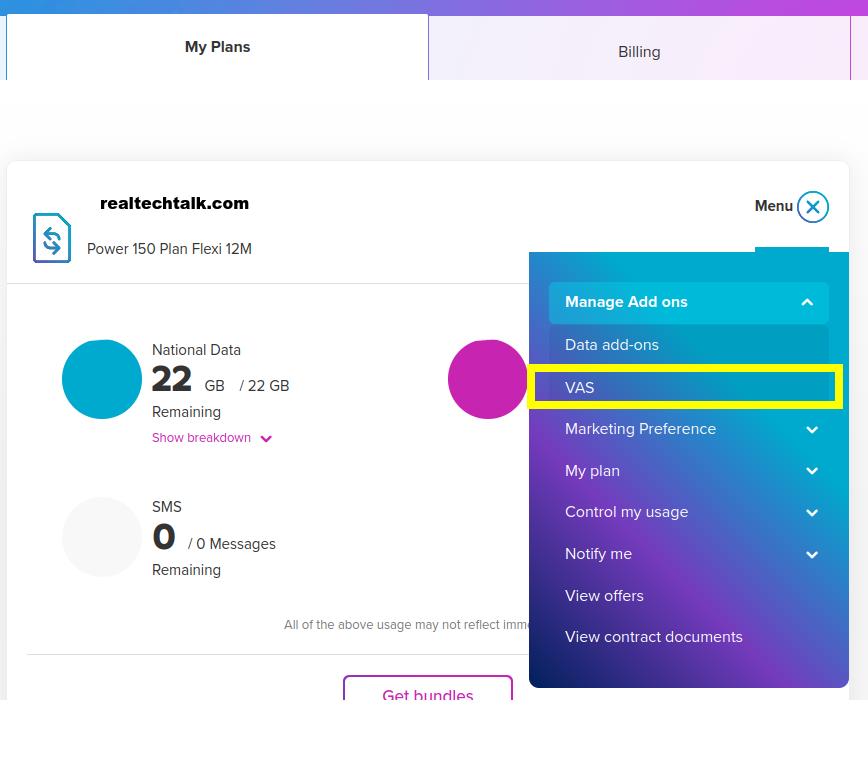
Be warned that even though VAS may show no subscriptions, you can and will still be impossibly charged for subscriptions that you haven't subscribed to.
Conclusion
Be vigilant, even if du tells you that everything has been canceled and refunded, I have found that this is normally NOT the case and will require followups, so be sure to take screenshots and then complain to the TDRA.
Docker Swarm vs Kubernetes Comparison Guide

A lot of companies are unsure which solution to choose and many may not be aware of Docker Swarm as an alternative to Kubernetes. One thing that many Sysadmins find is that Docker Swarm is simply easier, quicker to setup and maintain by far than Kubernetes.
See for yourself with this Docker Tutorial which includes Docker Swarm.
See the difference with one of our favorite and most efficient Kubernetes implementations.
One striking feature is that if we compare deploying the same container by setting up a 3 node Docker Swarm or Kubernetes, it is MUCH quicker to get the same application going in Kubernetes.
Administration and Expertise
-
Docker Swarm: Given its simplicity and integration with Docker, the administration overhead for Docker Swarm is significantly lower than Kubernetes. It requires less specialized knowledge, making it easier for teams already familiar with Docker to manage a Swarm environment. This translates into lower costs related to training and hiring specialized personnel. Smaller teams can effectively manage Swarm clusters without the need for dedicated DevOps roles focused solely on cluster management.
-
Kubernetes: Kubernetes' complexity and rich feature set necessitate a higher level of expertise and more administration time. Managing a Kubernetes cluster involves understanding various components like pods, services, deployments, and more, which has a steeper learning curve. Organizations often need to invest in specialized training for their teams or hire experienced Kubernetes administrators. This can significantly increase the manpower cost. Additionally, the ongoing management and optimization of Kubernetes clusters require more dedicated resources, potentially leading to higher costs in terms of both manpower and administration time.
Operational Costs
-
Docker Swarm: The operational costs of running Docker Swarm are generally lower, not just in terms of the computing resources required but also considering the manpower needed for its administration. Its lightweight nature means that it can run on less powerful hardware or cloud instances, further reducing costs.
-
Kubernetes: Kubernetes can be more resource-intensive, requiring more robust hardware or higher-tier cloud services to accommodate its operational demands. Additionally, the cost of employing skilled Kubernetes operators or DevOps engineers can be substantial. While Kubernetes can optimize resource utilization and cost through features like auto-scaling, the initial setup, ongoing management, and optimization require continuous effort and expertise.
Total Cost of Ownership (TCO)
The Total Cost of Ownership for Kubernetes vs. Docker Swarm extends beyond just the immediate resource and manpower costs. It includes training, the complexity of operations, the scale of deployment, and the potential need for additional tools or services to manage and monitor the environment.
-
Docker Swarm: Offers a lower TCO for smaller to medium-sized deployments or for teams with limited DevOps resources. Its ease of use and lower resource requirements make it a cost-effective solution for many scenarios, especially when operational simplicity and lower manpower costs are prioritized.
-
Kubernetes: While the TCO can be higher, especially with larger deployments requiring skilled personnel, Kubernetes' scalability and efficiency can, in the long run, offer cost savings for complex, large-scale applications and environments that benefit from its advanced features. The investment in Kubernetes can lead to better resource utilization, higher availability, and more dynamic scaling, potentially offsetting the higher initial costs over time.
Ease of Setup and Use
-
Docker Swarm: It is significantly easier to set up and configure Docker Swarm compared to Kubernetes. This is because Docker Swarm is tightly integrated into the Docker ecosystem. Setting up a Swarm cluster can be as simple as initiating a few Docker commands. This simplicity extends to its management and operation, making it more accessible for beginners or teams with smaller-scale deployments.
-
Kubernetes: Setting up a Kubernetes cluster is more complex and involves a steeper learning curve. Kubernetes offers more features and flexibility, which comes at the cost of increased complexity in setup and management. However, tools like Minikube or managed Kubernetes services (e.g., EKS, AKS, GKE) can help alleviate some of the setup difficulties.
Scalability
-
Docker Swarm: Offers fast and straightforward scalability. Swarm is designed to be efficient in scaling up and down in response to demand. However, it might not handle extremely large clusters as efficiently as Kubernetes.
-
Kubernetes: Known for its robust scalability features. It can manage much larger clusters efficiently and provides more options for high availability and load balancing. Kubernetes is the go-to for enterprises needing to scale their applications massively.
Features and Flexibility
-
Docker Swarm: Provides a simpler model for deploying applications, with a focus on ease of use and integration with Docker containers. It lacks some of the advanced features found in Kubernetes but covers the basic needs of container orchestration well.
-
Kubernetes: Offers a rich set of features including but not limited to auto-scaling, self-healing, service discovery, and load balancing. Its extensibility and flexibility make it suitable for complex applications and workflows.
Resource Requirements
-
Docker Swarm: Requires fewer resources compared to Kubernetes, making it a more economical option for smaller operations or where resources are limited. Its lightweight nature means it can run effectively on smaller setups.
-
Kubernetes: Due to its extensive feature set and the complexity of managing large clusters, Kubernetes generally requires more resources (CPU, memory) to run effectively. This can be a consideration for organizations with limited resources.
Community and Ecosystem
-
Docker Swarm: While Docker Swarm enjoys support from the Docker community, its ecosystem is not as vast or active as Kubernetes'. This can affect the availability of third-party tools and integrations.
-
Kubernetes: Boasts a large and active community. The ecosystem around Kubernetes is rich with third-party tools, services, and integrations, making it easier to find support and resources for extending Kubernetes capabilities.
Use Cases
-
Docker Swarm: Ideal for small to medium-sized deployments, startups, or for those who prefer simplicity and are already invested in the Docker ecosystem. It's also well-suited for applications that do not require the complex orchestration features offered by Kubernetes.
-
Kubernetes: Suited for larger, more complex applications and enterprises requiring high scalability, extensive automation, and advanced deployment strategies. It's the choice for multi-cloud and hybrid-cloud environments due to its flexibility and wide industry support.
Disaster Recovery Implications
-
Faster Initial Recovery: Given that Docker Swarm allows for quicker deployment, in the event of a disaster, restoring services to operational status can be achieved more rapidly. This speed is beneficial for minimizing downtime and reducing the impact on business operations.
-
Ease of Management: Docker Swarm's simplicity also means it's easier to manage in stressful situations, such as during disaster recovery. Fewer complexities reduce the risk of errors during the recovery process, making it more straightforward to execute recovery plans.
-
Scalability Concerns: While Docker Swarm offers speed and simplicity, it's important to note that Kubernetes provides more advanced features for handling large-scale, complex applications. In disaster recovery, this might mean Kubernetes can offer better long-term scalability and resilience options, despite its slower initial setup time. However, for many applications, Docker Swarm's capabilities are more than adequate, especially when rapid recovery is a priority.
-
Automation and Orchestration: Kubernetes excels in automation and orchestration, which can be advantageous in automatically managing application deployment and recovery across a large number of nodes. Docker Swarm, while simpler, may require more manual intervention in complex scenarios. However, for many scenarios, the speed and ease of use of Docker Swarm can outweigh these benefits, especially in environments where the application architecture aligns well with Swarm's model.
Can Docker Swarm Be Used at Scale?
Large Deployments Using Docker Swarm
Companies have chosen Docker Swarm for its lightweight nature and ease of use, especially when their infrastructure does not demand the extensive scalability and complex orchestration features provided by Kubernetes. Companies in sectors like technology, finance, and e-commerce have utilized Docker Swarm for hosting web applications, microservices, and internal tools, appreciating its straightforward scaling and deployment mechanisms.
Limitations and Scalability
-
Nodes: Docker Swarm is designed to be scalable and handle a large number of nodes efficiently. Officially, Docker has tested and supports Swarm clusters up to 2,000 nodes and 100,000 containers with no significant impact on performance. Keep in mind this was back in 2016 and there are no known or listed limitations in how many nodes Docker can have. These numbers serve as a benchmark for Docker Swarm's scalability, indicating its capability to support large-scale deployments. However, the practical limit can depend on the specific architecture, network setup, and the workload of the applications being run. https://etoews.github.io/blog/2016/08/05/joining-100-nodes-to-a-docker-swarm/
-
Practical Considerations: While Docker Swarm can technically support thousands of nodes, the practical scalability limit for a cluster might be influenced by factors like network latency, cluster management overhead, and the complexity of deployed services. For most use cases, Docker Swarm offers sufficient scalability. It's also worth noting that very large-scale applications that require intricate orchestration, advanced scheduling, or extensive automation might reach a point where Kubernetes offers advantages due to its richer feature set and ecosystem.
-
Examples of large deployments of Docker Swarm: There are reports of loads runnning 100,000 containers and more than 10,000 nodes. There is no known limit that we've seen, so it is untrue that Docker Swarm cannot be deployed at scale.
Conclusion
Choosing between Docker Swarm and Kubernetes depends on your project's size, complexity, and specific requirements. Docker Swarm is a great choice for those valuing simplicity, ease of setup, and lower resource requirements. Kubernetes, on the other hand, is suited for those needing a highly scalable, feature-rich platform capable of managing complex applications and workflows. Each tool has its strengths, and the decision should align with your technical needs, team's expertise, and long-term strategy. The easiest answer to the question is that if you don't need the extra features that Kubernetes provides, then you cannot go wrong with Docker Swarm.
When is it time to leave your VPS/VDS Cloud Hosting Provider?
2024 Buyer's Guide: How to Choose and Buy the Best VPS/VDS for Your Needs - Tips and Strategies

In today’s digital landscape, finding a reliable and secure Virtual Private Server (VPS) or Virtual Dedicated Server (VDS) goes beyond just comparing specs and prices. With increasing concerns over data privacy, security breaches, and government surveillance, the wisdom of choosing your VPS/VDS provider based on jurisdiction, security features, and operational transparency has never been more critical.
Our guide on when to switch to a different provider is here.
Why is our VPS guide different?
Many of the blogs and guides out there are not made by professionals with decades of experience, and in fact, are often created by full time digital marketing gurus and firms.
realtechtalk.com is a source of technical information and solutions, many of the other guides out there and comparisons are created by "Tech blogs" that don't actually run mission critical operations or real world problems and solutions.
The sheer amount of available guides can be overwhelming. However, it's crucial to approach these resources with a discerning eye, especially considering that many guides are driven by underlying motives such as affiliate marketing, prioritizing recommendations that may not align with your best interests. Our guide stands apart in this cluttered space, and here's why it's an invaluable resource for businesses prioritizing security and reliability.
Assessing Technical Depth and Utility
-
Detailed How-To Guides and Tutorials: Genuine technical blogs often provide comprehensive how-to guides, tutorials, and step-by-step instructions that help readers solve specific problems or achieve tasks. The presence of detailed, actionable content can indicate a blog's commitment to offering real value to its audience.
-
Problem-Solving Content: Authentic tech blogs usually address common and niche technical issues, offering solutions based on experience and expertise. They might discuss troubleshooting steps, optimization tips, and best practices for using VPS and cloud services effectively.
-
Technical Discussion Depth: Blogs that delve into the technical nuances, underlying principles, and architectural considerations of VPS and cloud solutions demonstrate a deeper understanding of the subject matter. A focus on surface-level features or benefits without discussing the technical how and why may suggest a lack of genuine expertise.
Unbiased and Comprehensive Analysis
-
No Affiliate Links: Unlike many guides that rely on affiliate marketing for revenue, our recommendations are untainted by financial incentives. This means we have no hidden agenda; our sole focus is to provide you with the best options based on merit, not commission rates.
-
Security-Centric Recommendations: We understand that for businesses, security isn't just another checkbox—it's a foundation. Our guide is crafted with a deep understanding of cybersecurity threats and countermeasures, ensuring that our recommendations prioritize the safety of your data above all else.
-
Reliability as a Priority: In the digital age, downtime is synonymous with lost revenue and damaged reputation. We highlight solutions known for their uptime, robust infrastructure, and excellent customer support, ensuring your operations run smoothly around the clock.
Prioritize Long-Standing Providers
- Established Track Record: Opt for a provider that has been in business for a significant period. Longevity in the hosting industry often indicates a consistent track record of reliability and customer satisfaction. Companies that have weathered the ups and downs of the market are more likely to understand the nuances of maintaining high uptime, offering scalable solutions, and providing responsive customer support.
Assess Ownership and Management Experience
-
Reputable Ownership: Consider providers that are either independently reputable or are part of a well-regarded parent company known for its stability and financial health. The backing of a reputable company often means access to better resources, infrastructure, and a more significant safety net in terms of business continuity and disaster recovery capabilities.
-
Experienced Management: Look into the experience and background of the management team. Providers led by individuals with a proven track record in the IT, datacenter, or networking industries can offer more reliable and innovative services. Experienced leadership is adept at navigating technical challenges and market fluctuations, ensuring the provider remains on solid footing.
Verify the Provider's Financial Health
- Stable Financial Background: A financially stable provider is less likely to experience service disruptions due to budget constraints or go out of business suddenly, jeopardizing your data and online presence. While financial details may not always be publicly available, signs of stability include consistent service improvements, infrastructure investments, and positive customer testimonials over the years.
Look for Consistent Innovation and Improvement
- Ongoing Investment in Technology: A provider that continually invests in its infrastructure, software, and services is likely in a stable financial position and committed to offering the best possible service. Regular updates to services, hardware, and security protocols indicate a provider's dedication to maintaining high performance and customer satisfaction.
Choose Lesser-Known, Specialized Providers
- Avoid Household Names: Opt for providers that may not be household names but have a solid reputation in specialized forums and industry circles. These companies are less likely to be the target of mass-scale cyber attacks and may offer more personalized service, which can be a boon for SMEs requiring attentive support.
Evaluate the Provider's Infrastructure and Expertise
-
Assess Scale and Reliability: While large providers may offer attractive pricing due to their scale, their service can sometimes be impersonal, and they may experience significant outages. A smaller, more specialized provider could offer more reliable uptime and personalized attention, critical for businesses where every minute of downtime counts.
-
Verify In-House Expertise: Ensure the provider has in-house experts in datacenter management, servers, and networking. Providers that openly share information about their team's expertise and infrastructure are generally more trustworthy and capable of delivering higher service quality. Those that don't may lack direct control over their services, potentially compromising reliability and performance.
Look for Comprehensive Services and Support
- Full-Scale System and Network Support: Choose a provider that offers a range of support and consulting services, from system administration to network security. This indicates a higher level of expertise and a commitment to supporting your business's specific needs. Providers that control their own hardware and network infrastructure are preferable, as they can offer more customized solutions and faster response times.
Importance of Control and Transparency
- Control Over Hardware and Network: A provider that owns and controls its hardware and network infrastructure can offer better security, performance, and reliability. This control also means they can be more responsive to issues and offer more customized solutions, essential for businesses with specific or changing needs.
Why Security and Jurisdiction Matter
Recent years have shown that even the most reputable providers are not immune to outages, security breaches, and other vulnerabilities. High-profile incidents involving major companies like Amazon, Vultr, and DigitalOcean have highlighted the risks of hosting with providers that become prime targets for cyberattacks. The allure of free or cheap services often comes with a hidden cost: your data’s security and privacy. Many of these low-cost providers have been identified as sources of hacking traffic, making them not just insecure but complicit in the broader ecosystem of cyber threats.
Moreover, the revelations from Edward Snowden about NSA surveillance activities have cast a long shadow over providers in PRISM countries. Providers under the jurisdiction of these nations are subject to laws that compel them to hand over user data to government agencies, often without the user's knowledge or consent. This reality poses a significant risk for businesses and individuals concerned about the confidentiality of their communications and the integrity of their data.
Signs of Expertise, Does Your Provider Offer Dedicated Servers, Fiber and IP Space?
Comprehensive Infrastructure Solutions
- Private Server Capabilities: Look for providers that offer the option to transition from VPS to dedicated or even private server environments. This capability is crucial for businesses with growing or fluctuating demands, ensuring that they can scale their resources up or down as needed without compromising performance or security.
Dedicated Network Options
- Custom Network Solutions: Providers that can offer dedicated network solutions, including private VLANs or MPLS, indicate a high level of network management expertise. This is essential for businesses that prioritize data security and require isolated networking environments to protect sensitive information.
Private Fiber Optic Connections
- Direct Fiber Access: A provider capable of offering direct fiber optic connections for your business' exclusive use, demonstrates a significant investment in infrastructure. This level of service ensures the highest possible speed and reliability, and security, crucial for businesses that rely on real-time data access and high-bandwidth applications.
Dedicated IP Space
- Allocated IP Ranges: Providers that can offer dedicated IP space give businesses the flexibility and control needed for various operations, including running their own web servers, email servers, and other services while ensuring improved security and reputation management.
Expertise and Customization
- Security and Scalability: The ability to provide these high-level services is a testament to a provider's expertise in secure and scalable IT services. It indicates a depth of knowledge not only in hardware and infrastructure but also in understanding the unique needs of businesses that require these advanced services.
Avoid Free Trials and Money Back Guarantee VPS/VDS/Cloud Offers
In addition to the concerns surrounding large VPS providers, it's also wise to exercise caution with providers that offer free trials or 30-day money-back guarantees. While these offers are attractive for legitimate users testing the services before committing financially, they present vulnerabilities that can be exploited by malicious actors. Below, we explore why such promotional offers can exacerbate the risks of shared hosting environments.
Increased Susceptibility to Abuse by Hackers
-
Low Barriers to Entry: Free trials and money-back guarantees lower the barriers to entry, making it easier for hackers to sign up for services with minimal upfront investment. This accessibility allows malicious users to exploit these platforms for launching attacks, hosting malicious content, or conducting other nefarious activities without significant financial risk.
-
Temporary Nature of Services: The temporary nature of free or trial accounts makes them particularly appealing to hackers. Malicious actors can use these services to perform their activities and then abandon the account before any serious action can be taken against them. This transient usage pattern complicates efforts to track and mitigate abusive behavior.
-
Reputation Damage and Blacklisting: As hackers frequently utilize these trial accounts, the IP ranges and resources allocated to these promotional offers can become associated with malicious activities. This association can lead to IPs being blacklisted, affecting not only the hackers but also legitimate users who are later assigned those IPs or subnets. The consequences can include email delivery issues, decreased network reputation, and potential blocking by security systems.
-
Resource Strain and Security Risks: Providers offering extensive free trials or guarantees might attract a disproportionate number of abusers, straining resources and potentially compromising the security of the network. This strain can impact service quality for legitimate users and increase the provider's susceptibility to breaches if resources are diverted to manage abuse instead of enhancing security measures.
Mitigation Strategies for Users
To mitigate these risks, users should consider providers that have robust verification processes for new accounts, even if they offer trials or money-back guarantees. Additionally, researching a provider's reputation, security practices, and how they handle abuse can provide insights into their suitability. Opting for providers that balance promotional offers with strict anti-abuse measures can help minimize the risk of being inadvertently associated with malicious activities.
Avoid Large Providers
The choice of a Virtual Private Server (VPS) provider is crucial for businesses and individuals who prioritize privacy, security, and reliability in their online operations. Opting for large VPS providers, while seemingly advantageous due to their established reputations and extensive resources, comes with a set of risks that warrant careful consideration. Below are key reasons why one might avoid large VPS providers, focusing on concerns related to mass surveillance, government interest, hacker targeting, and the implications of sharing IP space with malicious actors.
Increased Risk of Mass Surveillance and Government Interest
-
Scale and Visibility: Large VPS providers, due to their size and the volume of data they handle, are more likely to be under surveillance by governments and intelligence agencies. The extensive customer base and significant amount of traffic make these providers prime targets for mass data collection efforts.
-
Legal and Regulatory Compliance: Big providers are often subject to stringent legal and regulatory requirements, which may compel them to comply with government requests for data access. In jurisdictions with laws that infringe on privacy rights, this compliance can lead to the monitoring of user activities without explicit consent or knowledge.
-
Data Center Locations: The global presence of large providers means that some of their data centers may be located in countries with aggressive surveillance laws. This geographic diversity, while beneficial for performance and redundancy, can expose users to varied legal regimes, some of which may be more intrusive.
Vulnerability to Hacking and Malicious Activities
-
Attractive Targets for Hackers: The prominence and scale of large VPS providers make them attractive targets for cybercriminals and hackers. Breaching the defenses of a major provider can grant attackers access to a vast amount of resources and data, offering a high return on their efforts.
-
Shared IP Space Concerns: When you use a large VPS provider, you share IP space with numerous other customers, including potentially malicious users. This shared environment can lead to your IP addresses being blacklisted or marked on Real-time Blackhole Lists (RBLs) due to the activities of other users, affecting your email deliverability and reputation.
-
Proximity to Malicious Actors: Sharing network infrastructure with hackers increases the risk of collateral damage from targeted attacks against other users on the same network. Moreover, if hackers manage to exploit vulnerabilities within the provider's network, there's a theoretical risk they could gain unauthorized access to your resources, especially if network segmentation or isolation measures are inadequate.
Choosing a VPS/VDS Provider: Features to Look For
When searching for a VPS/VDS provider, prioritize those registered and operating outside of PRISM countries. Look for jurisdictions with strong data protection laws and a history of resisting extraterritorial demands for user data.
Security Features
- Data Encryption: Ensure that the provider offers robust encryption for data at rest and in transit.
- DDoS Protection: Look for built-in protection against Distributed Denial of Service (DDoS) attacks.
- Regular Security Audits: Choose providers that conduct regular security audits and make those reports available to their customers.
- Access Controls: Comprehensive access control options, including two-factor authentication (2FA) and role-based access, are essential.
Jurisdictional Considerations
- Non-PRISM Countries: Opt for providers based in countries not part of the PRISM surveillance program, enhancing privacy protection.
- Data Sovereignty: Understand where your data is physically stored and the legal implications of that jurisdiction.
Things to Avoid
- Free or Extremely Cheap Offers: These can be indicative of compromised security measures and a lack of investment in infrastructure.
- Providers with a History of Outages and Breaches: Research your provider's track record for reliability and security incidents.
- PRISM owned providers: Avoid providers that are incorporated and registered in PRISM based countries.
Billing Considerations
When comparing the cost implications of using usage-based services like Amazon Web Services (AWS) to flat-rate VPS hosting options, it's important to consider how these billing models can impact your budget and operational costs.
AWS operates on a usage-based pricing model, offering flexibility and scalability but potentially leading to unpredictable and higher costs depending on usage patterns. This model can be beneficial for businesses with fluctuating needs, allowing them to scale resources up or down based on demand. However, for users with stable or predictable resource requirements, this flexibility comes at the cost of complexity in budgeting due to potential overages and the intricate pricing structures associated with different services and resources within AWS.
In contrast, flat-rate VPS hosting services offer a predictable monthly fee, simplifying budget management and financial planning. These services typically provide a fixed amount of resources (CPU, RAM, storage, bandwidth) for a set price, making it easier for users to predict their hosting expenses without worrying about variable costs based on resource consumption. This pricing model is particularly appealing for small to medium-sized projects, personal websites, or businesses with consistent resource needs, where budget predictability is a priority.
The choice between usage-based and flat-rate billing models should be based on your specific hosting needs, resource usage patterns, and budgetary constraints. For projects with dynamic resource demands, a usage-based model like AWS might offer the necessary flexibility, albeit with more complex budgeting requirements. For those with more predictable resource needs, a flat-rate VPS hosting service could provide cost savings and simpler financial planning.
Pay-As-You-Go
The "pay-as-you-go" billing model, while offering flexibility and scalability, carries inherent risks that can lead to unexpectedly high charges, particularly in scenarios of hacking, abuse, or misconfiguration.
Hacking and Security Breaches
In a pay-as-you-go model, if an account is compromised, hackers can quickly spin up resources for their own purposes, such as cryptocurrency mining or launching attacks, leading to significant financial liabilities for the account owner. Since billing is based on usage, the costs can escalate rapidly without immediate detection of the unauthorized activity.
Abuse and Misconfiguration
Similarly, abuse or misconfiguration can lead to spiraling costs. For instance, leaving unused resources running, improperly configured services, or deploying resources more extensive than necessary can all contribute to higher than anticipated charges. An application or service experiencing a sudden increase in usage, whether through legitimate traffic spikes or DDoS attacks, can also result in significant expenses.
Comparing with Flat-Rate Billing
On the other hand, flat-rate VPS hosting offers a predictable monthly or annual fee, providing a capped cost that can safeguard against the unpredictable expenses associated with the pay-as-you-go model. This predictability is particularly valuable for small to medium-sized projects or businesses with fixed budgets. However, it's important to note that while flat-rate plans offer cost predictability, they may lack the flexibility to scale resources dynamically in response to changing needs.
Mitigation Strategies
To mitigate the risks associated with the pay-as-you-go model:
- Monitoring and Alerts: Utilize cloud service monitoring tools to track resource usage and set up alerts for unusual activity.
- Security Best Practices: Implement robust security measures, including multi-factor authentication, regular audits, and strict access controls.
- Budget Management Tools: Use budget management features offered by cloud providers to set spending limits and avoid unexpected charges.
Examples of Providers Tapping Their Clients
The owner of a popular chat service found that their large providers Hetzner and Linode tapped their servers which was documented on Reddit and by other security researchers.
In this case there was no evidence of the servers being hacked, but a device that acted as a man in the middle was placed in order to decrypt the encrypted traffic in and out of the server. This was done to servers at 2 different locations in Germany and by two different providers (Linode and Hetzner).
By choosing large providers and choosing countries that co-operate with the US based PRISM program in the EU and most parts of the world, you are putting your data and security at risk.
https://therecord.media/jabber-ru-alleged-government-wiretap-expired-tls-certificate
Note a similar occurrence happened in France as well:
https://www.wired.com/story/encrochat-phone-police-hacking-encryption-drugs/
In all cases the clients were not notified and it's unclear what, if any legal process was used and it also appears that providers simply comply with requests for data and access, even if it may be illegal or unwarranted.
Postfix / sendmail config for DKIM, SPF and DMARC Tutorial Guide E-mail Delivery for Hotmail.com Gmail.com and More HowTo
This will be the goto to help solve e-mail delivery issues and talk about many practical issues that happen between developers, admins and scripts that send e-mail and do things that may not be acceptable or cause deliverability problems.
Sendmail Stuff
Edit /etc/mail/sendmail.mc
The problem is that if you send directly out from the server using the mail function, the Return-path of the e-mails will be username@thehostnameoftheserver.com. Let's say the From Address is "hellothere@cooldomain.com", this is a problem becasue presumably you've signed the e-mail for "cooldomain.com" but some e-mail providers will also check the Return-path domain of "thehostnameoftheserver.com" and find it does not match and there is no signature for the hostname and this will cause e-mails to be rejected or sent to spam.
So if your server's hostname is abc123.com, then the return path is the user@abc123.com, and this obviously breaks more strict DKIM checks because e-mail servers like gmail.com will also expect a DKIM signature for the hostname of the server.
To make things worse, a lot of times the people/devs that generate these e-mails may not have access to the server or may not be allowed to change the hostname.
Fix it Using Sendmail's MASQUERADE
Below we can fix this by using MASUERADE_AS with realtechtalk.com, this will be the domain set in the Return-path and the MASQUERADE_DOMAIN is abc123.com, you can add more lines with extra domains you want to rewrite.
dnl MASQUERADE_AS(`realtechtalk.com')dnl
dnl FEATURE(masquerade_entire_domain)dnl
dnl MASQUERADE_DOMAIN(abc123)dnl
To apply the changes update sendmail.cf like this:
We have to generate the new config file
m4 sendmail.mc
Restart the sendmail service.
systemctl restart sendmail
OpenDKIM Settings
Be sure to set this option for /etc/opendkim.conf as this will sign for multiple domains/hosts in the e-mail:
MultipleSignatures Yes
Eg. if your return-path is abc123.com and your from address is hello.com, both need to be signed or they will fail DMARC and possibly be blocked or sent to spam. This also assumes that you should correctly have the keys and configuration to sign all domains that may be a part of the e-mail (eg. our example should mean that you have keys for abc123.com and hello.com on your server that sends out).
Install Grafana on Linux Debian Ubuntu Tutorial Guide
First we need a few extra packages:
apt update
apt install -y adduser libfontconfig1 musl sudo
wget https://dl.grafana.com/enterprise/release/grafana-enterprise_10.3.1_amd64.deb
Install / Enable Grafana
dpkg -i grafana-enterprise_10.3.1_amd64.deb
dpkg -i grafana-enterprise_10.3.1_amd64.deb
(Reading database ... 44309 files and directories currently installed.)
Preparing to unpack grafana-enterprise_10.3.1_amd64.deb ...
Unpacking grafana-enterprise (10.3.1) over (10.3.1) ...
Setting up grafana-enterprise (10.3.1) ...
Restarting grafana-server service... OK
root@Grafana-realtechtalk:~# apt purge grafana-enterprise
Reading package lists... Done
Building dependency tree... Done
Reading state information... Done
The following packages will be REMOVED:
grafana-enterprise*
0 upgraded, 0 newly installed, 1 to remove and 94 not upgraded.
After this operation, 408 MB disk space will be freed.
Do you want to continue? [Y/n] y
(Reading database ... 44309 files and directories currently installed.)
Removing grafana-enterprise (10.3.1) ...
Stopping and disabling grafana-server service...
Synchronizing state of grafana-server.service with SysV service script with /lib/systemd/systemd-sysv-install.
Executing: /lib/systemd/systemd-sysv-install disable grafana-server
Removed /etc/systemd/system/multi-user.target.wants/grafana-server.service.
(Reading database ... 34213 files and directories currently installed.)
Purging configuration files for grafana-enterprise (10.3.1) ...
dpkg: warning: while removing grafana-enterprise, directory '/etc/grafana' not empty so not removed
dpkg: warning: while removing grafana-enterprise, directory '/usr/lib/systemd/system' not empty so not removed
root@Grafana-realtechtalk:~# dpkg -i grafana-enterprise_10.3.1_amd64.deb
Selecting previously unselected package grafana-enterprise.
(Reading database ... 34208 files and directories currently installed.)
Preparing to unpack grafana-enterprise_10.3.1_amd64.deb ...
Unpacking grafana-enterprise (10.3.1) ...
Setting up grafana-enterprise (10.3.1) ...
### NOT starting on installation, please execute the following statements to configure grafana to start automatically using systemd
sudo /bin/systemctl daemon-reload
sudo /bin/systemctl enable grafana-server
### You can start grafana-server by executing
sudo /bin/systemctl start grafana-server
Enable Grafana
systemctl daemon-reload
systemctl enable grafana-server
### You can start grafana-server by executing
sudo /bin/systemctl start grafana-server
Synchronizing state of grafana-server.service with SysV service script with /lib/systemd/systemd-sysv-install.
Executing: /lib/systemd/systemd-sysv-install enable grafana-server
Created symlink /etc/systemd/system/multi-user.target.wants/grafana-server.service → /lib/systemd/system/grafana-server.service.
Start Grafana
systemctl start grafana-server
Access Grafana
Browse to https://YourIP:3000 and login as admin/admin
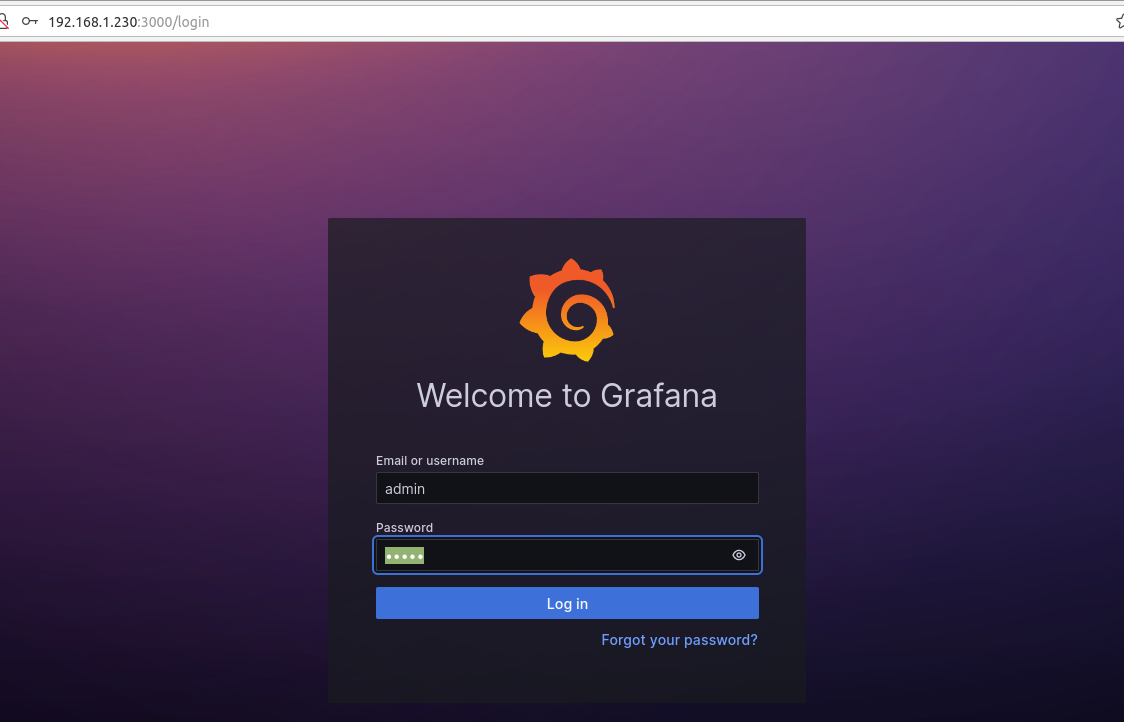
Update Your Password
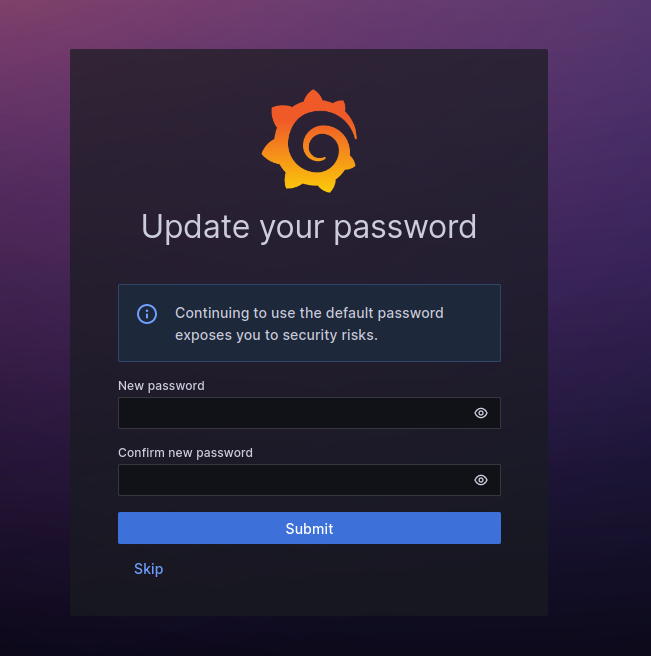
Welcome to the Grafana Dashboard!
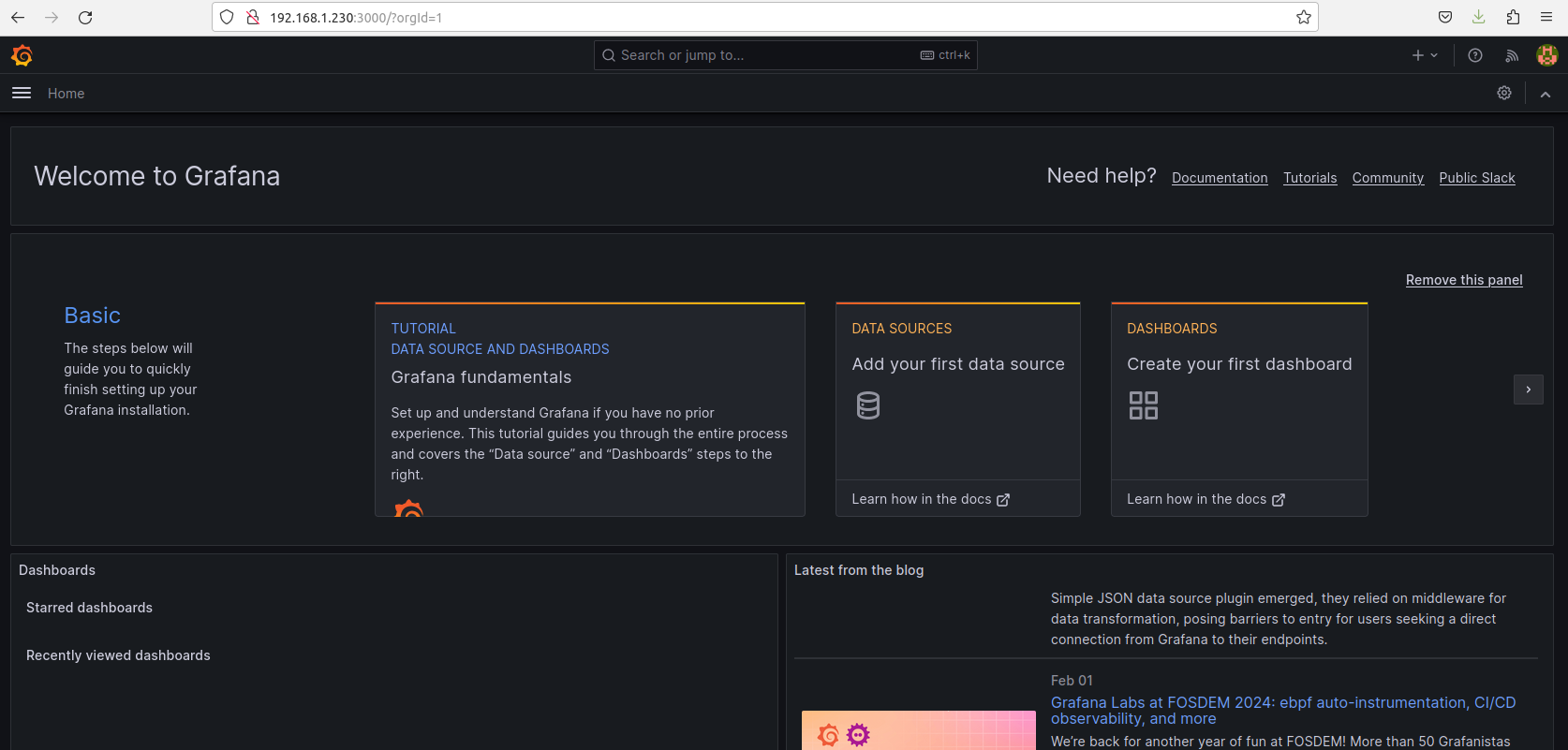
References
https://grafana.com/grafana/download?pg=oss-graf&plcmt=hero-btn-1
How To Completely Disable ufw in Linux Ubuntu Mint Debian
This is for the situation that you're doing other things that may conflict or have your own custom rules and ufw keeps overriding iptables.
A lot of guides don't work, and even ufw reset does not work, because it still leaves the old ufw chains.
Here is what works to disable ufw completely
systemctl stop ufw
systemctl disable ufw
ufw disable
rm -f /etc/ufw/*
iptables -F
Now run this script to finish the job
This script will delete all of the old ufw chains.
for chain in `iptables -L|grep ufw|awk '{print $2}'`; do
iptables -X $chain
done
Do this in case:
Sometimes the default iptables policy for FORWARD, OUTPUT, INPUT will be drop
iptables --policy FORWARD ACCEPT
iptables --policy INPUT ACCEPT
iptables --policy OUTPUT ACCEPT
We can see all the old chains below before running the script and then after the script they are all deleted.
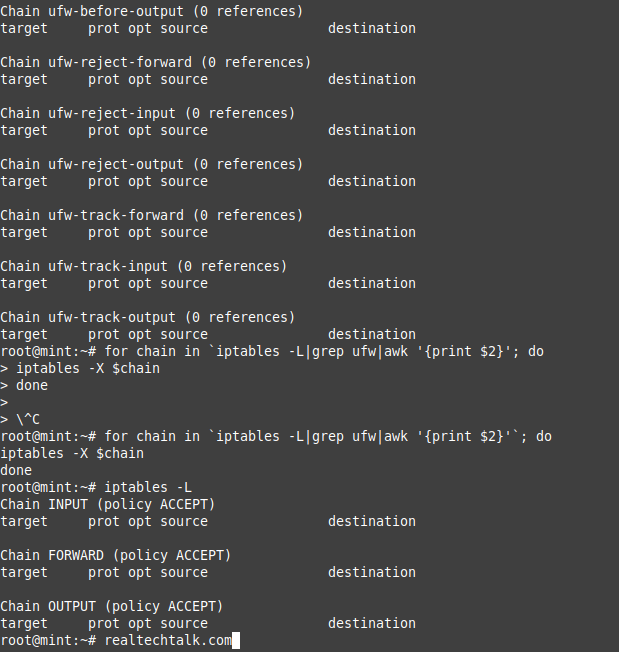
System has not been booted with systemd as init system (PID 1). Can't operate. Failed to talk to init daemon. Ubuntu Debian Linux Solution Cannot reboot
You are probably using some custom image or maybe this is some sort of container that didn't boot with systemd.
_ Cant-operate_ Failed to talk to init daemon.png)
The solution is to use "reboot -f"
reboot -f
This will force the system/OS/VM/container to reboot.
Mint Ubuntu Linux Gnome Showing Home Directory on Desktop instead of Desktop Directory
During a migration or other custom setup, it's possible you don't have a $HOME/Desktop and as a result the config file that controls this is set to just use your $HOME directory.
This is controlled in the file: $HOME/.config/user-dirs.dirs
As we can see below, Desktop, Downloads, Music and Pictures are set to $HOME. We can edit any of these as we like.
# This file is written by xdg-user-dirs-update
# If you want to change or add directories, just edit the line you're
# interested in. All local changes will be retained on the next run.
# Format is XDG_xxx_DIR="$HOME/yyy", where yyy is a shell-escaped
# homedir-relative path, or XDG_xxx_DIR="/yyy", where /yyy is an
# absolute path. No other format is supported.
#
XDG_DESKTOP_DIR="$HOME/"
XDG_DOWNLOAD_DIR="$HOME/"
XDG_TEMPLATES_DIR="$HOME/Templates"
XDG_PUBLICSHARE_DIR="$HOME/Public"
XDG_DOCUMENTS_DIR="$HOME/Documents"
XDG_MUSIC_DIR="$HOME/"
XDG_PICTURES_DIR="$HOME/"
XDG_VIDEOS_DIR="$HOME/Videos"
Fixed:
# This file is written by xdg-user-dirs-update
# If you want to change or add directories, just edit the line you're
# interested in. All local changes will be retained on the next run.
# Format is XDG_xxx_DIR="$HOME/yyy", where yyy is a shell-escaped
# homedir-relative path, or XDG_xxx_DIR="/yyy", where /yyy is an
# absolute path. No other format is supported.
#
XDG_DESKTOP_DIR="$HOME/Desktop"
XDG_DOWNLOAD_DIR="$HOME/Downloads"
XDG_TEMPLATES_DIR="$HOME/Templates"
XDG_PUBLICSHARE_DIR="$HOME/Public"
XDG_DOCUMENTS_DIR="$HOME/Documents"
XDG_MUSIC_DIR="$HOME/Music"
XDG_PICTURES_DIR="$HOME/Pictures"
XDG_VIDEOS_DIR="$HOME/Videos"
vi vim not doing code highlighting E319: Sorry, the command is not available in this version solution
Normally syntax highlighting is the default behavior.
You can enable it manually by hitting :syntax on
But normally you'll have this error because of the missing package.
E319: Sorry, the command is not available in this version
Solution install the vim-gui-common package:
apt install vim-gui-common
After that you should find that the code is highlighted by default.
Happy coding!
Proxmox How To Rename Node Hostname Fix Solution
Proxmox's documentation shows the following here.
Which mainly just says change /etc/hosts and /etc/hostname with your new hostname.
Here's what happens if you only do that:
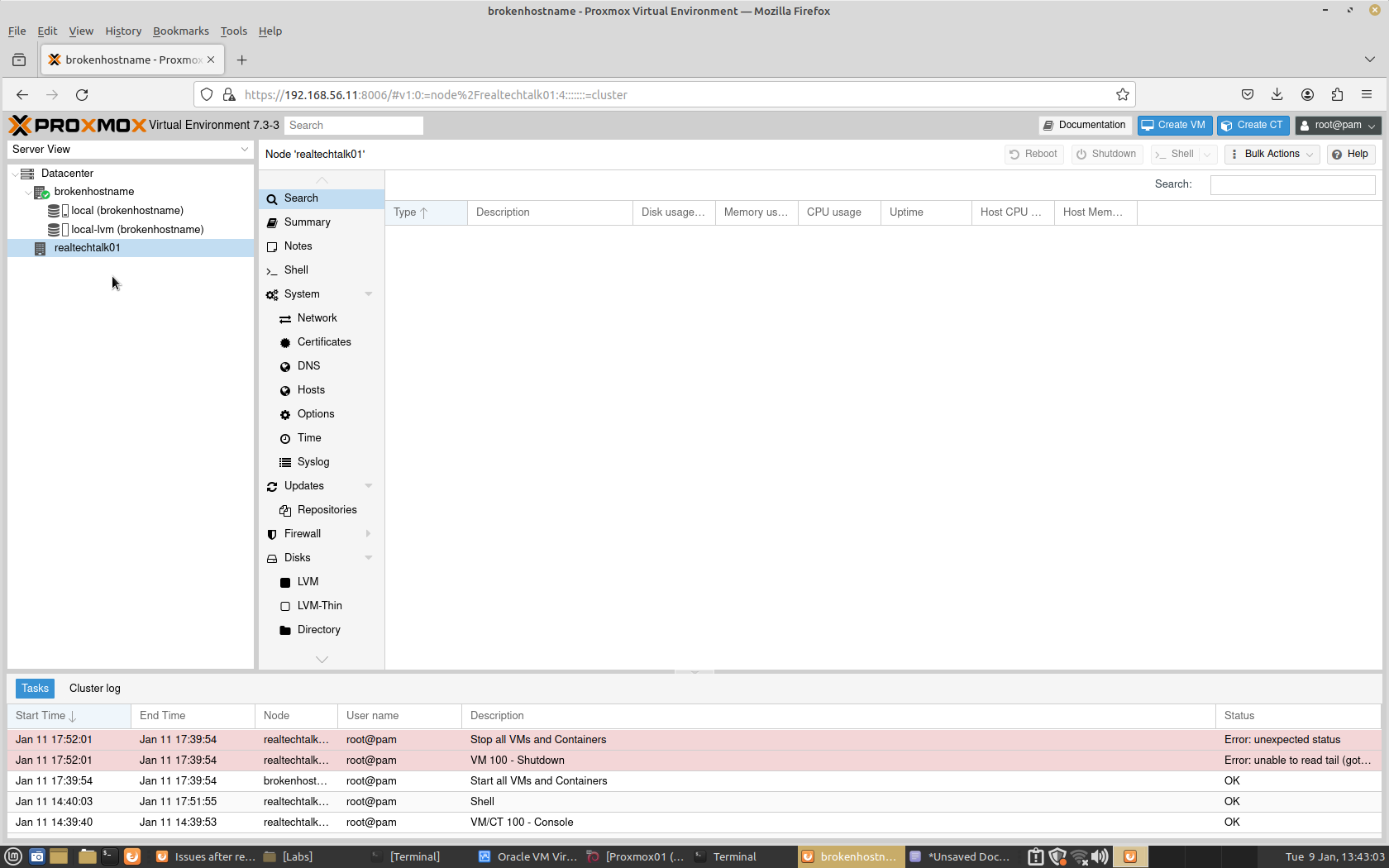
If you just do the above, you will find you have an inaccessible original hostname that contains those VMs and you cannot move or stop them.
You need to go into /etc/pve/nodes
You'll see the following inside:
oldhostname
newhostname
1.) Move both of those somewhere else.
2.) Create a dir called "newhostname"
3.) Copy the contents of "oldhostname" to "newhostname"
It's Fixed!
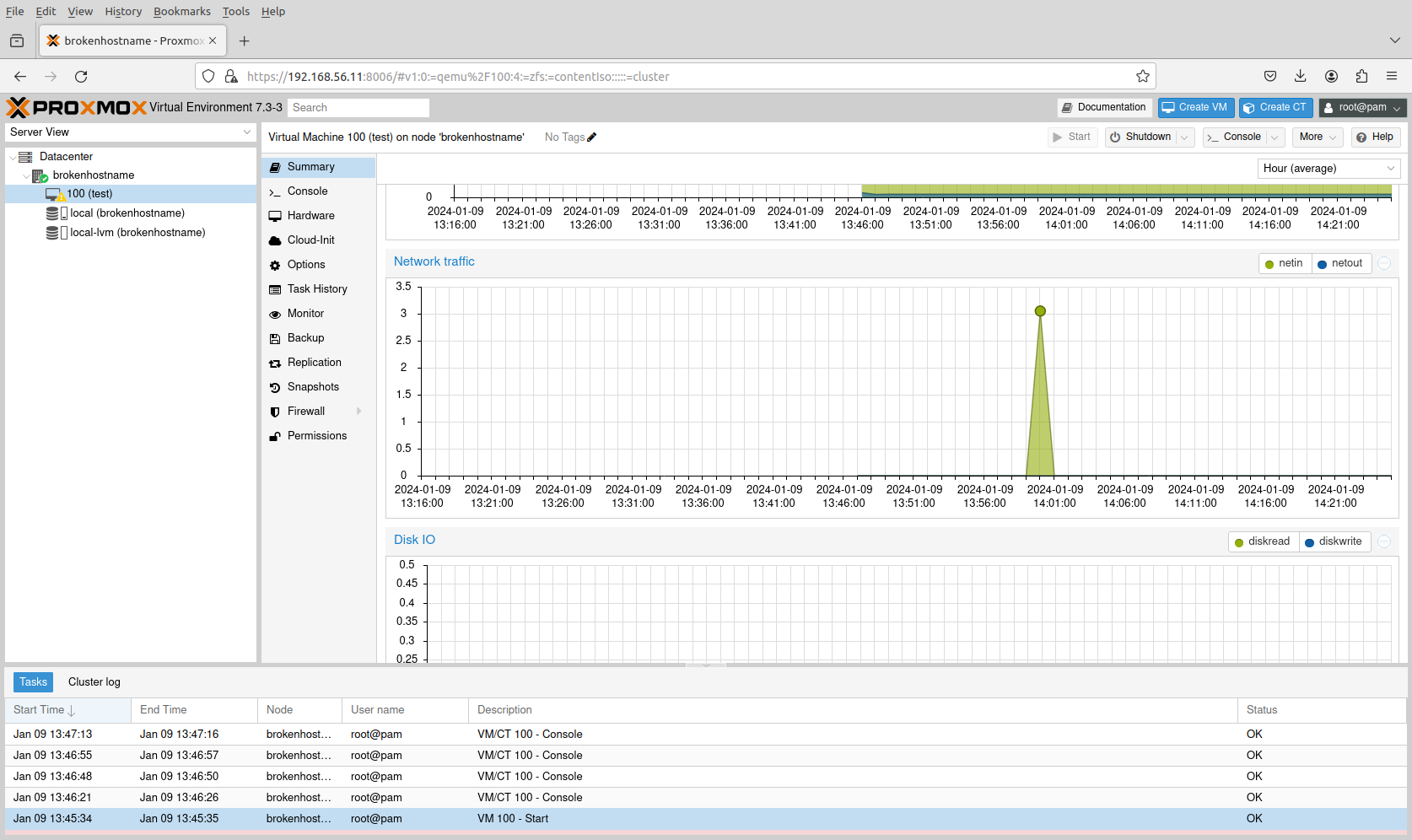
Linux how to get list of all timezones on system Ubuntu
find /usr/share/zoneinfo/|sed s#"/usr/share/zoneinfo/"##g|grep "/"|grep -v posix|grep -v ^"Etc/"|grep -v ^right|grep -v ^"SystemV"
Africa/Addis_Ababa
Africa/Abidjan
Africa/Blantyre
Africa/Lusaka
Africa/Casablanca
Africa/Libreville
Africa/Asmara
Africa/Bujumbura
Africa/Dakar
Africa/Lagos
Africa/Malabo
Africa/Harare
Africa/Kigali
Africa/Mogadishu
Africa/Maseru
Africa/Tunis
Africa/Ouagadougou
Africa/Sao_Tome
Africa/Kinshasa
Africa/Asmera
Africa/Tripoli
Africa/Khartoum
Africa/Conakry
Africa/Nouakchott
Africa/Djibouti
Africa/Niamey
Africa/Bangui
Africa/Ndjamena
Africa/Kampala
Africa/Johannesburg
Africa/Algiers
Africa/Banjul
Africa/Lubumbashi
Africa/Monrovia
Africa/Timbuktu
Africa/Juba
Africa/Windhoek
Africa/Cairo
Africa/Porto-Novo
Africa/Lome
Africa/Douala
Africa/Bissau
Africa/Brazzaville
Africa/Nairobi
Africa/Bamako
Africa/Dar_es_Salaam
Africa/Ceuta
Africa/Freetown
Africa/El_Aaiun
Africa/Maputo
Africa/Mbabane
Africa/Accra
Africa/Luanda
Africa/Gaborone
Chile/Continental
Chile/EasterIsland
Brazil/DeNoronha
Brazil/West
Brazil/East
Brazil/Acre
Antarctica/Davis
Antarctica/Macquarie
Antarctica/Vostok
Antarctica/Casey
Antarctica/Syowa
Antarctica/South_Pole
Antarctica/Rothera
Antarctica/Palmer
Antarctica/McMurdo
Antarctica/Troll
Antarctica/Mawson
Antarctica/DumontDUrville
Canada/Eastern
Canada/Newfoundland
Canada/Saskatchewan
Canada/Central
Canada/Yukon
Canada/Atlantic
Canada/Pacific
Canada/Mountain
US/Arizona
US/Eastern
US/Central
US/Indiana-Starke
US/Hawaii
US/Alaska
US/Aleutian
US/Samoa
US/Pacific
US/Mountain
US/Michigan
US/East-Indiana
Mexico/BajaNorte
Mexico/General
Mexico/BajaSur
Indian/Mayotte
Indian/Mauritius
Indian/Reunion
Indian/Kerguelen
Indian/Cocos
Indian/Christmas
Indian/Antananarivo
Indian/Comoro
Indian/Mahe
Indian/Chagos
Indian/Maldives
Europe/Brussels
Europe/Tallinn
Europe/San_Marino
Europe/Isle_of_Man
Europe/Bucharest
Europe/Zagreb
Europe/Oslo
Europe/Astrakhan
Europe/Mariehamn
Europe/Gibraltar
Europe/Zaporozhye
Europe/Ulyanovsk
Europe/Volgograd
Europe/Vaduz
Europe/Vienna
Europe/Bratislava
Europe/Chisinau
Europe/Berlin
Europe/Guernsey
Europe/Kirov
Europe/Tirane
Europe/Sarajevo
Europe/Budapest
Europe/Warsaw
Europe/Dublin
Europe/Jersey
Europe/Minsk
Europe/Moscow
Europe/Monaco
Europe/Kiev
Europe/Ljubljana
Europe/Kyiv
Europe/Istanbul
Europe/Prague
Europe/Sofia
Europe/Rome
Europe/Zurich
Europe/Madrid
Europe/Uzhgorod
Europe/Malta
Europe/Luxembourg
Europe/Kaliningrad
Europe/Paris
Europe/Vilnius
Europe/Vatican
Europe/Copenhagen
Europe/Belgrade
Europe/Stockholm
Europe/Helsinki
Europe/Lisbon
Europe/Podgorica
Europe/Simferopol
Europe/Andorra
Europe/Samara
Europe/Athens
Europe/London
Europe/Amsterdam
Europe/Skopje
Europe/Saratov
Europe/Busingen
Europe/Belfast
Europe/Nicosia
Europe/Riga
Europe/Tiraspol
Atlantic/Reykjavik
Atlantic/Jan_Mayen
Atlantic/St_Helena
Atlantic/South_Georgia
Atlantic/Canary
Atlantic/Stanley
Atlantic/Cape_Verde
Atlantic/Bermuda
Atlantic/Faeroe
Atlantic/Madeira
Atlantic/Azores
Atlantic/Faroe
America/Merida
America/Maceio
America/Monterrey
America/Jujuy
America/Costa_Rica
America/Santiago
America/Panama
America/Dawson_Creek
America/Bahia
America/Los_Angeles
America/Danmarkshavn
America/La_Paz
America/Iqaluit
America/Cancun
America/Rankin_Inlet
America/Rosario
America/Grand_Turk
America/Bahia_Banderas
America/Kralendijk
America/Punta_Arenas
America/Menominee
America/Moncton
America/Cordoba
America/Port-au-Prince
America/Inuvik
America/Noronha
America/Argentina
America/Argentina/Ushuaia
America/Argentina/Jujuy
America/Argentina/Cordoba
America/Argentina/Tucuman
America/Argentina/Mendoza
America/Argentina/Rio_Gallegos
America/Argentina/San_Juan
America/Argentina/Buenos_Aires
America/Argentina/Salta
America/Argentina/La_Rioja
America/Argentina/Catamarca
America/Argentina/San_Luis
America/Argentina/ComodRivadavia
America/Miquelon
America/Coral_Harbour
America/Curacao
America/Mendoza
America/Metlakatla
America/Sitka
America/Eirunepe
America/Fortaleza
America/Tegucigalpa
America/Recife
America/Dominica
America/Rainy_River
America/Ciudad_Juarez
America/St_Barthelemy
America/Boa_Vista
America/Thunder_Bay
America/Buenos_Aires
America/Resolute
America/Campo_Grande
America/Atikokan
America/St_Vincent
America/Chihuahua
America/Godthab
America/Dawson
America/Aruba
America/Winnipeg
America/El_Salvador
America/Porto_Velho
America/Caracas
America/Managua
America/Havana
America/Montevideo
America/Jamaica
America/Blanc-Sablon
America/Guayaquil
America/Port_of_Spain
America/Regina
America/Fort_Nelson
America/Denver
America/St_Thomas
America/Cayenne
America/Araguaina
America/Swift_Current
America/Anchorage
America/Antigua
America/Fort_Wayne
America/Barbados
America/Belize
America/Matamoros
America/Creston
America/Santarem
America/Nipigon
America/Louisville
America/Santo_Domingo
America/Halifax
America/Martinique
America/Chicago
America/Hermosillo
America/Rio_Branco
America/Lower_Princes
America/Manaus
America/Knox_IN
America/Phoenix
America/North_Dakota
America/North_Dakota/New_Salem
America/North_Dakota/Center
America/North_Dakota/Beulah
America/Tijuana
America/Boise
America/Bogota
America/Lima
America/Montreal
America/Indianapolis
America/Yellowknife
America/Toronto
America/Catamarca
America/Goose_Bay
America/Nuuk
America/Thule
America/Asuncion
America/Kentucky
America/Kentucky/Monticello
America/Kentucky/Louisville
America/Guatemala
America/Porto_Acre
America/Edmonton
America/Nassau
America/Cayman
America/Glace_Bay
America/Indiana
America/Indiana/Winamac
America/Indiana/Vevay
America/Indiana/Vincennes
America/Indiana/Marengo
America/Indiana/Petersburg
America/Indiana/Indianapolis
America/Indiana/Knox
America/Indiana/Tell_City
America/Vancouver
America/Tortola
America/Grenada
America/Mazatlan
America/Cambridge_Bay
America/Mexico_City
America/Paramaribo
America/Guyana
America/St_Kitts
America/Pangnirtung
America/Montserrat
America/Atka
America/Ensenada
America/Detroit
America/Shiprock
America/Whitehorse
America/Nome
America/Ojinaga
America/Juneau
America/Belem
America/St_Johns
America/Anguilla
America/St_Lucia
America/Puerto_Rico
America/New_York
America/Marigot
America/Guadeloupe
America/Sao_Paulo
America/Adak
America/Scoresbysund
America/Virgin
America/Cuiaba
America/Yakutat
America/Santa_Isabel
Arctic/Longyearbyen
Pacific/Tarawa
Pacific/Guam
Pacific/Gambier
Pacific/Easter
Pacific/Galapagos
Pacific/Chatham
Pacific/Fakaofo
Pacific/Majuro
Pacific/Pitcairn
Pacific/Pohnpei
Pacific/Noumea
Pacific/Bougainville
Pacific/Tahiti
Pacific/Wake
Pacific/Kosrae
Pacific/Ponape
Pacific/Niue
Pacific/Enderbury
Pacific/Rarotonga
Pacific/Honolulu
Pacific/Kiritimati
Pacific/Nauru
Pacific/Funafuti
Pacific/Tongatapu
Pacific/Guadalcanal
Pacific/Samoa
Pacific/Kanton
Pacific/Palau
Pacific/Pago_Pago
Pacific/Kwajalein
Pacific/Apia
Pacific/Johnston
Pacific/Saipan
Pacific/Efate
Pacific/Truk
Pacific/Norfolk
Pacific/Marquesas
Pacific/Port_Moresby
Pacific/Fiji
Pacific/Wallis
Pacific/Midway
Pacific/Auckland
Pacific/Yap
Pacific/Chuuk
Asia/Ashkhabad
Asia/Manila
Asia/Amman
Asia/Thimbu
Asia/Vientiane
Asia/Barnaul
Asia/Sakhalin
Asia/Irkutsk
Asia/Baku
Asia/Ashgabat
Asia/Saigon
Asia/Kabul
Asia/Aqtobe
Asia/Kuala_Lumpur
Asia/Khandyga
Asia/Yekaterinburg
Asia/Kuching
Asia/Beirut
Asia/Tel_Aviv
Asia/Macao
Asia/Taipei
Asia/Riyadh
Asia/Karachi
Asia/Pontianak
Asia/Ust-Nera
Asia/Jerusalem
Asia/Chita
Asia/Rangoon
Asia/Kuwait
Asia/Tehran
Asia/Brunei
Asia/Harbin
Asia/Srednekolymsk
Asia/Ujung_Pandang
Asia/Thimphu
Asia/Bangkok
Asia/Makassar
Asia/Phnom_Penh
Asia/Chongqing
Asia/Jayapura
Asia/Atyrau
Asia/Dacca
Asia/Anadyr
Asia/Dubai
Asia/Jakarta
Asia/Istanbul
Asia/Aden
Asia/Choibalsan
Asia/Macau
Asia/Almaty
Asia/Samarkand
Asia/Kamchatka
Asia/Yangon
Asia/Seoul
Asia/Gaza
Asia/Dhaka
Asia/Magadan
Asia/Kathmandu
Asia/Calcutta
Asia/Pyongyang
Asia/Tokyo
Asia/Chungking
Asia/Muscat
Asia/Vladivostok
Asia/Ho_Chi_Minh
Asia/Shanghai
Asia/Tashkent
Asia/Omsk
Asia/Katmandu
Asia/Ulan_Bator
Asia/Colombo
Asia/Hovd
Asia/Hong_Kong
Asia/Kolkata
Asia/Baghdad
Asia/Dili
Asia/Qatar
Asia/Kashgar
Asia/Hebron
Asia/Yerevan
Asia/Tbilisi
Asia/Aqtau
Asia/Urumqi
Asia/Yakutsk
Asia/Bishkek
Asia/Qostanay
Asia/Ulaanbaatar
Asia/Dushanbe
Asia/Novosibirsk
Asia/Novokuznetsk
Asia/Oral
Asia/Krasnoyarsk
Asia/Singapore
Asia/Nicosia
Asia/Qyzylorda
Asia/Bahrain
Asia/Tomsk
Asia/Famagusta
Asia/Damascus
Australia/Canberra
Australia/Darwin
Australia/Lord_Howe
Australia/West
Australia/Perth
Australia/NSW
Australia/Broken_Hill
Australia/Melbourne
Australia/LHI
Australia/Hobart
Australia/Lindeman
Australia/Yancowinna
Australia/Adelaide
Australia/Tasmania
Australia/North
Australia/Victoria
Australia/Eucla
Australia/South
Australia/Brisbane
Australia/Currie
Australia/Sydney
Australia/ACT
Australia/Queensland
Proxmox install issue cannot see the buttons or install wrong / bad resolution cannot see the entire screen problem solution
If you are using a hypervisor to test Proxmox (eg. Vbox) then changing the video card/display adapter can fix it.
For example VboxSVGA causes the issue but switching to VMSVGA fixes it.
.png)
For example VboxSVGA causes the issue but switching to VMSVGA fixes it.
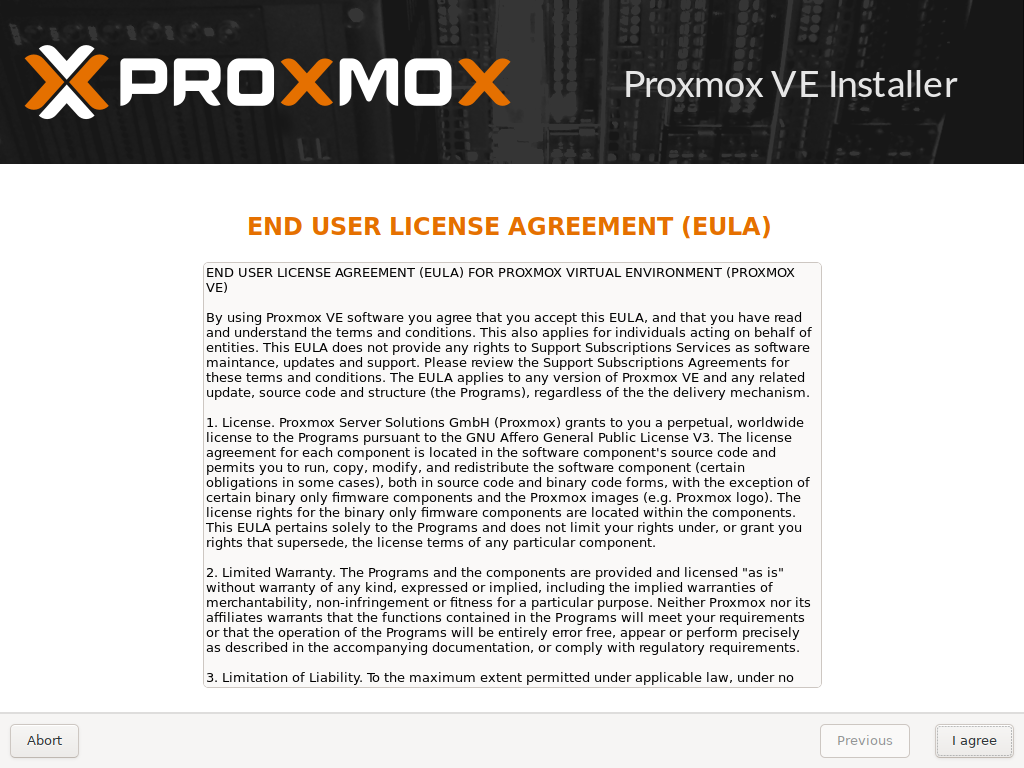
If the above is not an option/real server here is how you navigate the installer blindly:
EULA Screen:
"Tab" * 2
Hit "Enter"
Target Hard Disk Screen:
Hit "Enter"
*If you need to change the target HDD hit tab twice and then enter to select the disk and then Tab 3 times and enter
Location and Timezone Screen:
Hit "Tab" 5 times and then hit "Enter"
Admin Password and E-mail Address:
Enter password and then hit "Tab"
Enter password again and then hit "Tab"
Enter e-mail and then hit "Tab" twice and "Enter"
Management and Network Config:
Enter hostname and hit "Enter"
Enter IP and hit "Tab"
Enter CIDR (eg. /24) and hit "Tab"
Enter Gateway and hit "Enter"
Enter DNS server and hit "Enter"
"Tab" Twice
Hit "Enter"
Summary Screen
Hit "Enter" to install
Alternative Way
Each line applies to the respective screen.
- alt + g
- alt + n
- alt + n
- alt + n
- alt + n
- enter
configure.ac:75: error: possibly undefined macro: AC_PROG_LIBTOOL If this token and others are legitimate, please use m4_pattern_allow. See the Autoconf documentation. solution
configure.ac:75: error: possibly undefined macro: AC_PROG_LIBTOOL
If this token and others are legitimate, please use m4_pattern_allow.
See the Autoconf documentation.
autoreconf: /usr/bin/autoconf failed with exit status: 1
make: *** [/software/pixman/configure] Error 1
make: *** Deleting file `/software/pixman/configure'
yum install libtool
or on Debian
apt install libtool
Can't exec "aclocal": No such file or directory at /usr/share/autoconf/Autom4te/FileUtils.pm line 326. autoreconf: failed to run aclocal: No such file or directory solution
autoreconf: Entering directory `.'
autoreconf: configure.ac: not using Gettext
autoreconf: running: aclocal --output=aclocal.m4t
Can't exec "aclocal": No such file or directory at /usr/share/autoconf/Autom4te/FileUtils.pm line 326.
autoreconf: failed to run aclocal: No such file or directory
make: *** [/software/pixman/configure] Error 1
Just install automake:
yum install automake
or on Debian
apt install automake
/bin/sh: autoreconf: command not found solution
This means the autoconf package is not installed, so we'll install it:
/bin/sh: autoreconf: command not found
yum install autoconf
On Debian
apt install autoconf
glib-2.0 required to compile QEMU solution
./configure
glib-2.0 required to compile QEMU
yum install glib2 glib2-devel
or on Debian/Ubuntu based:
apt install libglib2 libglib2-dev
How To Upgrade Debian 8,9,10 to Debian 12 Bookworm
Step 1.) Upgrade to Debian 11 first
Step 2.) Update sources.list
Update your /etc/apt/sources.list like this:
deb http://deb.debian.org/debian bookworm main
deb-src http://deb.debian.org/debian bookworm main
deb http://deb.debian.org/debian-security/ bookworm-security main
deb-src http://deb.debian.org/debian-security/ bookworm-security main
deb http://deb.debian.org/debian bookworm-updates main
deb-src http://deb.debian.org/debian bookworm-updates main
Step 3.) Add The GPG Keys
How To Get the Bookworm GPG Keys:
A list for all Debian keys is here: https://ftp-master.debian.org/keys.html
wget https://ftp-master.debian.org/keys/archive-key-12.asc -P /etc/apt/trusted.gpg.d
wget https://ftp-master.debian.org/keys/archive-key-12-security.asc -P /etc/apt/trusted.gpg.d
Step 4.) Update apt & Upgrade
apt update
apt dist-upgrade
After you are successful, you should reboot and confirm it looks good like this:
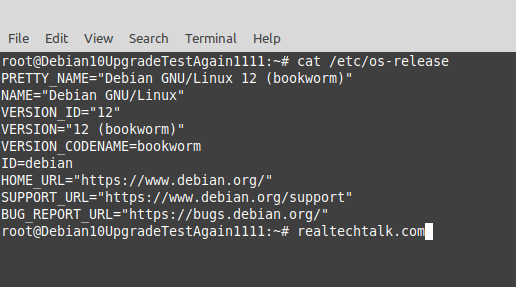
root@Debian10UpgradeTestAgain1111:/etc/apt# apt dist-upgrade
Reading package lists... Done
Building dependency tree... Done
Reading state information... Done
Calculating upgrade... Done
The following packages were automatically installed and are no longer required:
bsdmainutils libbpf0 libcbor0 libdns-export1110 libffi7 libisc-export1105 libldap-2.4-2 libmpdec2 libmpdec3 libperl5.32 libprocps8 libpython3.7-minimal libpython3.7-stdlib libpython3.9-minimal
libpython3.9-stdlib libreadline7 libusb-0.1-4 perl-modules-5.32 python3.7 python3.7-minimal python3.9 python3.9-minimal usb.ids
Use 'apt autoremove' to remove them.
The following packages will be REMOVED:
libsemanage1
The following NEW packages will be installed:
cron-daemon-common dbus-bin dbus-daemon dbus-session-bus-common dbus-system-bus-common dbus-user-session gcc-12-base libbpf1 libcbor0.8 libffi8 libfile-find-rule-perl libldap-2.5-0 libnumber-compare-perl
libperl5.36 libproc2-0 libpython3.11-minimal libpython3.11-stdlib libsemanage2 libsepol2 libssl3 libsystemd-shared libtext-glob-perl linux-image-6.1.0-13-amd64 perl-modules-5.36 python3-charset-normalizer
python3-pyparsing python3.11 python3.11-minimal usrmerge util-linux-extra zstd
The following packages will be upgraded:
adduser apparmor apt apt-utils base-files base-passwd bash bash-completion bsdextrautils bsdmainutils bsdutils busybox bzip2 ca-certificates console-setup console-setup-linux coreutils cpio cron dash dbus
debconf debconf-i18n debian-archive-keyring debianutils diffutils discover discover-data distro-info-data dmidecode dmsetup dpkg e2fsprogs eject fdisk file findutils gdbm-l10n gettext-base gpgv grep
grub-common grub-pc grub-pc-bin grub2-common gzip hostname ifupdown init init-system-helpers initramfs-tools initramfs-tools-core installation-report iproute2 iptables iputils-ping isc-dhcp-client
isc-dhcp-common kbd keyboard-configuration klibc-utils kmod less libacl1 libapparmor1 libapt-pkg6.0 libargon2-1 libattr1 libaudit-common libaudit1 libblkid1 libbrotli1 libbsd0 libbz2-1.0 libc-bin
libc-l10n libc6 libcap-ng0 libcap2 libcap2-bin libcom-err2 libcrypt1 libcryptsetup12 libcurl3-gnutls libdb5.3 libdbus-1-3 libdebconfclient0 libdevmapper1.02.1 libdiscover2 libedit2 libelf1 libestr0
libexpat1 libext2fs2 libfastjson4 libfdisk1 libfido2-1 libfreetype6 libfuse2 libgcc-s1 libgcrypt20 libgdbm-compat4 libgdbm6 libgmp10 libgnutls30 libgpg-error0 libgssapi-krb5-2 libhogweed6 libidn2-0
libip4tc2 libip6tc2 libiptc0 libjson-c5 libk5crypto3 libkeyutils1 libklibc libkmod2 libkrb5-3 libkrb5support0 libldap-common liblocale-gettext-perl liblognorm5 liblz4-1 liblzma5 libmagic-mgc libmagic1
libmd0 libmount1 libncurses6 libncursesw6 libnetfilter-conntrack3 libnettle8 libnewt0.52 libnfnetlink0 libnftnl11 libnghttp2-14 libnss-systemd libp11-kit0 libpam-modules libpam-modules-bin libpam-runtime
libpam-systemd libpam0g libpci3 libpcre2-8-0 libpcre3 libpng16-16 libpopt0 libpsl5 libpython3-stdlib libreadline8 libsasl2-2 libsasl2-modules-db libseccomp2 libselinux1 libsemanage-common libslang2
libsmartcols1 libsqlite3-0 libss2 libssh2-1 libstdc++6 libsystemd0 libtasn1-6 libtext-charwidth-perl libtext-iconv-perl libtext-wrapi18n-perl libtinfo6 libtirpc-common libtirpc3 libudev1 libunistring2
libusb-1.0-0 libuuid1 libwrap0 libx11-6 libx11-data libxcb1 libxext6 libxmuu1 libxtables12 libxxhash0 libzstd1 linux-base linux-image-amd64 locales login logrotate logsave lsb-base mailcap manpages mawk
media-types mount nano ncal ncurses-base ncurses-bin ncurses-term netbase openssh-client openssh-server openssh-sftp-server openssl os-prober passwd pci.ids pciutils perl perl-base procps
python-apt-common python3 python3-apt python3-certifi python3-chardet python3-debian python3-debianbts python3-httplib2 python3-idna python3-minimal python3-pkg-resources python3-pycurl
python3-pysimplesoap python3-reportbug python3-requests python3-six python3-urllib3 readline-common reportbug rsyslog runit-helper sed sensible-utils systemd systemd-sysv systemd-timesyncd sysvinit-utils
tar tasksel tasksel-data tzdata ucf udev usb.ids usbutils util-linux vim-common vim-tiny wget whiptail xauth xkb-data xxd xz-utils zlib1g
257 upgraded, 31 newly installed, 1 to remove and 0 not upgraded.
Need to get 164 MB of archives.
After this operation, 500 MB of additional disk space will be used.
Do you want to continue? [Y/n] y
Get:1 http://deb.debian.org/debian bookworm/main amd64 base-files amd64 12.4+deb12u2 [70.7 kB]
Get:2 http://deb.debian.org/debian-security bookworm-security/main amd64 libc-l10n all 2.36-9+deb12u3 [674 kB]
Get:3 http://deb.debian.org/debian-security bookworm-security/main amd64 locales all 2.36-9+deb12u3 [3,904 kB]
Get:4 http://deb.debian.org/debian-security bookworm-security/main amd64 libc6 amd64 2.36-9+deb12u3 [2,755 kB]
Get:5 http://deb.debian.org/debian-security bookworm-security/main amd64 libc-bin amd64 2.36-9+deb12u3 [606 kB]
Get:6 http://deb.debian.org/debian bookworm/main amd64 perl-modules-5.36 all 5.36.0-7 [2,815 kB]
Get:7 http://deb.debian.org/debian bookworm/main amd64 libgdbm6 amd64 1.23-3 [72.2 kB]
Get:8 http://deb.debian.org/debian bookworm/main amd64 libperl5.36 amd64 5.36.0-7 [4,218 kB]
Get:9 http://deb.debian.org/debian bookworm/main amd64 perl amd64 5.36.0-7 [239 kB]
Get:10 http://deb.debian.org/debian bookworm/main amd64 perl-base amd64 5.36.0-7 [1,608 kB]
Get:11 http://deb.debian.org/debian bookworm/main amd64 liblocale-gettext-perl amd64 1.07-5 [15.4 kB]
Get:12 http://deb.debian.org/debian bookworm/main amd64 libtext-iconv-perl amd64 1.7-8 [14.5 kB]
Get:13 http://deb.debian.org/debian bookworm/main amd64 libtext-charwidth-perl amd64 0.04-11 [9,496 B]
Get:14 http://deb.debian.org/debian bookworm/main amd64 bzip2 amd64 1.0.8-5+b1 [49.8 kB]
Get:15 http://deb.debian.org/debian bookworm/main amd64 libbz2-1.0 amd64 1.0.8-5+b1 [47.3 kB]
Get:16 http://deb.debian.org/debian bookworm/main amd64 libaudit-common all 1:3.0.9-1 [10.4 kB]
Get:17 http://deb.debian.org/debian bookworm/main amd64 libcap-ng0 amd64 0.8.3-1+b3 [17.1 kB]
Get:18 http://deb.debian.org/debian bookworm/main amd64 libaudit1 amd64 1:3.0.9-1 [46.8 kB]
Get:19 http://deb.debian.org/debian bookworm/main amd64 libpam0g amd64 1.5.2-6+deb12u1 [92.0 kB]
Get:20 http://deb.debian.org/debian bookworm/main amd64 libcrypt1 amd64 1:4.4.33-2 [89.5 kB]
Get:21 http://deb.debian.org/debian bookworm/main amd64 libdb5.3 amd64 5.3.28+dfsg2-1 [697 kB]
Get:22 http://deb.debian.org/debian bookworm/main amd64 libgdbm-compat4 amd64 1.23-3 [48.2 kB]
Get:23 http://deb.debian.org/debian bookworm/main amd64 zlib1g amd64 1:1.2.13.dfsg-1 [86.7 kB]
Get:24 http://deb.debian.org/debian bookworm/main amd64 libtext-wrapi18n-perl all 0.06-10 [8,808 B]
Get:25 http://deb.debian.org/debian bookworm/main amd64 debconf-i18n all 1.5.82 [208 kB]
Get:26 http://deb.debian.org/debian bookworm/main amd64 debconf all 1.5.82 [121 kB]
Get:27 http://deb.debian.org/debian bookworm/main amd64 gcc-12-base amd64 12.2.0-14 [37.5 kB]
Get:28 http://deb.debian.org/debian bookworm/main amd64 libgcc-s1 amd64 12.2.0-14 [49.9 kB]
Get:29 http://deb.debian.org/debian bookworm/main amd64 libsemanage-common all 3.4-1 [21.6 kB]
Get:30 http://deb.debian.org/debian bookworm/main amd64 libselinux1 amd64 3.4-1+b6 [73.7 kB]
Get:31 http://deb.debian.org/debian bookworm/main amd64 libsepol2 amd64 3.4-2.1 [276 kB]
Get:32 http://deb.debian.org/debian bookworm/main amd64 libsemanage2 amd64 3.4-1+b5 [89.9 kB]
Get:33 http://deb.debian.org/debian bookworm/main amd64 passwd amd64 1:4.13+dfsg1-1+b1 [972 kB]
Get:34 http://deb.debian.org/debian bookworm/main amd64 libpcre2-8-0 amd64 10.42-1 [261 kB]
Get:35 http://deb.debian.org/debian bookworm/main amd64 libpam-modules-bin amd64 1.5.2-6+deb12u1 [75.6 kB]
Get:36 http://deb.debian.org/debian bookworm/main amd64 libpam-modules amd64 1.5.2-6+deb12u1 [291 kB]
Get:37 http://deb.debian.org/debian bookworm/main amd64 adduser all 3.134 [183 kB]
Get:38 http://deb.debian.org/debian bookworm/main amd64 libelf1 amd64 0.188-2.1 [174 kB]
Get:39 http://deb.debian.org/debian bookworm/main amd64 libbpf1 amd64 1:1.1.0-1 [145 kB]
Get:40 http://deb.debian.org/debian bookworm/main amd64 libmd0 amd64 1.0.4-2 [29.5 kB]
Get:41 http://deb.debian.org/debian bookworm/main amd64 libbsd0 amd64 0.11.7-2 [117 kB]
Get:42 http://deb.debian.org/debian bookworm/main amd64 libcap2 amd64 1:2.66-4 [27.0 kB]
Get:43 http://deb.debian.org/debian bookworm/main amd64 libtirpc-common all 1.3.3+ds-1 [14.0 kB]
Get:44 http://deb.debian.org/debian-security bookworm-security/main amd64 libssl3 amd64 3.0.11-1~deb12u2 [2,019 kB]
Get:45 http://deb.debian.org/debian bookworm/main amd64 libcom-err2 amd64 1.47.0-2 [19.8 kB]
Get:46 http://deb.debian.org/debian bookworm/main amd64 libkeyutils1 amd64 1.6.3-2 [8,808 B]
Get:47 http://deb.debian.org/debian bookworm/main amd64 libk5crypto3 amd64 1.20.1-2+deb12u1 [78.9 kB]
Get:48 http://deb.debian.org/debian bookworm/main amd64 libgssapi-krb5-2 amd64 1.20.1-2+deb12u1 [134 kB]
Get:49 http://deb.debian.org/debian bookworm/main amd64 libkrb5support0 amd64 1.20.1-2+deb12u1 [32.4 kB]
Get:50 http://deb.debian.org/debian bookworm/main amd64 libkrb5-3 amd64 1.20.1-2+deb12u1 [332 kB]
Get:51 http://deb.debian.org/debian bookworm/main amd64 libtirpc3 amd64 1.3.3+ds-1 [85.2 kB]
Get:52 http://deb.debian.org/debian bookworm/main amd64 libiptc0 amd64 1.8.9-2 [7,032 B]
Get:53 http://deb.debian.org/debian bookworm/main amd64 libxtables12 amd64 1.8.9-2 [30.8 kB]
Get:54 http://deb.debian.org/debian bookworm/main amd64 iptables amd64 1.8.9-2 [360 kB]
Get:55 http://deb.debian.org/debian bookworm/main amd64 libip4tc2 amd64 1.8.9-2 [19.0 kB]
Get:56 http://deb.debian.org/debian bookworm/main amd64 libip6tc2 amd64 1.8.9-2 [19.4 kB]
Get:57 http://deb.debian.org/debian bookworm/main amd64 libnfnetlink0 amd64 1.0.2-2 [15.1 kB]
Get:58 http://deb.debian.org/debian bookworm/main amd64 netbase all 6.4 [12.8 kB]
Get:59 http://deb.debian.org/debian bookworm/main amd64 libnetfilter-conntrack3 amd64 1.0.9-3 [40.7 kB]
Get:60 http://deb.debian.org/debian bookworm/main amd64 libnftnl11 amd64 1.2.4-2 [61.6 kB]
Get:61 http://deb.debian.org/debian bookworm/main amd64 libcap2-bin amd64 1:2.66-4 [34.7 kB]
Get:62 http://deb.debian.org/debian bookworm/main amd64 iproute2 amd64 6.1.0-3 [1,046 kB]
Get:63 http://deb.debian.org/debian bookworm/main amd64 ifupdown amd64 0.8.41 [62.1 kB]
Get:64 http://deb.debian.org/debian bookworm/main amd64 debianutils amd64 5.7-0.5~deb12u1 [103 kB]
Get:65 http://deb.debian.org/debian bookworm/main amd64 bash amd64 5.2.15-2+b2 [1,491 kB]
Get:66 http://deb.debian.org/debian bookworm/main amd64 bsdutils amd64 1:2.38.1-5+b1 [94.4 kB]
Get:67 http://deb.debian.org/debian bookworm/main amd64 libgmp10 amd64 2:6.2.1+dfsg1-1.1 [563 kB]
Get:68 http://deb.debian.org/debian bookworm/main amd64 coreutils amd64 9.1-1 [2,897 kB]
Get:69 http://deb.debian.org/debian bookworm/main amd64 liblzma5 amd64 5.4.1-0.2 [205 kB]
Get:70 http://deb.debian.org/debian bookworm/main amd64 libzstd1 amd64 1.5.4+dfsg2-5 [290 kB]
Get:71 http://deb.debian.org/debian bookworm/main amd64 tar amd64 1.34+dfsg-1.2 [836 kB]
Get:72 http://deb.debian.org/debian bookworm/main amd64 dpkg amd64 1.21.22 [1,567 kB]
Get:73 http://deb.debian.org/debian bookworm/main amd64 dash amd64 0.5.12-2 [91.8 kB]
Get:74 http://deb.debian.org/debian bookworm/main amd64 diffutils amd64 1:3.8-4 [352 kB]
Get:75 http://deb.debian.org/debian bookworm/main amd64 findutils amd64 4.9.0-4 [636 kB]
Get:76 http://deb.debian.org/debian bookworm/main amd64 grep amd64 3.8-5 [421 kB]
Get:77 http://deb.debian.org/debian bookworm/main amd64 gzip amd64 1.12-1 [140 kB]
Get:78 http://deb.debian.org/debian bookworm/main amd64 hostname amd64 3.23+nmu1 [10.5 kB]
Get:79 http://deb.debian.org/debian bookworm/main amd64 login amd64 1:4.13+dfsg1-1+b1 [616 kB]
Get:80 http://deb.debian.org/debian bookworm/main amd64 libncurses6 amd64 6.4-4 [103 kB]
Get:81 http://deb.debian.org/debian bookworm/main amd64 libncursesw6 amd64 6.4-4 [134 kB]
Get:82 http://deb.debian.org/debian bookworm/main amd64 libtinfo6 amd64 6.4-4 [331 kB]
Get:83 http://deb.debian.org/debian bookworm/main amd64 ncurses-bin amd64 6.4-4 [421 kB]
Get:84 http://deb.debian.org/debian bookworm/main amd64 sed amd64 4.9-1 [329 kB]
Get:85 http://deb.debian.org/debian bookworm/main amd64 libblkid1 amd64 2.38.1-5+b1 [147 kB]
Get:86 http://deb.debian.org/debian bookworm/main amd64 libmount1 amd64 2.38.1-5+b1 [166 kB]
Get:87 http://deb.debian.org/debian bookworm/main amd64 libsmartcols1 amd64 2.38.1-5+b1 [107 kB]
Get:88 http://deb.debian.org/debian bookworm/main amd64 libfdisk1 amd64 2.38.1-5+b1 [194 kB]
Get:89 http://deb.debian.org/debian bookworm/main amd64 fdisk amd64 2.38.1-5+b1 [142 kB]
Get:90 http://deb.debian.org/debian bookworm/main amd64 util-linux-extra amd64 2.38.1-5+b1 [111 kB]
Get:91 http://deb.debian.org/debian bookworm/main amd64 util-linux amd64 2.38.1-5+b1 [1,177 kB]
Get:92 http://deb.debian.org/debian bookworm/main amd64 libuuid1 amd64 2.38.1-5+b1 [28.8 kB]
Get:93 http://deb.debian.org/debian bookworm/main amd64 readline-common all 8.2-1.3 [69.0 kB]
Get:94 http://deb.debian.org/debian bookworm/main amd64 libreadline8 amd64 8.2-1.3 [166 kB]
Get:95 http://deb.debian.org/debian bookworm/main amd64 libgpg-error0 amd64 1.46-1 [76.9 kB]
Get:96 http://deb.debian.org/debian bookworm/main amd64 libgcrypt20 amd64 1.10.1-3 [696 kB]
Get:97 http://deb.debian.org/debian bookworm/main amd64 libstdc++6 amd64 12.2.0-14 [614 kB]
Get:98 http://deb.debian.org/debian bookworm/main amd64 liblz4-1 amd64 1.9.4-1 [62.9 kB]
Get:99 http://deb.debian.org/debian bookworm/main amd64 libargon2-1 amd64 0~20171227-0.3+deb12u1 [19.4 kB]
Get:100 http://deb.debian.org/debian bookworm/main amd64 dmsetup amd64 2:1.02.185-2 [82.0 kB]
Get:101 http://deb.debian.org/debian bookworm/main amd64 libacl1 amd64 2.3.1-3 [31.5 kB]
Get:102 http://deb.debian.org/debian bookworm/main amd64 kmod amd64 30+20221128-1 [95.2 kB]
Get:103 http://deb.debian.org/debian bookworm/main amd64 libkmod2 amd64 30+20221128-1 [57.9 kB]
Get:104 http://deb.debian.org/debian bookworm/main amd64 less amd64 590-2 [131 kB]
Get:105 http://deb.debian.org/debian bookworm/main amd64 libnss-systemd amd64 252.17-1~deb12u1 [163 kB]
Get:106 http://deb.debian.org/debian bookworm/main amd64 systemd-timesyncd amd64 252.17-1~deb12u1 [62.9 kB]
Get:107 http://deb.debian.org/debian bookworm/main amd64 libpam-systemd amd64 252.17-1~deb12u1 [224 kB]
Get:108 http://deb.debian.org/debian bookworm/main amd64 systemd amd64 252.17-1~deb12u1 [3,029 kB]
Get:109 http://deb.debian.org/debian bookworm/main amd64 udev amd64 252.17-1~deb12u1 [1,643 kB]
Get:110 http://deb.debian.org/debian bookworm/main amd64 libudev1 amd64 252.17-1~deb12u1 [108 kB]
Get:111 http://deb.debian.org/debian bookworm/main amd64 libdevmapper1.02.1 amd64 2:1.02.185-2 [133 kB]
Get:112 http://deb.debian.org/debian bookworm/main amd64 libjson-c5 amd64 0.16-2 [44.1 kB]
Get:113 http://deb.debian.org/debian bookworm/main amd64 libcryptsetup12 amd64 2:2.6.1-4~deb12u1 [223 kB]
Get:114 http://deb.debian.org/debian bookworm/main amd64 libapparmor1 amd64 3.0.8-3 [41.2 kB]
Get:115 http://deb.debian.org/debian bookworm/main amd64 libseccomp2 amd64 2.5.4-1+b3 [46.6 kB]
Get:116 http://deb.debian.org/debian bookworm/main amd64 libsystemd-shared amd64 252.17-1~deb12u1 [1,691 kB]
Get:117 http://deb.debian.org/debian bookworm/main amd64 libpam-runtime all 1.5.2-6+deb12u1 [161 kB]
Get:118 http://deb.debian.org/debian bookworm/main amd64 dbus amd64 1.14.10-1~deb12u1 [97.4 kB]
Get:119 http://deb.debian.org/debian bookworm/main amd64 libdbus-1-3 amd64 1.14.10-1~deb12u1 [201 kB]
Get:120 http://deb.debian.org/debian bookworm/main amd64 dbus-bin amd64 1.14.10-1~deb12u1 [105 kB]
Get:121 http://deb.debian.org/debian bookworm/main amd64 dbus-session-bus-common all 1.14.10-1~deb12u1 [78.2 kB]
Get:122 http://deb.debian.org/debian bookworm/main amd64 libexpat1 amd64 2.5.0-1 [99.3 kB]
Get:123 http://deb.debian.org/debian bookworm/main amd64 dbus-daemon amd64 1.14.10-1~deb12u1 [184 kB]
Get:124 http://deb.debian.org/debian bookworm/main amd64 dbus-system-bus-common all 1.14.10-1~deb12u1 [79.3 kB]
Get:125 http://deb.debian.org/debian bookworm/main amd64 systemd-sysv amd64 252.17-1~deb12u1 [41.8 kB]
Get:126 http://deb.debian.org/debian bookworm/main amd64 libffi8 amd64 3.4.4-1 [22.9 kB]
Get:127 http://deb.debian.org/debian bookworm/main amd64 libp11-kit0 amd64 0.24.1-2 [345 kB]
Get:128 http://deb.debian.org/debian bookworm/main amd64 mount amd64 2.38.1-5+b1 [134 kB]
Get:129 http://deb.debian.org/debian bookworm/main amd64 libsystemd0 amd64 252.17-1~deb12u1 [331 kB]
Get:130 http://deb.debian.org/debian bookworm/main amd64 libxxhash0 amd64 0.8.1-1 [27.6 kB]
Get:131 http://deb.debian.org/debian bookworm/main amd64 libapt-pkg6.0 amd64 2.6.1 [907 kB]
Get:132 http://deb.debian.org/debian bookworm/main amd64 libnettle8 amd64 3.8.1-2 [288 kB]
Get:133 http://deb.debian.org/debian bookworm/main amd64 libhogweed6 amd64 3.8.1-2 [328 kB]
Get:134 http://deb.debian.org/debian bookworm/main amd64 libunistring2 amd64 1.0-2 [437 kB]
Get:135 http://deb.debian.org/debian bookworm/main amd64 libidn2-0 amd64 2.3.3-1+b1 [124 kB]
Get:136 http://deb.debian.org/debian bookworm/main amd64 libtasn1-6 amd64 4.19.0-2 [56.6 kB]
Get:137 http://deb.debian.org/debian bookworm/main amd64 libgnutls30 amd64 3.7.9-2 [1,403 kB]
Get:138 http://deb.debian.org/debian bookworm/main amd64 apt amd64 2.6.1 [1,373 kB]
Get:139 http://deb.debian.org/debian bookworm/main amd64 apt-utils amd64 2.6.1 [309 kB]
Get:140 http://deb.debian.org/debian bookworm/main amd64 gpgv amd64 2.2.40-1.1 [648 kB]
Get:141 http://deb.debian.org/debian bookworm/main amd64 debian-archive-keyring all 2023.3+deb12u1 [161 kB]
Get:142 http://deb.debian.org/debian bookworm/main amd64 libdebconfclient0 amd64 0.270 [9,900 B]
Get:143 http://deb.debian.org/debian bookworm/main amd64 base-passwd amd64 3.6.1 [60.0 kB]
Get:144 http://deb.debian.org/debian bookworm/main amd64 libnumber-compare-perl all 0.03-3 [6,332 B]
Get:145 http://deb.debian.org/debian bookworm/main amd64 libtext-glob-perl all 0.11-3 [7,676 B]
Get:146 http://deb.debian.org/debian bookworm/main amd64 libfile-find-rule-perl all 0.34-3 [26.6 kB]
Get:147 http://deb.debian.org/debian bookworm/main amd64 usrmerge all 35 [12.5 kB]
Get:148 http://deb.debian.org/debian bookworm/main amd64 init-system-helpers all 1.65.2 [49.8 kB]
Get:149 http://deb.debian.org/debian bookworm/main amd64 vim-tiny amd64 2:9.0.1378-2 [720 kB]
Get:150 http://deb.debian.org/debian bookworm/main amd64 xxd amd64 2:9.0.1378-2 [83.7 kB]
Get:151 http://deb.debian.org/debian bookworm/main amd64 vim-common all 2:9.0.1378-2 [124 kB]
Get:152 http://deb.debian.org/debian bookworm/main amd64 ncurses-base all 6.4-4 [261 kB]
Get:153 http://deb.debian.org/debian bookworm/main amd64 xkb-data all 2.35.1-1 [764 kB]
Get:154 http://deb.debian.org/debian bookworm/main amd64 kbd amd64 2.5.1-1+b1 [335 kB]
Get:155 http://deb.debian.org/debian bookworm/main amd64 console-setup-linux all 1.221 [1,882 kB]
Get:156 http://deb.debian.org/debian bookworm/main amd64 console-setup all 1.221 [102 kB]
Get:157 http://deb.debian.org/debian bookworm/main amd64 keyboard-configuration all 1.221 [416 kB]
Get:158 http://deb.debian.org/debian bookworm/main amd64 sysvinit-utils amd64 3.06-4 [31.0 kB]
Get:159 http://deb.debian.org/debian bookworm/main amd64 lsb-base all 11.6 [4,584 B]
Get:160 http://deb.debian.org/debian bookworm/main amd64 logsave amd64 1.47.0-2 [19.6 kB]
Get:161 http://deb.debian.org/debian bookworm/main amd64 klibc-utils amd64 2.0.12-1 [94.9 kB]
Get:162 http://deb.debian.org/debian bookworm/main amd64 busybox amd64 1:1.35.0-4+b3 [452 kB]
Get:163 http://deb.debian.org/debian bookworm/main amd64 initramfs-tools all 0.142 [72.9 kB]
Get:164 http://deb.debian.org/debian bookworm/main amd64 initramfs-tools-core all 0.142 [105 kB]
Get:165 http://deb.debian.org/debian bookworm/main amd64 libext2fs2 amd64 1.47.0-2 [205 kB]
Get:166 http://deb.debian.org/debian bookworm/main amd64 e2fsprogs amd64 1.47.0-2 [571 kB]
Get:167 http://deb.debian.org/debian bookworm/main amd64 libklibc amd64 2.0.12-1 [44.2 kB]
Get:168 http://deb.debian.org/debian bookworm/main amd64 linux-base all 4.9 [31.8 kB]
Get:169 http://deb.debian.org/debian bookworm/main amd64 cpio amd64 2.13+dfsg-7.1 [245 kB]
Get:170 http://deb.debian.org/debian bookworm/main amd64 cron-daemon-common all 3.0pl1-162 [12.7 kB]
Get:171 http://deb.debian.org/debian bookworm/main amd64 cron amd64 3.0pl1-162 [73.1 kB]
Get:172 http://deb.debian.org/debian bookworm/main amd64 sensible-utils all 0.0.17+nmu1 [19.0 kB]
Get:173 http://deb.debian.org/debian bookworm/main amd64 init amd64 1.65.2 [16.8 kB]
Get:174 http://deb.debian.org/debian bookworm/main amd64 libedit2 amd64 3.1-20221030-2 [93.0 kB]
Get:175 http://deb.debian.org/debian bookworm/main amd64 libcbor0.8 amd64 0.8.0-2+b1 [27.4 kB]
Get:176 http://deb.debian.org/debian bookworm/main amd64 libfido2-1 amd64 1.12.0-2+b1 [77.2 kB]
Get:177 http://deb.debian.org/debian bookworm/main amd64 openssh-sftp-server amd64 1:9.2p1-2+deb12u1 [65.8 kB]
Get:178 http://deb.debian.org/debian bookworm/main amd64 openssh-server amd64 1:9.2p1-2+deb12u1 [455 kB]
Get:179 http://deb.debian.org/debian bookworm/main amd64 openssh-client amd64 1:9.2p1-2+deb12u1 [989 kB]
Get:180 http://deb.debian.org/debian bookworm/main amd64 libproc2-0 amd64 2:4.0.2-3 [62.8 kB]
Get:181 http://deb.debian.org/debian bookworm/main amd64 procps amd64 2:4.0.2-3 [709 kB]
Get:182 http://deb.debian.org/debian bookworm/main amd64 ucf all 3.0043+nmu1 [55.2 kB]
Get:183 http://deb.debian.org/debian bookworm/main amd64 runit-helper all 2.15.2 [6,520 B]
Get:184 http://deb.debian.org/debian bookworm/main amd64 libwrap0 amd64 7.6.q-32 [54.9 kB]
Get:185 http://deb.debian.org/debian bookworm/main amd64 libpython3.11-minimal amd64 3.11.2-6 [813 kB]
Get:186 http://deb.debian.org/debian bookworm/main amd64 python3.11-minimal amd64 3.11.2-6 [2,064 kB]
Get:187 http://deb.debian.org/debian bookworm/main amd64 python3-pycurl amd64 7.45.2-3 [67.7 kB]
Get:188 http://deb.debian.org/debian bookworm/main amd64 python3-apt amd64 2.6.0 [159 kB]
Get:189 http://deb.debian.org/debian bookworm/main amd64 python3-minimal amd64 3.11.2-1+b1 [26.3 kB]
Get:190 http://deb.debian.org/debian bookworm/main amd64 python3 amd64 3.11.2-1+b1 [26.3 kB]
Get:191 http://deb.debian.org/debian bookworm/main amd64 libbrotli1 amd64 1.0.9-2+b6 [275 kB]
Get:192 http://deb.debian.org/debian bookworm/main amd64 libsasl2-modules-db amd64 2.1.28+dfsg-10 [20.3 kB]
Get:193 http://deb.debian.org/debian bookworm/main amd64 libsasl2-2 amd64 2.1.28+dfsg-10 [59.7 kB]
Get:194 http://deb.debian.org/debian bookworm/main amd64 libldap-2.5-0 amd64 2.5.13+dfsg-5 [183 kB]
Get:195 http://deb.debian.org/debian-security bookworm-security/main amd64 libnghttp2-14 amd64 1.52.0-1+deb12u1 [72.4 kB]
Get:196 http://deb.debian.org/debian bookworm/main amd64 libpsl5 amd64 0.21.2-1 [58.7 kB]
Get:197 http://deb.debian.org/debian bookworm/main amd64 libssh2-1 amd64 1.10.0-3+b1 [179 kB]
Get:198 http://deb.debian.org/debian-security bookworm-security/main amd64 libcurl3-gnutls amd64 7.88.1-10+deb12u4 [385 kB]
Get:199 http://deb.debian.org/debian bookworm/main amd64 python-apt-common all 2.6.0 [64.3 kB]
Get:200 http://deb.debian.org/debian bookworm/main amd64 distro-info-data all 0.58 [5,848 B]
Get:201 http://deb.debian.org/debian bookworm/main amd64 media-types all 10.0.0 [26.1 kB]
Get:202 http://deb.debian.org/debian bookworm/main amd64 libsqlite3-0 amd64 3.40.1-2 [837 kB]
Get:203 http://deb.debian.org/debian bookworm/main amd64 libpython3.11-stdlib amd64 3.11.2-6 [1,796 kB]
Get:204 http://deb.debian.org/debian bookworm/main amd64 python3.11 amd64 3.11.2-6 [572 kB]
Get:205 http://deb.debian.org/debian bookworm/main amd64 libpython3-stdlib amd64 3.11.2-1+b1 [9,312 B]
Get:206 http://deb.debian.org/debian bookworm/main amd64 tasksel-data all 3.73 [18.0 kB]
Get:207 http://deb.debian.org/debian bookworm/main amd64 tasksel all 3.73 [51.2 kB]
Get:208 http://deb.debian.org/debian bookworm/main amd64 libattr1 amd64 1:2.5.1-4 [22.2 kB]
Get:209 http://deb.debian.org/debian bookworm/main amd64 libpcre3 amd64 2:8.39-15 [341 kB]
Get:210 http://deb.debian.org/debian bookworm/main amd64 mawk amd64 1.3.4.20200120-3.1 [119 kB]
Get:211 http://deb.debian.org/debian bookworm/main amd64 tzdata all 2023c-5 [296 kB]
Get:212 http://deb.debian.org/debian bookworm/main amd64 dmidecode amd64 3.4-1 [68.8 kB]
Get:213 http://deb.debian.org/debian bookworm/main amd64 iputils-ping amd64 3:20221126-1 [47.1 kB]
Get:214 http://deb.debian.org/debian bookworm/main amd64 isc-dhcp-client amd64 4.4.3-P1-2 [1,096 kB]
Get:215 http://deb.debian.org/debian bookworm/main amd64 isc-dhcp-common amd64 4.4.3-P1-2 [117 kB]
Get:216 http://deb.debian.org/debian bookworm/main amd64 libpopt0 amd64 1.19+dfsg-1 [43.3 kB]
Get:217 http://deb.debian.org/debian bookworm/main amd64 logrotate amd64 3.21.0-1 [62.1 kB]
Get:218 http://deb.debian.org/debian bookworm/main amd64 nano amd64 7.2-1 [689 kB]
Get:219 http://deb.debian.org/debian bookworm/main amd64 ncurses-term all 6.4-4 [501 kB]
Get:220 http://deb.debian.org/debian bookworm/main amd64 libslang2 amd64 2.3.3-3 [554 kB]
Get:221 http://deb.debian.org/debian bookworm/main amd64 libnewt0.52 amd64 0.52.23-1+b1 [59.2 kB]
Get:222 http://deb.debian.org/debian bookworm/main amd64 whiptail amd64 0.52.23-1+b1 [24.2 kB]
Get:223 http://deb.debian.org/debian bookworm/main amd64 bash-completion all 1:2.11-6 [234 kB]
Get:224 http://deb.debian.org/debian-security bookworm-security/main amd64 openssl amd64 3.0.11-1~deb12u2 [1,419 kB]
Get:225 http://deb.debian.org/debian bookworm/main amd64 ca-certificates all 20230311 [153 kB]
Get:226 http://deb.debian.org/debian bookworm/main amd64 file amd64 1:5.44-3 [42.5 kB]
Get:227 http://deb.debian.org/debian bookworm/main amd64 libmagic1 amd64 1:5.44-3 [104 kB]
Get:228 http://deb.debian.org/debian bookworm/main amd64 libmagic-mgc amd64 1:5.44-3 [305 kB]
Get:229 http://deb.debian.org/debian bookworm/main amd64 gettext-base amd64 0.21-12 [160 kB]
Get:230 http://deb.debian.org/debian bookworm/main amd64 manpages all 6.03-2 [1,332 kB]
Get:231 http://deb.debian.org/debian bookworm/main amd64 pci.ids all 0.0~2023.04.11-1 [243 kB]
Get:232 http://deb.debian.org/debian bookworm/main amd64 pciutils amd64 1:3.9.0-4 [104 kB]
Get:233 http://deb.debian.org/debian bookworm/main amd64 libpci3 amd64 1:3.9.0-4 [67.4 kB]
Get:234 http://deb.debian.org/debian bookworm/main amd64 reportbug all 12.0.0 [64.5 kB]
Get:235 http://deb.debian.org/debian bookworm/main amd64 python3-pkg-resources all 66.1.1-1 [296 kB]
Get:236 http://deb.debian.org/debian bookworm/main amd64 python3-chardet all 5.1.0+dfsg-2 [110 kB]
Get:237 http://deb.debian.org/debian bookworm/main amd64 python3-debian all 0.1.49 [115 kB]
Get:238 http://deb.debian.org/debian bookworm/main amd64 python3-pyparsing all 3.0.9-1 [138 kB]
Get:239 http://deb.debian.org/debian bookworm/main amd64 python3-httplib2 all 0.20.4-3 [36.0 kB]
Get:240 http://deb.debian.org/debian bookworm/main amd64 python3-pysimplesoap all 1.16.2-5 [43.1 kB]
Get:241 http://deb.debian.org/debian bookworm/main amd64 python3-debianbts all 4.0.1 [12.2 kB]
Get:242 http://deb.debian.org/debian bookworm/main amd64 python3-certifi all 2022.9.24-1 [153 kB]
Get:243 http://deb.debian.org/debian bookworm/main amd64 python3-charset-normalizer all 3.0.1-2 [49.3 kB]
Get:244 http://deb.debian.org/debian bookworm/main amd64 python3-idna all 3.3-1 [39.4 kB]
Get:245 http://deb.debian.org/debian bookworm/main amd64 python3-six all 1.16.0-4 [17.5 kB]
Get:246 http://deb.debian.org/debian bookworm/main amd64 python3-urllib3 all 1.26.12-1 [117 kB]
Get:247 http://deb.debian.org/debian bookworm/main amd64 python3-requests all 2.28.1+dfsg-1 [67.9 kB]
Get:248 http://deb.debian.org/debian bookworm/main amd64 python3-reportbug all 12.0.0 [78.9 kB]
Get:249 http://deb.debian.org/debian bookworm/main amd64 wget amd64 1.21.3-1+b2 [984 kB]
Get:250 http://deb.debian.org/debian bookworm/main amd64 xz-utils amd64 5.4.1-0.2 [471 kB]
Get:251 http://deb.debian.org/debian bookworm/main amd64 apparmor amd64 3.0.8-3 [616 kB]
Get:252 http://deb.debian.org/debian bookworm/main amd64 bsdextrautils amd64 2.38.1-5+b1 [86.6 kB]
Get:253 http://deb.debian.org/debian bookworm/main amd64 ncal amd64 12.1.8 [19.7 kB]
Get:254 http://deb.debian.org/debian bookworm/main amd64 bsdmainutils all 12.1.8 [5,952 B]
Get:255 http://deb.debian.org/debian bookworm/main amd64 dbus-user-session amd64 1.14.10-1~deb12u1 [78.1 kB]
Get:256 http://deb.debian.org/debian bookworm/main amd64 libusb-1.0-0 amd64 2:1.0.26-1 [62.6 kB]
Get:257 http://deb.debian.org/debian bookworm/main amd64 discover-data all 2.2013.01.13 [389 kB]
Get:258 http://deb.debian.org/debian bookworm/main amd64 discover amd64 2.1.2-10 [43.2 kB]
Get:259 http://deb.debian.org/debian bookworm/main amd64 libdiscover2 amd64 2.1.2-10 [92.3 kB]
Get:260 http://deb.debian.org/debian bookworm/main amd64 eject amd64 2.38.1-5+b1 [48.0 kB]
Get:261 http://deb.debian.org/debian bookworm/main amd64 gdbm-l10n all 1.23-3 [89.0 kB]
Get:262 http://deb.debian.org/debian-security bookworm-security/main amd64 grub-pc amd64 2.06-13+deb12u1 [137 kB]
Get:263 http://deb.debian.org/debian-security bookworm-security/main amd64 grub2-common amd64 2.06-13+deb12u1 [614 kB]
Get:264 http://deb.debian.org/debian-security bookworm-security/main amd64 grub-pc-bin amd64 2.06-13+deb12u1 [997 kB]
Get:265 http://deb.debian.org/debian bookworm/main amd64 libpng16-16 amd64 1.6.39-2 [276 kB]
Get:266 http://deb.debian.org/debian bookworm/main amd64 libfreetype6 amd64 2.12.1+dfsg-5 [399 kB]
Get:267 http://deb.debian.org/debian bookworm/main amd64 libfuse2 amd64 2.9.9-6+b1 [119 kB]
Get:268 http://deb.debian.org/debian-security bookworm-security/main amd64 grub-common amd64 2.06-13+deb12u1 [2,709 kB]
Get:269 http://deb.debian.org/debian bookworm/main amd64 installation-report all 2.89 [8,324 B]
Get:270 http://deb.debian.org/debian bookworm/main amd64 libestr0 amd64 0.1.11-1 [9,204 B]
Get:271 http://deb.debian.org/debian bookworm/main amd64 libfastjson4 amd64 1.2304.0-1 [28.9 kB]
Get:272 http://deb.debian.org/debian bookworm/main amd64 libldap-common all 2.5.13+dfsg-5 [29.3 kB]
Get:273 http://deb.debian.org/debian bookworm/main amd64 liblognorm5 amd64 2.0.6-4 [67.2 kB]
Get:274 http://deb.debian.org/debian bookworm/main amd64 libss2 amd64 1.47.0-2 [24.5 kB]
Get:275 http://deb.debian.org/debian-security bookworm-security/main amd64 libx11-data all 2:1.8.4-2+deb12u2 [292 kB]
Get:276 http://deb.debian.org/debian bookworm/main amd64 libxcb1 amd64 1.15-1 [144 kB]
Get:277 http://deb.debian.org/debian-security bookworm-security/main amd64 libx11-6 amd64 2:1.8.4-2+deb12u2 [760 kB]
Get:278 http://deb.debian.org/debian bookworm/main amd64 libxext6 amd64 2:1.3.4-1+b1 [52.9 kB]
Get:279 http://deb.debian.org/debian bookworm/main amd64 libxmuu1 amd64 2:1.1.3-3 [23.9 kB]
Get:280 http://deb.debian.org/debian bookworm/main amd64 linux-image-6.1.0-13-amd64 amd64 6.1.55-1 [68.7 MB]
Get:281 http://deb.debian.org/debian bookworm/main amd64 linux-image-amd64 amd64 6.1.55-1 [1,480 B]
Get:282 http://deb.debian.org/debian bookworm/main amd64 mailcap all 3.70+nmu1 [32.0 kB]
Get:283 http://deb.debian.org/debian bookworm/main amd64 os-prober amd64 1.81 [30.9 kB]
Get:284 http://deb.debian.org/debian bookworm/main amd64 rsyslog amd64 8.2302.0-1 [723 kB]
Get:285 http://deb.debian.org/debian bookworm/main amd64 usb.ids all 2023.05.17-0+deb12u1 [207 kB]
Get:286 http://deb.debian.org/debian bookworm/main amd64 usbutils amd64 1:014-1 [79.7 kB]
Get:287 http://deb.debian.org/debian bookworm/main amd64 xauth amd64 1:1.1.2-1 [36.0 kB]
Get:288 http://deb.debian.org/debian bookworm/main amd64 zstd amd64 1.5.4+dfsg2-5 [701 kB]
Fetched 164 MB in 3s (64.7 MB/s)
Extracting templates from packages: 100%
Preconfiguring packages ...
(Reading database ... 30636 files and directories currently installed.)
Preparing to unpack .../base-files_12.4+deb12u2_amd64.deb ...
Unpacking base-files (12.4+deb12u2) over (11.1+deb11u8) ...
Setting up base-files (12.4+deb12u2) ...
Installing new version of config file /etc/debian_version ...
Installing new version of config file /etc/issue ...
Installing new version of config file /etc/issue.net ...
(Reading database ... 30636 files and directories currently installed.)
Preparing to unpack .../libc-l10n_2.36-9+deb12u3_all.deb ...
Unpacking libc-l10n (2.36-9+deb12u3) over (2.31-13+deb11u7) ...
Preparing to unpack .../locales_2.36-9+deb12u3_all.deb ...
Unpacking locales (2.36-9+deb12u3) over (2.31-13+deb11u7) ...
Preparing to unpack .../libc6_2.36-9+deb12u3_amd64.deb ...
Checking for services that may need to be restarted...
Checking init scripts...
Unpacking libc6:amd64 (2.36-9+deb12u3) over (2.31-13+deb11u7) ...
Setting up libc6:amd64 (2.36-9+deb12u3) ...
Checking for services that may need to be restarted...
Checking init scripts...
Restarting services possibly affected by the upgrade:
ssh: restarting...done.
cron: restarting...done.
Services restarted successfully.
(Reading database ... 30624 files and directories currently installed.)
Preparing to unpack .../libc-bin_2.36-9+deb12u3_amd64.deb ...
Unpacking libc-bin (2.36-9+deb12u3) over (2.31-13+deb11u7) ...
Setting up libc-bin (2.36-9+deb12u3) ...
(Reading database ... 30624 files and directories currently installed.)
Preparing to unpack .../perl_5.36.0-7_amd64.deb ...
Unpacking perl (5.36.0-7) over (5.32.1-4+deb11u2) ...
Selecting previously unselected package perl-modules-5.36.
Preparing to unpack .../perl-modules-5.36_5.36.0-7_all.deb ...
Unpacking perl-modules-5.36 (5.36.0-7) ...
Preparing to unpack .../libgdbm6_1.23-3_amd64.deb ...
Unpacking libgdbm6:amd64 (1.23-3) over (1.19-2) ...
Selecting previously unselected package libperl5.36:amd64.
Preparing to unpack .../libperl5.36_5.36.0-7_amd64.deb ...
Unpacking libperl5.36:amd64 (5.36.0-7) ...
Preparing to unpack .../perl-base_5.36.0-7_amd64.deb ...
Unpacking perl-base (5.36.0-7) over (5.32.1-4+deb11u2) ...
Setting up perl-base (5.36.0-7) ...
(Reading database ... 32551 files and directories currently installed.)
Preparing to unpack .../liblocale-gettext-perl_1.07-5_amd64.deb ...
Unpacking liblocale-gettext-perl (1.07-5) over (1.07-4+b1) ...
Preparing to unpack .../libtext-iconv-perl_1.7-8_amd64.deb ...
Unpacking libtext-iconv-perl:amd64 (1.7-8) over (1.7-7+b1) ...
Preparing to unpack .../libtext-charwidth-perl_0.04-11_amd64.deb ...
Unpacking libtext-charwidth-perl:amd64 (0.04-11) over (0.04-10+b1) ...
Preparing to unpack .../bzip2_1.0.8-5+b1_amd64.deb ...
Unpacking bzip2 (1.0.8-5+b1) over (1.0.8-4) ...
Preparing to unpack .../libbz2-1.0_1.0.8-5+b1_amd64.deb ...
Unpacking libbz2-1.0:amd64 (1.0.8-5+b1) over (1.0.8-4) ...
Setting up libbz2-1.0:amd64 (1.0.8-5+b1) ...
(Reading database ... 32550 files and directories currently installed.)
Preparing to unpack .../libaudit-common_1%3a3.0.9-1_all.deb ...
Unpacking libaudit-common (1:3.0.9-1) over (1:3.0-2) ...
Setting up libaudit-common (1:3.0.9-1) ...
(Reading database ... 32550 files and directories currently installed.)
Preparing to unpack .../libcap-ng0_0.8.3-1+b3_amd64.deb ...
Unpacking libcap-ng0:amd64 (0.8.3-1+b3) over (0.7.9-2.2+b1) ...
Setting up libcap-ng0:amd64 (0.8.3-1+b3) ...
(Reading database ... 32552 files and directories currently installed.)
Preparing to unpack .../libaudit1_1%3a3.0.9-1_amd64.deb ...
Unpacking libaudit1:amd64 (1:3.0.9-1) over (1:3.0-2) ...
Setting up libaudit1:amd64 (1:3.0.9-1) ...
(Reading database ... 32552 files and directories currently installed.)
Preparing to unpack .../libpam0g_1.5.2-6+deb12u1_amd64.deb ...
Unpacking libpam0g:amd64 (1.5.2-6+deb12u1) over (1.4.0-9+deb11u1) ...
Setting up libpam0g:amd64 (1.5.2-6+deb12u1) ...
(Reading database ... 32552 files and directories currently installed.)
Preparing to unpack .../libcrypt1_1%3a4.4.33-2_amd64.deb ...
Unpacking libcrypt1:amd64 (1:4.4.33-2) over (1:4.4.18-4) ...
Setting up libcrypt1:amd64 (1:4.4.33-2) ...
(Reading database ... 32552 files and directories currently installed.)
Preparing to unpack .../libdb5.3_5.3.28+dfsg2-1_amd64.deb ...
Unpacking libdb5.3:amd64 (5.3.28+dfsg2-1) over (5.3.28+dfsg1-0.8) ...
Setting up libdb5.3:amd64 (5.3.28+dfsg2-1) ...
(Reading database ... 32552 files and directories currently installed.)
Preparing to unpack .../libgdbm-compat4_1.23-3_amd64.deb ...
Unpacking libgdbm-compat4:amd64 (1.23-3) over (1.19-2) ...
Preparing to unpack .../zlib1g_1%3a1.2.13.dfsg-1_amd64.deb ...
Unpacking zlib1g:amd64 (1:1.2.13.dfsg-1) over (1:1.2.11.dfsg-2+deb11u2) ...
Setting up zlib1g:amd64 (1:1.2.13.dfsg-1) ...
(Reading database ... 32552 files and directories currently installed.)
Preparing to unpack .../libtext-wrapi18n-perl_0.06-10_all.deb ...
Unpacking libtext-wrapi18n-perl (0.06-10) over (0.06-9) ...
Preparing to unpack .../debconf-i18n_1.5.82_all.deb ...
Unpacking debconf-i18n (1.5.82) over (1.5.77) ...
Preparing to unpack .../debconf_1.5.82_all.deb ...
Unpacking debconf (1.5.82) over (1.5.77) ...
Setting up debconf (1.5.82) ...
Selecting previously unselected package gcc-12-base:amd64.
(Reading database ... 32555 files and directories currently installed.)
Preparing to unpack .../gcc-12-base_12.2.0-14_amd64.deb ...
Unpacking gcc-12-base:amd64 (12.2.0-14) ...
Setting up gcc-12-base:amd64 (12.2.0-14) ...
(Reading database ... 32560 files and directories currently installed.)
Preparing to unpack .../libgcc-s1_12.2.0-14_amd64.deb ...
Unpacking libgcc-s1:amd64 (12.2.0-14) over (10.2.1-6) ...
Setting up libgcc-s1:amd64 (12.2.0-14) ...
(Reading database ... 32560 files and directories currently installed.)
Preparing to unpack .../libsemanage-common_3.4-1_all.deb ...
Unpacking libsemanage-common (3.4-1) over (3.1-1) ...
Setting up libsemanage-common (3.4-1) ...
Installing new version of config file /etc/selinux/semanage.conf ...
(Reading database ... 32560 files and directories currently installed.)
Preparing to unpack .../libselinux1_3.4-1+b6_amd64.deb ...
Unpacking libselinux1:amd64 (3.4-1+b6) over (3.1-3) ...
Setting up libselinux1:amd64 (3.4-1+b6) ...
Selecting previously unselected package libsepol2:amd64.
(Reading database ... 32561 files and directories currently installed.)
Preparing to unpack .../libsepol2_3.4-2.1_amd64.deb ...
Unpacking libsepol2:amd64 (3.4-2.1) ...
Setting up libsepol2:amd64 (3.4-2.1) ...
Selecting previously unselected package libsemanage2:amd64.
(Reading database ... 32565 files and directories currently installed.)
Preparing to unpack .../libsemanage2_3.4-1+b5_amd64.deb ...
Unpacking libsemanage2:amd64 (3.4-1+b5) ...
Setting up libsemanage2:amd64 (3.4-1+b5) ...
(Reading database ... 32570 files and directories currently installed.)
Preparing to unpack .../passwd_1%3a4.13+dfsg1-1+b1_amd64.deb ...
Unpacking passwd (1:4.13+dfsg1-1+b1) over (1:4.8.1-1) ...
Setting up passwd (1:4.13+dfsg1-1+b1) ...
Installing new version of config file /etc/default/useradd ...
(Reading database ... 32605 files and directories currently installed.)
Removing libsemanage1:amd64 (3.1-1+b2) ...
(Reading database ... 32600 files and directories currently installed.)
Preparing to unpack .../libpcre2-8-0_10.42-1_amd64.deb ...
Unpacking libpcre2-8-0:amd64 (10.42-1) over (10.36-2+deb11u1) ...
Setting up libpcre2-8-0:amd64 (10.42-1) ...
(Reading database ... 32600 files and directories currently installed.)
Preparing to unpack .../libpam-modules-bin_1.5.2-6+deb12u1_amd64.deb ...
Unpacking libpam-modules-bin (1.5.2-6+deb12u1) over (1.4.0-9+deb11u1) ...
Replacing files in old package libpam-modules:amd64 (1.4.0-9+deb11u1) ...
Setting up libpam-modules-bin (1.5.2-6+deb12u1) ...
(Reading database ... 32606 files and directories currently installed.)
Preparing to unpack .../libpam-modules_1.5.2-6+deb12u1_amd64.deb ...
Unpacking libpam-modules:amd64 (1.5.2-6+deb12u1) over (1.4.0-9+deb11u1) ...
Setting up libpam-modules:amd64 (1.5.2-6+deb12u1) ...
Installing new version of config file /etc/security/limits.conf ...
Installing new version of config file /etc/security/sepermit.conf ...
(Reading database ... 32607 files and directories currently installed.)
Preparing to unpack .../archives/adduser_3.134_all.deb ...
moving unchanged adduser.conf to adduser.conf.update-old. New dpkg-conffile will come from the package.
Unpacking adduser (3.134) over (3.118+deb11u1) ...
Setting up adduser (3.134) ...
Installing new version of config file /etc/deluser.conf ...
(Reading database ... 32575 files and directories currently installed.)
Preparing to unpack .../libelf1_0.188-2.1_amd64.deb ...
Unpacking libelf1:amd64 (0.188-2.1) over (0.183-1) ...
Selecting previously unselected package libbpf1:amd64.
Preparing to unpack .../libbpf1_1%3a1.1.0-1_amd64.deb ...
Unpacking libbpf1:amd64 (1:1.1.0-1) ...
Preparing to unpack .../libmd0_1.0.4-2_amd64.deb ...
Unpacking libmd0:amd64 (1.0.4-2) over (1.0.3-3) ...
Setting up libmd0:amd64 (1.0.4-2) ...
(Reading database ... 32580 files and directories currently installed.)
Preparing to unpack .../libbsd0_0.11.7-2_amd64.deb ...
Unpacking libbsd0:amd64 (0.11.7-2) over (0.11.3-1+deb11u1) ...
Preparing to unpack .../libcap2_1%3a2.66-4_amd64.deb ...
Unpacking libcap2:amd64 (1:2.66-4) over (1:2.44-1) ...
Setting up libcap2:amd64 (1:2.66-4) ...
(Reading database ... 32583 files and directories currently installed.)
Preparing to unpack .../00-libtirpc-common_1.3.3+ds-1_all.deb ...
Unpacking libtirpc-common (1.3.3+ds-1) over (1.3.1-1+deb11u1) ...
Selecting previously unselected package libssl3:amd64.
Preparing to unpack .../01-libssl3_3.0.11-1~deb12u2_amd64.deb ...
Unpacking libssl3:amd64 (3.0.11-1~deb12u2) ...
Preparing to unpack .../02-libcom-err2_1.47.0-2_amd64.deb ...
Unpacking libcom-err2:amd64 (1.47.0-2) over (1.46.2-2) ...
Preparing to unpack .../03-libkeyutils1_1.6.3-2_amd64.deb ...
Unpacking libkeyutils1:amd64 (1.6.3-2) over (1.6.1-2) ...
Preparing to unpack .../04-libk5crypto3_1.20.1-2+deb12u1_amd64.deb ...
Unpacking libk5crypto3:amd64 (1.20.1-2+deb12u1) over (1.18.3-6+deb11u4) ...
Preparing to unpack .../05-libgssapi-krb5-2_1.20.1-2+deb12u1_amd64.deb ...
Unpacking libgssapi-krb5-2:amd64 (1.20.1-2+deb12u1) over (1.18.3-6+deb11u4) ...
Preparing to unpack .../06-libkrb5support0_1.20.1-2+deb12u1_amd64.deb ...
Unpacking libkrb5support0:amd64 (1.20.1-2+deb12u1) over (1.18.3-6+deb11u4) ...
Preparing to unpack .../07-libkrb5-3_1.20.1-2+deb12u1_amd64.deb ...
Unpacking libkrb5-3:amd64 (1.20.1-2+deb12u1) over (1.18.3-6+deb11u4) ...
Preparing to unpack .../08-libtirpc3_1.3.3+ds-1_amd64.deb ...
Unpacking libtirpc3:amd64 (1.3.3+ds-1) over (1.3.1-1+deb11u1) ...
Preparing to unpack .../09-libiptc0_1.8.9-2_amd64.deb ...
Unpacking libiptc0:amd64 (1.8.9-2) over (1.8.7-1) ...
Preparing to unpack .../10-libxtables12_1.8.9-2_amd64.deb ...
Unpacking libxtables12:amd64 (1.8.9-2) over (1.8.7-1) ...
Preparing to unpack .../11-iptables_1.8.9-2_amd64.deb ...
Unpacking iptables (1.8.9-2) over (1.8.7-1) ...
Preparing to unpack .../12-libip4tc2_1.8.9-2_amd64.deb ...
Unpacking libip4tc2:amd64 (1.8.9-2) over (1.8.7-1) ...
Preparing to unpack .../13-libip6tc2_1.8.9-2_amd64.deb ...
Unpacking libip6tc2:amd64 (1.8.9-2) over (1.8.7-1) ...
Preparing to unpack .../14-libnfnetlink0_1.0.2-2_amd64.deb ...
Unpacking libnfnetlink0:amd64 (1.0.2-2) over (1.0.1-3+b1) ...
Preparing to unpack .../15-netbase_6.4_all.deb ...
Unpacking netbase (6.4) over (6.3) ...
Preparing to unpack .../16-libnetfilter-conntrack3_1.0.9-3_amd64.deb ...
Unpacking libnetfilter-conntrack3:amd64 (1.0.9-3) over (1.0.8-3) ...
Preparing to unpack .../17-libnftnl11_1.2.4-2_amd64.deb ...
Unpacking libnftnl11:amd64 (1.2.4-2) over (1.1.9-1) ...
Preparing to unpack .../18-libcap2-bin_1%3a2.66-4_amd64.deb ...
Unpacking libcap2-bin (1:2.66-4) over (1:2.44-1) ...
Preparing to unpack .../19-iproute2_6.1.0-3_amd64.deb ...
Unpacking iproute2 (6.1.0-3) over (5.10.0-4) ...
Preparing to unpack .../20-ifupdown_0.8.41_amd64.deb ...
Unpacking ifupdown (0.8.41) over (0.8.36) ...
Preparing to unpack .../21-debianutils_5.7-0.5~deb12u1_amd64.deb ...
Unpacking debianutils (5.7-0.5~deb12u1) over (4.11.2) ...
Setting up debianutils (5.7-0.5~deb12u1) ...
update-alternatives: using /usr/bin/which.debianutils to provide /usr/bin/which (which) in auto mode
(Reading database ... 32609 files and directories currently installed.)
Preparing to unpack .../bash_5.2.15-2+b2_amd64.deb ...
Unpacking bash (5.2.15-2+b2) over (5.1-2+deb11u1) ...
Setting up bash (5.2.15-2+b2) ...
update-alternatives: using /usr/share/man/man7/bash-builtins.7.gz to provide /usr/share/man/man7/builtins.7.gz (builtins.7.gz) in auto mode
(Reading database ... 32611 files and directories currently installed.)
Preparing to unpack .../bsdutils_1%3a2.38.1-5+b1_amd64.deb ...
Unpacking bsdutils (1:2.38.1-5+b1) over (1:2.36.1-8+deb11u1) ...
Setting up bsdutils (1:2.38.1-5+b1) ...
(Reading database ... 32612 files and directories currently installed.)
Preparing to unpack .../libgmp10_2%3a6.2.1+dfsg1-1.1_amd64.deb ...
Unpacking libgmp10:amd64 (2:6.2.1+dfsg1-1.1) over (2:6.2.1+dfsg-1+deb11u1) ...
Setting up libgmp10:amd64 (2:6.2.1+dfsg1-1.1) ...
(Reading database ... 32612 files and directories currently installed.)
Preparing to unpack .../coreutils_9.1-1_amd64.deb ...
Unpacking coreutils (9.1-1) over (8.32-4+b1) ...
Setting up coreutils (9.1-1) ...
(Reading database ... 32611 files and directories currently installed.)
Preparing to unpack .../liblzma5_5.4.1-0.2_amd64.deb ...
Unpacking liblzma5:amd64 (5.4.1-0.2) over (5.2.5-2.1~deb11u1) ...
Setting up liblzma5:amd64 (5.4.1-0.2) ...
(Reading database ... 32611 files and directories currently installed.)
Preparing to unpack .../libzstd1_1.5.4+dfsg2-5_amd64.deb ...
Unpacking libzstd1:amd64 (1.5.4+dfsg2-5) over (1.4.8+dfsg-2.1) ...
Setting up libzstd1:amd64 (1.5.4+dfsg2-5) ...
(Reading database ... 32611 files and directories currently installed.)
Preparing to unpack .../tar_1.34+dfsg-1.2_amd64.deb ...
Unpacking tar (1.34+dfsg-1.2) over (1.34+dfsg-1) ...
Setting up tar (1.34+dfsg-1.2) ...
(Reading database ... 32611 files and directories currently installed.)
Preparing to unpack .../dpkg_1.21.22_amd64.deb ...
Unpacking dpkg (1.21.22) over (1.20.13) ...
Setting up dpkg (1.21.22) ...
Installing new version of config file /etc/cron.daily/dpkg ...
Created symlink /etc/systemd/system/timers.target.wants/dpkg-db-backup.timer → /lib/systemd/system/dpkg-db-backup.timer.
dpkg-db-backup.service is a disabled or a static unit not running, not starting it.
(Reading database ... 32613 files and directories currently installed.)
Preparing to unpack .../dash_0.5.12-2_amd64.deb ...
Unpacking dash (0.5.12-2) over (0.5.11+git20200708+dd9ef66-5) ...
Setting up dash (0.5.12-2) ...
(Reading database ... 32614 files and directories currently installed.)
Preparing to unpack .../diffutils_1%3a3.8-4_amd64.deb ...
Unpacking diffutils (1:3.8-4) over (1:3.7-5) ...
Setting up diffutils (1:3.8-4) ...
(Reading database ... 32614 files and directories currently installed.)
Preparing to unpack .../findutils_4.9.0-4_amd64.deb ...
Unpacking findutils (4.9.0-4) over (4.8.0-1) ...
Setting up findutils (4.9.0-4) ...
(Reading database ... 32614 files and directories currently installed.)
Preparing to unpack .../archives/grep_3.8-5_amd64.deb ...
Unpacking grep (3.8-5) over (3.6-1+deb11u1) ...
Setting up grep (3.8-5) ...
(Reading database ... 32616 files and directories currently installed.)
Preparing to unpack .../archives/gzip_1.12-1_amd64.deb ...
Unpacking gzip (1.12-1) over (1.10-4+deb11u1) ...
Setting up gzip (1.12-1) ...
(Reading database ... 32616 files and directories currently installed.)
Preparing to unpack .../hostname_3.23+nmu1_amd64.deb ...
Unpacking hostname (3.23+nmu1) over (3.23) ...
Setting up hostname (3.23+nmu1) ...
(Reading database ... 32616 files and directories currently installed.)
Preparing to unpack .../login_1%3a4.13+dfsg1-1+b1_amd64.deb ...
Unpacking login (1:4.13+dfsg1-1+b1) over (1:4.8.1-1) ...
Setting up login (1:4.13+dfsg1-1+b1) ...
Installing new version of config file /etc/login.defs ...
(Reading database ... 32626 files and directories currently installed.)
Preparing to unpack .../libncurses6_6.4-4_amd64.deb ...
Unpacking libncurses6:amd64 (6.4-4) over (6.2+20201114-2+deb11u2) ...
Preparing to unpack .../libncursesw6_6.4-4_amd64.deb ...
Unpacking libncursesw6:amd64 (6.4-4) over (6.2+20201114-2+deb11u2) ...
Preparing to unpack .../libtinfo6_6.4-4_amd64.deb ...
Unpacking libtinfo6:amd64 (6.4-4) over (6.2+20201114-2+deb11u2) ...
Setting up libtinfo6:amd64 (6.4-4) ...
(Reading database ... 32624 files and directories currently installed.)
Preparing to unpack .../ncurses-bin_6.4-4_amd64.deb ...
Unpacking ncurses-bin (6.4-4) over (6.2+20201114-2+deb11u2) ...
Setting up ncurses-bin (6.4-4) ...
(Reading database ... 32624 files and directories currently installed.)
Preparing to unpack .../archives/sed_4.9-1_amd64.deb ...
Unpacking sed (4.9-1) over (4.7-1) ...
Setting up sed (4.9-1) ...
(Reading database ... 32625 files and directories currently installed.)
Preparing to unpack .../libblkid1_2.38.1-5+b1_amd64.deb ...
Unpacking libblkid1:amd64 (2.38.1-5+b1) over (2.36.1-8+deb11u1) ...
Setting up libblkid1:amd64 (2.38.1-5+b1) ...
(Reading database ... 32627 files and directories currently installed.)
Preparing to unpack .../libmount1_2.38.1-5+b1_amd64.deb ...
Unpacking libmount1:amd64 (2.38.1-5+b1) over (2.36.1-8+deb11u1) ...
Setting up libmount1:amd64 (2.38.1-5+b1) ...
(Reading database ... 32629 files and directories currently installed.)
Preparing to unpack .../libsmartcols1_2.38.1-5+b1_amd64.deb ...
Unpacking libsmartcols1:amd64 (2.38.1-5+b1) over (2.36.1-8+deb11u1) ...
Setting up libsmartcols1:amd64 (2.38.1-5+b1) ...
(Reading database ... 32631 files and directories currently installed.)
Preparing to unpack .../libfdisk1_2.38.1-5+b1_amd64.deb ...
Unpacking libfdisk1:amd64 (2.38.1-5+b1) over (2.36.1-8+deb11u1) ...
Preparing to unpack .../fdisk_2.38.1-5+b1_amd64.deb ...
Unpacking fdisk (2.38.1-5+b1) over (2.36.1-8+deb11u1) ...
Preparing to unpack .../util-linux_2.38.1-5+b1_amd64.deb ...
Unpacking util-linux (2.38.1-5+b1) over (2.36.1-8+deb11u1) ...
dpkg: warning: unable to delete old directory '/usr/lib/udev/rules.d': Directory not empty
dpkg: warning: unable to delete old directory '/usr/lib/udev': Directory not empty
Selecting previously unselected package util-linux-extra.
Preparing to unpack .../util-linux-extra_2.38.1-5+b1_amd64.deb ...
Unpacking util-linux-extra (2.38.1-5+b1) ...
Setting up util-linux-extra (2.38.1-5+b1) ...
(Reading database ... 32646 files and directories currently installed.)
Preparing to unpack .../libuuid1_2.38.1-5+b1_amd64.deb ...
Unpacking libuuid1:amd64 (2.38.1-5+b1) over (2.36.1-8+deb11u1) ...
Setting up libuuid1:amd64 (2.38.1-5+b1) ...
(Reading database ... 32647 files and directories currently installed.)
Preparing to unpack .../readline-common_8.2-1.3_all.deb ...
Unpacking readline-common (8.2-1.3) over (8.1-1) ...
Preparing to unpack .../libreadline8_8.2-1.3_amd64.deb ...
Unpacking libreadline8:amd64 (8.2-1.3) over (8.1-1) ...
Preparing to unpack .../libgpg-error0_1.46-1_amd64.deb ...
Unpacking libgpg-error0:amd64 (1.46-1) over (1.38-2) ...
Setting up libgpg-error0:amd64 (1.46-1) ...
(Reading database ... 32647 files and directories currently installed.)
Preparing to unpack .../libgcrypt20_1.10.1-3_amd64.deb ...
Unpacking libgcrypt20:amd64 (1.10.1-3) over (1.8.7-6) ...
Setting up libgcrypt20:amd64 (1.10.1-3) ...
(Reading database ... 32649 files and directories currently installed.)
Preparing to unpack .../libstdc++6_12.2.0-14_amd64.deb ...
Unpacking libstdc++6:amd64 (12.2.0-14) over (10.2.1-6) ...
Setting up libstdc++6:amd64 (12.2.0-14) ...
(Reading database ... 32649 files and directories currently installed.)
Preparing to unpack .../liblz4-1_1.9.4-1_amd64.deb ...
Unpacking liblz4-1:amd64 (1.9.4-1) over (1.9.3-2) ...
Setting up liblz4-1:amd64 (1.9.4-1) ...
(Reading database ... 32649 files and directories currently installed.)
Preparing to unpack .../libargon2-1_0~20171227-0.3+deb12u1_amd64.deb ...
Unpacking libargon2-1:amd64 (0~20171227-0.3+deb12u1) over (0~20171227-0.2) ...
Preparing to unpack .../dmsetup_2%3a1.02.185-2_amd64.deb ...
Unpacking dmsetup (2:1.02.185-2) over (2:1.02.175-2.1) ...
Preparing to unpack .../libacl1_2.3.1-3_amd64.deb ...
Unpacking libacl1:amd64 (2.3.1-3) over (2.2.53-10) ...
Setting up libacl1:amd64 (2.3.1-3) ...
(Reading database ... 32650 files and directories currently installed.)
Preparing to unpack .../0-kmod_30+20221128-1_amd64.deb ...
Unpacking kmod (30+20221128-1) over (28-1) ...
Preparing to unpack .../1-libkmod2_30+20221128-1_amd64.deb ...
Unpacking libkmod2:amd64 (30+20221128-1) over (28-1) ...
Preparing to unpack .../2-less_590-2_amd64.deb ...
Unpacking less (590-2) over (551-2) ...
Preparing to unpack .../3-libnss-systemd_252.17-1~deb12u1_amd64.deb ...
Unpacking libnss-systemd:amd64 (252.17-1~deb12u1) over (247.3-7+deb11u4) ...
Preparing to unpack .../4-systemd-timesyncd_252.17-1~deb12u1_amd64.deb ...
Unpacking systemd-timesyncd (252.17-1~deb12u1) over (247.3-7+deb11u4) ...
Preparing to unpack .../5-libpam-systemd_252.17-1~deb12u1_amd64.deb ...
Unpacking libpam-systemd:amd64 (252.17-1~deb12u1) over (247.3-7+deb11u4) ...
Setting up libssl3:amd64 (3.0.11-1~deb12u2) ...
(Reading database ... 32656 files and directories currently installed.)
Preparing to unpack .../systemd_252.17-1~deb12u1_amd64.deb ...
Unpacking systemd (252.17-1~deb12u1) over (247.3-7+deb11u4) ...
Preparing to unpack .../udev_252.17-1~deb12u1_amd64.deb ...
Unpacking udev (252.17-1~deb12u1) over (247.3-7+deb11u4) ...
Preparing to unpack .../libudev1_252.17-1~deb12u1_amd64.deb ...
Unpacking libudev1:amd64 (252.17-1~deb12u1) over (247.3-7+deb11u4) ...
Setting up libudev1:amd64 (252.17-1~deb12u1) ...
(Reading database ... 32726 files and directories currently installed.)
Preparing to unpack .../libdevmapper1.02.1_2%3a1.02.185-2_amd64.deb ...
Unpacking libdevmapper1.02.1:amd64 (2:1.02.185-2) over (2:1.02.175-2.1) ...
Preparing to unpack .../libjson-c5_0.16-2_amd64.deb ...
Unpacking libjson-c5:amd64 (0.16-2) over (0.15-2+deb11u1) ...
Preparing to unpack .../libcryptsetup12_2%3a2.6.1-4~deb12u1_amd64.deb ...
Unpacking libcryptsetup12:amd64 (2:2.6.1-4~deb12u1) over (2:2.3.7-1+deb11u1) ...
Preparing to unpack .../libapparmor1_3.0.8-3_amd64.deb ...
Unpacking libapparmor1:amd64 (3.0.8-3) over (2.13.6-10) ...
Preparing to unpack .../libseccomp2_2.5.4-1+b3_amd64.deb ...
Unpacking libseccomp2:amd64 (2.5.4-1+b3) over (2.5.1-1+deb11u1) ...
Setting up libseccomp2:amd64 (2.5.4-1+b3) ...
Selecting previously unselected package libsystemd-shared:amd64.
(Reading database ... 32727 files and directories currently installed.)
Preparing to unpack .../libsystemd-shared_252.17-1~deb12u1_amd64.deb ...
Unpacking libsystemd-shared:amd64 (252.17-1~deb12u1) ...
Preparing to unpack .../libpam-runtime_1.5.2-6+deb12u1_all.deb ...
Unpacking libpam-runtime (1.5.2-6+deb12u1) over (1.4.0-9+deb11u1) ...
Setting up libpam-runtime (1.5.2-6+deb12u1) ...
(Reading database ... 32735 files and directories currently installed.)
Preparing to unpack .../0-dbus_1.14.10-1~deb12u1_amd64.deb ...
Unpacking dbus (1.14.10-1~deb12u1) over (1.12.28-0+deb11u1) ...
Preparing to unpack .../1-libdbus-1-3_1.14.10-1~deb12u1_amd64.deb ...
Unpacking libdbus-1-3:amd64 (1.14.10-1~deb12u1) over (1.12.28-0+deb11u1) ...
Selecting previously unselected package dbus-bin.
Preparing to unpack .../2-dbus-bin_1.14.10-1~deb12u1_amd64.deb ...
Unpacking dbus-bin (1.14.10-1~deb12u1) ...
Selecting previously unselected package dbus-session-bus-common.
Preparing to unpack .../3-dbus-session-bus-common_1.14.10-1~deb12u1_all.deb ...
Unpacking dbus-session-bus-common (1.14.10-1~deb12u1) ...
Preparing to unpack .../4-libexpat1_2.5.0-1_amd64.deb ...
Unpacking libexpat1:amd64 (2.5.0-1) over (2.2.10-2+deb11u5) ...
Selecting previously unselected package dbus-daemon.
Preparing to unpack .../5-dbus-daemon_1.14.10-1~deb12u1_amd64.deb ...
Unpacking dbus-daemon (1.14.10-1~deb12u1) ...
Selecting previously unselected package dbus-system-bus-common.
Preparing to unpack .../6-dbus-system-bus-common_1.14.10-1~deb12u1_all.deb ...
Unpacking dbus-system-bus-common (1.14.10-1~deb12u1) ...
Preparing to unpack .../7-libsystemd0_252.17-1~deb12u1_amd64.deb ...
Unpacking libsystemd0:amd64 (252.17-1~deb12u1) over (247.3-7+deb11u4) ...
Setting up libsystemd0:amd64 (252.17-1~deb12u1) ...
Setting up libargon2-1:amd64 (0~20171227-0.3+deb12u1) ...
Setting up libjson-c5:amd64 (0.16-2) ...
Setting up libfdisk1:amd64 (2.38.1-5+b1) ...
Setting up libkmod2:amd64 (30+20221128-1) ...
Setting up libapparmor1:amd64 (3.0.8-3) ...
Setting up libip4tc2:amd64 (1.8.9-2) ...
Setting up libsystemd-shared:amd64 (252.17-1~deb12u1) ...
Setting up libdevmapper1.02.1:amd64 (2:1.02.185-2) ...
Setting up libcryptsetup12:amd64 (2:2.6.1-4~deb12u1) ...
Setting up systemd (252.17-1~deb12u1) ...
Installing new version of config file /etc/systemd/journald.conf ...
Installing new version of config file /etc/systemd/logind.conf ...
Installing new version of config file /etc/systemd/networkd.conf ...
Installing new version of config file /etc/systemd/pstore.conf ...
Installing new version of config file /etc/systemd/sleep.conf ...
Installing new version of config file /etc/systemd/system.conf ...
Installing new version of config file /etc/systemd/user.conf ...
Removing obsolete conffile /etc/systemd/resolved.conf ...
Setting up dmsetup (2:1.02.185-2) ...
(Reading database ... 32759 files and directories currently installed.)
Preparing to unpack .../systemd-sysv_252.17-1~deb12u1_amd64.deb ...
Unpacking systemd-sysv (252.17-1~deb12u1) over (247.3-7+deb11u4) ...
Selecting previously unselected package libffi8:amd64.
Preparing to unpack .../libffi8_3.4.4-1_amd64.deb ...
Unpacking libffi8:amd64 (3.4.4-1) ...
Setting up libffi8:amd64 (3.4.4-1) ...
(Reading database ... 32765 files and directories currently installed.)
Preparing to unpack .../libp11-kit0_0.24.1-2_amd64.deb ...
Unpacking libp11-kit0:amd64 (0.24.1-2) over (0.23.22-1) ...
Setting up libp11-kit0:amd64 (0.24.1-2) ...
(Reading database ... 32765 files and directories currently installed.)
Preparing to unpack .../mount_2.38.1-5+b1_amd64.deb ...
Unpacking mount (2.38.1-5+b1) over (2.36.1-8+deb11u1) ...
Preparing to unpack .../libxxhash0_0.8.1-1_amd64.deb ...
Unpacking libxxhash0:amd64 (0.8.1-1) over (0.8.0-2) ...
Setting up libxxhash0:amd64 (0.8.1-1) ...
(Reading database ... 32766 files and directories currently installed.)
Preparing to unpack .../libapt-pkg6.0_2.6.1_amd64.deb ...
Unpacking libapt-pkg6.0:amd64 (2.6.1) over (2.2.4) ...
Setting up libapt-pkg6.0:amd64 (2.6.1) ...
(Reading database ... 32766 files and directories currently installed.)
Preparing to unpack .../libnettle8_3.8.1-2_amd64.deb ...
Unpacking libnettle8:amd64 (3.8.1-2) over (3.7.3-1) ...
Setting up libnettle8:amd64 (3.8.1-2) ...
(Reading database ... 32766 files and directories currently installed.)
Preparing to unpack .../libhogweed6_3.8.1-2_amd64.deb ...
Unpacking libhogweed6:amd64 (3.8.1-2) over (3.7.3-1) ...
Setting up libhogweed6:amd64 (3.8.1-2) ...
(Reading database ... 32766 files and directories currently installed.)
Preparing to unpack .../libunistring2_1.0-2_amd64.deb ...
Unpacking libunistring2:amd64 (1.0-2) over (0.9.10-4) ...
Setting up libunistring2:amd64 (1.0-2) ...
(Reading database ... 32766 files and directories currently installed.)
Preparing to unpack .../libidn2-0_2.3.3-1+b1_amd64.deb ...
Unpacking libidn2-0:amd64 (2.3.3-1+b1) over (2.3.0-5) ...
Setting up libidn2-0:amd64 (2.3.3-1+b1) ...
(Reading database ... 32768 files and directories currently installed.)
Preparing to unpack .../libtasn1-6_4.19.0-2_amd64.deb ...
Unpacking libtasn1-6:amd64 (4.19.0-2) over (4.16.0-2+deb11u1) ...
Setting up libtasn1-6:amd64 (4.19.0-2) ...
(Reading database ... 32768 files and directories currently installed.)
Preparing to unpack .../libgnutls30_3.7.9-2_amd64.deb ...
Unpacking libgnutls30:amd64 (3.7.9-2) over (3.7.1-5+deb11u3) ...
Setting up libgnutls30:amd64 (3.7.9-2) ...
(Reading database ... 32770 files and directories currently installed.)
Preparing to unpack .../archives/apt_2.6.1_amd64.deb ...
Unpacking apt (2.6.1) over (2.2.4) ...
Setting up apt (2.6.1) ...
Installing new version of config file /etc/apt/apt.conf.d/01autoremove ...
Installing new version of config file /etc/cron.daily/apt-compat ...
Removing obsolete conffile /etc/kernel/postinst.d/apt-auto-removal ...
(Reading database ... 32767 files and directories currently installed.)
Preparing to unpack .../apt-utils_2.6.1_amd64.deb ...
Unpacking apt-utils (2.6.1) over (2.2.4) ...
Preparing to unpack .../gpgv_2.2.40-1.1_amd64.deb ...
Unpacking gpgv (2.2.40-1.1) over (2.2.27-2+deb11u2) ...
Setting up gpgv (2.2.40-1.1) ...
(Reading database ... 32767 files and directories currently installed.)
Preparing to unpack .../debian-archive-keyring_2023.3+deb12u1_all.deb ...
Unpacking debian-archive-keyring (2023.3+deb12u1) over (2021.1.1+deb11u1) ...
Setting up debian-archive-keyring (2023.3+deb12u1) ...
Removing obsolete conffile /etc/apt/trusted.gpg.d/debian-archive-buster-automatic.gpg ...
Removing obsolete conffile /etc/apt/trusted.gpg.d/debian-archive-buster-security-automatic.gpg ...
Removing obsolete conffile /etc/apt/trusted.gpg.d/debian-archive-buster-stable.gpg ...
Removing obsolete conffile /etc/apt/trusted.gpg.d/debian-archive-bullseye-automatic.gpg ...
Removing obsolete conffile /etc/apt/trusted.gpg.d/debian-archive-bullseye-security-automatic.gpg ...
Removing obsolete conffile /etc/apt/trusted.gpg.d/debian-archive-bullseye-stable.gpg ...
Removing obsolete conffile /etc/apt/trusted.gpg.d/debian-archive-bookworm-stable.gpg ...
Removing obsolete conffile /etc/apt/trusted.gpg.d/debian-archive-bookworm-security-automatic.gpg ...
Removing obsolete conffile /etc/apt/trusted.gpg.d/debian-archive-bookworm-automatic.gpg ...
(Reading database ... 32767 files and directories currently installed.)
Preparing to unpack .../libdebconfclient0_0.270_amd64.deb ...
Unpacking libdebconfclient0:amd64 (0.270) over (0.260) ...
Setting up libdebconfclient0:amd64 (0.270) ...
(Reading database ... 32767 files and directories currently installed.)
Preparing to unpack .../base-passwd_3.6.1_amd64.deb ...
Unpacking base-passwd (3.6.1) over (3.5.51) ...
Setting up base-passwd (3.6.1) ...
Selecting previously unselected package libnumber-compare-perl.
(Reading database ... 32767 files and directories currently installed.)
Preparing to unpack .../libnumber-compare-perl_0.03-3_all.deb ...
Unpacking libnumber-compare-perl (0.03-3) ...
Setting up libnumber-compare-perl (0.03-3) ...
Selecting previously unselected package libtext-glob-perl.
(Reading database ... 32774 files and directories currently installed.)
Preparing to unpack .../libtext-glob-perl_0.11-3_all.deb ...
Unpacking libtext-glob-perl (0.11-3) ...
Setting up libtext-glob-perl (0.11-3) ...
Selecting previously unselected package libfile-find-rule-perl.
(Reading database ... 32780 files and directories currently installed.)
Preparing to unpack .../libfile-find-rule-perl_0.34-3_all.deb ...
Unpacking libfile-find-rule-perl (0.34-3) ...
Setting up perl-modules-5.36 (5.36.0-7) ...
Setting up libgdbm6:amd64 (1.23-3) ...
Setting up libgdbm-compat4:amd64 (1.23-3) ...
Setting up libperl5.36:amd64 (5.36.0-7) ...
Setting up perl (5.36.0-7) ...
Setting up libfile-find-rule-perl (0.34-3) ...
Selecting previously unselected package usrmerge.
(Reading database ... 32795 files and directories currently installed.)
Preparing to unpack .../archives/usrmerge_35_all.deb ...
Unpacking usrmerge (35) ...
Setting up usrmerge (35) ...
(Reading database ... 32802 files and directories currently installed.)
Preparing to unpack .../init-system-helpers_1.65.2_all.deb ...
Unpacking init-system-helpers (1.65.2) over (1.60) ...
Setting up init-system-helpers (1.65.2) ...
(Reading database ... 32802 files and directories currently installed.)
Preparing to unpack .../vim-tiny_2%3a9.0.1378-2_amd64.deb ...
Unpacking vim-tiny (2:9.0.1378-2) over (2:8.2.2434-3+deb11u1) ...
Preparing to unpack .../xxd_2%3a9.0.1378-2_amd64.deb ...
Unpacking xxd (2:9.0.1378-2) over (2:8.2.2434-3+deb11u1) ...
Preparing to unpack .../vim-common_2%3a9.0.1378-2_all.deb ...
Unpacking vim-common (2:9.0.1378-2) over (2:8.2.2434-3+deb11u1) ...
Preparing to unpack .../ncurses-base_6.4-4_all.deb ...
Unpacking ncurses-base (6.4-4) over (6.2+20201114-2+deb11u2) ...
Setting up ncurses-base (6.4-4) ...
(Reading database ... 32804 files and directories currently installed.)
Preparing to unpack .../0-xkb-data_2.35.1-1_all.deb ...
Unpacking xkb-data (2.35.1-1) over (2.29-2) ...
Preparing to unpack .../1-kbd_2.5.1-1+b1_amd64.deb ...
Unpacking kbd (2.5.1-1+b1) over (2.3.0-3) ...
Preparing to unpack .../2-console-setup-linux_1.221_all.deb ...
Unpacking console-setup-linux (1.221) over (1.205) ...
Preparing to unpack .../3-console-setup_1.221_all.deb ...
Unpacking console-setup (1.221) over (1.205) ...
Preparing to unpack .../4-keyboard-configuration_1.221_all.deb ...
Unpacking keyboard-configuration (1.221) over (1.205) ...
Preparing to unpack .../5-lsb-base_11.6_all.deb ...
Unpacking lsb-base (11.6) over (11.1.0) ...
Preparing to unpack .../6-sysvinit-utils_3.06-4_amd64.deb ...
Unpacking sysvinit-utils (3.06-4) over (2.96-7+deb11u1) ...
Setting up sysvinit-utils (3.06-4) ...
(Reading database ... 32808 files and directories currently installed.)
Preparing to unpack .../0-logsave_1.47.0-2_amd64.deb ...
Unpacking logsave (1.47.0-2) over (1.46.2-2) ...
Preparing to unpack .../1-klibc-utils_2.0.12-1_amd64.deb ...
Unpacking klibc-utils (2.0.12-1) over (2.0.8-6.1) ...
Preparing to unpack .../2-busybox_1%3a1.35.0-4+b3_amd64.deb ...
Unpacking busybox (1:1.35.0-4+b3) over (1:1.30.1-6+b3) ...
Preparing to unpack .../3-initramfs-tools_0.142_all.deb ...
Unpacking initramfs-tools (0.142) over (0.140) ...
Preparing to unpack .../4-initramfs-tools-core_0.142_all.deb ...
Unpacking initramfs-tools-core (0.142) over (0.140) ...
Preparing to unpack .../5-libext2fs2_1.47.0-2_amd64.deb ...
Unpacking libext2fs2:amd64 (1.47.0-2) over (1.46.2-2) ...
Setting up libcom-err2:amd64 (1.47.0-2) ...
Setting up libext2fs2:amd64 (1.47.0-2) ...
(Reading database ... 32809 files and directories currently installed.)
Preparing to unpack .../e2fsprogs_1.47.0-2_amd64.deb ...
Unpacking e2fsprogs (1.47.0-2) over (1.46.2-2) ...
Preparing to unpack .../libklibc_2.0.12-1_amd64.deb ...
Unpacking libklibc:amd64 (2.0.12-1) over (2.0.8-6.1) ...
Preparing to unpack .../linux-base_4.9_all.deb ...
Unpacking linux-base (4.9) over (4.6) ...
Preparing to unpack .../cpio_2.13+dfsg-7.1_amd64.deb ...
Unpacking cpio (2.13+dfsg-7.1) over (2.13+dfsg-7.1~deb11u1) ...
dpkg: cron: dependency problems, but removing anyway as you requested:
logrotate depends on cron | anacron | cron-daemon | systemd-sysv; however:
Package cron is to be removed.
Package anacron is not installed.
Package cron-daemon is not installed.
Package cron which provides cron-daemon is to be removed.
Package systemd-sysv is not configured yet.
logrotate depends on cron | anacron | cron-daemon | systemd-sysv; however:
Package cron is to be removed.
Package anacron is not installed.
Package cron-daemon is not installed.
Package cron which provides cron-daemon is to be removed.
Package systemd-sysv is not configured yet.
(Reading database ... 32805 files and directories currently installed.)
Removing cron (3.0pl1-137) ...
Selecting previously unselected package cron-daemon-common.
(Reading database ... 32780 files and directories currently installed.)
Preparing to unpack .../cron-daemon-common_3.0pl1-162_all.deb ...
Unpacking cron-daemon-common (3.0pl1-162) ...
Setting up cron-daemon-common (3.0pl1-162) ...
Installing new version of config file /etc/crontab ...
Selecting previously unselected package cron.
(Reading database ... 32789 files and directories currently installed.)
Preparing to unpack .../cron_3.0pl1-162_amd64.deb ...
Unpacking cron (3.0pl1-162) ...
Preparing to unpack .../sensible-utils_0.0.17+nmu1_all.deb ...
Unpacking sensible-utils (0.0.17+nmu1) over (0.0.14) ...
Setting up systemd-sysv (252.17-1~deb12u1) ...
(Reading database ... 32820 files and directories currently installed.)
Preparing to unpack .../00-init_1.65.2_amd64.deb ...
Unpacking init (1.65.2) over (1.60) ...
Preparing to unpack .../01-libedit2_3.1-20221030-2_amd64.deb ...
Unpacking libedit2:amd64 (3.1-20221030-2) over (3.1-20191231-2+b1) ...
Selecting previously unselected package libcbor0.8:amd64.
Preparing to unpack .../02-libcbor0.8_0.8.0-2+b1_amd64.deb ...
Unpacking libcbor0.8:amd64 (0.8.0-2+b1) ...
Preparing to unpack .../03-libfido2-1_1.12.0-2+b1_amd64.deb ...
Unpacking libfido2-1:amd64 (1.12.0-2+b1) over (1.6.0-2) ...
Preparing to unpack .../04-openssh-sftp-server_1%3a9.2p1-2+deb12u1_amd64.deb ...
Unpacking openssh-sftp-server (1:9.2p1-2+deb12u1) over (1:8.4p1-5+deb11u2) ...
Preparing to unpack .../05-openssh-server_1%3a9.2p1-2+deb12u1_amd64.deb ...
Unpacking openssh-server (1:9.2p1-2+deb12u1) over (1:8.4p1-5+deb11u2) ...
Preparing to unpack .../06-openssh-client_1%3a9.2p1-2+deb12u1_amd64.deb ...
Unpacking openssh-client (1:9.2p1-2+deb12u1) over (1:8.4p1-5+deb11u2) ...
Selecting previously unselected package libproc2-0:amd64.
Preparing to unpack .../07-libproc2-0_2%3a4.0.2-3_amd64.deb ...
Unpacking libproc2-0:amd64 (2:4.0.2-3) ...
Preparing to unpack .../08-procps_2%3a4.0.2-3_amd64.deb ...
Unpacking procps (2:4.0.2-3) over (2:3.3.17-5) ...
Preparing to unpack .../09-ucf_3.0043+nmu1_all.deb ...
Unpacking ucf (3.0043+nmu1) over (3.0043) ...
Preparing to unpack .../10-runit-helper_2.15.2_all.deb ...
Unpacking runit-helper (2.15.2) over (2.10.3) ...
Preparing to unpack .../11-libwrap0_7.6.q-32_amd64.deb ...
Unpacking libwrap0:amd64 (7.6.q-32) over (7.6.q-31) ...
Selecting previously unselected package libpython3.11-minimal:amd64.
Preparing to unpack .../12-libpython3.11-minimal_3.11.2-6_amd64.deb ...
Unpacking libpython3.11-minimal:amd64 (3.11.2-6) ...
Selecting previously unselected package python3.11-minimal.
Preparing to unpack .../13-python3.11-minimal_3.11.2-6_amd64.deb ...
Unpacking python3.11-minimal (3.11.2-6) ...
Preparing to unpack .../14-python3-pycurl_7.45.2-3_amd64.deb ...
Unpacking python3-pycurl (7.45.2-3) over (7.43.0.6-5) ...
Preparing to unpack .../15-python3-apt_2.6.0_amd64.deb ...
Unpacking python3-apt (2.6.0) over (2.2.1) ...
Setting up libpython3.11-minimal:amd64 (3.11.2-6) ...
Setting up libexpat1:amd64 (2.5.0-1) ...
Setting up python3.11-minimal (3.11.2-6) ...
(Reading database ... 33177 files and directories currently installed.)
Preparing to unpack .../python3-minimal_3.11.2-1+b1_amd64.deb ...
Unpacking python3-minimal (3.11.2-1+b1) over (3.9.2-3) ...
Setting up python3-minimal (3.11.2-1+b1) ...
(Reading database ... 33178 files and directories currently installed.)
Preparing to unpack .../00-python3_3.11.2-1+b1_amd64.deb ...
running python pre-rtupdate hooks for python3.11...
Unpacking python3 (3.11.2-1+b1) over (3.9.2-3) ...
Preparing to unpack .../01-libbrotli1_1.0.9-2+b6_amd64.deb ...
Unpacking libbrotli1:amd64 (1.0.9-2+b6) over (1.0.9-2+b2) ...
Preparing to unpack .../02-libsasl2-modules-db_2.1.28+dfsg-10_amd64.deb ...
Unpacking libsasl2-modules-db:amd64 (2.1.28+dfsg-10) over (2.1.27+dfsg-2.1+deb11u1) ...
Preparing to unpack .../03-libsasl2-2_2.1.28+dfsg-10_amd64.deb ...
Unpacking libsasl2-2:amd64 (2.1.28+dfsg-10) over (2.1.27+dfsg-2.1+deb11u1) ...
Selecting previously unselected package libldap-2.5-0:amd64.
Preparing to unpack .../04-libldap-2.5-0_2.5.13+dfsg-5_amd64.deb ...
Unpacking libldap-2.5-0:amd64 (2.5.13+dfsg-5) ...
Preparing to unpack .../05-libnghttp2-14_1.52.0-1+deb12u1_amd64.deb ...
Unpacking libnghttp2-14:amd64 (1.52.0-1+deb12u1) over (1.43.0-1+deb11u1) ...
Preparing to unpack .../06-libpsl5_0.21.2-1_amd64.deb ...
Unpacking libpsl5:amd64 (0.21.2-1) over (0.21.0-1.2) ...
Preparing to unpack .../07-libssh2-1_1.10.0-3+b1_amd64.deb ...
Unpacking libssh2-1:amd64 (1.10.0-3+b1) over (1.9.0-2) ...
Preparing to unpack .../08-libcurl3-gnutls_7.88.1-10+deb12u4_amd64.deb ...
Unpacking libcurl3-gnutls:amd64 (7.88.1-10+deb12u4) over (7.74.0-1.3+deb11u10) ...
Preparing to unpack .../09-python-apt-common_2.6.0_all.deb ...
Unpacking python-apt-common (2.6.0) over (2.2.1) ...
Preparing to unpack .../10-distro-info-data_0.58_all.deb ...
Unpacking distro-info-data (0.58) over (0.51+deb11u4) ...
Preparing to unpack .../11-media-types_10.0.0_all.deb ...
Unpacking media-types (10.0.0) over (4.0.0) ...
Preparing to unpack .../12-libsqlite3-0_3.40.1-2_amd64.deb ...
Unpacking libsqlite3-0:amd64 (3.40.1-2) over (3.34.1-3) ...
Selecting previously unselected package libpython3.11-stdlib:amd64.
Preparing to unpack .../13-libpython3.11-stdlib_3.11.2-6_amd64.deb ...
Unpacking libpython3.11-stdlib:amd64 (3.11.2-6) ...
Selecting previously unselected package python3.11.
Preparing to unpack .../14-python3.11_3.11.2-6_amd64.deb ...
Unpacking python3.11 (3.11.2-6) ...
Preparing to unpack .../15-libpython3-stdlib_3.11.2-1+b1_amd64.deb ...
Unpacking libpython3-stdlib:amd64 (3.11.2-1+b1) over (3.9.2-3) ...
Preparing to unpack .../16-tasksel-data_3.73_all.deb ...
Unpacking tasksel-data (3.73) over (3.68+deb11u1) ...
Preparing to unpack .../17-tasksel_3.73_all.deb ...
Unpacking tasksel (3.73) over (3.68+deb11u1) ...
Preparing to unpack .../18-libattr1_1%3a2.5.1-4_amd64.deb ...
Unpacking libattr1:amd64 (1:2.5.1-4) over (1:2.4.48-6) ...
Setting up libattr1:amd64 (1:2.5.1-4) ...
Installing new version of config file /etc/xattr.conf ...
(Reading database ... 33563 files and directories currently installed.)
Preparing to unpack .../libpcre3_2%3a8.39-15_amd64.deb ...
Unpacking libpcre3:amd64 (2:8.39-15) over (2:8.39-13) ...
Setting up libpcre3:amd64 (2:8.39-15) ...
(Reading database ... 33563 files and directories currently installed.)
Preparing to unpack .../00-mawk_1.3.4.20200120-3.1_amd64.deb ...
Unpacking mawk (1.3.4.20200120-3.1) over (1.3.4.20200120-2) ...
Preparing to unpack .../01-tzdata_2023c-5_all.deb ...
Unpacking tzdata (2023c-5) over (2021a-1+deb11u10) ...
Preparing to unpack .../02-dmidecode_3.4-1_amd64.deb ...
Unpacking dmidecode (3.4-1) over (3.3-2) ...
Preparing to unpack .../03-iputils-ping_3%3a20221126-1_amd64.deb ...
Unpacking iputils-ping (3:20221126-1) over (3:20210202-1) ...
Preparing to unpack .../04-isc-dhcp-client_4.4.3-P1-2_amd64.deb ...
Unpacking isc-dhcp-client (4.4.3-P1-2) over (4.4.1-2.3+deb11u2) ...
Preparing to unpack .../05-isc-dhcp-common_4.4.3-P1-2_amd64.deb ...
Unpacking isc-dhcp-common (4.4.3-P1-2) over (4.4.1-2.3+deb11u2) ...
Preparing to unpack .../06-libpopt0_1.19+dfsg-1_amd64.deb ...
Unpacking libpopt0:amd64 (1.19+dfsg-1) over (1.18-2) ...
Preparing to unpack .../07-logrotate_3.21.0-1_amd64.deb ...
Unpacking logrotate (3.21.0-1) over (3.18.0-2+deb11u2) ...
Preparing to unpack .../08-nano_7.2-1_amd64.deb ...
Unpacking nano (7.2-1) over (5.4-2+deb11u2) ...
Preparing to unpack .../09-ncurses-term_6.4-4_all.deb ...
Unpacking ncurses-term (6.4-4) over (6.2+20201114-2+deb11u2) ...
Preparing to unpack .../10-libslang2_2.3.3-3_amd64.deb ...
Unpacking libslang2:amd64 (2.3.3-3) over (2.3.2-5) ...
Preparing to unpack .../11-libnewt0.52_0.52.23-1+b1_amd64.deb ...
Unpacking libnewt0.52:amd64 (0.52.23-1+b1) over (0.52.21-4+b3) ...
Preparing to unpack .../12-whiptail_0.52.23-1+b1_amd64.deb ...
Unpacking whiptail (0.52.23-1+b1) over (0.52.21-4+b3) ...
Preparing to unpack .../13-bash-completion_1%3a2.11-6_all.deb ...
Unpacking bash-completion (1:2.11-6) over (1:2.11-2) ...
Preparing to unpack .../14-openssl_3.0.11-1~deb12u2_amd64.deb ...
Unpacking openssl (3.0.11-1~deb12u2) over (1.1.1w-0+deb11u1) ...
Preparing to unpack .../15-ca-certificates_20230311_all.deb ...
Unpacking ca-certificates (20230311) over (20210119) ...
Preparing to unpack .../16-file_1%3a5.44-3_amd64.deb ...
Unpacking file (1:5.44-3) over (1:5.39-3+deb11u1) ...
Preparing to unpack .../17-libmagic1_1%3a5.44-3_amd64.deb ...
Unpacking libmagic1:amd64 (1:5.44-3) over (1:5.39-3+deb11u1) ...
Preparing to unpack .../18-libmagic-mgc_1%3a5.44-3_amd64.deb ...
Unpacking libmagic-mgc (1:5.44-3) over (1:5.39-3+deb11u1) ...
Preparing to unpack .../19-gettext-base_0.21-12_amd64.deb ...
Unpacking gettext-base (0.21-12) over (0.21-4) ...
Preparing to unpack .../20-manpages_6.03-2_all.deb ...
Unpacking manpages (6.03-2) over (5.10-1) ...
Preparing to unpack .../21-pci.ids_0.0~2023.04.11-1_all.deb ...
Unpacking pci.ids (0.0~2023.04.11-1) over (0.0~2021.02.08-1) ...
Preparing to unpack .../22-pciutils_1%3a3.9.0-4_amd64.deb ...
Unpacking pciutils (1:3.9.0-4) over (1:3.7.0-5) ...
Preparing to unpack .../23-libpci3_1%3a3.9.0-4_amd64.deb ...
Unpacking libpci3:amd64 (1:3.9.0-4) over (1:3.7.0-5) ...
Preparing to unpack .../24-reportbug_12.0.0_all.deb ...
Unpacking reportbug (12.0.0) over (7.10.3+deb11u1) ...
Preparing to unpack .../25-python3-pkg-resources_66.1.1-1_all.deb ...
Unpacking python3-pkg-resources (66.1.1-1) over (52.0.0-4) ...
Preparing to unpack .../26-python3-chardet_5.1.0+dfsg-2_all.deb ...
Unpacking python3-chardet (5.1.0+dfsg-2) over (4.0.0-1) ...
Preparing to unpack .../27-python3-debian_0.1.49_all.deb ...
Unpacking python3-debian (0.1.49) over (0.1.39) ...
Selecting previously unselected package python3-pyparsing.
Preparing to unpack .../28-python3-pyparsing_3.0.9-1_all.deb ...
Unpacking python3-pyparsing (3.0.9-1) ...
Preparing to unpack .../29-python3-httplib2_0.20.4-3_all.deb ...
Unpacking python3-httplib2 (0.20.4-3) over (0.18.1-3) ...
Preparing to unpack .../30-python3-pysimplesoap_1.16.2-5_all.deb ...
Unpacking python3-pysimplesoap (1.16.2-5) over (1.16.2-3) ...
Preparing to unpack .../31-python3-debianbts_4.0.1_all.deb ...
Unpacking python3-debianbts (4.0.1) over (3.1.0) ...
Preparing to unpack .../32-python3-certifi_2022.9.24-1_all.deb ...
Unpacking python3-certifi (2022.9.24-1) over (2020.6.20-1) ...
Selecting previously unselected package python3-charset-normalizer.
Preparing to unpack .../33-python3-charset-normalizer_3.0.1-2_all.deb ...
Unpacking python3-charset-normalizer (3.0.1-2) ...
Preparing to unpack .../34-python3-idna_3.3-1_all.deb ...
Unpacking python3-idna (3.3-1) over (2.10-1) ...
Preparing to unpack .../35-python3-six_1.16.0-4_all.deb ...
Unpacking python3-six (1.16.0-4) over (1.16.0-2) ...
Preparing to unpack .../36-python3-urllib3_1.26.12-1_all.deb ...
Unpacking python3-urllib3 (1.26.12-1) over (1.26.5-1~exp1) ...
Preparing to unpack .../37-python3-requests_2.28.1+dfsg-1_all.deb ...
Unpacking python3-requests (2.28.1+dfsg-1) over (2.25.1+dfsg-2) ...
Preparing to unpack .../38-python3-reportbug_12.0.0_all.deb ...
Unpacking python3-reportbug (12.0.0) over (7.10.3+deb11u1) ...
Preparing to unpack .../39-wget_1.21.3-1+b2_amd64.deb ...
Unpacking wget (1.21.3-1+b2) over (1.21-1+deb11u1) ...
Preparing to unpack .../40-xz-utils_5.4.1-0.2_amd64.deb ...
Unpacking xz-utils (5.4.1-0.2) over (5.2.5-2.1~deb11u1) ...
Preparing to unpack .../41-apparmor_3.0.8-3_amd64.deb ...
Unpacking apparmor (3.0.8-3) over (2.13.6-10) ...
Preparing to unpack .../42-bsdextrautils_2.38.1-5+b1_amd64.deb ...
Unpacking bsdextrautils (2.38.1-5+b1) over (2.36.1-8+deb11u1) ...
Preparing to unpack .../43-ncal_12.1.8_amd64.deb ...
Unpacking ncal (12.1.8) over (12.1.7+nmu3) ...
Preparing to unpack .../44-bsdmainutils_12.1.8_all.deb ...
Unpacking bsdmainutils (12.1.8) over (12.1.7+nmu3) ...
Selecting previously unselected package dbus-user-session.
Preparing to unpack .../45-dbus-user-session_1.14.10-1~deb12u1_amd64.deb ...
Unpacking dbus-user-session (1.14.10-1~deb12u1) ...
Preparing to unpack .../46-libusb-1.0-0_2%3a1.0.26-1_amd64.deb ...
Unpacking libusb-1.0-0:amd64 (2:1.0.26-1) over (2:1.0.24-3) ...
Preparing to unpack .../47-discover-data_2.2013.01.13_all.deb ...
Unpacking discover-data (2.2013.01.13) over (2.2013.01.11+nmu1) ...
Preparing to unpack .../48-discover_2.1.2-10_amd64.deb ...
Unpacking discover (2.1.2-10) over (2.1.2-8) ...
Preparing to unpack .../49-libdiscover2_2.1.2-10_amd64.deb ...
Unpacking libdiscover2 (2.1.2-10) over (2.1.2-8) ...
Preparing to unpack .../50-eject_2.38.1-5+b1_amd64.deb ...
Unpacking eject (2.38.1-5+b1) over (2.36.1-8+deb11u1) ...
Preparing to unpack .../51-gdbm-l10n_1.23-3_all.deb ...
Unpacking gdbm-l10n (1.23-3) over (1.19-2) ...
Preparing to unpack .../52-grub-pc_2.06-13+deb12u1_amd64.deb ...
Unpacking grub-pc (2.06-13+deb12u1) over (2.06-3~deb11u6) ...
Preparing to unpack .../53-grub2-common_2.06-13+deb12u1_amd64.deb ...
Unpacking grub2-common (2.06-13+deb12u1) over (2.06-3~deb11u6) ...
Preparing to unpack .../54-grub-pc-bin_2.06-13+deb12u1_amd64.deb ...
Unpacking grub-pc-bin (2.06-13+deb12u1) over (2.06-3~deb11u6) ...
Preparing to unpack .../55-libpng16-16_1.6.39-2_amd64.deb ...
Unpacking libpng16-16:amd64 (1.6.39-2) over (1.6.37-3) ...
Preparing to unpack .../56-libfreetype6_2.12.1+dfsg-5_amd64.deb ...
Unpacking libfreetype6:amd64 (2.12.1+dfsg-5) over (2.10.4+dfsg-1+deb11u1) ...
Preparing to unpack .../57-libfuse2_2.9.9-6+b1_amd64.deb ...
Unpacking libfuse2:amd64 (2.9.9-6+b1) over (2.9.9-5) ...
Preparing to unpack .../58-grub-common_2.06-13+deb12u1_amd64.deb ...
Unpacking grub-common (2.06-13+deb12u1) over (2.06-3~deb11u6) ...
Preparing to unpack .../59-installation-report_2.89_all.deb ...
Unpacking installation-report (2.89) over (2.78) ...
Preparing to unpack .../60-libestr0_0.1.11-1_amd64.deb ...
Unpacking libestr0:amd64 (0.1.11-1) over (0.1.10-2.1+b1) ...
Preparing to unpack .../61-libfastjson4_1.2304.0-1_amd64.deb ...
Unpacking libfastjson4:amd64 (1.2304.0-1) over (0.99.9-1) ...
Preparing to unpack .../62-libldap-common_2.5.13+dfsg-5_all.deb ...
Unpacking libldap-common (2.5.13+dfsg-5) over (2.4.57+dfsg-3+deb11u1) ...
Preparing to unpack .../63-liblognorm5_2.0.6-4_amd64.deb ...
Unpacking liblognorm5:amd64 (2.0.6-4) over (2.0.5-1.1) ...
Preparing to unpack .../64-libss2_1.47.0-2_amd64.deb ...
Unpacking libss2:amd64 (1.47.0-2) over (1.46.2-2) ...
Preparing to unpack .../65-libx11-data_2%3a1.8.4-2+deb12u2_all.deb ...
Unpacking libx11-data (2:1.8.4-2+deb12u2) over (2:1.7.2-1+deb11u2) ...
Preparing to unpack .../66-libxcb1_1.15-1_amd64.deb ...
Unpacking libxcb1:amd64 (1.15-1) over (1.14-3) ...
Preparing to unpack .../67-libx11-6_2%3a1.8.4-2+deb12u2_amd64.deb ...
Unpacking libx11-6:amd64 (2:1.8.4-2+deb12u2) over (2:1.7.2-1+deb11u2) ...
Preparing to unpack .../68-libxext6_2%3a1.3.4-1+b1_amd64.deb ...
Unpacking libxext6:amd64 (2:1.3.4-1+b1) over (2:1.3.3-1.1) ...
Preparing to unpack .../69-libxmuu1_2%3a1.1.3-3_amd64.deb ...
Unpacking libxmuu1:amd64 (2:1.1.3-3) over (2:1.1.2-2+b3) ...
Selecting previously unselected package linux-image-6.1.0-13-amd64.
Preparing to unpack .../70-linux-image-6.1.0-13-amd64_6.1.55-1_amd64.deb ...
Unpacking linux-image-6.1.0-13-amd64 (6.1.55-1) ...
Preparing to unpack .../71-linux-image-amd64_6.1.55-1_amd64.deb ...
Unpacking linux-image-amd64 (6.1.55-1) over (5.10.197-1) ...
Preparing to unpack .../72-mailcap_3.70+nmu1_all.deb ...
Unpacking mailcap (3.70+nmu1) over (3.69) ...
Preparing to unpack .../73-os-prober_1.81_amd64.deb ...
Unpacking os-prober (1.81) over (1.79) ...
Preparing to unpack .../74-rsyslog_8.2302.0-1_amd64.deb ...
Unpacking rsyslog (8.2302.0-1) over (8.2102.0-2+deb11u1) ...
Preparing to unpack .../75-usb.ids_2023.05.17-0+deb12u1_all.deb ...
Unpacking usb.ids (2023.05.17-0+deb12u1) over (2023.01.16-0+deb11u1) ...
Preparing to unpack .../76-usbutils_1%3a014-1_amd64.deb ...
Unpacking usbutils (1:014-1) over (1:013-3) ...
Preparing to unpack .../77-xauth_1%3a1.1.2-1_amd64.deb ...
Unpacking xauth (1:1.1.2-1) over (1:1.1-1) ...
Selecting previously unselected package zstd.
Preparing to unpack .../78-zstd_1.5.4+dfsg2-5_amd64.deb ...
Unpacking zstd (1.5.4+dfsg2-5) ...
Setting up media-types (10.0.0) ...
Installing new version of config file /etc/mime.types ...
Setting up cpio (2.13+dfsg-7.1) ...
Setting up libtext-iconv-perl:amd64 (1.7-8) ...
Setting up libtext-charwidth-perl:amd64 (0.04-11) ...
Setting up runit-helper (2.15.2) ...
Setting up lsb-base (11.6) ...
Setting up libkeyutils1:amd64 (1.6.3-2) ...
Setting up libc-l10n (2.36-9+deb12u3) ...
Setting up pci.ids (0.0~2023.04.11-1) ...
Setting up libpsl5:amd64 (0.21.2-1) ...
Setting up libxcb1:amd64 (1.15-1) ...
Setting up apt-utils (2.6.1) ...
Setting up linux-base (4.9) ...
Setting up bsdextrautils (2.38.1-5+b1) ...
Setting up wget (1.21.3-1+b2) ...
Setting up init (1.65.2) ...
Setting up libmagic-mgc (1:5.44-3) ...
Setting up ncal (12.1.8) ...
Setting up libip6tc2:amd64 (1.8.9-2) ...
Setting up distro-info-data (0.58) ...
Setting up manpages (6.03-2) ...
Setting up libestr0:amd64 (0.1.11-1) ...
Setting up libfastjson4:amd64 (1.2304.0-1) ...
Setting up libtirpc-common (1.3.3+ds-1) ...
Setting up libcbor0.8:amd64 (0.8.0-2+b1) ...
Setting up libbrotli1:amd64 (1.0.9-2+b6) ...
Setting up libsqlite3-0:amd64 (3.40.1-2) ...
Setting up installation-report (2.89) ...
Setting up libnghttp2-14:amd64 (1.52.0-1+deb12u1) ...
Setting up libmagic1:amd64 (1:5.44-3) ...
Setting up less (590-2) ...
Setting up gettext-base (0.21-12) ...
Setting up libnss-systemd:amd64 (252.17-1~deb12u1) ...
Setting up xkb-data (2.35.1-1) ...
Setting up libnftnl11:amd64 (1.2.4-2) ...
Setting up file (1:5.44-3) ...
Setting up kmod (30+20221128-1) ...
Installing new version of config file /etc/init.d/kmod ...
Setting up libfuse2:amd64 (2.9.9-6+b1) ...
Setting up bzip2 (1.0.8-5+b1) ...
Setting up locales (2.36-9+deb12u3) ...
Installing new version of config file /etc/locale.alias ...
Generating locales (this might take a while)...
en_US.UTF-8... done
Generation complete.
Setting up libldap-common (2.5.13+dfsg-5) ...
Setting up libtext-wrapi18n-perl (0.06-10) ...
Setting up xxd (2:9.0.1378-2) ...
Setting up libkrb5support0:amd64 (1.20.1-2+deb12u1) ...
Setting up libsasl2-modules-db:amd64 (2.1.28+dfsg-10) ...
Setting up tzdata (2023c-5) ...
Current default time zone: 'America/New_York'
Local time is now: Tue Dec 5 12:37:41 EST 2023.
Universal Time is now: Tue Dec 5 17:37:41 UTC 2023.
Run 'dpkg-reconfigure tzdata' if you wish to change it.
Setting up libcap2-bin (1:2.66-4) ...
Setting up eject (2.38.1-5+b1) ...
Setting up apparmor (3.0.8-3) ...
Installing new version of config file /etc/apparmor.d/abstractions/X ...
Installing new version of config file /etc/apparmor.d/abstractions/apache2-common ...
Installing new version of config file /etc/apparmor.d/abstractions/apparmor_api/change_profile ...
Installing new version of config file /etc/apparmor.d/abstractions/apparmor_api/examine ...
Installing new version of config file /etc/apparmor.d/abstractions/apparmor_api/find_mountpoint ...
Installing new version of config file /etc/apparmor.d/abstractions/apparmor_api/introspect ...
Installing new version of config file /etc/apparmor.d/abstractions/apparmor_api/is_enabled ...
Installing new version of config file /etc/apparmor.d/abstractions/aspell ...
Installing new version of config file /etc/apparmor.d/abstractions/audio ...
Installing new version of config file /etc/apparmor.d/abstractions/authentication ...
Installing new version of config file /etc/apparmor.d/abstractions/base ...
Installing new version of config file /etc/apparmor.d/abstractions/bash ...
Installing new version of config file /etc/apparmor.d/abstractions/consoles ...
Installing new version of config file /etc/apparmor.d/abstractions/cups-client ...
Installing new version of config file /etc/apparmor.d/abstractions/dbus ...
Installing new version of config file /etc/apparmor.d/abstractions/dbus-accessibility ...
Installing new version of config file /etc/apparmor.d/abstractions/dbus-accessibility-strict ...
Installing new version of config file /etc/apparmor.d/abstractions/dbus-network-manager-strict ...
Installing new version of config file /etc/apparmor.d/abstractions/dbus-session ...
Installing new version of config file /etc/apparmor.d/abstractions/dbus-session-strict ...
Installing new version of config file /etc/apparmor.d/abstractions/dbus-strict ...
Installing new version of config file /etc/apparmor.d/abstractions/dconf ...
Installing new version of config file /etc/apparmor.d/abstractions/dovecot-common ...
Installing new version of config file /etc/apparmor.d/abstractions/dri-common ...
Installing new version of config file /etc/apparmor.d/abstractions/dri-enumerate ...
Installing new version of config file /etc/apparmor.d/abstractions/enchant ...
Installing new version of config file /etc/apparmor.d/abstractions/exo-open ...
Installing new version of config file /etc/apparmor.d/abstractions/fcitx ...
Installing new version of config file /etc/apparmor.d/abstractions/fcitx-strict ...
Installing new version of config file /etc/apparmor.d/abstractions/fonts ...
Installing new version of config file /etc/apparmor.d/abstractions/freedesktop.org ...
Installing new version of config file /etc/apparmor.d/abstractions/gio-open ...
Installing new version of config file /etc/apparmor.d/abstractions/gnome ...
Installing new version of config file /etc/apparmor.d/abstractions/gnupg ...
Installing new version of config file /etc/apparmor.d/abstractions/gvfs-open ...
Installing new version of config file /etc/apparmor.d/abstractions/hosts_access ...
Installing new version of config file /etc/apparmor.d/abstractions/ibus ...
Installing new version of config file /etc/apparmor.d/abstractions/kde ...
Installing new version of config file /etc/apparmor.d/abstractions/kde-globals-write ...
Installing new version of config file /etc/apparmor.d/abstractions/kde-icon-cache-write ...
Installing new version of config file /etc/apparmor.d/abstractions/kde-language-write ...
Installing new version of config file /etc/apparmor.d/abstractions/kde-open5 ...
Installing new version of config file /etc/apparmor.d/abstractions/kerberosclient ...
Installing new version of config file /etc/apparmor.d/abstractions/ldapclient ...
Installing new version of config file /etc/apparmor.d/abstractions/libpam-systemd ...
Installing new version of config file /etc/apparmor.d/abstractions/likewise ...
Installing new version of config file /etc/apparmor.d/abstractions/mdns ...
Installing new version of config file /etc/apparmor.d/abstractions/mesa ...
Installing new version of config file /etc/apparmor.d/abstractions/mir ...
Installing new version of config file /etc/apparmor.d/abstractions/mozc ...
Installing new version of config file /etc/apparmor.d/abstractions/mysql ...
Installing new version of config file /etc/apparmor.d/abstractions/nameservice ...
Installing new version of config file /etc/apparmor.d/abstractions/nis ...
Installing new version of config file /etc/apparmor.d/abstractions/nvidia ...
Installing new version of config file /etc/apparmor.d/abstractions/opencl ...
Installing new version of config file /etc/apparmor.d/abstractions/opencl-common ...
Installing new version of config file /etc/apparmor.d/abstractions/opencl-intel ...
Installing new version of config file /etc/apparmor.d/abstractions/opencl-mesa ...
Installing new version of config file /etc/apparmor.d/abstractions/opencl-nvidia ...
Installing new version of config file /etc/apparmor.d/abstractions/opencl-pocl ...
Installing new version of config file /etc/apparmor.d/abstractions/openssl ...
Installing new version of config file /etc/apparmor.d/abstractions/orbit2 ...
Installing new version of config file /etc/apparmor.d/abstractions/p11-kit ...
Installing new version of config file /etc/apparmor.d/abstractions/perl ...
Installing new version of config file /etc/apparmor.d/abstractions/php ...
Installing new version of config file /etc/apparmor.d/abstractions/php5 ...
Installing new version of config file /etc/apparmor.d/abstractions/postfix-common ...
Installing new version of config file /etc/apparmor.d/abstractions/private-files ...
Installing new version of config file /etc/apparmor.d/abstractions/private-files-strict ...
Installing new version of config file /etc/apparmor.d/abstractions/python ...
Installing new version of config file /etc/apparmor.d/abstractions/qt5 ...
Installing new version of config file /etc/apparmor.d/abstractions/qt5-compose-cache-write ...
Installing new version of config file /etc/apparmor.d/abstractions/qt5-settings-write ...
Installing new version of config file /etc/apparmor.d/abstractions/recent-documents-write ...
Installing new version of config file /etc/apparmor.d/abstractions/ruby ...
Installing new version of config file /etc/apparmor.d/abstractions/samba ...
Installing new version of config file /etc/apparmor.d/abstractions/smbpass ...
Installing new version of config file /etc/apparmor.d/abstractions/ssl_certs ...
Installing new version of config file /etc/apparmor.d/abstractions/ssl_keys ...
Installing new version of config file /etc/apparmor.d/abstractions/svn-repositories ...
Installing new version of config file /etc/apparmor.d/abstractions/ubuntu-bittorrent-clients ...
Installing new version of config file /etc/apparmor.d/abstractions/ubuntu-browsers ...
Installing new version of config file /etc/apparmor.d/abstractions/ubuntu-browsers.d/java ...
Installing new version of config file /etc/apparmor.d/abstractions/ubuntu-browsers.d/kde ...
Installing new version of config file /etc/apparmor.d/abstractions/ubuntu-browsers.d/mailto ...
Installing new version of config file /etc/apparmor.d/abstractions/ubuntu-browsers.d/multimedia ...
Installing new version of config file /etc/apparmor.d/abstractions/ubuntu-browsers.d/plugins-common ...
Installing new version of config file /etc/apparmor.d/abstractions/ubuntu-browsers.d/productivity ...
Installing new version of config file /etc/apparmor.d/abstractions/ubuntu-browsers.d/text-editors ...
Installing new version of config file /etc/apparmor.d/abstractions/ubuntu-browsers.d/ubuntu-integration ...
Installing new version of config file /etc/apparmor.d/abstractions/ubuntu-browsers.d/ubuntu-integration-xul ...
Installing new version of config file /etc/apparmor.d/abstractions/ubuntu-browsers.d/user-files ...
Installing new version of config file /etc/apparmor.d/abstractions/ubuntu-console-browsers ...
Installing new version of config file /etc/apparmor.d/abstractions/ubuntu-console-email ...
Installing new version of config file /etc/apparmor.d/abstractions/ubuntu-email ...
Installing new version of config file /etc/apparmor.d/abstractions/ubuntu-feed-readers ...
Installing new version of config file /etc/apparmor.d/abstractions/ubuntu-gnome-terminal ...
Installing new version of config file /etc/apparmor.d/abstractions/ubuntu-helpers ...
Installing new version of config file /etc/apparmor.d/abstractions/ubuntu-konsole ...
Installing new version of config file /etc/apparmor.d/abstractions/ubuntu-media-players ...
Installing new version of config file /etc/apparmor.d/abstractions/ubuntu-unity7-base ...
Installing new version of config file /etc/apparmor.d/abstractions/ubuntu-unity7-launcher ...
Installing new version of config file /etc/apparmor.d/abstractions/ubuntu-unity7-messaging ...
Installing new version of config file /etc/apparmor.d/abstractions/ubuntu-xterm ...
Installing new version of config file /etc/apparmor.d/abstractions/user-download ...
Installing new version of config file /etc/apparmor.d/abstractions/user-mail ...
Installing new version of config file /etc/apparmor.d/abstractions/user-manpages ...
Installing new version of config file /etc/apparmor.d/abstractions/user-tmp ...
Installing new version of config file /etc/apparmor.d/abstractions/user-write ...
Installing new version of config file /etc/apparmor.d/abstractions/video ...
Installing new version of config file /etc/apparmor.d/abstractions/vulkan ...
Installing new version of config file /etc/apparmor.d/abstractions/wayland ...
Installing new version of config file /etc/apparmor.d/abstractions/web-data ...
Installing new version of config file /etc/apparmor.d/abstractions/winbind ...
Installing new version of config file /etc/apparmor.d/abstractions/wutmp ...
Installing new version of config file /etc/apparmor.d/abstractions/xad ...
Installing new version of config file /etc/apparmor.d/abstractions/xdg-desktop ...
Installing new version of config file /etc/apparmor.d/abstractions/xdg-open ...
Installing new version of config file /etc/apparmor.d/local/README ...
Installing new version of config file /etc/apparmor.d/lsb_release ...
Installing new version of config file /etc/apparmor.d/nvidia_modprobe ...
Installing new version of config file /etc/apparmor.d/tunables/apparmorfs ...
Installing new version of config file /etc/apparmor.d/tunables/global ...
Installing new version of config file /etc/apparmor.d/tunables/home ...
Installing new version of config file /etc/apparmor.d/tunables/multiarch ...
Installing new version of config file /etc/apparmor.d/tunables/xdg-user-dirs ...
Installing new version of config file /etc/apparmor/parser.conf ...
Reloading AppArmor profiles
Setting up busybox (1:1.35.0-4+b3) ...
Setting up libklibc:amd64 (2.0.12-1) ...
Setting up vim-common (2:9.0.1378-2) ...
Installing new version of config file /etc/vim/vimrc ...
Setting up libslang2:amd64 (2.3.3-3) ...
Setting up libwrap0:amd64 (7.6.q-32) ...
Setting up libx11-data (2:1.8.4-2+deb12u2) ...
Setting up bash-completion (1:2.11-6) ...
Setting up libiptc0:amd64 (1.8.9-2) ...
Setting up libncurses6:amd64 (6.4-4) ...
Setting up libdbus-1-3:amd64 (1.14.10-1~deb12u1) ...
Setting up xz-utils (5.4.1-0.2) ...
Setting up libproc2-0:amd64 (2:4.0.2-3) ...
Setting up bsdmainutils (12.1.8) ...
Setting up libpng16-16:amd64 (1.6.39-2) ...
Setting up systemd-timesyncd (252.17-1~deb12u1) ...
Installing new version of config file /etc/systemd/timesyncd.conf ...
Setting up udev (252.17-1~deb12u1) ...
Setting up libss2:amd64 (1.47.0-2) ...
Setting up usb.ids (2023.05.17-0+deb12u1) ...
Setting up util-linux (2.38.1-5+b1) ...
fstrim.timer is a disabled or a static unit not running, not starting it.
fstrim.service is a disabled or a static unit not running, not starting it.
Setting up libncursesw6:amd64 (6.4-4) ...
Setting up libk5crypto3:amd64 (1.20.1-2+deb12u1) ...
Setting up libxtables12:amd64 (1.8.9-2) ...
Setting up gdbm-l10n (1.23-3) ...
Setting up logsave (1.47.0-2) ...
Setting up libsasl2-2:amd64 (2.1.28+dfsg-10) ...
Setting up liblognorm5:amd64 (2.0.6-4) ...
Setting up nano (7.2-1) ...
Installing new version of config file /etc/nanorc ...
Setting up libpci3:amd64 (1:3.9.0-4) ...
Setting up python-apt-common (2.6.0) ...
Setting up mount (2.38.1-5+b1) ...
Setting up sensible-utils (0.0.17+nmu1) ...
Setting up libnfnetlink0:amd64 (1.0.2-2) ...
Setting up dbus-session-bus-common (1.14.10-1~deb12u1) ...
Setting up procps (2:4.0.2-3) ...
Installing new version of config file /etc/init.d/procps ...
Installing new version of config file /etc/sysctl.d/README.sysctl ...
Setting up libx11-6:amd64 (2:1.8.4-2+deb12u2) ...
Setting up kbd (2.5.1-1+b1) ...
Setting up libssh2-1:amd64 (1.10.0-3+b1) ...
Setting up netbase (6.4) ...
Installing new version of config file /etc/ethertypes ...
Installing new version of config file /etc/protocols ...
Installing new version of config file /etc/rpc ...
Setting up discover-data (2.2013.01.13) ...
Setting up isc-dhcp-common (4.4.3-P1-2) ...
Setting up mawk (1.3.4.20200120-3.1) ...
Setting up libkrb5-3:amd64 (1.20.1-2+deb12u1) ...
Setting up libusb-1.0-0:amd64 (2:1.0.26-1) ...
Setting up dmidecode (3.4-1) ...
Setting up dbus-system-bus-common (1.14.10-1~deb12u1) ...
Setting up libfido2-1:amd64 (1.12.0-2+b1) ...
Setting up klibc-utils (2.0.12-1) ...
Setting up openssl (3.0.11-1~deb12u2) ...
Installing new version of config file /etc/ssl/openssl.cnf ...
Setting up libbsd0:amd64 (0.11.7-2) ...
Setting up mailcap (3.70+nmu1) ...
Setting up libelf1:amd64 (0.188-2.1) ...
Setting up iputils-ping (3:20221126-1) ...
Setting up readline-common (8.2-1.3) ...
Setting up zstd (1.5.4+dfsg2-5) ...
Setting up libxmuu1:amd64 (2:1.1.3-3) ...
Setting up dbus-bin (1.14.10-1~deb12u1) ...
Setting up liblocale-gettext-perl (1.07-5) ...
Setting up libbpf1:amd64 (1:1.1.0-1) ...
Setting up libpopt0:amd64 (1.19+dfsg-1) ...
Setting up ncurses-term (6.4-4) ...
Setting up logrotate (3.21.0-1) ...
logrotate.service is a disabled or a static unit not running, not starting it.
Setting up libnewt0.52:amd64 (0.52.23-1+b1) ...
Setting up libdiscover2 (2.1.2-10) ...
Setting up libedit2:amd64 (3.1-20221030-2) ...
Setting up libreadline8:amd64 (8.2-1.3) ...
Setting up cron (3.0pl1-162) ...
Setting up rsyslog (8.2302.0-1) ...
Installing new version of config file /etc/logrotate.d/rsyslog ...
Installing new version of config file /etc/rsyslog.conf ...
Removing obsolete conffile /etc/init.d/rsyslog ...
Setting up libxext6:amd64 (2:1.3.4-1+b1) ...
Setting up debconf-i18n (1.5.82) ...
Setting up e2fsprogs (1.47.0-2) ...
Installing new version of config file /etc/mke2fs.conf ...
update-initramfs: deferring update (trigger activated)
e2scrub_all.service is a disabled or a static unit not running, not starting it.
Setting up dbus-daemon (1.14.10-1~deb12u1) ...
Setting up vim-tiny (2:9.0.1378-2) ...
Installing new version of config file /etc/vim/vimrc.tiny ...
update-alternatives: updating alternative /usr/bin/vim.tiny because link group ex has changed slave links
update-alternatives: updating alternative /usr/bin/vim.tiny because link group vi has changed slave links
update-alternatives: updating alternative /usr/bin/vim.tiny because link group view has changed slave links
Setting up usbutils (1:014-1) ...
Setting up libldap-2.5-0:amd64 (2.5.13+dfsg-5) ...
Setting up fdisk (2.38.1-5+b1) ...
Setting up ca-certificates (20230311) ...
Updating certificates in /etc/ssl/certs...
rehash: warning: skipping ca-certificates.crt,it does not contain exactly one certificate or CRL
26 added, 15 removed; done.
Setting up libfreetype6:amd64 (2.12.1+dfsg-5) ...
Setting up dbus (1.14.10-1~deb12u1) ...
A reboot is required to replace the running dbus-daemon.
Please reboot the system when convenient.
dbus.service is a disabled or a static unit, not starting it.
Setting up libgssapi-krb5-2:amd64 (1.20.1-2+deb12u1) ...
Setting up ucf (3.0043+nmu1) ...
Setting up pciutils (1:3.9.0-4) ...
Setting up whiptail (0.52.23-1+b1) ...
Setting up xauth (1:1.1.2-1) ...
Setting up libnetfilter-conntrack3:amd64 (1.0.9-3) ...
Setting up libpam-systemd:amd64 (252.17-1~deb12u1) ...
Setting up keyboard-configuration (1.221) ...
Setting up discover (2.1.2-10) ...
Setting up initramfs-tools-core (0.142) ...
Installing new version of config file /etc/initramfs-tools/initramfs.conf ...
Setting up libtirpc3:amd64 (1.3.3+ds-1) ...
Setting up initramfs-tools (0.142) ...
update-initramfs: deferring update (trigger activated)
Setting up iptables (1.8.9-2) ...
Setting up iproute2 (6.1.0-3) ...
Installing new version of config file /etc/iproute2/rt_protos ...
Setting up openssh-client (1:9.2p1-2+deb12u1) ...
Setting up libpython3.11-stdlib:amd64 (3.11.2-6) ...
Setting up isc-dhcp-client (4.4.3-P1-2) ...
Setting up libcurl3-gnutls:amd64 (7.88.1-10+deb12u4) ...
Setting up grub-common (2.06-13+deb12u1) ...
Installing new version of config file /etc/grub.d/30_os-prober ...
Setting up dbus-user-session (1.14.10-1~deb12u1) ...
Setting up os-prober (1.81) ...
Setting up ifupdown (0.8.41) ...
Installing new version of config file /etc/init.d/networking ...
Setting up linux-image-6.1.0-13-amd64 (6.1.55-1) ...
I: /vmlinuz.old is now a symlink to boot/vmlinuz-5.10.0-26-amd64
I: /initrd.img.old is now a symlink to boot/initrd.img-5.10.0-26-amd64
I: /vmlinuz is now a symlink to boot/vmlinuz-6.1.0-13-amd64
I: /initrd.img is now a symlink to boot/initrd.img-6.1.0-13-amd64
/etc/kernel/postinst.d/initramfs-tools:
update-initramfs: Generating /boot/initrd.img-6.1.0-13-amd64
W: initramfs-tools configuration sets RESUME=UUID=41927fad-bbf7-4119-9909-d606ab124ab6
W: but no matching swap device is available.
/etc/kernel/postinst.d/zz-update-grub:
Generating grub configuration file ...
Found linux image: /boot/vmlinuz-6.1.0-13-amd64
Found initrd image: /boot/initrd.img-6.1.0-13-amd64
Found linux image: /boot/vmlinuz-5.10.0-26-amd64
Found initrd image: /boot/initrd.img-5.10.0-26-amd64
Found linux image: /boot/vmlinuz-4.19.0-23-amd64
Found initrd image: /boot/initrd.img-4.19.0-23-amd64
Warning: os-prober will not be executed to detect other bootable partitions.
Systems on them will not be added to the GRUB boot configuration.
Check GRUB_DISABLE_OS_PROBER documentation entry.
done
Setting up console-setup-linux (1.221) ...
Installing new version of config file /etc/console-setup/compose.ISO-8859-1.inc ...
Installing new version of config file /etc/console-setup/compose.ISO-8859-13.inc ...
Installing new version of config file /etc/console-setup/compose.ISO-8859-14.inc ...
Installing new version of config file /etc/console-setup/compose.ISO-8859-15.inc ...
Installing new version of config file /etc/console-setup/compose.ISO-8859-2.inc ...
Installing new version of config file /etc/console-setup/compose.ISO-8859-3.inc ...
Installing new version of config file /etc/console-setup/compose.ISO-8859-4.inc ...
Installing new version of config file /etc/console-setup/compose.ISO-8859-7.inc ...
Installing new version of config file /etc/console-setup/compose.ISO-8859-9.inc ...
Installing new version of config file /etc/console-setup/compose.KOI8-R.inc ...
Installing new version of config file /etc/console-setup/compose.KOI8-U.inc ...
Installing new version of config file /etc/console-setup/compose.VISCII.inc ...
Installing new version of config file /etc/init.d/console-setup.sh ...
Installing new version of config file /etc/init.d/keyboard-setup.sh ...
Setting up libpython3-stdlib:amd64 (3.11.2-1+b1) ...
Setting up openssh-sftp-server (1:9.2p1-2+deb12u1) ...
Setting up python3.11 (3.11.2-6) ...
Setting up console-setup (1.221) ...
Setting up openssh-server (1:9.2p1-2+deb12u1) ...
Installing new version of config file /etc/init.d/ssh ...
Installing new version of config file /etc/ssh/moduli ...
rescue-ssh.target is a disabled or a static unit not running, not starting it.
ssh.socket is a disabled or a static unit not running, not starting it.
Setting up grub2-common (2.06-13+deb12u1) ...
Setting up python3 (3.11.2-1+b1) ...
running python rtupdate hooks for python3.11...
running python post-rtupdate hooks for python3.11...
Setting up linux-image-amd64 (6.1.55-1) ...
Setting up grub-pc-bin (2.06-13+deb12u1) ...
Setting up grub-pc (2.06-13+deb12u1) ...
Replacing config file /etc/default/grub with new version
grub-pc: Running grub-install ...
Installing for i386-pc platform.
Installation finished. No error reported.
grub-install success for /dev/vda
Generating grub configuration file ...
Found linux image: /boot/vmlinuz-6.1.0-13-amd64
Found initrd image: /boot/initrd.img-6.1.0-13-amd64
Found linux image: /boot/vmlinuz-5.10.0-26-amd64
Found initrd image: /boot/initrd.img-5.10.0-26-amd64
Found linux image: /boot/vmlinuz-4.19.0-23-amd64
Found initrd image: /boot/initrd.img-4.19.0-23-amd64
Warning: os-prober will not be executed to detect other bootable partitions.
Systems on them will not be added to the GRUB boot configuration.
Check GRUB_DISABLE_OS_PROBER documentation entry.
done
Setting up python3-six (1.16.0-4) ...
Setting up python3-pycurl (7.45.2-3) ...
Setting up python3-pyparsing (3.0.9-1) ...
Setting up python3-certifi (2022.9.24-1) ...
Setting up python3-idna (3.3-1) ...
Setting up python3-urllib3 (1.26.12-1) ...
Setting up python3-httplib2 (0.20.4-3) ...
Setting up python3-pkg-resources (66.1.1-1) ...
Setting up python3-apt (2.6.0) ...
Setting up python3-charset-normalizer (3.0.1-2) ...
Setting up python3-chardet (5.1.0+dfsg-2) ...
Setting up python3-debian (0.1.49) ...
Setting up python3-requests (2.28.1+dfsg-1) ...
Setting up python3-pysimplesoap (1.16.2-5) ...
Setting up python3-debianbts (4.0.1) ...
Setting up python3-reportbug (12.0.0) ...
Setting up reportbug (12.0.0) ...
Installing new version of config file /etc/reportbug.conf ...
Setting up tasksel (3.73) ...
Setting up tasksel-data (3.73) ...
Processing triggers for debianutils (5.7-0.5~deb12u1) ...
Processing triggers for libc-bin (2.36-9+deb12u3) ...
Processing triggers for systemd (252.17-1~deb12u1) ...
Processing triggers for ca-certificates (20230311) ...
Updating certificates in /etc/ssl/certs...
0 added, 0 removed; done.
Running hooks in /etc/ca-certificates/update.d...
done.
Processing triggers for initramfs-tools (0.142) ...
update-initramfs: Generating /boot/initrd.img-6.1.0-13-amd64
W: initramfs-tools configuration sets RESUME=UUID=41927fad-bbf7-4119-9909-d606ab124ab6
W: but no matching swap device is available.
Now let's try apt update
apt update
Hit:1 http://deb.debian.org/debian bookworm InRelease
Hit:2 http://deb.debian.org/debian bookworm-updates InRelease
Get:3 http://deb.debian.org/debian-security bookworm-security InRelease [48.0 kB]
Get:4 http://deb.debian.org/debian-security bookworm-security/main amd64 Packages [106 kB]
Get:5 http://deb.debian.org/debian-security bookworm-security/main Translation-en [64.1 kB]
Fetched 170 kB in 1s (337 kB/s)
Reading package lists... Done
Building dependency tree
Reading state information... Done
252 packages can be upgraded. Run 'apt list --upgradable' to see them.
Warning DO NOT Upgrade To Debian 12 if you are not running Debian 11.
Here is what happens if going from Debian 10 to 12, and you will have a broken OS if you do below.
apt dist-upgrade
Reading package lists... Done
Building dependency tree
Reading state information... Done
Calculating upgrade... Done
The following packages were automatically installed and are no longer required:
bsdmainutils libldap-2.4-2 libmpdec2 libpython3.7-minimal libpython3.7-stdlib libreadline7 libusb-0.1-4 python3.7 python3.7-minimal usb.ids
Use 'apt autoremove' to remove them.
The following packages will be REMOVED:
libsemanage1
The following NEW packages will be installed:
bsdextrautils cron-daemon-common dbus-bin dbus-daemon dbus-session-bus-common dbus-system-bus-common dbus-user-session distro-info-data gcc-12-base libapt-pkg6.0 libbpf1 libbrotli1 libcbor0.8 libcrypt1
libffi8 libfido2-1 libfile-find-rule-perl libgcc-s1 libgdbm-compat4 libgdbm6 libhogweed6 libip4tc2 libip6tc2 libjson-c5 libldap-2.5-0 libmd0 libnettle8 libnsl2 libnumber-compare-perl libperl5.36
libproc2-0 libpython3.11-minimal libpython3.11-stdlib libreadline8 libsemanage2 libsepol2 libssl3 libsystemd-shared libtext-glob-perl libtirpc-common libtirpc3 libxxhash0 linux-image-6.1.0-13-amd64
logsave mailcap media-types ncal pci.ids perl perl-modules-5.36 python3-charset-normalizer python3-pyparsing python3.11 python3.11-minimal runit-helper systemd-timesyncd usrmerge util-linux-extra zstd
The following packages will be upgraded:
adduser apparmor apt apt-utils base-files base-passwd bash bash-completion bsdmainutils bsdutils busybox bzip2 ca-certificates console-setup console-setup-linux coreutils cpio cron dash dbus debconf
debconf-i18n debian-archive-keyring debianutils diffutils dirmngr discover discover-data dmidecode dmsetup dpkg e2fsprogs eject fdisk file findutils firmware-linux-free gdbm-l10n gettext-base gnupg
gnupg-l10n gnupg-utils gpg gpg-agent gpg-wks-client gpg-wks-server gpgconf gpgsm gpgv grep grub-common grub-pc grub-pc-bin grub2-common gzip hostname ifupdown init init-system-helpers initramfs-tools
initramfs-tools-core installation-report iproute2 iptables iputils-ping isc-dhcp-client isc-dhcp-common kbd keyboard-configuration klibc-utils kmod less libacl1 libapparmor1 libargon2-1 libassuan0
libattr1 libaudit-common libaudit1 libblkid1 libbsd0 libbz2-1.0 libc-bin libc-l10n libc6 libcap-ng0 libcap2 libcap2-bin libcom-err2 libcryptsetup12 libcurl3-gnutls libdb5.3 libdbus-1-3 libdebconfclient0
libdevmapper1.02.1 libdiscover2 libedit2 libefiboot1 libefivar1 libelf1 libestr0 libexpat1 libext2fs2 libfastjson4 libfdisk1 libfreetype6 libfuse2 libgcrypt20 libgmp10 libgnutls30 libgpg-error0
libgssapi-krb5-2 libidn2-0 libiptc0 libk5crypto3 libkeyutils1 libklibc libkmod2 libkrb5-3 libkrb5support0 libksba8 libldap-common liblocale-gettext-perl liblockfile-bin liblognorm5 liblz4-1 liblzma5
libmagic-mgc libmagic1 libmnl0 libmount1 libncurses6 libncursesw6 libnetfilter-conntrack3 libnewt0.52 libnfnetlink0 libnftnl11 libnghttp2-14 libnpth0 libnss-systemd libp11-kit0 libpam-modules
libpam-modules-bin libpam-runtime libpam-systemd libpam0g libpci3 libpcre2-8-0 libpcre3 libpng16-16 libpopt0 libpsl5 libpython3-stdlib librtmp1 libsasl2-2 libsasl2-modules-db libseccomp2 libselinux1
libsemanage-common libslang2 libsmartcols1 libsqlite3-0 libss2 libssh2-1 libstdc++6 libsystemd0 libtasn1-6 libtext-charwidth-perl libtext-iconv-perl libtext-wrapi18n-perl libtinfo6 libudev1 libunistring2
libusb-1.0-0 libuuid1 libwrap0 libx11-6 libx11-data libxau6 libxcb1 libxext6 libxmuu1 libxtables12 libzstd1 linux-base linux-image-amd64 locales login logrotate lsb-base manpages mawk mime-support mount
nano ncurses-base ncurses-bin ncurses-term netbase openssh-client openssh-server openssh-sftp-server openssl os-prober passwd pciutils perl-base pinentry-curses procps python-apt-common python3
python3-apt python3-certifi python3-chardet python3-debian python3-debianbts python3-httplib2 python3-idna python3-minimal python3-pkg-resources python3-pycurl python3-pysimplesoap python3-reportbug
python3-requests python3-six python3-urllib3 readline-common reportbug rsyslog sed sensible-utils systemd systemd-sysv sysvinit-utils tar tasksel tasksel-data tzdata ucf udev usb.ids usbutils util-linux
vim-common vim-tiny wget whiptail xauth xkb-data xxd xz-utils zlib1g
252 upgraded, 59 newly installed, 1 to remove and 0 not upgraded.
Need to get 172 MB of archives.
After this operation, 524 MB of additional disk space will be used.
Do you want to continue? [Y/n] y
Get:1 http://deb.debian.org/debian bookworm/main amd64 base-files amd64 12.4+deb12u2 [70.7 kB]
Get:2 http://deb.debian.org/debian bookworm/main amd64 gcc-12-base amd64 12.2.0-14 [37.5 kB]
Get:3 http://deb.debian.org/debian-security bookworm-security/main amd64 libc6 amd64 2.36-9+deb12u3 [2,755 kB]
Get:4 http://deb.debian.org/debian bookworm/main amd64 libgcc-s1 amd64 12.2.0-14 [49.9 kB]
Get:5 http://deb.debian.org/debian-security bookworm-security/main amd64 libc-l10n all 2.36-9+deb12u3 [674 kB]
Get:6 http://deb.debian.org/debian-security bookworm-security/main amd64 locales all 2.36-9+deb12u3 [3,904 kB]
Get:7 http://deb.debian.org/debian bookworm/main amd64 libcbor0.8 amd64 0.8.0-2+b1 [27.4 kB]
Get:8 http://deb.debian.org/debian-security bookworm-security/main amd64 libssl3 amd64 3.0.11-1~deb12u2 [2,019 kB]
Get:9 http://deb.debian.org/debian bookworm/main amd64 libfido2-1 amd64 1.12.0-2+b1 [77.2 kB]
Get:10 http://deb.debian.org/debian bookworm/main amd64 libselinux1 amd64 3.4-1+b6 [73.7 kB]
Get:11 http://deb.debian.org/debian bookworm/main amd64 openssh-client amd64 1:9.2p1-2+deb12u1 [989 kB]
Get:12 http://deb.debian.org/debian bookworm/main amd64 runit-helper all 2.15.2 [6,520 B]
Get:13 http://deb.debian.org/debian bookworm/main amd64 libpam0g amd64 1.5.2-6+deb12u1 [92.0 kB]
Get:14 http://deb.debian.org/debian bookworm/main amd64 libcrypt1 amd64 1:4.4.33-2 [89.5 kB]
Get:15 http://deb.debian.org/debian bookworm/main amd64 openssh-server amd64 1:9.2p1-2+deb12u1 [455 kB]
Get:16 http://deb.debian.org/debian-security bookworm-security/main amd64 libc-bin amd64 2.36-9+deb12u3 [606 kB]
Get:17 http://deb.debian.org/debian bookworm/main amd64 openssh-sftp-server amd64 1:9.2p1-2+deb12u1 [65.8 kB]
Get:18 http://deb.debian.org/debian bookworm/main amd64 libaudit-common all 1:3.0.9-1 [10.4 kB]
Get:19 http://deb.debian.org/debian bookworm/main amd64 libcap-ng0 amd64 0.8.3-1+b3 [17.1 kB]
Get:20 http://deb.debian.org/debian bookworm/main amd64 libaudit1 amd64 1:3.0.9-1 [46.8 kB]
Get:21 http://deb.debian.org/debian bookworm/main amd64 libtext-iconv-perl amd64 1.7-8 [14.5 kB]
Get:22 http://deb.debian.org/debian bookworm/main amd64 libtext-charwidth-perl amd64 0.04-11 [9,496 B]
Get:23 http://deb.debian.org/debian bookworm/main amd64 perl-base amd64 5.36.0-7 [1,608 kB]
Get:24 http://deb.debian.org/debian bookworm/main amd64 liblocale-gettext-perl amd64 1.07-5 [15.4 kB]
Get:25 http://deb.debian.org/debian bookworm/main amd64 libtext-wrapi18n-perl all 0.06-10 [8,808 B]
Get:26 http://deb.debian.org/debian bookworm/main amd64 debconf-i18n all 1.5.82 [208 kB]
Get:27 http://deb.debian.org/debian bookworm/main amd64 debconf all 1.5.82 [121 kB]
Get:28 http://deb.debian.org/debian bookworm/main amd64 libblkid1 amd64 2.38.1-5+b1 [147 kB]
Get:29 http://deb.debian.org/debian bookworm/main amd64 libpcre2-8-0 amd64 10.42-1 [261 kB]
Get:30 http://deb.debian.org/debian bookworm/main amd64 libgpg-error0 amd64 1.46-1 [76.9 kB]
Get:31 http://deb.debian.org/debian bookworm/main amd64 libgcrypt20 amd64 1.10.1-3 [696 kB]
Get:32 http://deb.debian.org/debian bookworm/main amd64 libzstd1 amd64 1.5.4+dfsg2-5 [290 kB]
Get:33 http://deb.debian.org/debian bookworm/main amd64 libjson-c5 amd64 0.16-2 [44.1 kB]
Get:34 http://deb.debian.org/debian bookworm/main amd64 libargon2-1 amd64 0~20171227-0.3+deb12u1 [19.4 kB]
Get:35 http://deb.debian.org/debian bookworm/main amd64 dmsetup amd64 2:1.02.185-2 [82.0 kB]
Get:36 http://deb.debian.org/debian bookworm/main amd64 libdevmapper1.02.1 amd64 2:1.02.185-2 [133 kB]
Get:37 http://deb.debian.org/debian bookworm/main amd64 libuuid1 amd64 2.38.1-5+b1 [28.8 kB]
Get:38 http://deb.debian.org/debian bookworm/main amd64 libcryptsetup12 amd64 2:2.6.1-4~deb12u1 [223 kB]
Get:39 http://deb.debian.org/debian bookworm/main amd64 libffi8 amd64 3.4.4-1 [22.9 kB]
Get:40 http://deb.debian.org/debian bookworm/main amd64 libp11-kit0 amd64 0.24.1-2 [345 kB]
Get:41 http://deb.debian.org/debian bookworm/main amd64 libip4tc2 amd64 1.8.9-2 [19.0 kB]
Get:42 http://deb.debian.org/debian bookworm/main amd64 libseccomp2 amd64 2.5.4-1+b3 [46.6 kB]
Get:43 http://deb.debian.org/debian bookworm/main amd64 libacl1 amd64 2.3.1-3 [31.5 kB]
Get:44 http://deb.debian.org/debian bookworm/main amd64 libapparmor1 amd64 3.0.8-3 [41.2 kB]
Get:45 http://deb.debian.org/debian bookworm/main amd64 libcap2 amd64 1:2.66-4 [27.0 kB]
Get:46 http://deb.debian.org/debian bookworm/main amd64 liblzma5 amd64 5.4.1-0.2 [205 kB]
Get:47 http://deb.debian.org/debian bookworm/main amd64 kmod amd64 30+20221128-1 [95.2 kB]
Get:48 http://deb.debian.org/debian bookworm/main amd64 libkmod2 amd64 30+20221128-1 [57.9 kB]
Get:49 http://deb.debian.org/debian bookworm/main amd64 liblz4-1 amd64 1.9.4-1 [62.9 kB]
Get:50 http://deb.debian.org/debian bookworm/main amd64 libmount1 amd64 2.38.1-5+b1 [166 kB]
Get:51 http://deb.debian.org/debian bookworm/main amd64 libsystemd-shared amd64 252.17-1~deb12u1 [1,691 kB]
Get:52 http://deb.debian.org/debian bookworm/main amd64 less amd64 590-2 [131 kB]
Get:53 http://deb.debian.org/debian bookworm/main amd64 libudev1 amd64 252.17-1~deb12u1 [108 kB]
Get:54 http://deb.debian.org/debian bookworm/main amd64 udev amd64 252.17-1~deb12u1 [1,643 kB]
Get:55 http://deb.debian.org/debian bookworm/main amd64 libnss-systemd amd64 252.17-1~deb12u1 [163 kB]
Get:56 http://deb.debian.org/debian bookworm/main amd64 libmd0 amd64 1.0.4-2 [29.5 kB]
Get:57 http://deb.debian.org/debian bookworm/main amd64 dpkg amd64 1.21.22 [1,567 kB]
Get:58 http://deb.debian.org/debian bookworm/main amd64 xkb-data all 2.35.1-1 [764 kB]
Get:59 http://deb.debian.org/debian bookworm/main amd64 console-setup-linux all 1.221 [1,882 kB]
Get:60 http://deb.debian.org/debian bookworm/main amd64 keyboard-configuration all 1.221 [416 kB]
Get:61 http://deb.debian.org/debian bookworm/main amd64 console-setup all 1.221 [102 kB]
Get:62 http://deb.debian.org/debian bookworm/main amd64 lsb-base all 11.6 [4,584 B]
Get:63 http://deb.debian.org/debian bookworm/main amd64 libsmartcols1 amd64 2.38.1-5+b1 [107 kB]
Get:64 http://deb.debian.org/debian bookworm/main amd64 util-linux-extra amd64 2.38.1-5+b1 [111 kB]
Get:65 http://deb.debian.org/debian bookworm/main amd64 util-linux amd64 2.38.1-5+b1 [1,177 kB]
Get:66 http://deb.debian.org/debian bookworm/main amd64 login amd64 1:4.13+dfsg1-1+b1 [616 kB]
Get:67 http://deb.debian.org/debian bookworm/main amd64 libfdisk1 amd64 2.38.1-5+b1 [194 kB]
Get:68 http://deb.debian.org/debian bookworm/main amd64 libreadline8 amd64 8.2-1.3 [166 kB]
Get:69 http://deb.debian.org/debian bookworm/main amd64 fdisk amd64 2.38.1-5+b1 [142 kB]
Get:70 http://deb.debian.org/debian bookworm/main amd64 perl-modules-5.36 all 5.36.0-7 [2,815 kB]
Get:71 http://deb.debian.org/debian bookworm/main amd64 libgdbm6 amd64 1.23-3 [72.2 kB]
Get:72 http://deb.debian.org/debian bookworm/main amd64 libgdbm-compat4 amd64 1.23-3 [48.2 kB]
Get:73 http://deb.debian.org/debian bookworm/main amd64 libperl5.36 amd64 5.36.0-7 [4,218 kB]
Get:74 http://deb.debian.org/debian bookworm/main amd64 perl amd64 5.36.0-7 [239 kB]
Get:75 http://deb.debian.org/debian bookworm/main amd64 libnumber-compare-perl all 0.03-3 [6,332 B]
Get:76 http://deb.debian.org/debian bookworm/main amd64 libtext-glob-perl all 0.11-3 [7,676 B]
Get:77 http://deb.debian.org/debian bookworm/main amd64 libfile-find-rule-perl all 0.34-3 [26.6 kB]
Get:78 http://deb.debian.org/debian bookworm/main amd64 usrmerge all 35 [12.5 kB]
Get:79 http://deb.debian.org/debian bookworm/main amd64 init-system-helpers all 1.65.2 [49.8 kB]
Get:80 http://deb.debian.org/debian bookworm/main amd64 sysvinit-utils amd64 3.06-4 [31.0 kB]
Get:81 http://deb.debian.org/debian bookworm/main amd64 libdbus-1-3 amd64 1.14.10-1~deb12u1 [201 kB]
Get:82 http://deb.debian.org/debian bookworm/main amd64 dbus amd64 1.14.10-1~deb12u1 [97.4 kB]
Get:83 http://deb.debian.org/debian bookworm/main amd64 dbus-bin amd64 1.14.10-1~deb12u1 [105 kB]
Get:84 http://deb.debian.org/debian bookworm/main amd64 dbus-session-bus-common all 1.14.10-1~deb12u1 [78.2 kB]
Get:85 http://deb.debian.org/debian bookworm/main amd64 dbus-daemon amd64 1.14.10-1~deb12u1 [184 kB]
Get:86 http://deb.debian.org/debian bookworm/main amd64 dbus-system-bus-common all 1.14.10-1~deb12u1 [79.3 kB]
Get:87 http://deb.debian.org/debian bookworm/main amd64 libpam-systemd amd64 252.17-1~deb12u1 [224 kB]
Get:88 http://deb.debian.org/debian bookworm/main amd64 ifupdown amd64 0.8.41 [62.1 kB]
Get:89 http://deb.debian.org/debian bookworm/main amd64 systemd amd64 252.17-1~deb12u1 [3,029 kB]
Get:90 http://deb.debian.org/debian bookworm/main amd64 libsystemd0 amd64 252.17-1~deb12u1 [331 kB]
Get:91 http://deb.debian.org/debian bookworm/main amd64 libncurses6 amd64 6.4-4 [103 kB]
Get:92 http://deb.debian.org/debian bookworm/main amd64 libtinfo6 amd64 6.4-4 [331 kB]
Get:93 http://deb.debian.org/debian bookworm/main amd64 libncursesw6 amd64 6.4-4 [134 kB]
Get:94 http://deb.debian.org/debian bookworm/main amd64 tar amd64 1.34+dfsg-1.2 [836 kB]
Get:95 http://deb.debian.org/debian bookworm/main amd64 kbd amd64 2.5.1-1+b1 [335 kB]
Get:96 http://deb.debian.org/debian bookworm/main amd64 bzip2 amd64 1.0.8-5+b1 [49.8 kB]
Get:97 http://deb.debian.org/debian bookworm/main amd64 libbz2-1.0 amd64 1.0.8-5+b1 [47.3 kB]
Get:98 http://deb.debian.org/debian bookworm/main amd64 libdb5.3 amd64 5.3.28+dfsg2-1 [697 kB]
Get:99 http://deb.debian.org/debian bookworm/main amd64 zlib1g amd64 1:1.2.13.dfsg-1 [86.7 kB]
Get:100 http://deb.debian.org/debian bookworm/main amd64 readline-common all 8.2-1.3 [69.0 kB]
Get:101 http://deb.debian.org/debian bookworm/main amd64 libexpat1 amd64 2.5.0-1 [99.3 kB]
Get:102 http://deb.debian.org/debian bookworm/main amd64 libsemanage-common all 3.4-1 [21.6 kB]
Get:103 http://deb.debian.org/debian bookworm/main amd64 libsepol2 amd64 3.4-2.1 [276 kB]
Get:104 http://deb.debian.org/debian bookworm/main amd64 libsemanage2 amd64 3.4-1+b5 [89.9 kB]
Get:105 http://deb.debian.org/debian bookworm/main amd64 passwd amd64 1:4.13+dfsg1-1+b1 [972 kB]
Get:106 http://deb.debian.org/debian bookworm/main amd64 libpam-modules-bin amd64 1.5.2-6+deb12u1 [75.6 kB]
Get:107 http://deb.debian.org/debian bookworm/main amd64 libpam-modules amd64 1.5.2-6+deb12u1 [291 kB]
Get:108 http://deb.debian.org/debian bookworm/main amd64 adduser all 3.134 [183 kB]
Get:109 http://deb.debian.org/debian bookworm/main amd64 libpam-runtime all 1.5.2-6+deb12u1 [161 kB]
Get:110 http://deb.debian.org/debian bookworm/main amd64 systemd-sysv amd64 252.17-1~deb12u1 [41.8 kB]
Get:111 http://deb.debian.org/debian bookworm/main amd64 libelf1 amd64 0.188-2.1 [174 kB]
Get:112 http://deb.debian.org/debian bookworm/main amd64 libbpf1 amd64 1:1.1.0-1 [145 kB]
Get:113 http://deb.debian.org/debian bookworm/main amd64 libtirpc-common all 1.3.3+ds-1 [14.0 kB]
Get:114 http://deb.debian.org/debian bookworm/main amd64 libcom-err2 amd64 1.47.0-2 [19.8 kB]
Get:115 http://deb.debian.org/debian bookworm/main amd64 libkeyutils1 amd64 1.6.3-2 [8,808 B]
Get:116 http://deb.debian.org/debian bookworm/main amd64 libgssapi-krb5-2 amd64 1.20.1-2+deb12u1 [134 kB]
Get:117 http://deb.debian.org/debian bookworm/main amd64 libkrb5-3 amd64 1.20.1-2+deb12u1 [332 kB]
Get:118 http://deb.debian.org/debian bookworm/main amd64 libk5crypto3 amd64 1.20.1-2+deb12u1 [78.9 kB]
Get:119 http://deb.debian.org/debian bookworm/main amd64 libkrb5support0 amd64 1.20.1-2+deb12u1 [32.4 kB]
Get:120 http://deb.debian.org/debian bookworm/main amd64 libtirpc3 amd64 1.3.3+ds-1 [85.2 kB]
Get:121 http://deb.debian.org/debian bookworm/main amd64 libbsd0 amd64 0.11.7-2 [117 kB]
Get:122 http://deb.debian.org/debian bookworm/main amd64 libmnl0 amd64 1.0.4-3 [12.5 kB]
Get:123 http://deb.debian.org/debian bookworm/main amd64 libip6tc2 amd64 1.8.9-2 [19.4 kB]
Get:124 http://deb.debian.org/debian bookworm/main amd64 netbase all 6.4 [12.8 kB]
Get:125 http://deb.debian.org/debian bookworm/main amd64 libnfnetlink0 amd64 1.0.2-2 [15.1 kB]
Get:126 http://deb.debian.org/debian bookworm/main amd64 libnftnl11 amd64 1.2.4-2 [61.6 kB]
Get:127 http://deb.debian.org/debian bookworm/main amd64 libnetfilter-conntrack3 amd64 1.0.9-3 [40.7 kB]
Get:128 http://deb.debian.org/debian bookworm/main amd64 libxtables12 amd64 1.8.9-2 [30.8 kB]
Get:129 http://deb.debian.org/debian bookworm/main amd64 iptables amd64 1.8.9-2 [360 kB]
Get:130 http://deb.debian.org/debian bookworm/main amd64 libcap2-bin amd64 1:2.66-4 [34.7 kB]
Get:131 http://deb.debian.org/debian bookworm/main amd64 iproute2 amd64 6.1.0-3 [1,046 kB]
Get:132 http://deb.debian.org/debian bookworm/main amd64 mount amd64 2.38.1-5+b1 [134 kB]
Get:133 http://deb.debian.org/debian bookworm/main amd64 libedit2 amd64 3.1-20221030-2 [93.0 kB]
Get:134 http://deb.debian.org/debian bookworm/main amd64 libproc2-0 amd64 2:4.0.2-3 [62.8 kB]
Get:135 http://deb.debian.org/debian bookworm/main amd64 procps amd64 2:4.0.2-3 [709 kB]
Get:136 http://deb.debian.org/debian bookworm/main amd64 sensible-utils all 0.0.17+nmu1 [19.0 kB]
Get:137 http://deb.debian.org/debian bookworm/main amd64 ucf all 3.0043+nmu1 [55.2 kB]
Get:138 http://deb.debian.org/debian bookworm/main amd64 libnsl2 amd64 1.3.0-2 [39.5 kB]
Get:139 http://deb.debian.org/debian bookworm/main amd64 libwrap0 amd64 7.6.q-32 [54.9 kB]
Get:140 http://deb.debian.org/debian bookworm/main amd64 debianutils amd64 5.7-0.5~deb12u1 [103 kB]
Get:141 http://deb.debian.org/debian bookworm/main amd64 bash amd64 5.2.15-2+b2 [1,491 kB]
Get:142 http://deb.debian.org/debian bookworm/main amd64 bsdmainutils all 12.1.8 [5,952 B]
Get:143 http://deb.debian.org/debian bookworm/main amd64 bsdextrautils amd64 2.38.1-5+b1 [86.6 kB]
Get:144 http://deb.debian.org/debian bookworm/main amd64 ncal amd64 12.1.8 [19.7 kB]
Get:145 http://deb.debian.org/debian bookworm/main amd64 bsdutils amd64 1:2.38.1-5+b1 [94.4 kB]
Get:146 http://deb.debian.org/debian bookworm/main amd64 libgmp10 amd64 2:6.2.1+dfsg1-1.1 [563 kB]
Get:147 http://deb.debian.org/debian bookworm/main amd64 coreutils amd64 9.1-1 [2,897 kB]
Get:148 http://deb.debian.org/debian bookworm/main amd64 dash amd64 0.5.12-2 [91.8 kB]
Get:149 http://deb.debian.org/debian bookworm/main amd64 diffutils amd64 1:3.8-4 [352 kB]
Get:150 http://deb.debian.org/debian bookworm/main amd64 findutils amd64 4.9.0-4 [636 kB]
Get:151 http://deb.debian.org/debian bookworm/main amd64 grep amd64 3.8-5 [421 kB]
Get:152 http://deb.debian.org/debian bookworm/main amd64 gzip amd64 1.12-1 [140 kB]
Get:153 http://deb.debian.org/debian bookworm/main amd64 hostname amd64 3.23+nmu1 [10.5 kB]
Get:154 http://deb.debian.org/debian bookworm/main amd64 ncurses-bin amd64 6.4-4 [421 kB]
Get:155 http://deb.debian.org/debian bookworm/main amd64 sed amd64 4.9-1 [329 kB]
Get:156 http://deb.debian.org/debian bookworm/main amd64 libstdc++6 amd64 12.2.0-14 [614 kB]
Get:157 http://deb.debian.org/debian bookworm/main amd64 libxxhash0 amd64 0.8.1-1 [27.6 kB]
Get:158 http://deb.debian.org/debian bookworm/main amd64 libapt-pkg6.0 amd64 2.6.1 [907 kB]
Get:159 http://deb.debian.org/debian bookworm/main amd64 libnettle8 amd64 3.8.1-2 [288 kB]
Get:160 http://deb.debian.org/debian bookworm/main amd64 libhogweed6 amd64 3.8.1-2 [328 kB]
Get:161 http://deb.debian.org/debian bookworm/main amd64 libtasn1-6 amd64 4.19.0-2 [56.6 kB]
Get:162 http://deb.debian.org/debian bookworm/main amd64 libunistring2 amd64 1.0-2 [437 kB]
Get:163 http://deb.debian.org/debian bookworm/main amd64 libidn2-0 amd64 2.3.3-1+b1 [124 kB]
Get:164 http://deb.debian.org/debian bookworm/main amd64 libgnutls30 amd64 3.7.9-2 [1,403 kB]
Get:165 http://deb.debian.org/debian bookworm/main amd64 apt amd64 2.6.1 [1,373 kB]
Get:166 http://deb.debian.org/debian bookworm/main amd64 apt-utils amd64 2.6.1 [309 kB]
Get:167 http://deb.debian.org/debian bookworm/main amd64 libksba8 amd64 1.6.3-2 [128 kB]
Get:168 http://deb.debian.org/debian bookworm/main amd64 libassuan0 amd64 2.5.5-5 [48.5 kB]
Get:169 http://deb.debian.org/debian bookworm/main amd64 gpg-wks-client amd64 2.2.40-1.1 [541 kB]
Get:170 http://deb.debian.org/debian bookworm/main amd64 dirmngr amd64 2.2.40-1.1 [792 kB]
Get:171 http://deb.debian.org/debian bookworm/main amd64 gpg-wks-server amd64 2.2.40-1.1 [531 kB]
Get:172 http://deb.debian.org/debian bookworm/main amd64 gnupg-utils amd64 2.2.40-1.1 [927 kB]
Get:173 http://deb.debian.org/debian bookworm/main amd64 gpg-agent amd64 2.2.40-1.1 [695 kB]
Get:174 http://deb.debian.org/debian bookworm/main amd64 gpg amd64 2.2.40-1.1 [949 kB]
Get:175 http://deb.debian.org/debian bookworm/main amd64 gpgconf amd64 2.2.40-1.1 [564 kB]
Get:176 http://deb.debian.org/debian bookworm/main amd64 gnupg-l10n all 2.2.40-1.1 [1,093 kB]
Get:177 http://deb.debian.org/debian bookworm/main amd64 gnupg all 2.2.40-1.1 [846 kB]
Get:178 http://deb.debian.org/debian bookworm/main amd64 gpgsm amd64 2.2.40-1.1 [671 kB]
Get:179 http://deb.debian.org/debian bookworm/main amd64 libsqlite3-0 amd64 3.40.1-2 [837 kB]
Get:180 http://deb.debian.org/debian bookworm/main amd64 pinentry-curses amd64 1.2.1-1 [77.4 kB]
Get:181 http://deb.debian.org/debian bookworm/main amd64 libnpth0 amd64 1.6-3 [19.0 kB]
Get:182 http://deb.debian.org/debian bookworm/main amd64 libsasl2-modules-db amd64 2.1.28+dfsg-10 [20.3 kB]
Get:183 http://deb.debian.org/debian bookworm/main amd64 libsasl2-2 amd64 2.1.28+dfsg-10 [59.7 kB]
Get:184 http://deb.debian.org/debian bookworm/main amd64 libldap-2.5-0 amd64 2.5.13+dfsg-5 [183 kB]
Get:185 http://deb.debian.org/debian bookworm/main amd64 gpgv amd64 2.2.40-1.1 [648 kB]
Get:186 http://deb.debian.org/debian bookworm/main amd64 debian-archive-keyring all 2023.3+deb12u1 [161 kB]
Get:187 http://deb.debian.org/debian bookworm/main amd64 libdebconfclient0 amd64 0.270 [9,900 B]
Get:188 http://deb.debian.org/debian bookworm/main amd64 base-passwd amd64 3.6.1 [60.0 kB]
Get:189 http://deb.debian.org/debian bookworm/main amd64 vim-tiny amd64 2:9.0.1378-2 [720 kB]
Get:190 http://deb.debian.org/debian bookworm/main amd64 xxd amd64 2:9.0.1378-2 [83.7 kB]
Get:191 http://deb.debian.org/debian bookworm/main amd64 vim-common all 2:9.0.1378-2 [124 kB]
Get:192 http://deb.debian.org/debian bookworm/main amd64 ncurses-base all 6.4-4 [261 kB]
Get:193 http://deb.debian.org/debian bookworm/main amd64 klibc-utils amd64 2.0.12-1 [94.9 kB]
Get:194 http://deb.debian.org/debian bookworm/main amd64 initramfs-tools-core all 0.142 [105 kB]
Get:195 http://deb.debian.org/debian bookworm/main amd64 busybox amd64 1:1.35.0-4+b3 [452 kB]
Get:196 http://deb.debian.org/debian bookworm/main amd64 initramfs-tools all 0.142 [72.9 kB]
Get:197 http://deb.debian.org/debian bookworm/main amd64 libext2fs2 amd64 1.47.0-2 [205 kB]
Get:198 http://deb.debian.org/debian bookworm/main amd64 e2fsprogs amd64 1.47.0-2 [571 kB]
Get:199 http://deb.debian.org/debian bookworm/main amd64 libklibc amd64 2.0.12-1 [44.2 kB]
Get:200 http://deb.debian.org/debian bookworm/main amd64 cpio amd64 2.13+dfsg-7.1 [245 kB]
Get:201 http://deb.debian.org/debian bookworm/main amd64 logsave amd64 1.47.0-2 [19.6 kB]
Get:202 http://deb.debian.org/debian bookworm/main amd64 linux-base all 4.9 [31.8 kB]
Get:203 http://deb.debian.org/debian bookworm/main amd64 cron-daemon-common all 3.0pl1-162 [12.7 kB]
Get:204 http://deb.debian.org/debian bookworm/main amd64 cron amd64 3.0pl1-162 [73.1 kB]
Get:205 http://deb.debian.org/debian bookworm/main amd64 init amd64 1.65.2 [16.8 kB]
Get:206 http://deb.debian.org/debian bookworm/main amd64 libpython3.11-minimal amd64 3.11.2-6 [813 kB]
Get:207 http://deb.debian.org/debian bookworm/main amd64 python3.11-minimal amd64 3.11.2-6 [2,064 kB]
Get:208 http://deb.debian.org/debian bookworm/main amd64 python3-pycurl amd64 7.45.2-3 [67.7 kB]
Get:209 http://deb.debian.org/debian bookworm/main amd64 python3-apt amd64 2.6.0 [159 kB]
Get:210 http://deb.debian.org/debian bookworm/main amd64 python3-minimal amd64 3.11.2-1+b1 [26.3 kB]
Get:211 http://deb.debian.org/debian bookworm/main amd64 python3 amd64 3.11.2-1+b1 [26.3 kB]
Get:212 http://deb.debian.org/debian bookworm/main amd64 libbrotli1 amd64 1.0.9-2+b6 [275 kB]
Get:213 http://deb.debian.org/debian-security bookworm-security/main amd64 libnghttp2-14 amd64 1.52.0-1+deb12u1 [72.4 kB]
Get:214 http://deb.debian.org/debian bookworm/main amd64 libpsl5 amd64 0.21.2-1 [58.7 kB]
Get:215 http://deb.debian.org/debian bookworm/main amd64 librtmp1 amd64 2.4+20151223.gitfa8646d.1-2+b2 [60.8 kB]
Get:216 http://deb.debian.org/debian bookworm/main amd64 libssh2-1 amd64 1.10.0-3+b1 [179 kB]
Get:217 http://deb.debian.org/debian-security bookworm-security/main amd64 libcurl3-gnutls amd64 7.88.1-10+deb12u4 [385 kB]
Get:218 http://deb.debian.org/debian bookworm/main amd64 python-apt-common all 2.6.0 [64.3 kB]
Get:219 http://deb.debian.org/debian bookworm/main amd64 distro-info-data all 0.58 [5,848 B]
Get:220 http://deb.debian.org/debian bookworm/main amd64 mime-support all 3.66 [10.9 kB]
Get:221 http://deb.debian.org/debian bookworm/main amd64 mailcap all 3.70+nmu1 [32.0 kB]
Get:222 http://deb.debian.org/debian bookworm/main amd64 media-types all 10.0.0 [26.1 kB]
Get:223 http://deb.debian.org/debian bookworm/main amd64 libpython3.11-stdlib amd64 3.11.2-6 [1,796 kB]
Get:224 http://deb.debian.org/debian bookworm/main amd64 python3.11 amd64 3.11.2-6 [572 kB]
Get:225 http://deb.debian.org/debian bookworm/main amd64 libpython3-stdlib amd64 3.11.2-1+b1 [9,312 B]
Get:226 http://deb.debian.org/debian bookworm/main amd64 tasksel-data all 3.73 [18.0 kB]
Get:227 http://deb.debian.org/debian bookworm/main amd64 tasksel all 3.73 [51.2 kB]
Get:228 http://deb.debian.org/debian bookworm/main amd64 libattr1 amd64 1:2.5.1-4 [22.2 kB]
Get:229 http://deb.debian.org/debian bookworm/main amd64 libpcre3 amd64 2:8.39-15 [341 kB]
Get:230 http://deb.debian.org/debian bookworm/main amd64 mawk amd64 1.3.4.20200120-3.1 [119 kB]
Get:231 http://deb.debian.org/debian bookworm/main amd64 tzdata all 2023c-5 [296 kB]
Get:232 http://deb.debian.org/debian bookworm/main amd64 dmidecode amd64 3.4-1 [68.8 kB]
Get:233 http://deb.debian.org/debian bookworm/main amd64 iputils-ping amd64 3:20221126-1 [47.1 kB]
Get:234 http://deb.debian.org/debian bookworm/main amd64 isc-dhcp-client amd64 4.4.3-P1-2 [1,096 kB]
Get:235 http://deb.debian.org/debian bookworm/main amd64 isc-dhcp-common amd64 4.4.3-P1-2 [117 kB]
Get:236 http://deb.debian.org/debian bookworm/main amd64 libpopt0 amd64 1.19+dfsg-1 [43.3 kB]
Get:237 http://deb.debian.org/debian bookworm/main amd64 logrotate amd64 3.21.0-1 [62.1 kB]
Get:238 http://deb.debian.org/debian bookworm/main amd64 nano amd64 7.2-1 [689 kB]
Get:239 http://deb.debian.org/debian bookworm/main amd64 ncurses-term all 6.4-4 [501 kB]
Get:240 http://deb.debian.org/debian bookworm/main amd64 libslang2 amd64 2.3.3-3 [554 kB]
Get:241 http://deb.debian.org/debian bookworm/main amd64 libnewt0.52 amd64 0.52.23-1+b1 [59.2 kB]
Get:242 http://deb.debian.org/debian bookworm/main amd64 whiptail amd64 0.52.23-1+b1 [24.2 kB]
Get:243 http://deb.debian.org/debian bookworm/main amd64 bash-completion all 1:2.11-6 [234 kB]
Get:244 http://deb.debian.org/debian-security bookworm-security/main amd64 openssl amd64 3.0.11-1~deb12u2 [1,419 kB]
Get:245 http://deb.debian.org/debian bookworm/main amd64 ca-certificates all 20230311 [153 kB]
Get:246 http://deb.debian.org/debian bookworm/main amd64 file amd64 1:5.44-3 [42.5 kB]
Get:247 http://deb.debian.org/debian bookworm/main amd64 libmagic1 amd64 1:5.44-3 [104 kB]
Get:248 http://deb.debian.org/debian bookworm/main amd64 libmagic-mgc amd64 1:5.44-3 [305 kB]
Get:249 http://deb.debian.org/debian bookworm/main amd64 gettext-base amd64 0.21-12 [160 kB]
Get:250 http://deb.debian.org/debian bookworm/main amd64 liblockfile-bin amd64 1.17-1+b1 [20.8 kB]
Get:251 http://deb.debian.org/debian bookworm/main amd64 manpages all 6.03-2 [1,332 kB]
Get:252 http://deb.debian.org/debian bookworm/main amd64 pciutils amd64 1:3.9.0-4 [104 kB]
Get:253 http://deb.debian.org/debian bookworm/main amd64 pci.ids all 0.0~2023.04.11-1 [243 kB]
Get:254 http://deb.debian.org/debian bookworm/main amd64 libpci3 amd64 1:3.9.0-4 [67.4 kB]
Get:255 http://deb.debian.org/debian bookworm/main amd64 reportbug all 12.0.0 [64.5 kB]
Get:256 http://deb.debian.org/debian bookworm/main amd64 python3-certifi all 2022.9.24-1 [153 kB]
Get:257 http://deb.debian.org/debian bookworm/main amd64 python3-charset-normalizer all 3.0.1-2 [49.3 kB]
Get:258 http://deb.debian.org/debian bookworm/main amd64 python3-idna all 3.3-1 [39.4 kB]
Get:259 http://deb.debian.org/debian bookworm/main amd64 python3-six all 1.16.0-4 [17.5 kB]
Get:260 http://deb.debian.org/debian bookworm/main amd64 python3-requests all 2.28.1+dfsg-1 [67.9 kB]
Get:261 http://deb.debian.org/debian bookworm/main amd64 python3-urllib3 all 1.26.12-1 [117 kB]
Get:262 http://deb.debian.org/debian bookworm/main amd64 python3-pkg-resources all 66.1.1-1 [296 kB]
Get:263 http://deb.debian.org/debian bookworm/main amd64 python3-chardet all 5.1.0+dfsg-2 [110 kB]
Get:264 http://deb.debian.org/debian bookworm/main amd64 python3-debian all 0.1.49 [115 kB]
Get:265 http://deb.debian.org/debian bookworm/main amd64 python3-pyparsing all 3.0.9-1 [138 kB]
Get:266 http://deb.debian.org/debian bookworm/main amd64 python3-httplib2 all 0.20.4-3 [36.0 kB]
Get:267 http://deb.debian.org/debian bookworm/main amd64 python3-pysimplesoap all 1.16.2-5 [43.1 kB]
Get:268 http://deb.debian.org/debian bookworm/main amd64 python3-debianbts all 4.0.1 [12.2 kB]
Get:269 http://deb.debian.org/debian bookworm/main amd64 python3-reportbug all 12.0.0 [78.9 kB]
Get:270 http://deb.debian.org/debian bookworm/main amd64 systemd-timesyncd amd64 252.17-1~deb12u1 [62.9 kB]
Get:271 http://deb.debian.org/debian bookworm/main amd64 wget amd64 1.21.3-1+b2 [984 kB]
Get:272 http://deb.debian.org/debian bookworm/main amd64 xz-utils amd64 5.4.1-0.2 [471 kB]
Get:273 http://deb.debian.org/debian bookworm/main amd64 apparmor amd64 3.0.8-3 [616 kB]
Get:274 http://deb.debian.org/debian bookworm/main amd64 dbus-user-session amd64 1.14.10-1~deb12u1 [78.1 kB]
Get:275 http://deb.debian.org/debian bookworm/main amd64 libusb-1.0-0 amd64 2:1.0.26-1 [62.6 kB]
Get:276 http://deb.debian.org/debian bookworm/main amd64 discover-data all 2.2013.01.13 [389 kB]
Get:277 http://deb.debian.org/debian bookworm/main amd64 discover amd64 2.1.2-10 [43.2 kB]
Get:278 http://deb.debian.org/debian bookworm/main amd64 libdiscover2 amd64 2.1.2-10 [92.3 kB]
Get:279 http://deb.debian.org/debian bookworm/main amd64 eject amd64 2.38.1-5+b1 [48.0 kB]
Get:280 http://deb.debian.org/debian bookworm/main amd64 firmware-linux-free all 20200122-1 [24.2 kB]
Get:281 http://deb.debian.org/debian bookworm/main amd64 gdbm-l10n all 1.23-3 [89.0 kB]
Get:282 http://deb.debian.org/debian bookworm/main amd64 libefivar1 amd64 37-6 [50.0 kB]
Get:283 http://deb.debian.org/debian bookworm/main amd64 libefiboot1 amd64 37-6 [44.1 kB]
Get:284 http://deb.debian.org/debian-security bookworm-security/main amd64 grub-pc amd64 2.06-13+deb12u1 [137 kB]
Get:285 http://deb.debian.org/debian-security bookworm-security/main amd64 grub2-common amd64 2.06-13+deb12u1 [614 kB]
Get:286 http://deb.debian.org/debian-security bookworm-security/main amd64 grub-pc-bin amd64 2.06-13+deb12u1 [997 kB]
Get:287 http://deb.debian.org/debian bookworm/main amd64 libpng16-16 amd64 1.6.39-2 [276 kB]
Get:288 http://deb.debian.org/debian bookworm/main amd64 libfreetype6 amd64 2.12.1+dfsg-5 [399 kB]
Get:289 http://deb.debian.org/debian bookworm/main amd64 libfuse2 amd64 2.9.9-6+b1 [119 kB]
Get:290 http://deb.debian.org/debian-security bookworm-security/main amd64 grub-common amd64 2.06-13+deb12u1 [2,709 kB]
Get:291 http://deb.debian.org/debian bookworm/main amd64 installation-report all 2.89 [8,324 B]
Get:292 http://deb.debian.org/debian bookworm/main amd64 libestr0 amd64 0.1.11-1 [9,204 B]
Get:293 http://deb.debian.org/debian bookworm/main amd64 libfastjson4 amd64 1.2304.0-1 [28.9 kB]
Get:294 http://deb.debian.org/debian bookworm/main amd64 libiptc0 amd64 1.8.9-2 [7,032 B]
Get:295 http://deb.debian.org/debian bookworm/main amd64 libldap-common all 2.5.13+dfsg-5 [29.3 kB]
Get:296 http://deb.debian.org/debian bookworm/main amd64 liblognorm5 amd64 2.0.6-4 [67.2 kB]
Get:297 http://deb.debian.org/debian bookworm/main amd64 libss2 amd64 1.47.0-2 [24.5 kB]
Get:298 http://deb.debian.org/debian-security bookworm-security/main amd64 libx11-data all 2:1.8.4-2+deb12u2 [292 kB]
Get:299 http://deb.debian.org/debian bookworm/main amd64 libxau6 amd64 1:1.0.9-1 [19.7 kB]
Get:300 http://deb.debian.org/debian bookworm/main amd64 libxcb1 amd64 1.15-1 [144 kB]
Get:301 http://deb.debian.org/debian-security bookworm-security/main amd64 libx11-6 amd64 2:1.8.4-2+deb12u2 [760 kB]
Get:302 http://deb.debian.org/debian bookworm/main amd64 libxext6 amd64 2:1.3.4-1+b1 [52.9 kB]
Get:303 http://deb.debian.org/debian bookworm/main amd64 libxmuu1 amd64 2:1.1.3-3 [23.9 kB]
Get:304 http://deb.debian.org/debian bookworm/main amd64 linux-image-6.1.0-13-amd64 amd64 6.1.55-1 [68.7 MB]
Get:305 http://deb.debian.org/debian bookworm/main amd64 linux-image-amd64 amd64 6.1.55-1 [1,480 B]
Get:306 http://deb.debian.org/debian bookworm/main amd64 os-prober amd64 1.81 [30.9 kB]
Get:307 http://deb.debian.org/debian bookworm/main amd64 rsyslog amd64 8.2302.0-1 [723 kB]
Get:308 http://deb.debian.org/debian bookworm/main amd64 usb.ids all 2023.05.17-0+deb12u1 [207 kB]
Get:309 http://deb.debian.org/debian bookworm/main amd64 usbutils amd64 1:014-1 [79.7 kB]
Get:310 http://deb.debian.org/debian bookworm/main amd64 xauth amd64 1:1.1.2-1 [36.0 kB]
Get:311 http://deb.debian.org/debian bookworm/main amd64 zstd amd64 1.5.4+dfsg2-5 [701 kB]
Fetched 172 MB in 3s (66.7 MB/s)
Extracting templates from packages: 100%
Preconfiguring packages ...
(Reading database ... 22646 files and directories currently installed.)
Preparing to unpack .../base-files_12.4+deb12u2_amd64.deb ...
Unpacking base-files (12.4+deb12u2) over (10.3+deb10u4) ...
Setting up base-files (12.4+deb12u2) ...
Installing new version of config file /etc/debian_version ...
Installing new version of config file /etc/dpkg/origins/debian ...
Installing new version of config file /etc/issue ...
Installing new version of config file /etc/issue.net ...
Updating /etc/profile to current default.
Updating /root/.profile to current default.
Selecting previously unselected package gcc-12-base:amd64.
(Reading database ... 22646 files and directories currently installed.)
Preparing to unpack .../gcc-12-base_12.2.0-14_amd64.deb ...
Unpacking gcc-12-base:amd64 (12.2.0-14) ...
Setting up gcc-12-base:amd64 (12.2.0-14) ...
(Reading database ... 22651 files and directories currently installed.)
Preparing to unpack .../locales_2.36-9+deb12u3_all.deb ...
Unpacking locales (2.36-9+deb12u3) over (2.28-10+deb10u2) ...
Preparing to unpack .../openssh-server_1%3a9.2p1-2+deb12u1_amd64.deb ...
Unpacking openssh-server (1:9.2p1-2+deb12u1) over (1:7.9p1-10+deb10u2) ...
Preparing to unpack .../libc6_2.36-9+deb12u3_amd64.deb ...
Checking for services that may need to be restarted...
Checking init scripts...
Unpacking libc6:amd64 (2.36-9+deb12u3) over (2.28-10+deb10u2) ...
Selecting previously unselected package libgcc-s1:amd64.
Preparing to unpack .../libgcc-s1_12.2.0-14_amd64.deb ...
Unpacking libgcc-s1:amd64 (12.2.0-14) ...
Replacing files in old package libgcc1:amd64 (1:8.3.0-6) ...
Setting up libgcc-s1:amd64 (12.2.0-14) ...
Setting up libc6:amd64 (2.36-9+deb12u3) ...
/usr/bin/perl: error while loading shared libraries: libcrypt.so.1: cannot open shared object file: No such file or directory
dpkg: error processing package libc6:amd64 (--configure):
installed libc6:amd64 package post-installation script subprocess returned error exit status 127
Errors were encountered while processing:
libc6:amd64
E: Sub-process /usr/bin/dpkg returned an error code (1)
We get this error:
/usr/bin/perl: error while loading shared libraries: libcrypt.so.1: cannot open shared object file: No such file or directory
dpkg: error processing package libc6:amd64 (--configure):
installed libc6:amd64 package post-installation script subprocess returned error exit status 127
The issue is that the old Debian uses old keys and Bookworm uses different keys
See the guide at the top for how to get the correct keys.
apt update
Get:1 http://deb.debian.org/debian bookworm InRelease [151 kB]
Get:2 http://deb.debian.org/debian bookworm-updates InRelease [52.1 kB]
Get:3 http://deb.debian.org/debian-security bookworm-security InRelease [48.0 kB]
Err:1 http://deb.debian.org/debian bookworm InRelease
The following signatures couldn't be verified because the public key is not available: NO_PUBKEY 0E98404D386FA1D9 NO_PUBKEY 6ED0E7B82643E131 NO_PUBKEY F8D2585B8783D481
Err:2 http://deb.debian.org/debian bookworm-updates InRelease
The following signatures couldn't be verified because the public key is not available: NO_PUBKEY 0E98404D386FA1D9 NO_PUBKEY 6ED0E7B82643E131
Err:3 http://deb.debian.org/debian-security bookworm-security InRelease
The following signatures couldn't be verified because the public key is not available: NO_PUBKEY 54404762BBB6E853 NO_PUBKEY BDE6D2B9216EC7A8
Reading package lists... Done
W: GPG error: http://deb.debian.org/debian bookworm InRelease: The following signatures couldn't be verified because the public key is not available: NO_PUBKEY 0E98404D386FA1D9 NO_PUBKEY 6ED0E7B82643E131 NO_PUBKEY F8D2585B8783D481
E: The repository 'http://deb.debian.org/debian bookworm InRelease' is not signed.
N: Updating from such a repository can't be done securely, and is therefore disabled by default.
N: See apt-secure(8) manpage for repository creation and user configuration details.
W: GPG error: http://deb.debian.org/debian bookworm-updates InRelease: The following signatures couldn't be verified because the public key is not available: NO_PUBKEY 0E98404D386FA1D9 NO_PUBKEY 6ED0E7B82643E131
E: The repository 'http://deb.debian.org/debian bookworm-updates InRelease' is not signed.
N: Updating from such a repository can't be done securely, and is therefore disabled by default.
N: See apt-secure(8) manpage for repository creation and user configuration details.
W: GPG error: http://deb.debian.org/debian-security bookworm-security InRelease: The following signatures couldn't be verified because the public key is not available: NO_PUBKEY 54404762BBB6E853 NO_PUBKEY BDE6D2B9216EC7A8
E: The repository 'http://deb.debian.org/debian-security bookworm-security InRelease' is not signed.
N: Updating from such a repository can't be done securely, and is therefore disabled by default.
N: See apt-secure(8) manpage for repository creation and user configuration details.
Linux dhcp dhclient Mint Redhat Ubuntu Debian How To Use Local Domain DNS Server Instead of ISPs
If you are running a local DNS server like named/bind and don't want to use the ISP supplied DNS servers that are announced via a DHCP request (using dhclient) then the solution is simple.
The reason should be obvious, but normally running your own DNS server will provide a more reliable, and fast DNS response and you won't have to worry about filtering as much (unless your upstream filters or proxies outgoing DNS requests).
Edit /etc/dhcp/dhclient.conf
Add the following line, or in many cases you can find the line is there but just commented out with a #. Uncomment it or add the line like below:
prepend domain-name-servers 127.0.0.1;
Need more DNS servers just add a comma after:
prepend domain-name-servers 127.0.0.1, 192.168.10.80;
Now when checking /etc/resolv.conf, you should see that the first DNS server is 127.0.0.1 and then whatever your ISP or LAN provided you with.
What if you want to define the ONLY DNS servers and not use anything from the ISP/DHCP Server
Instead of the "prepend" option, we can use "supersede" which will completely ignore all the DNS servers provided from the DHCP server.
Add the following line, or in many cases you can find the line is there but just commented out with a #. Uncomment it or add the line like below:
supersede domain-name-servers 127.0.0.1;
Just like the prepend option you can specify multiple DNS servers like this:
supersede domain-name-servers 127.0.0.1, 192.168.10.80;
Of course, keep in mind that if your local DNS fails or is not working or starting for any reason, that DNS requests will fail, which will generally cause many things to break. It is probably wise to use a secondary, trusted DNS server on your LAN or on the public internet if possible.
Don't Forget To Disable systemd-resolved
On most GUI Linux's such as Ubuntu/Mint etc.. you will have systemd-resolved which has it's own listener on port 53 which forwards requests to the actual DNS server (eg. your ISP's). This will conflict with your local listener (eg. bind/named). If you want to use your localhost DNS successfully remember to disable systemd-resolved and stop the service or you will have broken DNS.
systemctl disable systemd-resolved
#remember to stop it too!
systemctl stop systemd-resolved
Docker dockerd swarm high CPU usage cause solution
If you have swarm services and dockerd is creating a high load even with the containers just being idle, the easiest solution is to upgrade to a newer docker version.
For example an identical config of 3 nodes, with Redis 5 with 30 replicas produces a load of about 1.45 in Debian 10 with Docker 18.09.1
If I create the same setup on Debian 11, with Docker 20.10.5+dfsg1 then the CPU usage is low.
One other difference I wondered is the kernel. In my test setup Debian 10 has kernel linux-image-4.19.0-25-amd64, while Debian 11 has linux-image-5.10.0-11-amd64.
To see if it is some major difference caused between Kernel 4.19 and 5.10 (though I doubted this was the issue), I installed the latest kernel 5.10 in Debian 10 linux-image-5.10.0-0.deb10.26-amd64 on all nodes. There was no difference at all between 4.19 and 5.10 kernels, so the issue seems to solely be based on an issue that exists in Docker 18.09.01 (or at least how it was compiled for Debian 10) vs the Debian 11's Docker 20.10.5
Debian 11 Docker Info:
root@Deb11Docker02:~# docker version
Client:
Version: 20.10.5+dfsg1
API version: 1.41
Go version: go1.15.15
Git commit: 55c4c88
Built: Mon May 30 18:34:49 2022
OS/Arch: linux/amd64
Context: default
Experimental: true
Server:
Engine:
Version: 20.10.5+dfsg1
API version: 1.41 (minimum version 1.12)
Go version: go1.15.15
Git commit: 363e9a8
Built: Mon May 30 18:34:49 2022
OS/Arch: linux/amd64
Experimental: false
containerd:
Version: 1.4.13~ds1
GitCommit: 1.4.13~ds1-1~deb11u4
runc:
Version: 1.0.0~rc93+ds1
GitCommit: 1.0.0~rc93+ds1-5+deb11u2
docker-init:
Version: 0.19.0
GitCommit:
Debian 10 Docker Info:
Client:
Version: 18.09.1
API version: 1.39
Go version: go1.11.6
Git commit: 4c52b90
Built: Sun, 21 Feb 2021 18:18:35 +0100
OS/Arch: linux/amd64
Experimental: false
Server:
Engine:
Version: 18.09.1
API version: 1.39 (minimum version 1.12)
Go version: go1.11.6
Git commit: 4c52b90
Built: Sun Feb 21 17:18:35 2021
OS/Arch: linux/amd64
Experimental: false
Docker Minimum Requirements/How Efficient is Docker? How Much Memory Does Dockerd Use?
We used a simple Debian 10 VM and showed the memory before starting docker and with no docker containers being started. The goal is to show much much memory dockerd actually uses.
Before docker was started
The VM was using 58M of RAM.
After docker was started
it was using 99MB of RAM.
How much RAM does docker use?
It's not scientific but fair to say dockerd itself uses about 41MB of RAM (99-58).

This proves that docker has very low requirements and doesn't have much overhead to even run containers.
Learn more in this Docker Tutorial
qemu-nbd: Failed to set NBD socket solution qemu-nbd: Disconnect client, due to: Failed to read request: Unexpected end-of-file before all bytes were read
You are trying to mount and connect to an image using qemu-nbd:
qemu-nbd -c /dev/nbd0 rtt.qcow2
qemu-nbd: Failed to set NBD socket
qemu-nbd: Disconnect client, due to: Failed to read request: Unexpected end-of-file before all bytes were read
Another related error:
qemu-nbd: Failed to unlink socket /var/lock/qemu-nbd-nbd0: Operation not permitted
Error with nbd, exiting
The above can happen if you don't have permission to access the nbd socket.
qemu-nbd is not that smart, this is caused by /dev/nbd0 being connected
This can happen due to a failed mount or perhaps you just forgot to disconnect the previous time.
We'll solve it by disconnecting the nbd0 device with the -d flag (for disconnect).
qemu-nbd -d /dev/nbd0
/dev/nbd0 disconnected
Now can see that it works without error
qemu-nbd -c /dev/nbd0 1234.img
fdisk -l /dev/nbd0
Disk /dev/nbd0: 15 GiB, 16106127360 bytes, 31457280 sectors
Units: sectors of 1 * 512 = 512 bytes
Sector size (logical/physical): 512 bytes / 512 bytes
I/O size (minimum/optimal): 512 bytes / 512 bytes
Simple Way To Test if /dev/nbd0 is in use
Also remember by default you probably have up to /dev/nbd15.
You can use a tool like fdisk to check if the nbd is in use:
fdisk -l /dev/nbd0
fdisk: cannot open /dev/nbd0: Inappropriate ioctl for device
If you get an error like "fdisk: cannot open /dev/nbd0: Inappropriate ioctl for device", it is NOT in use.
If it's in use you should be able to see the disk info:
fdisk -l /dev/nbd0
Disk /dev/nbd0: 10 GiB, 10737418240 bytes, 20971520 sectors
Units: sectors of 1 * 512 = 512 bytes
Sector size (logical/physical): 512 bytes / 512 bytes
I/O size (minimum/optimal): 512 bytes / 512 bytes
apache2 httpd apache server will not start [pid 22449:tid 139972160445760] AH00052: child pid 23248 exit signal Aborted (6) solution Mint Debian Ubuntu Redhat
If you get this error, it is often because you have configured Apache with modules that weren't actually installed. Eg. you try to load the PHP module but didn't actually install the apache2 php module, so the server can't start. In general, this error can often be caused by issues with problematic modules and/or Apache being configured for modules that have not actually be installed (eg. libapache2-mod-php) is missing.
The above results in this less than obvious error:
[pid 22449:tid 139972160445760] AH00052: child pid 23248 exit signal Aborted (6)
Install the missing module into Apache 2 to solve it
In this test case we know the issue is PHP missing from Apache
apt install libapache2-mod-php
Of course if you were using another module, you would want to install the corresponding one.
Here is a list of apache2 modules from Debian 11:
libapache2-mod-upload-progress - upload progress support for the Apache web server
libapache2-mod-md - transitional package
libapache2-mod-proxy-uwsgi - transitional package
libapache2-mod-xforward - Apache module implements redirection based on X-Forward response header
libapache2-mod-apparmor - changehat AppArmor library as an Apache module
libapache2-mod-auth-radius - Apache 2.x module for RADIUS authentication
libapache2-mod-evasive - evasive module to minimize HTTP DoS or brute force attacks
libapache-mod-jk-doc - Documentation of libapache2-mod-jk package
libapache2-mod-jk - Apache 2 connector for the Tomcat Java servlet engine
libapache2-mod-log-sql - Use SQL to store/write your Apache queries logs - Base
libapache2-mod-log-sql-dbi - Use SQL to store/write your Apache queries logs - DBI interface
libapache2-mod-log-sql-mysql - Use SQL to store/write your Apache queries logs - MySQL interface
libapache2-mod-log-sql-ssl - Use SQL to store/write your Apache queries logs - SSL extension
libapache2-mod-musicindex - Browse, stream, download and search through MP3/Ogg/FLAC files
libapache2-mod-removeip - Module to remove IP from apache2's logs
libapache2-authcassimple-perl - Apache2 module to authenticate trough a CAS server
libapache2-authcookie-perl - Perl Authentication and Authorization via cookies
libapache2-mod-auth-cas - CAS authentication module for Apache2
libapache2-mod-auth-gssapi - GSSAPI Authentication module for Apache2
libapache2-mod-auth-mellon - SAML 2.0 authentication module for Apache
libapache2-mod-auth-openid - OpenID authentication module for Apache2
libapache2-mod-auth-openidc - OpenID Connect authentication module for Apache
libapache2-mod-auth-plain - Module for Apache2 which provides plaintext authentication
libapache2-mod-auth-pubtkt - key-based single-sign-on authentication module for Apache
libapache2-mod-auth-tkt - lightweight single-sign-on authentication module for Apache
libapache2-mod-authn-sasl - SASL authentication backend provider for Apache
libapache2-mod-authn-yolo - Yolo style authentication for Apache 2
libapache2-mod-authn-yubikey - Yubikey authentication provider for Apache
libapache2-mod-authnz-external - authenticate Apache against external authentication services
libapache2-mod-authnz-pam - PAM authorization checker and PAM Basic Authentication provider
libapache2-mod-authz-unixgroup - access control based on on unix group membership for Apache
libapache2-mod-bw - bandwidth limiting module for apache2
libapache2-mod-defensible - module for Apache2 which provides DNSBL usage
libapache2-mod-encoding - Apache2 module for non-ascii filename interoperability
libapache2-mod-fcgid - FastCGI interface module for Apache 2
libapache2-mod-form - Apache module to decode data submitted from Web forms
libapache2-mod-form-dev - Apache module to decode data submitted from Web forms (development files)
libapache2-mod-geoip - GeoIP support for apache2
libapache2-mod-intercept-form-submit - Apache module to intercept login form submission and run PAM authentication
libapache2-mod-ldap-userdir - Apache module that provides UserDir lookups via LDAP
libapache2-mod-ldap-userdir-dbg - Debugging symbols for mod_ldap_userdir
libapache2-mod-lisp - An Apache2 module that interfaces with Lisp environments
libapache2-mod-log-slow - Apache module for logging of slow requests handling
libapache2-mod-lookup-identity - Apache module to retrieve additional information about the authenticated user
libapache2-mod-perl2 - Integration of perl with the Apache2 web server
libapache2-mod-perl2-dev - Integration of perl with the Apache2 web server - development files
libapache2-mod-perl2-doc - Integration of perl with the Apache2 web server - documentation
libapache2-mod-python - Python-embedding module for Apache 2
libapache2-mod-python-doc - Python-embedding module for Apache 2 - documentation
libapache2-mod-qos - quality of service module for the apache2
libapache2-mod-rivet - Server-side Tcl programming system combining ease of use and power
libapache2-mod-rivet-doc - Documentation for Rivet, a server-side Tcl programming system
libapache2-mod-rpaf - module for Apache2 which takes the last IP from the 'X-Forwarded-For' header
libapache2-mod-tile - Apache module to deliver tiles created by renderd
libapache2-mod-watchcat - Process monitoring Apache module
libapache2-mod-xsendfile - Serve large static files efficiently from web applications
libapache2-reload-perl - module for reloading Perl modules when changed on disk
libapache2-sitecontrol-perl - perl web site authentication/authorization system
libapache2-mod-apreq2 - generic Apache request library - Apache module
libapache2-request-perl - generic Apache request library - Perl modules
libapache2-mod-mapcache - tile caching server - Apache module
libapache2-mod-dnssd - Zeroconf support for Apache 2 via avahi
libapache2-mod-mime-xattr - Apache2 module to get MIME info from filesystem extended attributes
libapache2-mod-mono - Apache module for running ASP.NET applications on Mono
libapache2-mod-vhost-ldap - Apache 2 module for Virtual Hosting from LDAP
libapache2-mod-wsgi-py3 - Python 3 WSGI adapter module for Apache
libapache2-mod-security2 - Tighten web applications security for Apache
libapache2-mpm-itk - multiuser module for Apache
libapache2-mod-neko - Apache module for running server-side Neko programs
libapache2-mod-netcgi-apache - OCaml application-level Internet libraries - netcgi2 Apache2 connector
libapache2-mod-parser3 - Parser 3, HTML-embedded scripting language (Apache2 module)
libapache2-mod-passenger - Rails and Rack support for Apache2
libapache2-mod-php - server-side, HTML-embedded scripting language (Apache 2 module) (default)
libapache2-mod-php7.4 - server-side, HTML-embedded scripting language (Apache 2 module)
libapache2-mod-r-base - server-side R integration with Apache 2
libapache2-mod-shib - Federated web single sign-on system (Apache module)
libapache2-mod-svn - Apache Subversion server modules for Apache httpd
libapache2-mod-ruwsgi - uwsgi module for Apache2 (mod_Ruwsgi)
libapache2-mod-ruwsgi-dbg - debugging symbols for Apache2 mod_Ruwsgi
libapache2-mod-uwsgi - uwsgi module for Apache2 (mod_uwsgi)
libapache2-mod-uwsgi-dbg - debugging symbols for Apache2 mod_uwsgi
libapache2-mod-webauth - Apache module for WebAuth authentication
libapache2-mod-webauthldap - Apache module for WebAuth LDAP lookup and authorization
libapache2-mod-webkdc - Apache modules for a WebAuth authentication KDC
How to use the FTDI USB serial cable to RJ45 adapter to connect to the console on Cisco/Juniper Switch Router Firewall in Linux Ubuntu Debian Redhat
This should work for most console ports of other manufacturers too. It is a quick and simple method for emegencies or deploying a few appliances/devices in a non-standard environment or small environment.
However, if this is a route thing, or the equipment is not physically close to you, it would be best to use some sort of "Terminal" server which is an IP connected switch with several serial ports built-in for this purpose. Normally they accessible by web/ssh/telnet, so you don't have to worry about getting physical access to the device (eg. if it's in a communications room, datacenter or another place that is not convenient to physically access).
Step 1 - Just plugin the USB side and then connect to the console port of the device
The console port is often located at the back of the device, but some devices may have them at the front of the unit. Also be careful that you don't connect it to the Management port of the device, as then this won't work and you won't receive any output to the terminal.
You should get output like this after plugging in the USB to RJ45 adapter:
[ 2113.427366] usb 1-1.2: new full-speed USB device number 24 using ehci-pci
[ 2113.542286] usb 1-1.2: New USB device found, idVendor=0403, idProduct=6001, bcdDevice= 6.00
[ 2113.542289] usb 1-1.2: New USB device strings: Mfr=1, Product=2, SerialNumber=3
[ 2113.542292] usb 1-1.2: Product: FT232R USB UART
[ 2113.542294] usb 1-1.2: Manufacturer: FTDI
[ 2113.542295] usb 1-1.2: SerialNumber: A50285BI
[ 2113.544859] ftdi_sio 1-1.2:1.0: FTDI USB Serial Device converter detected
[ 2113.544901] usb 1-1.2: Detected FT232RL
[ 2113.545854] usb 1-1.2: FTDI USB Serial Device converter now attached to ttyUSB0
Note the "attached to ttyUSB0" part, normally a standard serial cable would be available by deault on /dev/ttyS0, but with the USB adapter it will live on /dev/ttyUSB0
If you don't get the above output, confirm that the ftdi_sio kernel module is loaded. If it's not there, you may need the following packages:
linux-modules-extra
Here is the easiest way to install the missing ftdi driver on Debian/Ubuntu/Mint
sudo apt install linux-modules-extra-`uname -r`
Step 2 - Connect to the console port on your device using screen/putty or other tool
One of the easiest tools to use is screen or putty, but any serial/terminal program will normally do the job.
screen /dev/ttyUSB0
Below is an example of consoling into a Juniper switch.
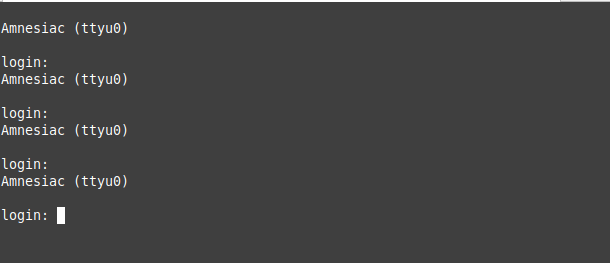
How To Setup Python3 in Ubuntu Docker Image for AI Deep Learning
The issue is that Docker images are stripped down, so many tools and even python3 is missing, so you'll have to build or update the actual image yourself.
I assume you have started an image with something like this and that you have the Nvidia Toolkit installed (assuming you are using GPUs). If you're not using nvidia just remove --runtime=nvidia --gpus all.
docker run -it --runtime=nvidia --gpus all ubuntu bash
These works for most images like Ubuntu 20.04 22.04 etc..:
apt update;apt install python3-pip
Get:1 http://security.ubuntu.com/ubuntu jammy-security InRelease [110 kB]
Get:2 http://archive.ubuntu.com/ubuntu jammy InRelease [270 kB]
Get:3 http://security.ubuntu.com/ubuntu jammy-security/restricted amd64 Packages [1404 kB]
Get:4 http://security.ubuntu.com/ubuntu jammy-security/multiverse amd64 Packages [44.0 kB]
Get:5 http://security.ubuntu.com/ubuntu jammy-security/universe amd64 Packages [1011 kB]
Get:6 http://security.ubuntu.com/ubuntu jammy-security/main amd64 Packages [1204 kB]
Get:7 http://archive.ubuntu.com/ubuntu jammy-updates InRelease [119 kB]
Get:8 http://archive.ubuntu.com/ubuntu jammy-backports InRelease [109 kB]
Get:9 http://archive.ubuntu.com/ubuntu jammy/multiverse amd64 Packages [266 kB]
Get:10 http://archive.ubuntu.com/ubuntu jammy/restricted amd64 Packages [164 kB]
Get:11 http://archive.ubuntu.com/ubuntu jammy/main amd64 Packages [1792 kB]
Get:12 http://archive.ubuntu.com/ubuntu jammy/universe amd64 Packages [17.5 MB]
Get:13 http://archive.ubuntu.com/ubuntu jammy-updates/restricted amd64 Packages [1430 kB]
Get:14 http://archive.ubuntu.com/ubuntu jammy-updates/main amd64 Packages [1474 kB]
Get:15 http://archive.ubuntu.com/ubuntu jammy-updates/multiverse amd64 Packages [49.8 kB]
Get:16 http://archive.ubuntu.com/ubuntu jammy-updates/universe amd64 Packages [1279 kB]
Get:17 http://archive.ubuntu.com/ubuntu jammy-backports/universe amd64 Packages [32.6 kB]
Get:18 http://archive.ubuntu.com/ubuntu jammy-backports/main amd64 Packages [78.3 kB]
Fetched 28.3 MB in 3s (8211 kB/s)
Reading package lists... Done
Building dependency tree... Done
Reading state information... Done
11 packages can be upgraded. Run 'apt list --upgradable' to see them.
Reading package lists... Done
Building dependency tree... Done
Reading state information... Done
The following additional packages will be installed:
binutils binutils-common binutils-x86-64-linux-gnu build-essential bzip2 ca-certificates cpp cpp-11 dirmngr dpkg-dev fakeroot fontconfig-config fonts-dejavu-core g++ g++-11 gcc gcc-11 gcc-11-base gnupg
gnupg-l10n gnupg-utils gpg gpg-agent gpg-wks-client gpg-wks-server gpgconf gpgsm javascript-common libalgorithm-diff-perl libalgorithm-diff-xs-perl libalgorithm-merge-perl libasan6 libassuan0 libatomic1
libbinutils libbrotli1 libbsd0 libc-dev-bin libc-devtools libc6-dev libcc1-0 libcrypt-dev libctf-nobfd0 libctf0 libdeflate0 libdpkg-perl libexpat1 libexpat1-dev libfakeroot libfile-fcntllock-perl
libfontconfig1 libfreetype6 libgcc-11-dev libgd3 libgdbm-compat4 libgdbm6 libgomp1 libisl23 libitm1 libjbig0 libjpeg-turbo8 libjpeg8 libjs-jquery libjs-sphinxdoc libjs-underscore libksba8 libldap-2.5-0
libldap-common liblocale-gettext-perl liblsan0 libmd0 libmpc3 libmpdec3 libmpfr6 libnpth0 libnsl-dev libperl5.34 libpng16-16 libpython3-dev libpython3-stdlib libpython3.10 libpython3.10-dev
libpython3.10-minimal libpython3.10-stdlib libquadmath0 libreadline8 libsasl2-2 libsasl2-modules libsasl2-modules-db libsqlite3-0 libstdc++-11-dev libtiff5 libtirpc-dev libtsan0 libubsan1 libwebp7
libx11-6 libx11-data libxau6 libxcb1 libxdmcp6 libxpm4 linux-libc-dev lto-disabled-list make manpages manpages-dev media-types netbase openssl patch perl perl-modules-5.34 pinentry-curses python3
python3-dev python3-distutils python3-lib2to3 python3-minimal python3-pkg-resources python3-setuptools python3-wheel python3.10 python3.10-dev python3.10-minimal readline-common rpcsvc-proto ucf xz-utils
zlib1g-dev
Suggested packages:
binutils-doc bzip2-doc cpp-doc gcc-11-locales dbus-user-session libpam-systemd pinentry-gnome3 tor debian-keyring g++-multilib g++-11-multilib gcc-11-doc gcc-multilib autoconf automake libtool flex bison
gdb gcc-doc gcc-11-multilib parcimonie xloadimage scdaemon apache2 | lighttpd | httpd glibc-doc git bzr libgd-tools gdbm-l10n libsasl2-modules-gssapi-mit | libsasl2-modules-gssapi-heimdal
libsasl2-modules-ldap libsasl2-modules-otp libsasl2-modules-sql libstdc++-11-doc make-doc man-browser ed diffutils-doc perl-doc libterm-readline-gnu-perl | libterm-readline-perl-perl
libtap-harness-archive-perl pinentry-doc python3-doc python3-tk python3-venv python-setuptools-doc python3.10-venv python3.10-doc binfmt-support readline-doc
The following NEW packages will be installed:
binutils binutils-common binutils-x86-64-linux-gnu build-essential bzip2 ca-certificates cpp cpp-11 dirmngr dpkg-dev fakeroot fontconfig-config fonts-dejavu-core g++ g++-11 gcc gcc-11 gcc-11-base gnupg
gnupg-l10n gnupg-utils gpg gpg-agent gpg-wks-client gpg-wks-server gpgconf gpgsm javascript-common libalgorithm-diff-perl libalgorithm-diff-xs-perl libalgorithm-merge-perl libasan6 libassuan0 libatomic1
libbinutils libbrotli1 libbsd0 libc-dev-bin libc-devtools libc6-dev libcc1-0 libcrypt-dev libctf-nobfd0 libctf0 libdeflate0 libdpkg-perl libexpat1 libexpat1-dev libfakeroot libfile-fcntllock-perl
libfontconfig1 libfreetype6 libgcc-11-dev libgd3 libgdbm-compat4 libgdbm6 libgomp1 libisl23 libitm1 libjbig0 libjpeg-turbo8 libjpeg8 libjs-jquery libjs-sphinxdoc libjs-underscore libksba8 libldap-2.5-0
libldap-common liblocale-gettext-perl liblsan0 libmd0 libmpc3 libmpdec3 libmpfr6 libnpth0 libnsl-dev libperl5.34 libpng16-16 libpython3-dev libpython3-stdlib libpython3.10 libpython3.10-dev
libpython3.10-minimal libpython3.10-stdlib libquadmath0 libreadline8 libsasl2-2 libsasl2-modules libsasl2-modules-db libsqlite3-0 libstdc++-11-dev libtiff5 libtirpc-dev libtsan0 libubsan1 libwebp7
libx11-6 libx11-data libxau6 libxcb1 libxdmcp6 libxpm4 linux-libc-dev lto-disabled-list make manpages manpages-dev media-types netbase openssl patch perl perl-modules-5.34 pinentry-curses python3
python3-dev python3-distutils python3-lib2to3 python3-minimal python3-pip python3-pkg-resources python3-setuptools python3-wheel python3.10 python3.10-dev python3.10-minimal readline-common rpcsvc-proto
ucf xz-utils zlib1g-dev
0 upgraded, 131 newly installed, 0 to remove and 11 not upgraded.
Need to get 101 MB of archives.
After this operation, 356 MB of additional disk space will be used.
Do you want to continue? [Y/n] y
.......
done.
Install needed packages
To get started we just install tensorflow and torch. You will need to adjust for whatever python libraries you need.
Install pytorch:
pip3 install torch matplotlib
WARNING: The directory '/root/.cache/pip' or its parent directory is not owned or is not writable by the current user. The cache has been disabled. Check the permissions and owner of that directory. If executing pip with sudo, you should use sudo's -H flag.
Collecting torch
Downloading torch-2.1.1-cp310-cp310-manylinux1_x86_64.whl (670.2 MB)
━━━━━━━━━━━━━━━━━━━━━━━━━━━━━━━━━━━━━━━━ 670.2/670.2 MB 112.5 MB/s eta 0:00:00
Collecting matplotlib
Downloading matplotlib-3.8.2-cp310-cp310-manylinux_2_17_x86_64.manylinux2014_x86_64.whl (11.6 MB)
━━━━━━━━━━━━━━━━━━━━━━━━━━━━━━━━━━━━━━━━ 11.6/11.6 MB 117.5 MB/s eta 0:00:00
Collecting nvidia-cufft-cu12==11.0.2.54
Downloading nvidia_cufft_cu12-11.0.2.54-py3-none-manylinux1_x86_64.whl (121.6 MB)
━━━━━━━━━━━━━━━━━━━━━━━━━━━━━━━━━━━━━━━━ 121.6/121.6 MB 111.0 MB/s eta 0:00:00
Collecting triton==2.1.0
Downloading triton-2.1.0-0-cp310-cp310-manylinux2014_x86_64.manylinux_2_17_x86_64.whl (89.2 MB)
━━━━━━━━━━━━━━━━━━━━━━━━━━━━━━━━━━━━━━━━ 89.2/89.2 MB 111.6 MB/s eta 0:00:00
Collecting fsspec
Downloading fsspec-2023.10.0-py3-none-any.whl (166 kB)
━━━━━━━━━━━━━━━━━━━━━━━━━━━━━━━━━━━━━━━━ 166.4/166.4 KB 168.7 MB/s eta 0:00:00
Collecting nvidia-cuda-runtime-cu12==12.1.105
Downloading nvidia_cuda_runtime_cu12-12.1.105-py3-none-manylinux1_x86_64.whl (823 kB)
━━━━━━━━━━━━━━━━━━━━━━━━━━━━━━━━━━━━━━━━ 823.6/823.6 KB 169.9 MB/s eta 0:00:00
Collecting nvidia-cuda-cupti-cu12==12.1.105
Downloading nvidia_cuda_cupti_cu12-12.1.105-py3-none-manylinux1_x86_64.whl (14.1 MB)
━━━━━━━━━━━━━━━━━━━━━━━━━━━━━━━━━━━━━━━━ 14.1/14.1 MB 111.9 MB/s eta 0:00:00
Collecting nvidia-curand-cu12==10.3.2.106
Downloading nvidia_curand_cu12-10.3.2.106-py3-none-manylinux1_x86_64.whl (56.5 MB)
━━━━━━━━━━━━━━━━━━━━━━━━━━━━━━━━━━━━━━━━ 56.5/56.5 MB 117.1 MB/s eta 0:00:00
Collecting nvidia-cusolver-cu12==11.4.5.107
Downloading nvidia_cusolver_cu12-11.4.5.107-py3-none-manylinux1_x86_64.whl (124.2 MB)
━━━━━━━━━━━━━━━━━━━━━━━━━━━━━━━━━━━━━━━━ 124.2/124.2 MB 98.5 MB/s eta 0:00:00
Collecting networkx
Downloading networkx-3.2.1-py3-none-any.whl (1.6 MB)
━━━━━━━━━━━━━━━━━━━━━━━━━━━━━━━━━━━━━━━━ 1.6/1.6 MB 148.2 MB/s eta 0:00:00
Collecting nvidia-cudnn-cu12==8.9.2.26
Downloading nvidia_cudnn_cu12-8.9.2.26-py3-none-manylinux1_x86_64.whl (731.7 MB)
━━━━━━━━━━━━━━━━━━━━━━━━━━━━━━━━━━━━━━━━ 731.7/731.7 MB 120.6 MB/s eta 0:00:00
Collecting nvidia-cusparse-cu12==12.1.0.106
Downloading nvidia_cusparse_cu12-12.1.0.106-py3-none-manylinux1_x86_64.whl (196.0 MB)
━━━━━━━━━━━━━━━━━━━━━━━━━━━━━━━━━━━━━━━━ 196.0/196.0 MB 117.5 MB/s eta 0:00:00
Collecting filelock
Downloading filelock-3.13.1-py3-none-any.whl (11 kB)
Collecting nvidia-nvtx-cu12==12.1.105
Downloading nvidia_nvtx_cu12-12.1.105-py3-none-manylinux1_x86_64.whl (99 kB)
━━━━━━━━━━━━━━━━━━━━━━━━━━━━━━━━━━━━━━━━ 99.1/99.1 KB 83.6 MB/s eta 0:00:00
Collecting jinja2
Downloading Jinja2-3.1.2-py3-none-any.whl (133 kB)
━━━━━━━━━━━━━━━━━━━━━━━━━━━━━━━━━━━━━━━━ 133.1/133.1 KB 149.0 MB/s eta 0:00:00
Collecting typing-extensions
Downloading typing_extensions-4.8.0-py3-none-any.whl (31 kB)
Collecting nvidia-cuda-nvrtc-cu12==12.1.105
Downloading nvidia_cuda_nvrtc_cu12-12.1.105-py3-none-manylinux1_x86_64.whl (23.7 MB)
━━━━━━━━━━━━━━━━━━━━━━━━━━━━━━━━━━━━━━━━ 23.7/23.7 MB 82.2 MB/s eta 0:00:00
Collecting nvidia-nccl-cu12==2.18.1
Downloading nvidia_nccl_cu12-2.18.1-py3-none-manylinux1_x86_64.whl (209.8 MB)
━━━━━━━━━━━━━━━━━━━━━━━━━━━━━━━━━━━━━━━━ 209.8/209.8 MB 117.5 MB/s eta 0:00:00
Collecting sympy
Downloading sympy-1.12-py3-none-any.whl (5.7 MB)
━━━━━━━━━━━━━━━━━━━━━━━━━━━━━━━━━━━━━━━━ 5.7/5.7 MB 125.7 MB/s eta 0:00:00
Collecting nvidia-cublas-cu12==12.1.3.1
Downloading nvidia_cublas_cu12-12.1.3.1-py3-none-manylinux1_x86_64.whl (410.6 MB)
━━━━━━━━━━━━━━━━━━━━━━━━━━━━━━━━━━━━━━━━ 410.6/410.6 MB 114.3 MB/s eta 0:00:00
Collecting nvidia-nvjitlink-cu12
Downloading nvidia_nvjitlink_cu12-12.3.101-py3-none-manylinux1_x86_64.whl (20.5 MB)
━━━━━━━━━━━━━━━━━━━━━━━━━━━━━━━━━━━━━━━━ 20.5/20.5 MB 114.3 MB/s eta 0:00:00
Collecting pyparsing>=2.3.1
Downloading pyparsing-3.1.1-py3-none-any.whl (103 kB)
━━━━━━━━━━━━━━━━━━━━━━━━━━━━━━━━━━━━━━━━ 103.1/103.1 KB 144.1 MB/s eta 0:00:00
Collecting numpy<2,>=1.21
Downloading numpy-1.26.2-cp310-cp310-manylinux_2_17_x86_64.manylinux2014_x86_64.whl (18.2 MB)
━━━━━━━━━━━━━━━━━━━━━━━━━━━━━━━━━━━━━━━━ 18.2/18.2 MB 77.1 MB/s eta 0:00:00
Collecting fonttools>=4.22.0
Downloading fonttools-4.45.0-cp310-cp310-manylinux_2_17_x86_64.manylinux2014_x86_64.whl (4.6 MB)
━━━━━━━━━━━━━━━━━━━━━━━━━━━━━━━━━━━━━━━━ 4.6/4.6 MB 114.6 MB/s eta 0:00:00
Collecting python-dateutil>=2.7
Downloading python_dateutil-2.8.2-py2.py3-none-any.whl (247 kB)
━━━━━━━━━━━━━━━━━━━━━━━━━━━━━━━━━━━━━━━━ 247.7/247.7 KB 185.9 MB/s eta 0:00:00
Collecting pillow>=8
Downloading Pillow-10.1.0-cp310-cp310-manylinux_2_28_x86_64.whl (3.6 MB)
━━━━━━━━━━━━━━━━━━━━━━━━━━━━━━━━━━━━━━━━ 3.6/3.6 MB 129.8 MB/s eta 0:00:00
Collecting cycler>=0.10
Downloading cycler-0.12.1-py3-none-any.whl (8.3 kB)
Collecting packaging>=20.0
Downloading packaging-23.2-py3-none-any.whl (53 kB)
━━━━━━━━━━━━━━━━━━━━━━━━━━━━━━━━━━━━━━━━ 53.0/53.0 KB 144.1 MB/s eta 0:00:00
Collecting kiwisolver>=1.3.1
Downloading kiwisolver-1.4.5-cp310-cp310-manylinux_2_12_x86_64.manylinux2010_x86_64.whl (1.6 MB)
━━━━━━━━━━━━━━━━━━━━━━━━━━━━━━━━━━━━━━━━ 1.6/1.6 MB 145.5 MB/s eta 0:00:00
Collecting contourpy>=1.0.1
Downloading contourpy-1.2.0-cp310-cp310-manylinux_2_17_x86_64.manylinux2014_x86_64.whl (310 kB)
━━━━━━━━━━━━━━━━━━━━━━━━━━━━━━━━━━━━━━━━ 310.7/310.7 KB 162.4 MB/s eta 0:00:00
Collecting six>=1.5
Downloading six-1.16.0-py2.py3-none-any.whl (11 kB)
Collecting MarkupSafe>=2.0
Downloading MarkupSafe-2.1.3-cp310-cp310-manylinux_2_17_x86_64.manylinux2014_x86_64.whl (25 kB)
Collecting mpmath>=0.19
Downloading mpmath-1.3.0-py3-none-any.whl (536 kB)
━━━━━━━━━━━━━━━━━━━━━━━━━━━━━━━━━━━━━━━━ 536.2/536.2 KB 179.5 MB/s eta 0:00:00
Installing collected packages: mpmath, typing-extensions, sympy, six, pyparsing, pillow, packaging, nvidia-nvtx-cu12, nvidia-nvjitlink-cu12, nvidia-nccl-cu12, nvidia-curand-cu12, nvidia-cufft-cu12, nvidia-cuda-runtime-cu12, nvidia-cuda-nvrtc-cu12, nvidia-cuda-cupti-cu12, nvidia-cublas-cu12, numpy, networkx, MarkupSafe, kiwisolver, fsspec, fonttools, filelock, cycler, triton, python-dateutil, nvidia-cusparse-cu12, nvidia-cudnn-cu12, jinja2, contourpy, nvidia-cusolver-cu12, matplotlib, torch
Successfully installed MarkupSafe-2.1.3 contourpy-1.2.0 cycler-0.12.1 filelock-3.13.1 fonttools-4.45.0 fsspec-2023.10.0 jinja2-3.1.2 kiwisolver-1.4.5 matplotlib-3.8.2 mpmath-1.3.0 networkx-3.2.1 numpy-1.26.2 nvidia-cublas-cu12-12.1.3.1 nvidia-cuda-cupti-cu12-12.1.105 nvidia-cuda-nvrtc-cu12-12.1.105 nvidia-cuda-runtime-cu12-12.1.105 nvidia-cudnn-cu12-8.9.2.26 nvidia-cufft-cu12-11.0.2.54 nvidia-curand-cu12-10.3.2.106 nvidia-cusolver-cu12-11.4.5.107 nvidia-cusparse-cu12-12.1.0.106 nvidia-nccl-cu12-2.18.1 nvidia-nvjitlink-cu12-12.3.101 nvidia-nvtx-cu12-12.1.105 packaging-23.2 pillow-10.1.0 pyparsing-3.1.1 python-dateutil-2.8.2 six-1.16.0 sympy-1.12 torch-2.1.1 triton-2.1.0 typing-extensions-4.8.0
Install Tensorflow:
pip3 install tensorflow
WARNING: The directory '/root/.cache/pip' or its parent directory is not owned or is not writable by the current user. The cache has been disabled. Check the permissions and owner of that directory. If executing pip with sudo, you should use sudo's -H flag.
Collecting tensorflow
Downloading tensorflow-2.15.0-cp310-cp310-manylinux_2_17_x86_64.manylinux2014_x86_64.whl (475.2 MB)
━━━━━━━━━━━━━━━━━━━━━━━━━━━━━━━━━━━━━━━━ 475.2/475.2 MB 110.9 MB/s eta 0:00:00
Collecting astunparse>=1.6.0
Downloading astunparse-1.6.3-py2.py3-none-any.whl (12 kB)
Requirement already satisfied: numpy<2.0.0,>=1.23.5 in /usr/local/lib/python3.10/dist-packages (from tensorflow) (1.26.2)
Collecting wrapt<1.15,>=1.11.0
Downloading wrapt-1.14.1-cp310-cp310-manylinux_2_5_x86_64.manylinux1_x86_64.manylinux_2_17_x86_64.manylinux2014_x86_64.whl (77 kB)
━━━━━━━━━━━━━━━━━━━━━━━━━━━━━━━━━━━━━━━━ 77.9/77.9 KB 139.3 MB/s eta 0:00:00
Requirement already satisfied: packaging in /usr/local/lib/python3.10/dist-packages (from tensorflow) (23.2)
Collecting termcolor>=1.1.0
Downloading termcolor-2.3.0-py3-none-any.whl (6.9 kB)
Collecting absl-py>=1.0.0
Downloading absl_py-2.0.0-py3-none-any.whl (130 kB)
━━━━━━━━━━━━━━━━━━━━━━━━━━━━━━━━━━━━━━━━ 130.2/130.2 KB 161.6 MB/s eta 0:00:00
Collecting h5py>=2.9.0
Downloading h5py-3.10.0-cp310-cp310-manylinux_2_17_x86_64.manylinux2014_x86_64.whl (4.8 MB)
━━━━━━━━━━━━━━━━━━━━━━━━━━━━━━━━━━━━━━━━ 4.8/4.8 MB 109.2 MB/s eta 0:00:00
Requirement already satisfied: setuptools in /usr/lib/python3/dist-packages (from tensorflow) (59.6.0)
Collecting opt-einsum>=2.3.2
Downloading opt_einsum-3.3.0-py3-none-any.whl (65 kB)
━━━━━━━━━━━━━━━━━━━━━━━━━━━━━━━━━━━━━━━━ 65.5/65.5 KB 134.5 MB/s eta 0:00:00
Collecting tensorflow-io-gcs-filesystem>=0.23.1
Downloading tensorflow_io_gcs_filesystem-0.34.0-cp310-cp310-manylinux_2_12_x86_64.manylinux2010_x86_64.whl (2.4 MB)
━━━━━━━━━━━━━━━━━━━━━━━━━━━━━━━━━━━━━━━━ 2.4/2.4 MB 119.6 MB/s eta 0:00:00
Collecting flatbuffers>=23.5.26
Downloading flatbuffers-23.5.26-py2.py3-none-any.whl (26 kB)
Collecting libclang>=13.0.0
Downloading libclang-16.0.6-py2.py3-none-manylinux2010_x86_64.whl (22.9 MB)
━━━━━━━━━━━━━━━━━━━━━━━━━━━━━━━━━━━━━━━━ 22.9/22.9 MB 114.4 MB/s eta 0:00:00
Collecting tensorflow-estimator<2.16,>=2.15.0
Downloading tensorflow_estimator-2.15.0-py2.py3-none-any.whl (441 kB)
━━━━━━━━━━━━━━━━━━━━━━━━━━━━━━━━━━━━━━━━ 442.0/442.0 KB 152.5 MB/s eta 0:00:00
Collecting gast!=0.5.0,!=0.5.1,!=0.5.2,>=0.2.1
Downloading gast-0.5.4-py3-none-any.whl (19 kB)
Collecting google-pasta>=0.1.1
Downloading google_pasta-0.2.0-py3-none-any.whl (57 kB)
━━━━━━━━━━━━━━━━━━━━━━━━━━━━━━━━━━━━━━━━ 57.5/57.5 KB 127.5 MB/s eta 0:00:00
Collecting tensorboard<2.16,>=2.15
Downloading tensorboard-2.15.1-py3-none-any.whl (5.5 MB)
━━━━━━━━━━━━━━━━━━━━━━━━━━━━━━━━━━━━━━━━ 5.5/5.5 MB 112.9 MB/s eta 0:00:00
Collecting grpcio<2.0,>=1.24.3
Downloading grpcio-1.59.3-cp310-cp310-manylinux_2_17_x86_64.manylinux2014_x86_64.whl (5.3 MB)
━━━━━━━━━━━━━━━━━━━━━━━━━━━━━━━━━━━━━━━━ 5.3/5.3 MB 122.0 MB/s eta 0:00:00
Collecting ml-dtypes~=0.2.0
Downloading ml_dtypes-0.2.0-cp310-cp310-manylinux_2_17_x86_64.manylinux2014_x86_64.whl (1.0 MB)
━━━━━━━━━━━━━━━━━━━━━━━━━━━━━━━━━━━━━━━━ 1.0/1.0 MB 137.3 MB/s eta 0:00:00
Requirement already satisfied: six>=1.12.0 in /usr/local/lib/python3.10/dist-packages (from tensorflow) (1.16.0)
Collecting keras<2.16,>=2.15.0
Downloading keras-2.15.0-py3-none-any.whl (1.7 MB)
━━━━━━━━━━━━━━━━━━━━━━━━━━━━━━━━━━━━━━━━ 1.7/1.7 MB 125.8 MB/s eta 0:00:00
Collecting protobuf!=4.21.0,!=4.21.1,!=4.21.2,!=4.21.3,!=4.21.4,!=4.21.5,<5.0.0dev,>=3.20.3
Downloading protobuf-4.25.1-cp37-abi3-manylinux2014_x86_64.whl (294 kB)
━━━━━━━━━━━━━━━━━━━━━━━━━━━━━━━━━━━━━━━━ 294.6/294.6 KB 164.4 MB/s eta 0:00:00
Requirement already satisfied: typing-extensions>=3.6.6 in /usr/local/lib/python3.10/dist-packages (from tensorflow) (4.8.0)
Requirement already satisfied: wheel<1.0,>=0.23.0 in /usr/lib/python3/dist-packages (from astunparse>=1.6.0->tensorflow) (0.37.1)
Collecting google-auth-oauthlib<2,>=0.5
Downloading google_auth_oauthlib-1.1.0-py2.py3-none-any.whl (19 kB)
Collecting tensorboard-data-server<0.8.0,>=0.7.0
Downloading tensorboard_data_server-0.7.2-py3-none-manylinux_2_31_x86_64.whl (6.6 MB)
━━━━━━━━━━━━━━━━━━━━━━━━━━━━━━━━━━━━━━━━ 6.6/6.6 MB 113.3 MB/s eta 0:00:00
Collecting protobuf!=4.21.0,!=4.21.1,!=4.21.2,!=4.21.3,!=4.21.4,!=4.21.5,<5.0.0dev,>=3.20.3
Downloading protobuf-4.23.4-cp37-abi3-manylinux2014_x86_64.whl (304 kB)
━━━━━━━━━━━━━━━━━━━━━━━━━━━━━━━━━━━━━━━━ 304.5/304.5 KB 136.7 MB/s eta 0:00:00
Collecting werkzeug>=1.0.1
Downloading werkzeug-3.0.1-py3-none-any.whl (226 kB)
━━━━━━━━━━━━━━━━━━━━━━━━━━━━━━━━━━━━━━━━ 226.7/226.7 KB 184.9 MB/s eta 0:00:00
Collecting markdown>=2.6.8
Downloading Markdown-3.5.1-py3-none-any.whl (102 kB)
━━━━━━━━━━━━━━━━━━━━━━━━━━━━━━━━━━━━━━━━ 102.2/102.2 KB 157.0 MB/s eta 0:00:00
Collecting requests<3,>=2.21.0
Downloading requests-2.31.0-py3-none-any.whl (62 kB)
━━━━━━━━━━━━━━━━━━━━━━━━━━━━━━━━━━━━━━━━ 62.6/62.6 KB 135.8 MB/s eta 0:00:00
Collecting google-auth<3,>=1.6.3
Downloading google_auth-2.23.4-py2.py3-none-any.whl (183 kB)
━━━━━━━━━━━━━━━━━━━━━━━━━━━━━━━━━━━━━━━━ 183.3/183.3 KB 164.8 MB/s eta 0:00:00
Collecting cachetools<6.0,>=2.0.0
Downloading cachetools-5.3.2-py3-none-any.whl (9.3 kB)
Collecting rsa<5,>=3.1.4
Downloading rsa-4.9-py3-none-any.whl (34 kB)
Collecting pyasn1-modules>=0.2.1
Downloading pyasn1_modules-0.3.0-py2.py3-none-any.whl (181 kB)
━━━━━━━━━━━━━━━━━━━━━━━━━━━━━━━━━━━━━━━━ 181.3/181.3 KB 149.5 MB/s eta 0:00:00
Collecting requests-oauthlib>=0.7.0
Downloading requests_oauthlib-1.3.1-py2.py3-none-any.whl (23 kB)
Collecting charset-normalizer<4,>=2
Downloading charset_normalizer-3.3.2-cp310-cp310-manylinux_2_17_x86_64.manylinux2014_x86_64.whl (142 kB)
━━━━━━━━━━━━━━━━━━━━━━━━━━━━━━━━━━━━━━━━ 142.1/142.1 KB 144.8 MB/s eta 0:00:00
Collecting certifi>=2017.4.17
Downloading certifi-2023.11.17-py3-none-any.whl (162 kB)
━━━━━━━━━━━━━━━━━━━━━━━━━━━━━━━━━━━━━━━━ 162.5/162.5 KB 142.4 MB/s eta 0:00:00
Collecting idna<4,>=2.5
Downloading idna-3.4-py3-none-any.whl (61 kB)
━━━━━━━━━━━━━━━━━━━━━━━━━━━━━━━━━━━━━━━━ 61.5/61.5 KB 138.7 MB/s eta 0:00:00
Collecting urllib3<3,>=1.21.1
Downloading urllib3-2.1.0-py3-none-any.whl (104 kB)
━━━━━━━━━━━━━━━━━━━━━━━━━━━━━━━━━━━━━━━━ 104.6/104.6 KB 160.3 MB/s eta 0:00:00
Requirement already satisfied: MarkupSafe>=2.1.1 in /usr/local/lib/python3.10/dist-packages (from werkzeug>=1.0.1->tensorboard<2.16,>=2.15->tensorflow) (2.1.3)
Collecting pyasn1<0.6.0,>=0.4.6
Downloading pyasn1-0.5.0-py2.py3-none-any.whl (83 kB)
━━━━━━━━━━━━━━━━━━━━━━━━━━━━━━━━━━━━━━━━ 83.9/83.9 KB 154.6 MB/s eta 0:00:00
Collecting oauthlib>=3.0.0
Downloading oauthlib-3.2.2-py3-none-any.whl (151 kB)
━━━━━━━━━━━━━━━━━━━━━━━━━━━━━━━━━━━━━━━━ 151.7/151.7 KB 159.3 MB/s eta 0:00:00
Installing collected packages: libclang, flatbuffers, wrapt, werkzeug, urllib3, termcolor, tensorflow-io-gcs-filesystem, tensorflow-estimator, tensorboard-data-server, pyasn1, protobuf, opt-einsum, oauthlib, ml-dtypes, markdown, keras, idna, h5py, grpcio, google-pasta, gast, charset-normalizer, certifi, cachetools, astunparse, absl-py, rsa, requests, pyasn1-modules, requests-oauthlib, google-auth, google-auth-oauthlib, tensorboard, tensorflow
Successfully installed absl-py-2.0.0 astunparse-1.6.3 cachetools-5.3.2 certifi-2023.11.17 charset-normalizer-3.3.2 flatbuffers-23.5.26 gast-0.5.4 google-auth-2.23.4 google-auth-oauthlib-1.1.0 google-pasta-0.2.0 grpcio-1.59.3 h5py-3.10.0 idna-3.4 keras-2.15.0 libclang-16.0.6 markdown-3.5.1 ml-dtypes-0.2.0 oauthlib-3.2.2 opt-einsum-3.3.0 protobuf-4.23.4 pyasn1-0.5.0 pyasn1-modules-0.3.0 requests-2.31.0 requests-oauthlib-1.3.1 rsa-4.9 tensorboard-2.15.1 tensorboard-data-server-0.7.2 tensorflow-2.15.0 tensorflow-estimator-2.15.0 tensorflow-io-gcs-filesystem-0.34.0 termcolor-2.3.0 urllib3-2.1.0 werkzeug-3.0.1 wrapt-1.14.1
How to Configure NVIDIA GPUs with Docker on Ubuntu: A Comprehensive Guide for AI Deep Learning CUDA Solution


Welcome to our in-depth guide on configuring NVIDIA GPUs with Docker on Ubuntu. This post is tailored for developers, data scientists, and IT professionals who are looking to leverage the power of NVIDIA's GPU acceleration within Docker containers.
Whether you're working on machine learning projects, scientific computations, or any GPU-intensive tasks, this guide will walk you through the process step-by-step.
This guide will work for all Nvidia GPUs that have a supported driver in Linux such as the GTX, RTX and Tesla series. Of course the Tesla series is recommended as they have ECC and are more tailored for AI applications.
Normally it is not possible to share a GPU with multiple containers
Typically 1 real/physical GPU can work on one machine, whether physical or a VM that gets exclusive use. But nvidia has made tools that solve this problem by essentially creating a layer between Docker and the nvidia driver.
There is the old nvidia-docker2 package that NVIDIA has created which allows an unlimited amount of Docker containers to use the underlaying GPU(s) on the host but this has now been deprecrated for the new "nvidia-toolkit"
nvidia-toolkit is what you want unless there's a reason why you have an older distro that can't use the newer nvidia-toolkit.
nvidia-toolkit official install guide: https://docs.nvidia.com/datacenter/cloud-native/container-toolkit/latest/install-guide.html
How To Install nvidia-toolkit on Mint Ubuntu Debian
Step 1.) Add the Nvidia repo to Linux
First we add the gpg key for the repo:
curl -fsSL https://nvidia.github.io/libnvidia-container/gpgkey | sudo gpg --dearmor -o /usr/share/keyrings/nvidia-container-toolkit-keyring.gpg
Add the repo into our sources.list.d
curl -s -L https://nvidia.github.io/libnvidia-container/stable/deb/nvidia-container-toolkit.list | sed 's#deb https://#deb [signed-by=/usr/share/keyrings/nvidia-container-toolkit-keyring.gpg] https://#g' |
sudo tee /etc/apt/sources.list.d/nvidia-container-toolkit.list
Update apt so it can see the required packages from the nvidia repo
apt update
Step 2 - Install nvidia toolkit
apt-get install -y nvidia-container-toolkit Reading package lists... Done Building dependency tree Reading state information... Done The following additional packages will be installed: libnvidia-container-tools libnvidia-container1 nvidia-container-toolkit-base The following NEW packages will be installed: libnvidia-container-tools libnvidia-container1 nvidia-container-toolkit nvidia-container-toolkit-base 0 upgraded, 4 newly installed, 0 to remove and 690 not upgraded. Need to get 4,194 kB of archives. After this operation, 16.6 MB of additional disk space will be used. Get:1 https://nvidia.github.io/libnvidia-container/stable/deb/amd64 libnvidia-container1 1.14.3-1 [923 kB] Get:2 https://nvidia.github.io/libnvidia-container/stable/deb/amd64 libnvidia-container-tools 1.14.3-1 [19.3 kB] Get:3 https://nvidia.github.io/libnvidia-container/stable/deb/amd64 nvidia-container-toolkit-base 1.14.3-1 [2,336 kB] Get:4 https://nvidia.github.io/libnvidia-container/stable/deb/amd64 nvidia-container-toolkit 1.14.3-1 [917 kB] Fetched 4,194 kB in 1s (3,150 kB/s) Selecting previously unselected package libnvidia-container1:amd64. (Reading database ... 467373 files and directories currently installed.) Preparing to unpack .../libnvidia-container1_1.14.3-1_amd64.deb ... Unpacking libnvidia-container1:amd64 (1.14.3-1) ... Selecting previously unselected package libnvidia-container-tools. Preparing to unpack .../libnvidia-container-tools_1.14.3-1_amd64.deb ... Unpacking libnvidia-container-tools (1.14.3-1) ... Selecting previously unselected package nvidia-container-toolkit-base. Preparing to unpack .../nvidia-container-toolkit-base_1.14.3-1_amd64.deb ... Unpacking nvidia-container-toolkit-base (1.14.3-1) ... Selecting previously unselected package nvidia-container-toolkit. Preparing to unpack .../nvidia-container-toolkit_1.14.3-1_amd64.deb ... Unpacking nvidia-container-toolkit (1.14.3-1) ... Setting up nvidia-container-toolkit-base (1.14.3-1) ... Setting up libnvidia-container1:amd64 (1.14.3-1) ... Setting up libnvidia-container-tools (1.14.3-1) ... Setting up nvidia-container-toolkit (1.14.3-1) ... Processing triggers for libc-bin (2.31-0ubuntu9.2) ...
Step 3 - Docker Configuration
nvidia-ctk runtime configure --runtime=docker
INFO[0000] Loading config from /etc/docker/daemon.json
INFO[0000] Wrote updated config to /etc/docker/daemon.json
INFO[0000] It is recommended that docker daemon be restarted.
Step 4 - Test
docker run --rm --runtime=nvidia --gpus all ubuntu nvidia-smi
+-----------------------------------------------------------------------------+
| NVIDIA-SMI 390.154 Driver Version: 390.154 |
|-------------------------------+----------------------+----------------------+
| GPU Name Persistence-M| Bus-Id Disp.A | Volatile Uncorr. ECC |
| Fan Temp Perf Pwr:Usage/Cap| Memory-Usage | GPU-Util Compute M. |
|===============================+======================+======================|
| 0 Tesla V100-SXM2... Off | 00000000:04:00.0 N/A | N/A |
| N/A 41C P0 N/A / N/A | 0MiB / 16160MiB | N/A Default |
+-------------------------------+----------------------+----------------------+
+-----------------------------------------------------------------------------+
| Processes: GPU Memory |
| GPU PID Type Process name Usage |
|=============================================================================|
| 0 Not Supported |
+-----------------------------------------------------------------------------+
Linux Ubuntu Mint how to check nameservers when /etc/resolv.conf disabled solution
You'll notice that /etc/resolv.conf contains dire warners on most Linux Desktops.
# This file is managed by man:systemd-resolved(8). Do not edit.
#
# This is a dynamic resolv.conf file for connecting local clients to the
# internal DNS stub resolver of systemd-resolved. This file lists all
# configured search domains.
#
# Run "resolvectl status" to see details about the uplink DNS servers
# currently in use.
#
# Third party programs must not access this file directly, but only through the
# symlink at /etc/resolv.conf. To manage man:resolv.conf(5) in a different way,
# replace this symlink by a static file or a different symlink.
#
# See man:systemd-resolved.service(8) for details about the supported modes of
# operation for /etc/resolv.conf.
nameserver 127.0.0.53
This is because of systemd-resolved, which is a local, internal DNS resolver service that handles all of the DNS requests. It warns you not to make changes since they will just be overwritten and defaulted back to the local resolver running on 127.0.0.52 as we can see with the line for "nameserver 127.0.0.53"
We can see that indeed systemd-resolved is running on 127.0.0.53
Output of netstat
tcp 0 0 127.0.0.53:53 0.0.0.0:* LISTEN 1773/systemd-resolv
udp 0 0 127.0.0.53:53 0.0.0.0:* 1773/systemd-resolv
You can check the current nameservers with this command:
systemd-resolve --status
Global
LLMNR setting: no
MulticastDNS setting: no
DNSOverTLS setting: no
DNSSEC setting: no
DNSSEC supported: no
Current DNS Server: 172.76.5.2
DNS Servers: 172.76.5.2
172.76.5.3
DNSSEC NTA: 10.in-addr.arpa
16.172.in-addr.arpa
168.192.in-addr.arpa
17.172.in-addr.arpa
18.172.in-addr.arpa
19.172.in-addr.arpa
20.172.in-addr.arpa
21.172.in-addr.arpa
22.172.in-addr.arpa
23.172.in-addr.arpa
24.172.in-addr.arpa
25.172.in-addr.arpa
26.172.in-addr.arpa
27.172.in-addr.arpa
28.172.in-addr.arpa
29.172.in-addr.arpa
30.172.in-addr.arpa
31.172.in-addr.arpa
corp
d.f.ip6.arpa
home
internal
intranet
lan
local
private
test
Link 13 (veth8325f72)
Current Scopes: none
DefaultRoute setting: no
LLMNR setting: yes
MulticastDNS setting: no
DNSOverTLS setting: no
DNSSEC setting: no
DNSSEC supported: no
Link 11 (veth9a73ce5)
Current Scopes: none
DefaultRoute setting: no
LLMNR setting: yes
MulticastDNS setting: no
DNSOverTLS setting: no
DNSSEC setting: no
DNSSEC supported: no
How can we get rid of systemd-resolved?
In fact this is required if want to run our own bind or DNSMasq server for various reasons including running your own local routing/DNS: https://realtechtalk.com/Virtualbox_Best_Networking_Mode_In_LabWork_Environment_without_using_NAT_Network_or_Bridged-2475-articles
systemctl disable systemd-resolved
#remember to stop it too!
systemctl stop systemd-resolved
Remember to actually add a "nameserver" entry in /etc/resolv.conf or your DNS won't work.

